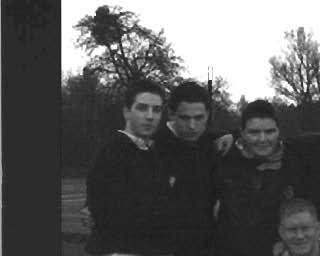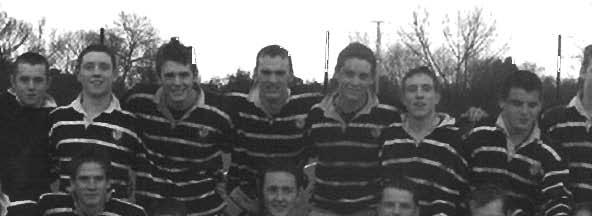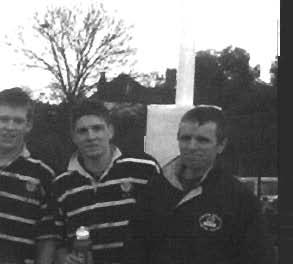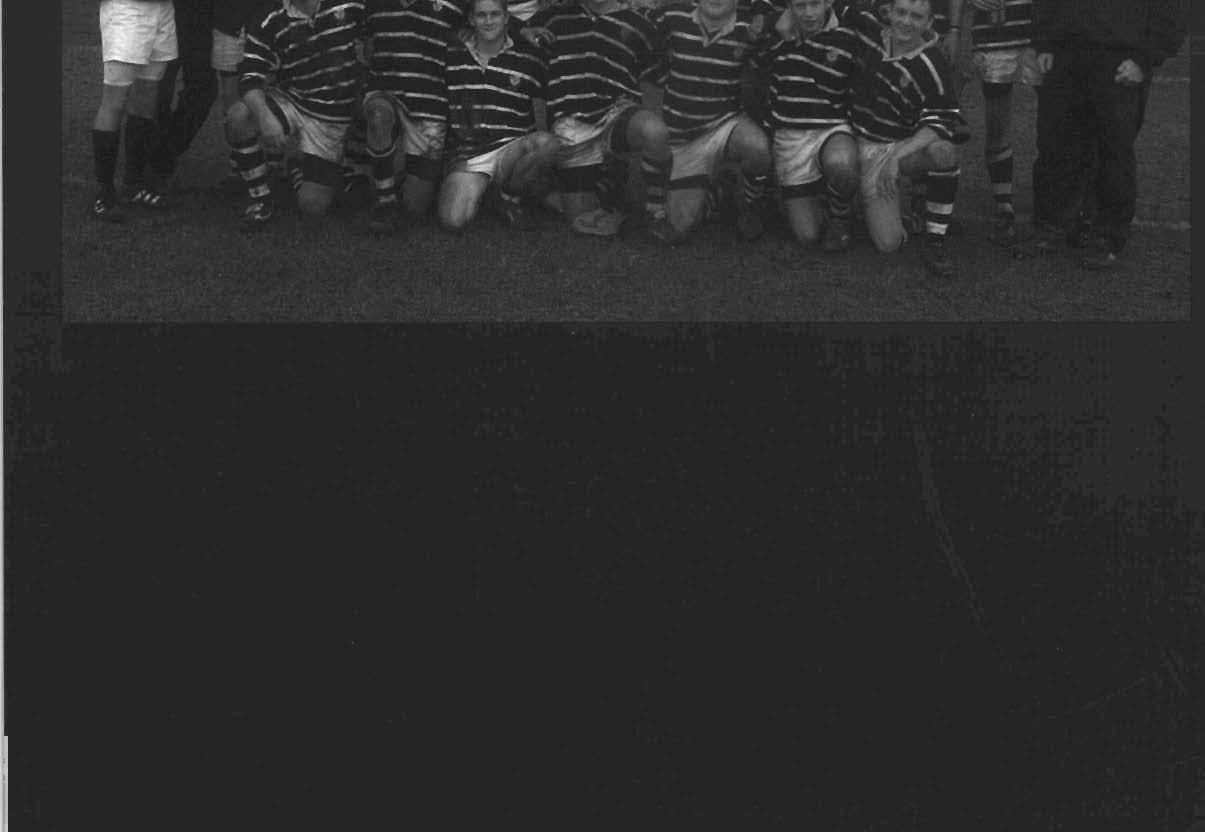


Castle House - 1953 with S.R. Shephard as Housemaster
(The Head of House to his left is now Judge Hopkin who earlier this year; in a well publicised incident, fought off the attack of an angry defendant in his court.)





Castle House - 1953 with S.R. Shephard as Housemaster
(The Head of House to his left is now Judge Hopkin who earlier this year; in a well publicised incident, fought off the attack of an angry defendant in his court.)













J.L.K. Bridges, BSc.
M.W. Bentley, Cert.Ed.
S.R. Davies, Cert.Ed.
P.C. Thompson, M.A.
P.J. Baseley, Dip.H/craft
MJ. Roberts, BSc.
J.M. Roslington, B.Sc., CPhys, M.1nst.P.
Mrs. M.A. Nott, BSc., C.Biol., M.I.Bio1.
B. Griffiths, B.Tech. (Careers)
E. Reeves, M.A.
D.T. Naish, B.Ed.
Mrs. C.F. Roslington, B.A.
M.A. Stevens, M.A.
R.A. Fleming, B.A.
D.P. Iddon, B.A.
Mrs. R.C.J. Diamond, B.A.
S. Le Marchand, B.A.
R.N.G. Stone, M.A.
R.P. Mason, B.A.
M.R. Gill, B.Sc., M.A., MSc.
Mrs. S.P. Griffiths, B.A.
Mrs. N.R. Anstey, Cert.Ed.
S.M. Bain, BSc., M.Sc.
M.D. Rudge, B.A.
J.T. Wheeler, BSc., C.Chem., M.R.S.C.
D.G. Willmer, M.Sc., Ph.D.
P.T. Gwilliam, B.A., M.Phi1.
Mrs. K. Appleby, B.A.
Mrs. C.M. Cox, M.A., MSc.
R.J. Davis, B.A.
Mrs. L.M. Ghaye, B.Ed., M.A.
A.I. Guest, B.Ed.
Mrs. S.C. Allum, BSc.
J.L. Owen, B.A.
C.A. Gallantree-Smith, B.A.
Mrs. E.R. Hand, B.A.
T.R. Sharp, M.A.
Mrs. C. Painter, B.A.
E.A. Lewis
E.G. Gumming
N.J.D. Dale Lace
S.J. Daly
J.M. Guy
Headmaster T.H. Keyes, M.A.
Second Master T.D.R. Hickson, B.A., C.Phys., F.1nst.P. Senior Mistress Mrs. P.A. Stevens, B.A., M.A. Director of Studies AtJ. Thould, M.A.
Mrs. S.H. Le Marchand, B.A.
Mrs. F.L. Short, B.A.
M.C. Poole, BSc., Ph.D.
Mrs. C. Horacek, M.A.
*P.M. Hibbert, BSc.
Mrs. T.D. Marskell, Cert.Ed.
Mrs. H.M. Arthur, BSc., C.Phys., M.1nst.P.
Mrs. P.A. Edwards, B.A., MSc.
Mrs. J.P. Maxwell-Stewart, B.A.
Revd M.R. Dorsett, B.A., M.Th., Ph.D., Cert.Theo1. (Chaplain)
Miss N. Featherstone BSc.
J.P. Whitehouse, B.Ed.
R.P. Geary, BSc., C.Chem., M.R.S.C.
A.A.D. Gillgrass, B.A.
S.C. Cuthbertson, B.A.
C. Haywood, B.A.
A.W. Longley, B.A., M.A.
S.M. Atkins, B.A.
*Mrs. M.M. Longley, B.Ed.
Mrs. J. Vivian, Cert.Ed.
Mrs. R.J. Terry. B.A., M.A.
P.S. Baldwin, B.A.
I.C. Robinson, BSc.
M. Schramm, BSc.
*Mrs. S.M. Beesley, B.A.
*Mrs. J.L. Guest, B.Ed.
Mrs. S. Simojoki, B.A.
0. Sucksmith, B.A.
Mrs. J.D. Clark B.Ed.
DJ. Haddock M.A., D.Phi1.
Mrs. J.T. Golightly, B.A.
Miss J. Cooke, B.A.
Mrs. A.D. Cross, B.A.
N.J. Maloney, M.A.
*Mrs. C.E. Battrum, B.A.
Music:
*D.E. Brookshaw, B.Mus., F.R.C.O.
*H.R. Thurlby, L.R.A.M.
*D.G. Phillips, M.A., F.R.C.O., C.H.M., L.G.S.M., A.R.C.M.
Mrs. V.J Gunter, G.T.C.L., L.T.C.L.
The King's Junior Schools
King's St. Albans:
Head: R.T. Bellfield, B.Ed.
Deputy: J.T. Walton, Cert.Ed., F.R.G.S.
Mrs. A.D. Walton, Cert.Ed.
*Mrs. L. Jackson, M.A.
Mrs. R. Reeves, M.Ed.
D. Mews, B.A., BSc., Cert.Ed.
Mrs. C .Woodcock, B.A., Cert.Ed.
Mrs. B. Wilson, B.A., Cert.Ed.
*Mrs. N. Cain, B.A., P.G.C.E.
F.C. McGonigal, B.Ed.
Mrs. K.J. Kear-Wood, BSc.
Mrs. J. Pitts, B.Ed. W. Toleman, B.A.
Mrs. M.A. Keyes, M.A.
King's Hawf ord:
Head: R.W. Middleton, MSc. M.I. Billen, Cert.Ed.
Mrs. A. Douglas, A.Mus.L.C.M., Cert.Ed.
Mrs. J.M. Tune, BSc.
Mrs. S. Roscoe, Cert.Ed.
R.W. Figgitt, B.A. Ed.
Mrs. C. Heath, B.Ed.
Mrs. J. Purser B.A., M.A.
M.R.J. Dawes BSc.
J. Whitmore B.A.
Pre-Prep:
Mrs. P.M. Bradley, B.Ed.
Mrs. J.N. Willis, Cert.Ed., B.A. Ed.
Mrs. C.A. Griffin, B.A.
Mrs. G.E. Riley, B.Sc.
Mrs. L. Baxter, B.Sc.
Mrs. J. Farmer B.Ed.
J.O.S. Hand (Cl) Head of School
A.E. Haigh (S) J.J. Scott (0s)
K.L.M. Jones (W) A.T. Swinburn (Ch)
A. Kenrick (0s) D.A. Turner (cl)
A.P. Papaphilippopoulos (W) C.L.F. Welsh (W)
O.H. Pollock (Cl)


LW. c:l<lsls, floods, foot and mouth: an alliterative sequence that played havoc with the usual programme of events at times over the past year. It started when we lost a concert and a series of sporting fixtures before the October Half'Term and then, as the floods settled in for the longest stay in decades, we were thrown back on contingency plans and waited like Noah to see the first blades of grass re-emerge from the water. Strange then, but a testimony to the determination of all involved, that this should have been our best Rugby season (most games, not surprisingly, played away from home) and Rowing year (two sets of gold at the National Schools Regatta and our girls representing England) for some time. With the focus away from sport for longer periods than usual, it was good to see such success achieved ill such areas as Young Enterprise, the national General Knowledge competition, Debating, newspaper production and Paperclip Physics (to name but a few). Music and Drama were just about immune from the effects of the weather and produced a series of memorable events. A Dance Showcase in May with 130 pupils taking part was a new venture that further enhanced our reputation for breadth and q~lalityin the Creative and Performing Arts. More of all this inside this latest edition of the Vigornian that continues to uphold its high standards. My congratulations to Mr. Iddon and his team.
On the academic front we pushed back further the boundaries ofachieve~~ient at A level to register our best results ever by some distance. Congratulations to all those who secru-ed university places. At the top end, twenty-two of our Upper Sixth gained A grades in all their subjects and eleven secured Oxford and Cambridge places. While this group was enjoying the dubious reputation of being the last to take the old A levels, the Lower Sixth must have envied them as they wrestled with the somewhat undel--cooked new AS exams that have generated so many miles of newsprint this year.
Most readers will know that we have completed three important building projects this year, each of which has brought significant benefits to the boys and girls, not to mention the staff, at King's. The conversion of Choir Ho11se has given us a new base for English and Classics: nine additional classroon~s and a new IT room. Confusingly, (:hoi~-House (the building) now has in it Bright and <:happel Houses (the people) while Castle House (the building) hosts Choir and Creighton. Please don't begin to ask me to explain. The other major project was completed just in time for the new academic year. This was the (hitherto) New Block, now the Annett Building, fresh from major reconstructive and cosmetic surgery. It now houses Maths in eight classl-ooms (four of which are Lower Fourth form rooms). In the basement are three new PE rooms and a light and spaciol~slocker room for the younger boys and girls. Both these projects were excuses to invite back old friends and former colleagues including my two surviving predecessors. David Annett (Headmaster 1959-79) was present on both occasiotls and he also made the journey to the Old Chapel to approve the major works done there thanks to the fund-raising cfforts of the Parents' Development Committee. It was he, along with one of the Housen~asters,who in 1964 concll~ded the deal to lease the Old Chapel. It was bought by the school much later. It is an irony that the completion of work at the Old Chapel at Easter coincided with the zenith of the Foot and Mouth outbreak which has restricted severely the use of the building over the months since.
The celebration of major projects brought to fruition has been an excuse to invite a number of OVs back to the school.
It has been a pleasure to see so many here this year. We marked the thirtieth an~liversaryof girls at King's with a reunion in June that brought back many from the early years and all generations since. The OV dinner this year attracted almost 250 to a splendid dinner in (the newly illuminated) College Hall. Contact with OVs has been greatly enhanced by the publication (two editions so far) of the new OV Connect bulletin.
You will read, as ever, of a number of staff who have moved on and others who have arrived but I would like to pay brief tribute here to three of the leavers who have given long and particularly dedicated service to the school: Rosemary Diamond, Mike Stevens and Mike Bentley. They will be remembered with affection and admiration by a great many OVs as well as present pupils.
It is my pleasant duty in signing off to commend to you in the articles that follow another year of rich and varied achievement in the history of a very fine school.
During I~Pyear th~/bllowingmrmbrrs qf stufflrlft the .school
Mike Bentley
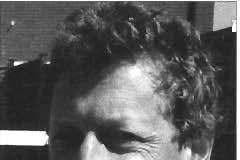
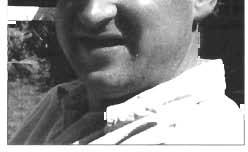
Mike Bentley came to King's in 1969 to teach Maths and Physics after training at Bede College, Durham, where he specialised in Maths and Physics. He lived in St. Alban's where he became Assistant Boarding House Tutor under the then Headmaster, Wilf Thomas. In those days St. Alban's was the Junior Boarding House for pupils aged between eight and thirteen as well as being the Junior School. In 1976, he was appointed Senior Fourth Form Master, taking over from AI, Cubberley. After several years, Mike moved to School House as a live-in tutor under Housemaster Alan Stacey. At this time, School House was one of three 13-19 boarding ho11ses of around fiftyfive boys. In 1978 he married Alyso~~and moved out.
M'hen I arrived in 1978, Mike was Master in Charge of the Middle School (Lower and Upper Fourth Forms) but by 1999, when he retired from this post, the title had changed to Head of the Middle School and then to Fourth Form Co-ordinator. That is an average of almost one name change per headmaster.
Over this time he was i~lstrumentalin introducing many clubs and societies for Fourth Formers and undertook various administrative initiatives. Mike helped with the Scout Troop, with fly fishing and with camps at the Old Chapel. He took a great interest in Fourth Form staff, many of whom went on to success in other areas of the school or elsewhere, and worked with as many as six heads of the Junior School.
He tundertook the organisation of admissions to the school at l l+. Thanks to his efforts, though not his alone, of course, Testing Day always ran smoothly. On the sporting front he took over from Peter Curle as master in charge of tennis, but his main sporting love was hockey.
At school he was a star county player, in Yorkshire. At college he played for Durham University so it came as no surprise that such a talented colleague should find himself in charge of hockey over a period of some fifteen years or so. He ran the school lst, 2nd and U16 XIS as well as being a county U16
coach and an assistant U19 coach. I am sure that it was because of his efforts that the school was represented in the Worcester U19 side when it won the Midland Championship twice in succession.
In the early 1980s, his teaching of Mathematics became fulltime and he took classes, over the whole ability spectrum, up to O level. In later years he came to specialise with the Fifth Form lowest set. With this group, which was deliberately kept small, he worked wonders ensuring that its members assimilated techniques in the most efficientway. This enabled them to pass the public exam at grade C or above when, maybe, many of them thought they had no hope of such success.
When I came here for interview, he was described by more than one colleague as being one of the best teachers in the school. I have never had cause to revise that for I came to know what they meant. He always did as much algebra as possible and understood what had to be done to ensure pupils understood what were relatively simple concepts in Mathematics but which, for some, were rather difficult ideas. I observed that he could get inside their brains as few others did. This was not always easy for those pupils but his skill paid off when the results came out.
As many will know, Mike suffered, over many years, from stress which came from a number of directions. It was a combination of effects that finally led him to retire.
Mike's contribution to the school has been enormous. Equally, his contribution to the Department has been unstinting. I have certainly welcomed his very practical advice in areas where he had more experience of what worked and what did not. He was not afraid of hard work and I am sure there are generations of OVs who are, in retrospect, grateful to him.
Mike Stevens
E.R.
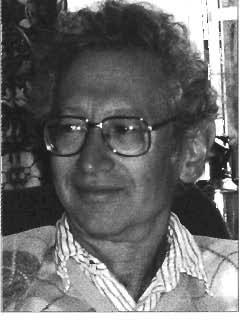
Mike Stevens, who retired through ill-health after twentytwo years at the School, was a first-class 'schoolmaster' in the best sense. For one thing he taught two subjects - Classics, which itself of course combines many disciplines, and English. In both he was a committed academic, a real lover of the subjects for their own sake, who required both of his students and of himself the highest standards of academic rigour. His pupils knew they were getting real value for money from a real professional. The 'dumbing down' tendency in education over the last few years found in him an implacable enemy!
Yet Mike contributed far more to the School than just his classroom teaching. For the whole of his time here he ran rugby and cricket teams (as a New Zealander, he sees himself as particularly qualified to coach rugby!),and for many years he was 'Mr. Old Chapel', not only organizing the Lower Remove camps but running or helping out with all kinds of other activities that took place there. He was in fact a great lover of trips to all kinds of places, especially where he could indulge his passion for literature, art and walking. There were English Department excursions to Haworth and to the Lake District (he's a Wordsworth enthusiast), holidays walking in the Pyrenees, and art history trips to Italy, where Mike, first inspired by Peter Diamond, developed a passion for, and considerable expertise in, the painters of the Renaissance. These activities, as well as less obviously rewarding ones (like running the Upper Remove exams for as many years as anyone can remember!) were carried on without any concern for the
time or energy that they demanded - and they demanded an amount unheard of in the average teacher!
In 1984 Mike was appointed the first housemaster (as it was called then) of Oswald Horlse, which he ran for fifteen years. The routine adrnin side of this job takes an extraordinary amount of time, quite unknown to those who don't have to do it, and Mike did that, too, with uncomplaining efficiency.As for the more visible pastoral dimension, several generations of OVs can be grateful for being kept on the rails by his no nonsense, efficient control of seventy pupils!
As a member of the Common Room Mike was great value in both the serious and the recreational modes. In discussions about the way the School should be run he was a firm guardian of integrity: we all knew he could spot hypocrisy and pretentiousness a mile off,and it was a tough discipline to have to run one's ideas past his brand of withering humour! He took an active part in all sorts of Common Room relaxations, too, liquid and otherwise, and in particular was a stalwart of the staff cricket team - and the OVs' 2nd team - for twenty years; he was usually first in to bat, and invariably first to the post-match sandwiches. His enthusiasm even survived the incident in 1986 when, in an affront to all his feelings of the time, he was bowled first ball by a woman.
When the School went fully CO-educationalin 1991, it would be fair to say that Mike was not in the forefront of enthusiastic supporters. So it was both a surprise and a delight when, a mere seven years later, this apparently confirmed bachelor was bowled over by another woman and married Patricia Sanger! Now in retirement he can reflect on a monumental contribution to the School - a man whose combination of selfless energy, demanding standards, and self-deprecating humour make him impossible to replace and impossible to forget.
Rosemary Diamond
Rosemary worked for over twenty years at King's, for the last ten as Head of the English Department. She was a colleague for whom everyone had the utmost respect and admiration. Generations of students have been inspired by her scholarship and her quiet enthusiasm.
The Inspection Report of November 1999 said that Rosemary led her department
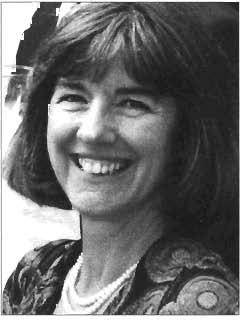
with intelligence and humanity. We who worked with her saw these qualitiesand many more every day. Itcan'thave been easy to run a department whose individual members held so many responsibilities in other areas of the school. She held the team together by being infinitely patient, very skilful indeed in her management, and by being someone with whom and for whom we wanted to work. Strong minded but not inflexible, receptive to the views of others but with a clear vision of her own, compassionate but not sentimental, she led from the front and we followed. It is ironic, of course, that Rosemary retired just two terms after the English Department, the team she built, moved into itsmoreintegrated setting in Choir House.
I was fortunate to work with Rosemary on a number of theatre productions, including 'Macbeth', 'The Devils' and 'The Sea'. The last of these was the play we took to Worcester, Massachusetts on the first American exchange, something that Rosemary had dreamed about and then made happen. Rosemary always brought to rehearsals a breadth and depth of knowledge, unflagging energy and an artistic integrity which was totally uncompromising. She was responsible for several
other school productions, including a gripping 'The Crucible', a lavish 'Royal Hunt of the Sun' and an 'Oliver' that left everyone wanting more. She was a wise and caring assistant tutor in Eliot and Bright, and it naturally fell to her to look after house drama productions. She skilfully guided and assisted the student directors when necessary. 'Whose Life Is It Anyway?' was one of the very best house plays.
Rosemary was also responsible for a large number of Library Evenings. All of these were great fun, but they also challenged the audience with their artistic and cultural content. She arranged innumerable theatre visits and study weekends. She was partly responsible for organising and taking several sixth form cultural trips to Italy. What I remember most about two of these trips are Rosemary's art history passion and knowledge, her ability to prepare delicious meals for twenty odd students from the most basic ingredients, and a very special pair of green shorts.
Rosemary's was always a very important voice in meetings. She was listened to, not because she was loud or vehement, but because she was wise. I often felt after Rosemary had spoken, 'I wish I had thought of that', or 'I wish I had had the courage to say that'.
Rosemary is a woman of principle. She feels that in teaching nowadays there is a danger that presentation is perceived as being more important than substance, and she does not want to be part of that. Retirement from King's, however, does not mean Rosemary will stand still. As I write this, during Autumn half-term, she is with her husband Peter teaching in Mozambique. They plan to take in several other continents during the next year. We wish her and Peter a long, happy and healthy 'retirement' together.
S. Le M.
Jon
Ton
Whitehouse
Whitehouse was with us as d Head of Design and Technology for five energetic years. During that time he extended the size of the Department and the range of its activities. As a result there are more pupils taking public examinations in this subject than at any time in the school's history. One illustration of the enthusiasm he generated was provided when Shulah Oliver became the only girl in the country to reach the National Fi~l;lls01 the .* Young Electronic Designer Awards and there to win a prize.
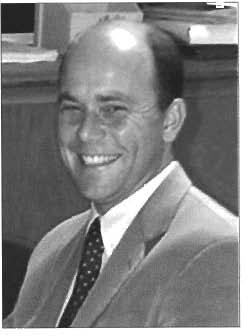
In addition to Design and Technology, he was also active in the teaching of the Diploma of Achievement to the Sixth Form. Here, his innovation and creative ideas were particularly welcomed and enjoyed. Various Young Enterprise groups have come to be grateful for these qualities as he inspired them to succeed and in the national competition his companies always did well, one group reaching the National Finals.
He was an Assistant Tutor in Choir House and coped admirably as acting House Tutor for the months of HMA's convalescence. He also found time to fit in a short tour of duty with the RAF section of the CCF.
Peter Hibbert
Peter has been at King's for seven years. He first joined he Physics department as a full time member of staff'but after one year he realised that he was unable to spend as ~nr~chtime as he would like pursuing his own business interests. So for his remaining six years he taught part-time.
Although he became a part-time member of staff his commitment to his subject and his students remained as strong as ever. In the classroom he was hugely successfr~land his exam classes always gained excellent results; a testament to his hard work and determination. His lessons were widely talked about and enjoyed by the pupils. It seems that whatever the area of physics he was covering his examples and topics of conversation came back to the same starting point; that of fishing. To say that Pete is a keen fisherman is a real understatement, he is fanatical. On the mention of salmon a distant, glazed look comes into his eyes and a small grin flickers across his mouth. He has travelled the world in pursuit of his hobby visiting Russia, Japan, the Antarctic, Alaska, Iceland and (of course) Scotland to name but a few of his destinations - and a11 on a part-time teacher's salary!
I'ete took over the running of the Chess Club and in.jected ncw life into it. After-school practices had a good attendance and matches, once a quiet, studious affair took on an electric atmosphere. The inter-house chess tournament was a sight to behold with competitors engaged in battle with tense crowds looking on. It was great fun with Pete at the helm and I am sure will continue to be so.
Pete is sadly missed in the department. He was always one for maintaining high standards in all that he did and he shared many a good idea with the rest of us here. Maybe he will return one day, and until then we wish him the very best of luck in all that he does.
H.M.A.
His enjoyment of the outdoor life led to his involvement in the Himalayan Club, and he went to Nepal twice. He led the second group for all their training and fund-raising as well as on the expedition itself. His planning was formidable but he always appeared relaxed and in spite of the pressures of looking after the students on the trek he never lost the informality of the relationship. .
Not one to stand still for long he was always on the look out for new challenges and he leaves us to discover the delights or otherwise of teaching Design and Technology to the younger age groups at Farleigh School. His degree of conlmitment is considerable as one Young Enterprise group found out when he gave up part of his family holiday in their cause, and there are many other members of the school, past and present, who have reason to be grateful for his encouragement and support. We wish Jon, Lucy, Hannah and Olivia every success in the future.
P.J.B.
Mark Schramm
Mark leaves King's after just two years to take up a post at Clifton College, Bristol. He arrived as an NQT but quickly learnt the ropes to become a fine teacher of Physics. His lessons were clearly presented, accurate in content and he made the best use of the Internet as an aid to teaching. As a gifted climber himself he helped to raise the profile of this adventurous activity at King's and he was also a valuable assistant to those running Fourth Form games and the D of E scheme.
After studying Theology at Oxford Owen trained as a teacher it1 his home town of Cheltenham. He joined the staff at King's straight from training College and he soon established himself as a popular and respected member of the Common Room. He quickly developed into an effective classroom teacher and was a conscientious assistant tutor in Choir. He was a significant contributor to the Sports department, most notably as a keen soccer player. Owen left King's to work in the maintained sector and I have no doubt that he will bring to his new work high professional standards combined with humour, humanity
and integrity. In his two years here he was a marvellous colleague and friend; he bore the relegation of his beloved Queen's Park Rangers to the Second Division with characteristic stoicism !
M.R.D.
Jackie Golightly
Jackie had only been with us for one year but during that time she made a great impression both as a teacher of French, Spanish and German, and as Head of Fourth Forms. She brought a fresh approach and new ideas to the Modern Languages department and her contributions to departmental meetings were much appreciated by us rather more mature language teachers! Her job in the Fourth Forms was especially challenging as it was a new post with no previous examples to act as a guide, but she carried out the duties with sensitivity and thoroughness. We wish her well in her new school.
Kathy Kirnberlee
Life in the Common Room will never be the same again. After almost thirty-five years dispensing tea, coffee and sympathy to quite a few generations of teachers, Kathy decided it was time to hang up her overalls and spend some time pampering herself! She started working at King's as a temporary job and liked it so much that she stayed with us for all those years. She has seen out several Headmastcrs, and she oversaw the removal of all the kitchen stuff from College House to Hostel House. The big difference she witnessed was the arrival of a dishwasher - a great help when so many of us drink so many cups of tea! We wish her and her husband all the best in their retirement.
Over the year the Common Room has welcomed eight new members of staff
Susan Bayford has been a member of the Classics department since October 2000. She graduated from Leicester University and later took further degrees from London University. She has taught in several schools, in an international college and for the Open University. Her interests include theatre, opera, ballet, history, archaeology and travel.
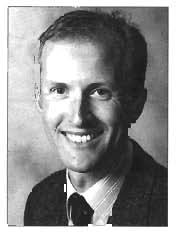
Richard Davies is another newcomer to the Physics department. He read Applied Physics with Electronics at the University of Salford. After six years working offshore he gained his PGCE at Strathcyde University and has taught Maths and Physics for four years at The Glasgow Academy. Richard is a keen mountaineer and rower and in 1999 he won a Gold medal at the Commonwealth Regatta in Canada.
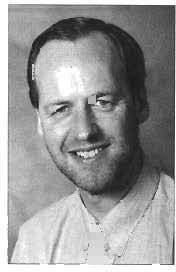
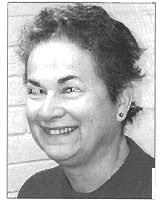
David Haddock arrived in the Spring term as the school's new Head of Physics. Having graduated from Oxford University with a D.Phil in astrophysics, he worked briefly as a software engineer before joining the teaching profession. Since then he has taught physics at Maidstone Grammar School, Oundle School and Benenden School where he served as a housemaster. Married with three children, his interests include trying to play the piano, hill-walking and growing his own vegetables.
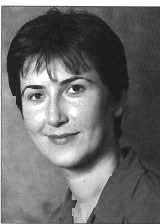
In September Elizabeth Charman joined the English department. A former pupil of King's, she graduated in English Language and Literature at Aberdeen University and has recently been teaching English at Christ College, Brecon and then at Rugby School. At both schools she became heavily involved in drama and music which she lists as her main general interests, as well as dance and sport. Other interests include reading, writing, drawing and guinea pigs.
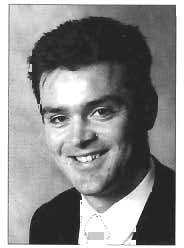
John Hughes has joined the school to teach Mathematics. Having graduated from Leeds University he taught for twelve years in Leicestershire, where he was Head of Computing at King Edward V11 School Melton Mowbray, before moving to Worcester and becoming an Analyst/Programmer. The demand for A/Ps 'plumetted postMillennium bug' so John returned to teaching. His son is a member of the school and a cathedral chorister.
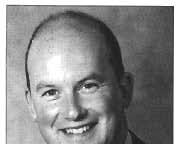
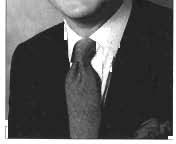
The new Head of the English department is Andrew Maund. Andrew read English at Queen's College, Cambridge and taught at Bromsgrove School and most recently at Queen Mary's Grammar School, Walsall where he was Head of Drama and then Head of English. He has been a CCF officer (captain, Army section) for fifteen years and is currently studying for an M.Phil in 'Literature and the Internet' in the English department at Birmingham University. Drama and theatre, hill-walking, skiing and Tai interests. :hi are amongst his
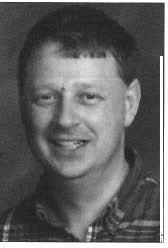
Mike Terry is to teach Art part-time. He graduated in Fine Art from the Slade School and also gained an MA in Computing and Design from Middlesex Polytechnic. He continues to practise his own painting and combines this with teaching. He has worked in the Further Education sector as well as 1118 schools. Mike is the husband of Rowena Terry and they have three children, all boys.
Chris Wilson takes over as Head of the Design and Technology department. Chris graduated at Brunel University where he also achieved his PGCE. Before starting at King's he taught for 8 years at Hereford Cathedral School where he ran skiing trips and coached 1st XV rugby. He has many hobbies but he says he particularly likes sports, woodturning, motorcycling and drawing buildings.
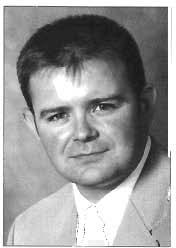


Despite the Foot and Mouth epidemic that lead to the cancellation of many military and adventure training activities the CCF has continued to flourish. The RAF section is now some sixty strong and the army section numbers forty. We were sad to say goodbye to Sgt. Iain Cowan from 37 CTT as he finished his tour with the team and rejoined his unit (The Queen's Royal Hussars) in Germany. However his successor Sgt. 'Worzel' Reeves has proved a more than adequate replacement. Capt. Nikki Featherstone has taken over the RAF section ably supported by Flt. Lt. Mike Wallis who is one of our parents. We are also pleased to welcome Capt. Andrew Maund, the new head of English to our ranks. For the first time in its hundred and forty year history the senior army cadet is fema1e.C.S.M. Emily Phillips-Broadhurst is doing a fine job. I would also commend Cadet Warrant Officer Mark Southam for his stirling work for the contingent.
S.R.D.

The knowledge of our original cadets has been enhanced during weekly training on Friday afternoons and by the district competitions and weekend training that has been possible. This and a well-motivated intake of new recruits has lead to a section of which King's can be proud.
We began the year at Cannock Chase with the District Orienteering Championship. The team consisting of CSM Ed. Cumming, Sgt. Alasdair Colquhoun, Sgt. Adam Papaphilippopoulos, Cpl. James Gunn, Snr. Cdt. Robert Colquhoun and Snr. Cdt. Tim Woolley finished second with CSM Ed Cumming recording the fourth fastest individual time.
A few weeks later the Military Skills team finished third of twenty sevcn contingents competing in the District Military Skills Competition held at Swynnerton Camp. Congratulations to CSM Ed Cumming, Sgt. Alasdair Colquhoun, Sgt. Adam Papas, Sgt. Toby Collison, Cpl. Emily Phillips-Broadhurst, Cpl. Andrew Thompson, Cpl. Tom Weddel, Snr.Cdts. Tim Woolley and Robert Colquhoun and Cdt. Will.Jones.
Full credit for the success of the contingent must be attrih~~tedto the support and efforts of Lt. Col. Davies our O.C., Capt Featherstone our training officer, Capt. Rudge the section commander and our SSI, WO 2 Hinds.
The highlight of the CCF calendar is always the annual central camp. This year this took place at Saint Martin's Plain Camp, Folkestone.The week's programme ran from the 14th to the 21st July and involved military and adventure training, full bore shooting and a night exercise. A day trip to Calais was also fitted in to our busy schedule. The directing regular army soldiers consistently praised the contingent for their enthusiasm and skill. There were many memorable occasions during the camp but two in particular spring to mind. The first was at the end of a gruelling day of ambushes and section attacks when the cadets had to crawl through a stream of very cold water along a C.Q.B. lane. Not wishing to miss out on the fun, Capt. Featherstone leapt into the stream and disappeared under water to re-emerge on the other side of a bridge. The second involved a challenge issued by the regulars at a stand on camouflage and concealment. Cadets were required to crawl a considerable distance in full kit and get to a Land Rover without being seen. Sgt. Cameron Baldry 'ghosted' his way to and from the vehicle without being observed by any of the
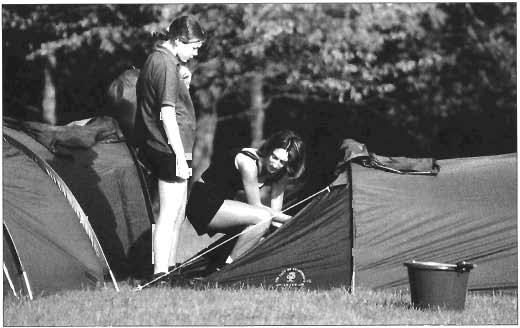
eaglc-cyed regular soldiers manning the stand. The twenty four hour exercise culminated with an attack on Lt. Col. Davies and Capt. 'Bloodaxe' Rudge.Our thanks to them and to Capt. Featherstone and W02 Hinds for an enjoyable and successf~il camp.
Emily Phillips-Broadhurst.
It has been a very busy yet very enjoyable and highly rewarding year for the CCF (RAF) Section. Along with the usual Friday evening parade during which cadets learn a variety of new skills, both military and adventurous, which are taught by the older cadets or NCOs at the school, we have been canoeing, climbing, swimming, gliding and flying. Much of the training was hampered by the onslaught of Foot and Mouth, which meant that many of the Night Exercises and Activity days in Snowdonia were cancelled. However, despite the Foot and Mouth, the horrible weather conditions and flooding experienced earlier in the year, the section still went on to produce many successes from its ranks.
In the Easter holidays, two of our cadets, Sgt. Andrew Wright and Sgt. Bonnie Posselt successfully completed their Gliding Scholarships, where both were able to fly solo and gain their silver glider wings. They are the first in several years to gain their silver wings from the Section at King's. In the summer, Sgt. Stuart Copson completed the RAF Pilot Navigators course at nearby RAF Cosford. The six hours flying and many Inore hours ground schooling that the course involves is a truly arduous and outstanding achievement. Cadet Warrant Officer Mark Southam was on an RAF Flying Scholarship in the summer, attending a strenuous two days of interviews at Officer and Selection Ccntre at RAF College Cranwell in Lincolnshire. This award gives a cadet twenty hours flying tuition. Mark went on to fly solo in well under the thirteen hours that the course dictates, pass several ground examinations and success full^ complete the course. The twenty hours of flying that the scheme involves stands him in good stead to go on to complete his Private Pilot's License.
This year there were two camps, one at Easter and the other in the summer. On such camps, cadets get a taste of RAF life, living on the base for a week and conducting many activities, including station visits, shooting, sports activities and flying. The Easter Camp was held at RAF Sealand in North Wales and was attended by six cadets who took part in the usual activities, where Sgt. James Wallis' flight was narrowly beaten in the interflight competition. For Summer Camp, ten cadets and their commanding officer, Flt Lt Mike Wallis departed for RAF Uxbridge. Sgt. James Wallis did well again, where his flight won all competitions including the Night Exercise, where thev rescued both downed pilots, kidnapped several members of
the opposition and collected much of the missing information that was scattered throughout the base. This all lead to a very convincing win over his rival flight. All cadets behaved very well, impressing the two other schools who were attending, Merchant Taylor's, Crosby and Merril College of Derby, so much that inter-contingent exercises are being planned between the schools to take place throughout next year.
During the year there were many flying days, in which all cadets who wished to go flying were able to do so. Flying takes place at RAF Cosford near Birmingham, in the RAF's brand new ab initio aerobatic trainer, the Grob Tutor. During the flight cadets learn the basics of flying or can experience the thrill of some aerobatics. Further flying days are planned at RAF Cosford and there is the opportunity of some helicopter flights at RAF Shawbury for next year. The training which takes place after school each Friday has meant that eight cadets have passed the Part 1 tests, nine cadets passing the Part 2 tests and a further six cadets passing the challenging Part 3 tests. The external inspecting officer conducting his annual inspection scored the section very highly in all areas and praised the overall success of the section this year.
Special thanks must go to Flt Lt Mike Wallis and to his wife Lorna who have both given tremendous support to the section, making this year very successful. Mike has on more than one occasion given up his own free time to come and run the camps and he has put in countless hours to ensure that Friday evening parade runs smoothly and that lessons adhere to the plan that he has devised. The forthcoming year promises to be just as successful, with more exercises, flying and gliding planned. All of this together with a very healthy influx of new cadets will mean that the section's cadets will continue to produce many more successes, doing both themselves and the school proud.
CWO Mark Southam
During the past year the number of students working towards one of the three awards was as high as it has ever been. Whilst activities have continued in the Service, Skills and Physical recreation sections, the Foot and Mouth crisis severely curtailed expedition work. A three-day Gold Award training expedition to North Wales was the only event to escape the
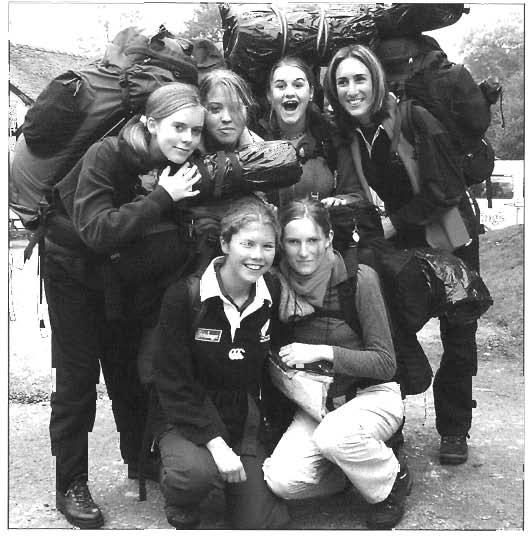
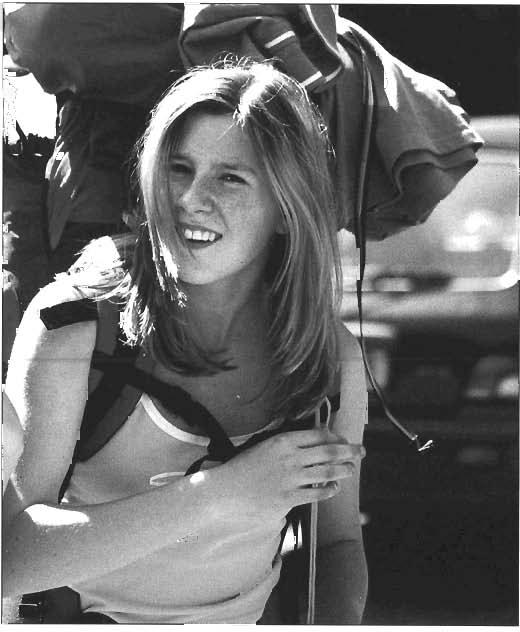
restrictions imposed as a result of the spread of the disease.
The Service Section provides participants with the opportunity to help others less fortunate than themselves or to undertake training that will help them to make a contribution to society in general. At Bronze level many followed a course in accident prevention. A First Aid course was successfully completed at Silver level. Other forms of Service included lifesaving, helping children, helping animals and improving the environment.
School sports teams have provided an activity for many in the Physical recreation section. Sub-aqua, horse riding and dance are activities that were also followed in this section.
It is clear that, despite the curtailment of expedition work, those involved in the award scheme were involved in a wide range of activities during the course of this year. It is intended to complete the Expedition work during the next academic year.
J.T.W.
Two teams were entered into the British National Schools League during the Autumn and Spring terms.
The A team consisted of Peter Brown, Robert Colquhoun, James Gunn, Andrew Thompson and Alex Walker whilst the B team included Alasdair Colquhoun, Tim Woolley, Stephen Llewellyn, Alice Kenrick and Edward Cumming.
There are fifteen divisions in the league, the A team shoooting in division 3 and the B team in division 8. During the Autumn the A team finished in third place and the Bs won their division, with a round to spare; Alisdair Colquhoun was the division's top shot. The Spring term saw the A team keeping their place in their division and the B team being promoted to division 7, both teams finishing in third place.
Peter Brown, James Gunn and Robert Colquhoun represented Worcestershire at Junior level.
This year saw a watershed for the shooting teams as six team members left the school, but enthusiasm has prevailed and recruitment has not been a problem. For the first time we have two girls in the teams and we look forward to more success.
R.M.H.



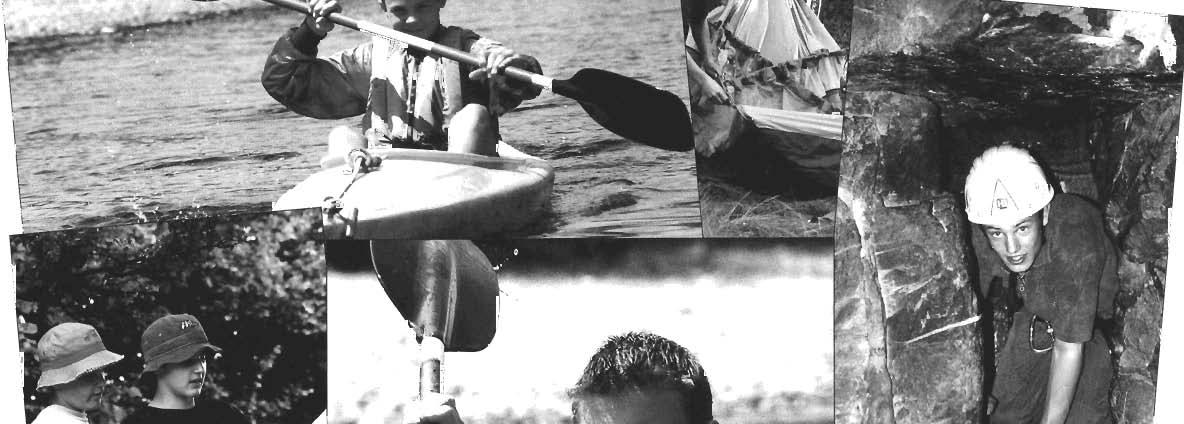
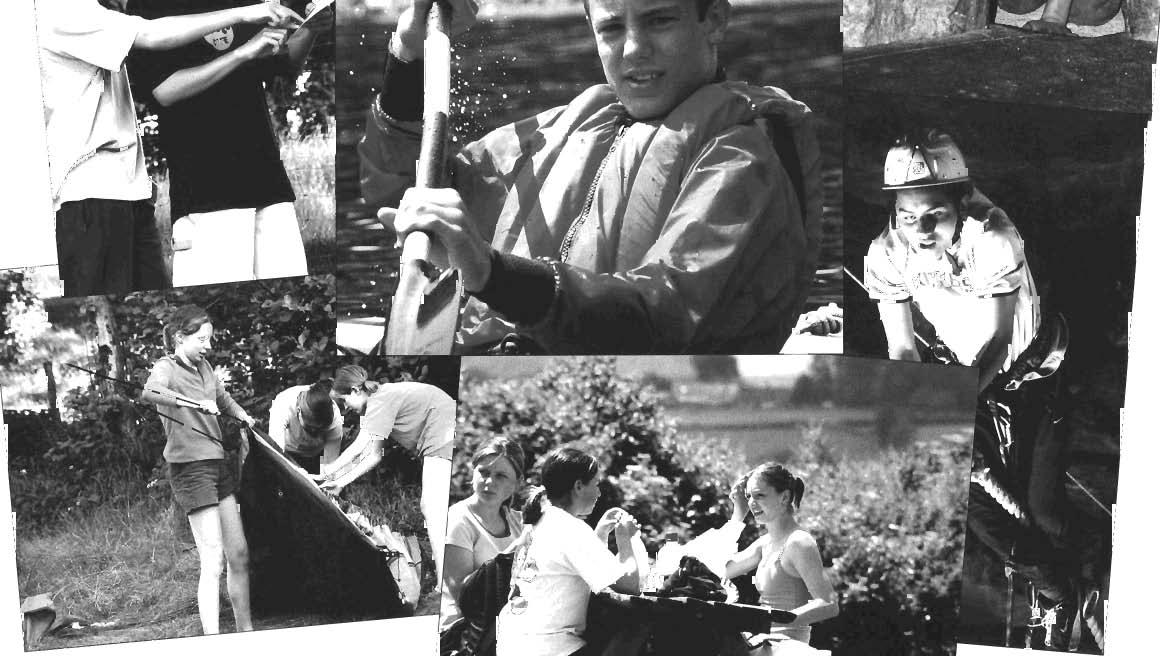


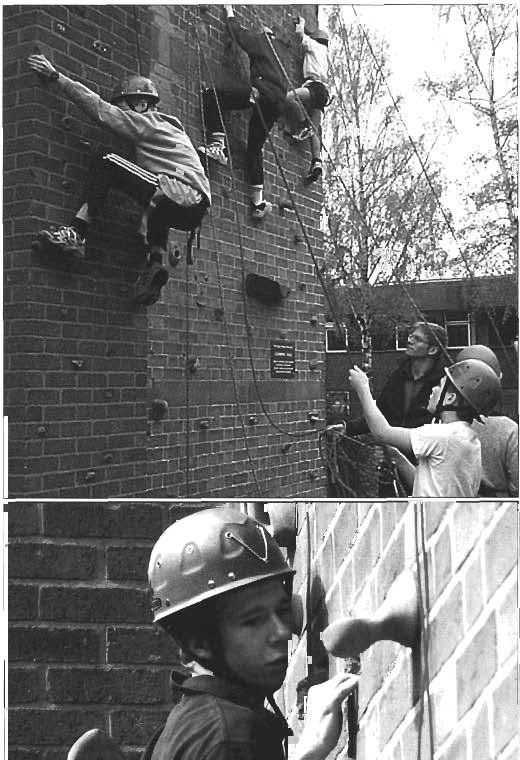
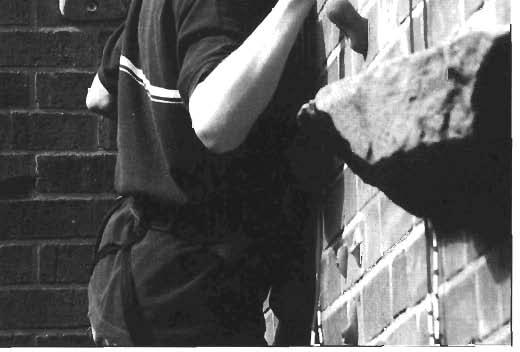

The International Sports Yearbook of 1996 rated climbing as one of the fastest growing sports in the world. This is still true today and climbing continues to be a popular activity at King's. The reasons why people climb are many and diverse. George Mallory's motive for climbing Everest in the 1920s was 'because it's there'; other commonly cited reasons include 'to see what is on the top'. Today these reasons, and the associated risk with the adventure, remain valid. Climbing not only demands immense physical effort, it also demands enormous mental preparation. This is as true of a novice climbing the school wall as it is to a professional climber attempting a new route in the Yosemite Valley.
The Activities Fair in September saw a good number of younger pupils join the club. There is now a significant number of climbers of all ages enjoying the challenges of our wall on Wednesdays and Saturdays. The Foot and Mouth
outbreak unfortunately curtailed a few activities during the year forcing the club back onto climbing walls. Duncan Griffiths made the first assent of the 'blue' route made from tiny holds (which MES described as being 'ridiculously small'). No one has managed to complete his route since, though many have tried. James Greenfield came close a few times but found success on other technically challenging routes. The impressive overhangs and boulder facilities at Martley or Gloucester gave good challenges to many other climbers, and much entertainment to their belayers!
The club is grateful to SCC and MES for voluntarily giving up their Saturday mornings, as well as Wednesday lunchtimes and after school, regardless of the weather conditions.
Henry Watson

The winter term is the season for introducing new trainees to the underwater world, and this is done through British SubAqua Club's training scheme. Volunteer Instructors from Worcester Divers this year trained twelve pupils in the school pool and in the classroom over some twenty hours before the new divers were ready to take to open water. This is a lot more training than a baby seal gets from its mother, but then all a seal has to do is learn to snorkel!
Our biggest ever Red Sea trip at October half-term saw sixteen divers from Worcester heading for Gatwick and the MV Mahy. One extra stowaway was so keen he flew to Cairo, got on an overnight bus and beat us to Sharm by four hours! In fact there were eight pupils and one OV instructor in the group, the rest being members of Worcester Divers, with whom we work closely at maximising the underwater fun that there is to be had. On arrival we were greeted by yet another OV instructor - this time, one who was working his gap year in a dive centre at our destination. Peter Finlay, Harry Simms and Andy Walker gained their Sports Diver awards during the trip, while Seb Pearce (OV) helped with the instruction and Ian Kingsley (OV) was left ashore to find us a keen price for the desert quadbiking on our last day.
Do you know how flat a tennis ball goes under a pressure of six times the atmospheric norm? The answer - very flat indeed! We found this out when eight of our Sports Divers ventured to this 'depth' - equivalent to 165 ft under the sea - in a recompression chamber on the Wirral during the Spring term. Fortunately, since we didn't hold our breath as a tennis ball does, none of us got the least bit flat ourselves, though our voices did go extrenlely squeaky due to the density of the air at such a high pressure, and we did feel just the teeniest bit squiffj.'Martini's Law' says that for every 10m you go below 20m, the narcotic effect is the same as drinking a dry martiniso at 50m, we were having quite a party! The good news is - as you come up, the narcosis vanishes as quickly as it arrives - and no headaches!
The Saturday at the end of the Easter holidays found 8 of the new group of Club Diver trainees enduring mirror-like seas, sunshine and blue skies (and water not very far from freezing) at Fort Bovisand in Plymouth. Sunday was like a different month, with huge waves dashing themselves into spray on the harbour wall, so all we could manage was a grovel in minimal visibility around the breakwater fort, identifying such treasures as a sunken barge, a garden gnome and a less than pristine Hoover twin-tub.
July brought a lack of exams and wonderful underwater visibility for at least one weekend, and several members had memorable diving - again out of Plymouth, with Claire Bradley gaining her Sports Diver award just a week before the end of her school career. Now at University in Plymouth, we wish Claire good diving for the future.
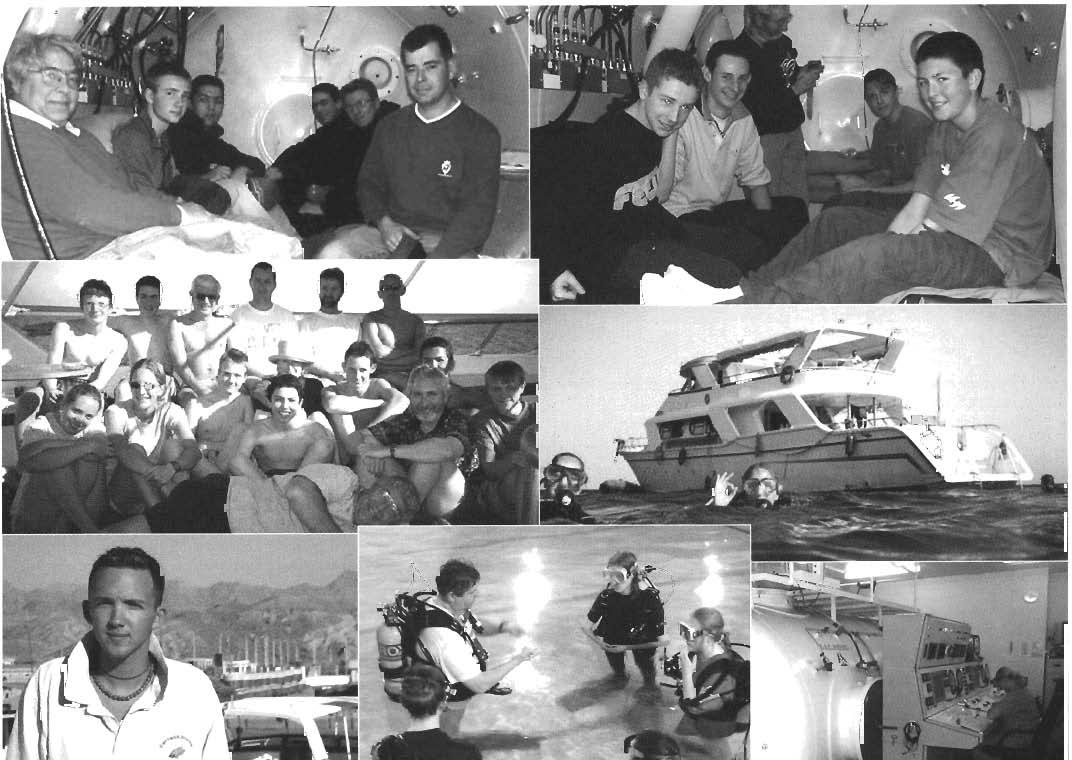
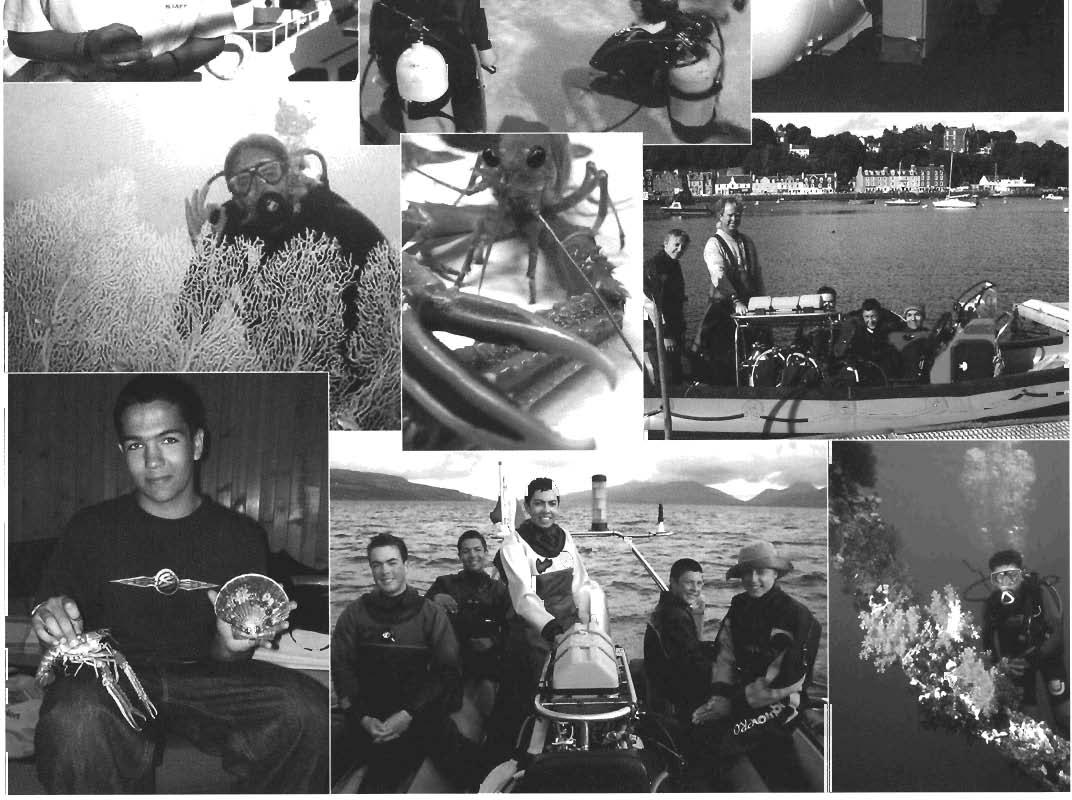

The five-day camp-and-dive trip was rather oversubscribed, with ten pupils stressing our instructor team to the maximum. James Davis got his Sports Diver award, and the weather was so bad one morning that we went to Plymouth's (splendid) aquarium instead of trying to go diving.
But once again, my favourite trip was to Tobermory at the end of August. This destination has it all the best of British scenery above and below water, a languid pace of life, (as divers, we need to be languid or we breathe our air too rapidly), a long list of wrecks to explore, and an abundance of free seafood for dinner! This time, we even gained the company of Frank Loveder, our club's erstwhile driving force, without whose efforts King's Sub-Aqua Club would be but a pale shadow of what it is today.
The most memorable dive was on the east wall of Bo Fascadale, a rock pinnacle five miles from Ardnamurchan in the direction of Skye. It was a perfect sunny day with a light westerly swell when we ventured here - our furthest ever from the shelter of the Sound of Mull. We only went a portion of the way down the sheer rock face, carpeted in soft corals and anemones, which stretches down to 60m depth - but what a spectacular sight, and seen by so few humans!
The coming training season beckons, with a good response to our trydive offer publicised by Dan Newcornbe and his helpers, and with more school staff now actively involved in the club, this could be the last 'VigRep' originating from my keyboard, though I hope to continue assisting in the club's diving activities for some time.
For more information and pictures, log onto the club website via: http://ww~~.ksw.org.uk/activities and then click on 'Sub-aqua'
John Kingsley-Diving Officer

We have participated in a number of competitions and fixtures this year and enjoyed victories over Alcester, and Hereford Cathedral and good performances against such tough school sides as Shrewsbury. We did very well in the West Midlands Schools' Championships, coming fourth overall and in the West Midlands British Youth Championships Kristian Davies qualified for the nationals. He also won the County Jubilee Foil competition.
The national Public School Championships in March at Crystal Palace also went well with good performances from a record entry of seven fencers in the club. Mark Farmer has captained the side with confidence ably supported by Christopher Fulton as captain of the Junior team and Jon Price as a very effective armourer. The most promising new Lower
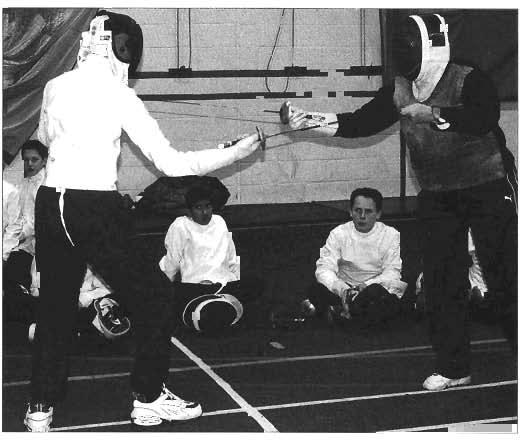
Fourth fencers (out of a very strong year - over thirty involved took part) were Sophie Le Marchand, Rebecca Busher and Nick Baxter.
This year we say goodbye to Mrs. Hilary Hammond after over twenty years as coach. She has produced some excellent fencers here and worked tirelessly to promote the sport here, driving pupils to competitions all over the region, often very early on Sunday mornings! She retires with our best wishes and considerable thanks for the contribution she has made to fencing at King's.
There will be a new fencing salle as a part of the new Fitness Centre in the re-furbished Annett Building, from September 2001. This will include a metallic piste with electronic recording equipment and kit. A new community club for all ages and levels of experience will be established for the Worcester area, based at the King's School, with a top coach providing special high-performance coaching sessions with a view to producing an Olympic fencer. This is-only the second such venture in the country and will be part-funded by the British Fencing Association. Keith Smith, the President of the British Fencing Association, has written to us saying that he is 'very excited by the whole project. The whole concept of British Fencing working in tandem with local communities and schools has to be the right one and this will benefit your school, local clubs and British Fencing.'
A.J.T.

Last year I wrote that 'with many highly competent juniors progressing to senior level the outlook looks very promising'. Now if we ignore the poor literary style of this writer that quote was certainly true for the first half of the season when we were unbeaten. This would have been our most successful year ever if we could ignore the second half of the season. Yet we are not allowed to do this so the season ended up with as another 'what might have been' year and what a year it could have been. On paper we had the best side in the history of the club with the stalwarts of Ben Pitts, Michael Fraser, Tom Rosoman, Robert Melville and Edward Cumming in the side along with promising newcomer Chris Mullender. However the side was let down by certain individuals not turning up to matches when they were needed or giving only a few hours' warning of why they weren't able to play with the usual uninspired excuses such as 'I've got a train to catch' or the favourite 'I have a family meeting to go to'. If you can't play at least try and give an imaginative excuse.
The season started in high spirils with Pitts becoming the captain of the club and Cumming his able vice-captain. Fraser took over the vice-captain position on a temporary basis when Cumming was unavailable due to exam commitments. The enthusiastic approach to the club created by the new leadership inspired many Fourth Formers to join the club and there were more juniors this season than in any other year of the club.
In the Malvern College game, hopes were high for an early season win but the match ended up at a tantalising draw of 5.55.5 with PMH fuming at missed chances. If the games had been adjudicated at an hour not an hour and a half we would have won nine points to two but due to lack of concentration several middle board players were guilty of throwing wins away.
However we soon chalked up our first win of the season against RNIB College Worcester 3.5-2.5. There were good wins from Fraser, Rosoman and Mullender with Pitts gaining the vital draw for the win after a prolonged twenty minute argument between the coaches of both sides.
The greatest achievement of the season was the thrashing of RGS Worcester away from home when we won 8-3. It was their first defeat for several years and the first time King's had ever beaten the Grammar at chess. The team's use of psychology in
the pre-match warm up completely overawed them. There were several easy wins and we had won the tie by the first hour and so the remaining games became rather academic. Rut all good things must come to an end and after our triumphant first half of the season, the second half is better best forgotten with three heavy defeats against the same sides we had played the previous term. It was a sad way to end the season but there were some noticeable performances in these games. Pitts had an unbeaten second half of the season and beat the Grammar's number one who had not lost for six years. Mullender retained his impressive record with only one loss in the winter term. It was also a good opportunity to play some promising Fourth Formers in these matches when senior players pulled out. Ben Pitts
A large number of pupils entered a large number of competitions, and there were moments of great success.
(a) In the Cambridge Union Society competition, where each round requires the teams to debate twice - first on a prepared motion and then on one given to them at fifteen minutes' notice - our team of Richard Huzzey and Hetty Eaton got through the first round (i.e. best of six teams) but lost in the second round to KES Birmingham.
(h) Ed Cumming and Adam Papaphilippopoulos represented the school in the long-established ESU Mace competition. Here again we won our first round but were pipped by Bromsgrove School in the second.
(c) Our greatest success was in the Midland Schools Debating Competition. Ed Cumming and Richard H~~zzeycombined to win several rounds, arguing against s~~chthings as Political Correctness and the importance of winning elections ~lntil,having reached the four-team final, they had to argue against the motion that scientists are preferable to artists and came an agonizing second to Wrekin College. UTestill got a cup for second place, and Ed won a silver-plated gavel for making the best individual speech.
(d) We entered the riotor~s Motorola Mock Parliament competition for the second year, and for the second year our twenty-minute videotape of a parliamentary occasion came second to Pershore High School in the region. Several people of different ages took part, including Hetty Eaton as Prime Minister being questioned by Adam Papaphilippopoulos as Leader of the Opposition, and 'paper' speeches were delivered by Philip Arnold and Guy Corbett, Lorna Shaddick, and Ben Pitts. Ed Cumming, as Speaker, tried to keep everyone in order, and his efforts won him the prize for best Speaker in the region - a pair of walkie-talkie radios.
(e) In the ESU P~~blicSpeaking competition, an event for three pupils in the two years before GCSE, Lorna Shaddick was the chairman, Ben Humphrey discussed the proposition that education is a right not a privilege, and Jarncs McCreath asked questions of another team's speaker. Everyone performed splendidly, but not quite well enough to progress to the next round.
(Q The Worcester South Rotary Club run a competition for three speakers of any age, and we entered two teams. Tliese couldn't quite match the winning success of the last two years, and came second and third. The older team consisted of Ben Humphrey (chairman), Helena Culliney (speaker on the danger computer games can do to your health),Jen Tippett (vote of thanks). 111the younger team, which came second, were Philip Arnold, Lorna Shaddick (speaking from the heart on the absurdity of making sport compulsory at school), and James McCreath.
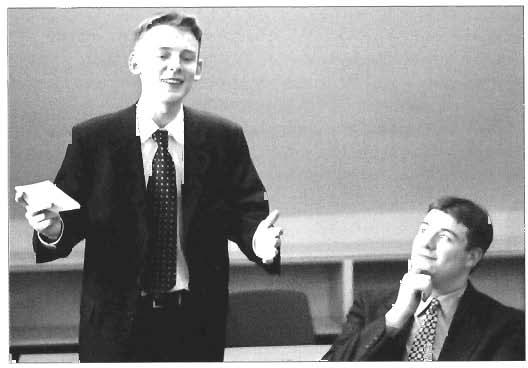
(g) We did, however, manage to preserve our winning record in the Malvern Rotary Club competition. Here all three speakers have to make a proper speech, which they did after some last-minute crisis management. James 'lrtues McCreath spoke straightforwardly enough on the \' of the European Union, Richard Huzzey stepped in at a few hours' notice to discuss whether bobbies on the beat would c11t crime, and Philip Arnold, who discovered at 4 pm that he'd prepared the wrong topic, eventually delivered a speech on the ethics of remoling organs from dead children which displayed none of the panic that went into constructing it! The team won the competition, as well as some healthy cheques and a dinner with the Malvern Rotary Club.
R.N.G.S.

As ~rsualwe entered both the senior and,junior sections of the national quiz competition, Schools Challenge. The junior team (Jonathan Cairns-Terry, Michael Magill, Hayley Simmonds, Gareth Gel-edig, withJoe Street substituting in the second match) won their opening match against Alice Ottley, but lost in the regional quarter-final to KES Birmingham (who normally win the national finals!). The senior team, on the other hand, had the most successfi~l run ever. Adarn Papaphilippopo~~los,Suzannah Essex, James McCreath and Lorna Shaddick won their region by beating RGS Worcester, King's Gloucester and Marling; then they beat Hereford Cathedral School in the inter-regional round and so reached the last eight in the country. The national finals were held here at the end of April, but we lost our first match and so did not get to the last four. It was of interest that only two of the thirtytwo pupils in the last eight teams were girls, and they were both ours! This year, for the first time, there will be an inter-house quiz competition, so our performance can only get better!
R.N.G.S.
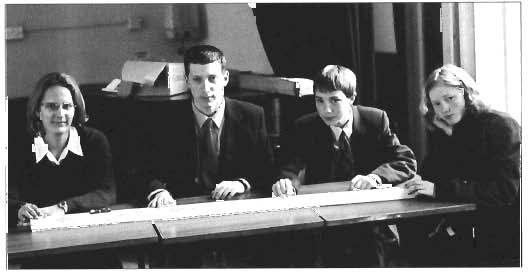


This was set up as a new venture incorporating some aspects of the previous Conservation and Chemistry Clubs. This is very much a fun clttb in which Fourth Form members meet on a weekly basis to carry out a variety of experiments, enabling them to develop their interest and,scientific skills. Pupils have, amongst other things, demonstrated the principles of the jet engine, perfected a technique for demonstrating erupting volcanoes, and investigated how acid rain affects plant growth as well as producing a myriad of pops, bangs and rainbow colours. In the guise of investigating food science we have sampled the delights (or otherwise) of making soda bread and cinder toffee. A nucleus of members who have attended throughout the year have developed their skills in microscopy to study minibeasts and to analyse the wayward behaviour of our ever-tolerant Brine Shrimps. We had a very enjoyable visit to Twycross Zoo, where we were royally entertained by athletic and often voluble Primates which were housed in spacious enclosures with lots of playthings to enrich their lives.
S.C.A./C.E.B.

This past year has been a busy time for Community Service with a number of varied activities taking place mainly on a Saturday morning.
Richard Huzzey and Margaret Keightley were a most co~lscientiousand diligent duo who 'job-shared', helping out in the Cancer Shop on The Tything. Richard continued to help during the summer holidays and LIP till he went to University. The work continues at the time of going to print thanks to the care of Tom Lyon, Lucy Proctor-Nicholls and Katie Potter.
Mrs. Jones is a blind lady who has been very grateful to Jenny Creenhow for her visits each week. Apart from her Social Worker, Jenny is the only person Mrs. Jones sees each week.
Sarah Waldron spent her Saturday mornings working in the library in SaintJohn's where she worked behind the scenes as well as in the main library shelving books. The Chief Librarian thought highly of her help and saw her as a co-operative and helpful student. Sarah enjoyed the work and is very grateful to the Community Service for having given her the opportunity for a work 'taster' scheme in the Library.
Tom Lyon, Lucy Teasdale, Harriet Eaton, Lucy ProctorNicholls and Emily Phillips-Broadhurst have at one stage or another provided help with decorating old people's homes.
Rebecca Campbell and Emma John spent some time visiting people in Sheltered Housing in Barbourne.
I am very grateful indeed for the help from the following members of staff who accompanied the students - CMC, DEB, ER, JM-S and MCP.
C.A.GS.

The Christian Union was set up in September 1999, and meets weekly after school. Pupils of all ages attend on a regular basis, and some good friendships have been established. It is a place where Christians of all denominations, and those who are interested in finding out about Christianity, can come together to discuss important issues, see what the Bible says, and have fun together.
The subject of each meeting tends to be based on questions pupils have, and several guest speakers from local churches and organizations visit each term. In the last academic year, speakers dealt with a wide variety of subjects, including: healing and miracles, suffering, Truth, 'world-views', the Holy
Spirit, creation and evolution, relationships, and evangelism. The pupils enjoy hearing the views of various Christian leaders, teachers and youth workers, and teaching is based on the Bible. Members of the group have also been to a couple of local Christian events together.
We also snpport Christian charities, particularly 'Operation Christmas Child' and the work of 'Let the Children Live', a charity which helps, educates and feeds street children in Colombia, led by Father Peter Walters, who visited the school last year.
Plans for the coming year include a proposed weekend away, the usual Christmas and summer parties, and many more opportunities to spend time together exploring our faith.
S.E.S.
After a lengthy restoration and ref~~rbishment,Choir House was reopened by the Right Reverend Peter Selby, Bishop of Worcester, who unveiled a plaque in the main hall, after brief speeches by Donald Howell, the Chairman of the Governors, and THK. The guests were then in\iited to a buffet lunch in Turing, the new ICT room, once known as the Barn when it was the biggest dormitory in Choir House. The mayor of Worcester represented the city and David Annett (headmaster 1969-79), John Moore (headmaster 1983-1988) and Henry Sandon (Father of three OVs and curator of the Royal U'orcester Porcelain Works Museum for a number of years and a long-standing member of the Cathedral Choir) all attended as patrons of the school. Also present were governors, including the Dean of Worcester, the Very Reverend Peter Marshall, and ex boarding house masters of Choir and representatives of the other boarding houses and their wives, with Barbara Curle (whose husband, the late Peter Curle, was housemaster of Choir 1961-1978 and then Second Master). In addition, Tim Pain (Ch 76-82) represented the boarding community as did other retired staff. Four monitors represented the school.
The early history of Choir House is that of the Choir School which began life in 1882 in College Yard to the north of' cathedral. In the early twentieth century the choristers moved into College Green. It became the prep school for King's in 1927 with the entry of non-choristers and amalgamated with King's in 1943. When St. Alban's was bought by the governors, the Junior School transferred to its new site and i11 1948 L.M. Bailey and his wife moved into Choir House, with thirtyfive senior boys from Trendennyke House in Barbourne. Choir kept its name on the insistence of the Dean and Chapter who were. after all, the landlords. When the Baileys retired in 1961,
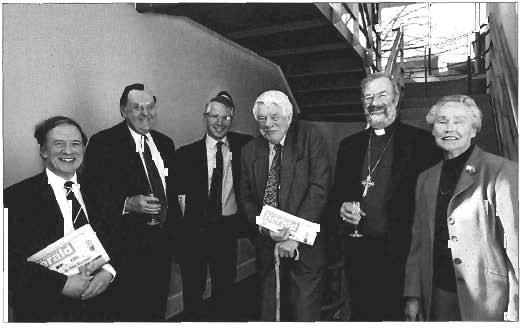
Peter Curle took over the house to be replaced by Ian Brown in 1978 and finally, following Russell Mason and within the space of fifteen years, Jonathan Martin became housemaster in 1993. In 1999, Choir became a co-educational day house and in 2000 the whole building was completely restored and refurbished for use as class rooms for the teaching of English, RE and <:lassies with house rooms for Bright and Chappel.
C.F.R.

The work of the Archives continues to expand in terms of research, exhibitions and the limitless task of cataloguing the ever-burgeoning collection, ,just like poor Sisyphus rolling his stone up the hill in Hades. We are contacted by OVs, their descendants and independent researchers from far and wide, while the events of this year have brought new opportunities for displays. The new magazine for OVs, Connect, the opening of the refurbished Choir House and the reunion to celebrate the thirty years' worth of girls at King's, from 1971-2001, have all generated more material from OVs. Our premises at the top of School House are more cramped than ever, but a partial solution to the problems will be the addition of an exhibition room in No 12, College Green, which should be available in September after repairs are completed. This will not only be useful for special displays of our archive material for reunions and open days, but also make it possible to show the school some of the more interesting items on a regular basis.
A few examples of our research work will suffice. Our sotrrces include school admission registers going back to 1823 and Vigornians to 1880. Ben Pitts did a search for a King's Scholar froni the 17th centnry which led him to the Cathedral Library We were able to find all sorts of material for a researcher looking into the writings on athletics of a former history teacher at King's, Alex Natan, (1943-67), a most interesting eccentric who was a refugcc from Nazi Germany. M'e were most successful in finding a great uncle and grandfather, the Sharp brothers, who were much involved in sport before the Great War and we also identified Miss Bayford's great uncle, Frederick Thomas, who was at King's in the 1880s and whose letters frorn the Boer M'ar (1899-1901) she has very generously given to the school. An exciting enterprise was finding the details of Judge Hopkin (Ca 48-53) for the Nottingham Post when a defendant he had just sent down attempted to assault him in court. The judge's career at King's as School monitor, head of Castle, corporal in the (:(:F and member of the 1st XV was ample testimony to his capacity to look after himself.
The least enticing item we received is a photograph from Steve Price (School 73-74) of a boarders' clandestine smoking clttb to be fo~uiclat the back of Hostel House in the 1970s. Rik Mayall along with Mike Homer who taught at King's later, both feature. An interesting revelation of attitudes in the late 1950s was that of the reaction of the school when three popular sixth formers were suspended in 1959. The boys turned out to see them leave, many had donned black ties and then in silence turned their backs on the headmaster, Ronald Kittermaster. The criminals had sneaked into the Alice Ottley to paint 'Good night, sweet ladies' on a wall and to hang spaghetti on con~enientb~~shes.The respective heads were not amused.
In the spring, we had a display ready for the opening of Choir House, after its refurbishment, which included photographs of the Choir School, amalgamated with King's in 1943, under an unforgiving headmaster, 'Pa' Davis, who, as John Higginson (Choir School 40-43) revealed, beat the choristers who had woken early on Christmas Day while they were staying over in the large dormitory, now housing Turing, the ICT room, for the Christmas services. Odd things were found under the floor boards during the restoration, including
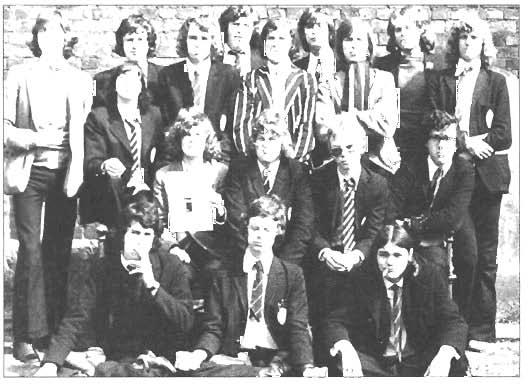
a running shoe from the 1920s and a wonderti~llyformal typed letter, dated 1907, from the days of the Choir School, from a small boy to his mother. She never received it.
The summer saw a large display for the anniversary of thirty years of girls at King's (1971-2001) when almost fifty OVs returned to meet up with friends and to see the cl~angesmade to the school since they left. The attitude towards the introduction of girls into the school tl-om the local press in the early 1970s reveal some interestingly chauvinist comments. Times have changed.
John Bagenal (S29-34) donated magnificent photographs of the School Gardens shortly after its creation, which inspired a display in No 12, College Green, to commemorate the garden's opening in .July 1931, seventy years ago. The land was bought from the Dean and Chapter by Cuthbert Creighton (headmaster from 1919-1936, 1940-42) and given to the school in memory of his wife. Hope Bagenal,.John's father and a close friend to <>reighton,clesignecl the layout of the gardens, as \\,ell as the clock in (hllege Hall, which the family presented to the school in 1938, and the two memorial boards for those from King's who died in two Worlcl Wars. One of the names he carved was that of his own son, Philip, who was killed in New Guinea in 1942 fighting against the Japanese with an Australian unit.
The sixth form archivists continue to gain experience in a wide variety of skills. Ben Pitts had a week in the Cathedral Library, as work experience, with OV David Morrison (Cl 8792), the newly-appointed Cathedral librarian. Richard Huzzey, Jonathan Price, Jon Pinson, Edward Jefferson-L,oveday, Ben Pitts, Oliver Pooley, Henry Watson, Paul Jones, Jenny Inchb:tld, Jonathan Barber and Natalie Harris all researched, typed and sorted. Following his work experience with the C:o~~ntyRecord Office the previous summer, Richard Huzzey did a grand jol-, in re-organising the archive boxes in which we store all the photographs and documents. Ben Pitts and Oliver Pooley also did sterling work in setting up the exhibitions.
C.F.R.
The Times Educational Supplement Newsday is a competition that has now been running for over ten years and requires schools to write and produce their own newspaper in just one day. On 22nd June, Richard Ht~zzcy,Edward Cumming and JMR made up a delegation from the team of the Iting's Herald to represent the school at this year's final presentations at the House of Commons. The school has a long history of excellence in the competition, leaving this year's would-be journalists with much to live up to. Having already been shortlisted amongst the last eight schools in the country, frorn more than 1000 entrants, our hopes were high! Despite the many and well-documented problems with the rail service, we
elected to go to London by train, audacious journalists that we are, and in so doing uncovered a perfect investigative feat~~re for the next edition of the Herald. Leaving from Worcester Shrub Hill early that morning we were staggered at the poor image that the station must offer visitors and tourists as they enter the city. Surely it is time that local councils decided to raise the image of this gateway to the city!
Thanks to the highly efficient mass transport system that we have in this country, we arrived in London early enough to take in the sights as we strolled from Paddington to Whitehall and the majesty of Westminster. On reaching the Houses of Parliament we were quite overawed at the feeling of power as we gazed up towards the tower of Big Ben. With a few minutes to spare before the presentation we took advantage of the opportunity to watch the debate about the Queen's Speech in the Commons. In turn we were quite overawed by the poor quality and slow pace of debate in the chamber! It seemed a world away from the cut and thrust of Prime Minister's Questions, the highlights being Iain Duncan Smith's sockstraightening routine, the resting of frontbenchers' feet on the dispatch table and a fascinating maiden speech from the new MP for Dorset South selling it as a tourist destination.
Below the chambers themselves we found the Churchill Room on the terrace, where the presentation was to take place. By this stage we were really beginning to weigh up what our chances of winning may be, as we saw our competitors' papers for the first time, including our historic rival Manchester Grammar School with their very professional publication 'The Avian'. We were proud to be asked by a number of schools who were clearly impressed by our paper, asking us about its publication. Representatives of all schools, not least from King's, appreciated the gourmet buffet provided by the parliamentary kitchens to calm the nerves a little before the presentations. Dermot Murnaghan, slightly delayed as he was called upon to present the News at One, arrived to award the prizes after a welcome from Gerald Kaufman MP. A very witty and well-delivered speech by Dermot did little to assuage our excitement. All the schools present received a certificate of commendation before the winner was announced sadly we were beaten back to runners-up, again by the Avian. Despite the result we had a very stimulating day and a great trip to London. Retrospectively the result seemed sadly predictable, as the Avian already had a winning formula and they produce a number of issues throughout the year. It seems that this is the challenge ahead for thc Hcrald! Tributc should go to the whole Herald team for taking us to the finals, which is a great achievement in itself. Perhaps one day Richard will finally get to meet Charles Kennedy and with stories such as Shrub Hill Hellhole, we mightjust get' em next time
Edward Cumming and Richard Huzzey
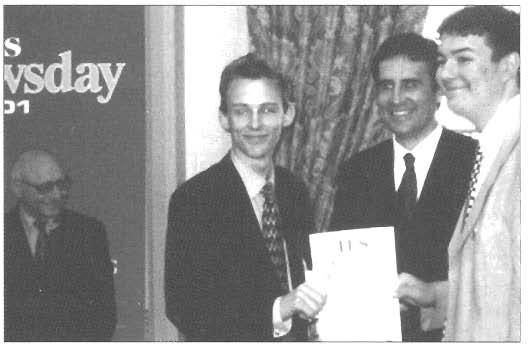
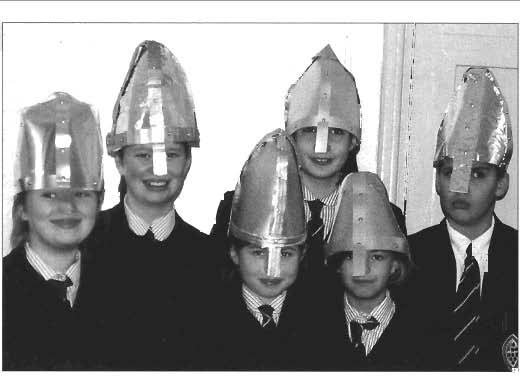
This year - perhaps because of the reduced amount of time students had as a consequence of the new AS courses and the Key Skills demands - the number choosing to take part in the scheme produced only two companies. However, these two groups were very good. One was Saucy, organised by HMA, advised by Gareth Jones from Crowther & Co., and David Mitchell from HSBC. The other was BagIt, organised by JPW and advised, during the Autumn term, by Claire Facey and Paul Hillary from Cosworth Engineering.
Following the example of a certain W.I., Saucy set out with the intention of producing a calendar with photographs of school teams and crews with a similar allure Naturally, this idea was banned by the prudish powers that be but that did not stop a calendar being produced which was less pornographic! As ever, at trade fairs, particularly that in the Guildhall in the Spring, their pursuit of potential customers was nothing short of stimulating.
The second company, Bag-It, had the excellent idea of first thinking of a problem that many of us encounter and then devising a cunning solution. They realised that shoppers often found themselves carrying a number of heavy plastic bags and suffering consequent pain. The students' solution was to produce a padded handle attached to a clipped fabric loop which they called The Gripper. This product went through several stages of development and market research before it was produced in number. It was made to look attractive and was attractively packaged. To generate the funds needed to develop the idea, Bag-It first produced tea towels featuring self-portraits of children at local junior schools. Over 1500 were sold, generating a very healthy sum. The company also produced a web site to advertise their product, www.bag-it,org.uk. It might still be there, so have a look at a picture of The Gripper.
The consequence was that, aided by an imaginative trade stand, the company took first prize both at the Guildhall Spring Fair (earning a shield andk50) and at the international fair at Stratford (gaining £150 for themselves plus £150 for the School). After writing reports on their company's performance during the year, and making - as all companies had to - a timed presentation, both of which were assessed, they were selected to compete in the South Worcestershire Area Finals. This too, they won and were also awarded the prize for innovation presented by DERA, and hopes were high for success at higher levels. Regrettably this was not to be. Their next appearance was at an event that catered for the whole of both Herefordshire and Worcestershire. Unfortunately, this, held in a marquee during a violent thunderstorm, was a shambles. We will say no more than the performance of our students was superb. Their presentation team contained Ollie Smith, Scott Rennie, Alice Williams-Allden, Ben Pitts and
Verity Moore.


Expedition rnembms
Rachel Barclay, Sebastian Belcher, Matthew Bird, Olivia Brown, Gareth Hughes, Lucy Horn, Sophie Moule, Jessica Oakley, Emily Phillips-Broadhurst, Lucy Proctor-Nicholls, Scott Rennie, Isla Robinson, Mark Rose,Jack Smith, Mark Southam, Carys Williams, Poppy Willmott, Dr. Julia Brown, Dr. Chris Perks, KJK.-W, JTW and JPW.
This is an extract from the diary I kept on the April 2001 King's Himalayan Club Expedition to Nepal. The seventeen pupils and five staff who travelled on the expedition had earned their places by fundraising for the charities that we support in Nepal and by the previous year's gruelling training
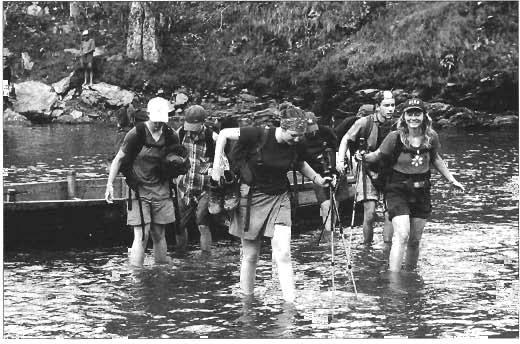
On our walk toward Tashigoan we saw oxen plough the on cold mountains and moors. terraces and a beautiful watermill; it was like stepping back in Sunday 1st April time. Another unusual sight was that of a man who at first glance looked as though he was wearing a large Cossack hat. It
On our first full day of the trek we were woken up at 5.30am actually turned out to be his fifty year old hair! with the friendly call of 'Morning Tea,' surely this was an April
A short hreak next to the village school at Tashigoan proved Fool! On unzipping the tent stunning views of mountains to he a great chance for some more exercise! Children of across the valley unfolded. The air was surprisingly warm, the primary age were learning to count in English by repeatedly sky was clear and we felt like we were on the roof of the world. reciting '1,2 .' whilst raising their hands above their head. We
The first day was long, adjusting to terrain of steep rocky joined in, much to the amusement of the pupils. Later, I played paths, each person finding a comfortable pace. Whilst walking a game of badminton with an eight year old boy using a lump I chatted with Sophie Moule, who commented, 'I didn't realise of grass as the shuttlecock, a game I will never forget. there would be so many hills,' - snrely a worthy 'quote of the , , The end of the first week's trekking culminated in a long,
aay
1 Mondav 2nd Awril
Arriving the previous night in the dark we were amazed to wake up to the spectacular view of Makalu, Chamlang and Mira Peak (worryingly snow-capped!).
The ritual of nominating people for badges due to misdemeanours and general silliness was now well underway. Julia Brown was awarded a badge for believing Chris Perks
steep climb to Kauma. The Familiar terrain of ~hododendroi forests started ourjourney, hut soon moved up and on to deep, slow and slippery icy passages. It was unseasonably cold and it was now becoming apparent to us that our planned destination of Makalu base camp was becoming an impossibility as the weather was just too severe
Quote of the day, 'Who put the track here?' - Matthew Bird. 'I don't know, but I want to kill them,' -Mark Southam.
when he said on April Fools' day that a bubbling hole (a leaky id^^ 6th ~~~il pipc in the village) in the ground was a hot lava spring.
Another side of Nepal manifested itself today as we trekked through the jungle, providing us with shade and opportunities of experiencing wildlife. John Lyle, the Classic Journeys trek leader took pleasure in pointing out often rare species of birdlife, including a Golden Eagle and Blue Indian Roller.
Journeying along the ridge towards Num, we were surrounded by dramatic drops down to the river valley below and terracing where the locals were growing wheat. For a long while the sight of comforting orange tents were visible in the distance. On arrival we were challenged to a game of volleyball by an extremely competitive group of students.
This was to be a day of steep ascent and descent to cross the Arun River. For JTW, Scott Rennie, Sophie Moule and me the day to was to prove additionally arduous due to deterioration in our physical state. We crossed the rapidly flowing Arun River via a swing bridge (not for the faint-hearted!) .
The blue lagoons where the kitchen porters were preparing lunch were a welcome sight. Further ascending through the afternoon brought the sights and sounds of monkeys and other wildlife so close that we felt we could touch them.
This saw us camping on snow 3500m above sea level. We had a rest day at Kauma, originally planned for our acclimatisation. Only Sophie Moule braved the freezing temperatures to wash her hair in snow. The porters however found it all great fun, sledging on bin bags and making light work of the cold, even though they had no tents and slept huddled under a sheltered rock face. It made us all glad for our tents and warm sleeping bags.
A small group braved the cold temperatures to climb to 3700m to a viewpoint. Unfortunately their efforts weren't rewarded, as the low snow clouds obscured what would have been stunning views.
John 1,yle and Dorje, our highly respected and competent Sirdar (minus his pink silk shorts on this occasion) ingeniously planned our new trek to take us to the strangely named Milky Danda Ridge (the ridge you can trek without ruining your appetite) to avoid the worst of the weather conditions. They were hopeful we would experience views of Kanjunjunga and possibly Everest. Our feelings of uncertainty were replaced by excitement at the prospect of trekking this little-used-bytourists route (a first for any Himalayan Club trip).
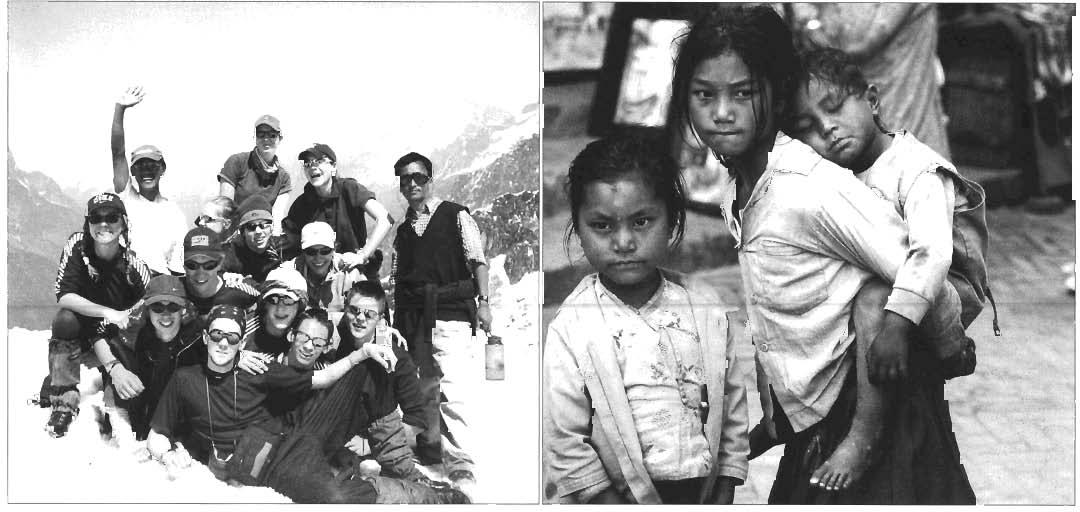
Makulu vzewpoznt, 3700m (to /)P our hlgI1~~tpoln!,
Before we embarked on this new route a second attempt at reaching the viewpoint was made by most of the group. The climb on this occasion successf~~llyrewarded us with breathtaking views of Makalu, Chamlang, Mera Peak and Peak 6. The effects of altitude really made themselves apparent on this short trek to the viewpoint and almost everyone suffered as a result, but the vista and clear weather more than made up for it. This was truly a highlight of the trip. The snowball fighting at the viewpoint resulted in a thrashing of the kids by the staff and Sherpas Tenseng and Punbar (OK I'm biased, but it felt like we won!).
Sunday 8th April
This proved to be our longest day's trekking, as on rounding the bend, expecting to see the campsite we fomd that it had been moved two hours further on, which as you can imagine was greeted by cheers from the already weary trekkers! End of diary - too tired to write.
Monday 9th April
This was another memorable day. We walked through jungles, spotted wild orchids growing in the trees and beautiful butterflies abounded. We passed through villages where all they wanted from us was a handshake and a wave. At lunchtime we swam in a magical cool, dark, circular pool with a flowing waterfall surrounded by the jungle sounds and greenery. This was a truly heavenly place.
Tuesday the 10th April to Sunday 15th April
Several days of ascending and descending followed, passing through and over small trickling streams and raging rivers by means of boat, bridge and wading. We rested during our lunch periods on our blue lagoons (aka blue plastic sheeting if you were wondering) or swimming in the natural pools we found. These days, although sometimes arduous, were made more bearable (and even fun) by the group having bonded so well together and through the attention of our Sherpas. Tenseng's favourite phrase of 'Easy Day, Ooh Laa Laa,' and Damber's watching out for us spring immediately to mind.
We continued to trek through well-kept and picturesque villages being greeted with the welcome 'Namaste' and inquisitive stares from the locals mesmerised by whatever we
were doing, even the trivial business of eating or hair washing. As we walked the beauty of this country continued to unravel in front of our eyes in both its wildlife and people.
A common theme of fine weather during the day and stormy evenings developed. On one of these evenings a river decided to flow through the mess tent and JTW was overheard saying, 'Don't worry, this is just the tail end of the storm.' There followed three hours of torrential rain, thunder and lightning and the storm felt so close that the lightning seemed as though it was passing through our bodies. Nice one John! Well predicted.
At 5 am we awoke and immediately began our trek to a viewpoint of Everest, Chamlang and Makalu. When the mists clrared we were treated to what was an overwhelming view of these mountains, a sight I will never forget.
With the trek heading toward its end, a small group of eight of us climbed up to Wheely's Peak (well we had to didn't we!). It was basically 3500m of hard slog and the view was underwhelming, but we left prayer flags blowing in the wind and told everyone when we returned to camp what a fantastic climb and spectacular view they had missed out on (this last bit is top secret).
K.J.K.W.

We left for Heathrow from the King Street Coach Bay at 630 am on Friday 30th March, all groggy from waking up early. However, we were well awake by 14:00 Italian time, when we arrived in Rome's Fiumicino Airport, after a flight time of about two hours. A coach took us to our hotel, Hotel Touring Dipidenza, and we had supper at the Gran Caffe Strega, where we would eat for all three nights of our stay in Rome.
My favourite site in Rome was St. Peter's Basilica, which looked great after being cleaned for the holy year, 2000. We went inside, had a look around and climbed Michelangelo's central cupola. An unexpected bonus was seeing Pope JohnPaul I1 making a speech. The climb up the dome was hard work, but you got some superb views from the top. We also went round the Colosseum, saw Trajan's Column, a very intricately carved column that shows the Romans' defeats of

St. /'Pt?/ :\, 1ZOl~l~
Romania in the time of Emperor Trajan, and went round the Roman Forum. However, I had seen these sites when I last went to Rome, two years ago. The site that was new to me was the Catacombs of St. Callixtus, a huge underground chamber where the early Christians were buried. These Christians included sixteen popes and several saints.
011 the Monday, we took the coach to Monte Cassino. This monastery is famous for two reasons: firstly St. Benedict, who was a monk there, founded the Benedictine order of monks and made Monte Cassino the first Benedictine monastery (Worcester's monastery was Benedictine), and secondly it was a German stronghold during World War I1 and it was stormed by Allied Troops in 1044. We stopped at Monte Cassino for a while before driving along the Autostrada del Sol to Sorrento, on the Bay of Naples. Our hotel, which was just outside Sorrento, was very nice, and it was more spacious and luxurious than our hotel in Rome. U'e went down into Sorrento to shop before returning to the hotel. By this time, several people had been sick. By the end of the trip, more than half of the group had contracted the sickness bug. Fortunately, each person only had the bug for about eighteen hours and it didn't spoil the trip, but it was a bit worrying.
Over the next two days we went to Pompeii, a Roman business centre, and Herculaneum, a Roman holiday resort. Both of these places were covered and preserved by the ash and pumice produced by Mount Vesuvius' eruption in A.D. 79. This means that all the buildings have survived in equal condition, unlike places like Rome, where only the important buildings have survived. Although the site at Pompeii is a lot larger than the site at Herculaneum, Herculaneum has been preserved more effectively: many buildings still have some roofing and an original wooden door has been preserved from nearly 2,000 years ago. In Pompeii, we saw the Amphitheatre, the baths and a theatre. Because the eruption happened months after an election, the eleclion slogans on the walls have been preserved. We also went just outside the Nuceria Gate to see the Roman tombs lining the roads, and had lunch in the forum. In Pompeii, we also visited the House of the Faun and Caecilius' house. In Herculaneum, we visited the baths, the forum and several other buildings.
The other highlights of the trip were climbing Mount Vesuvius and taking a ferry to Capri. A coach took us half way up Vesuvius, and we walked right up to the crater and half way round it. This was hard work and rather humbling, because we were climbing something that had killed so many people. On Capri, we walked up to the top of the island, where Tiberius, the second Roman emperor, had his palace after he got bored with the politics in Rome.
On the last day we spent the morning in Sorrento, before having lunch by the hotel and leaving for the airport. Despite being plagued by illness, I think that the trip was very
successful and that just about everyone had a great time. I certainly did. On behalf of the people on the trip, I would like to thank Mr. Stone and Mr. Keyes, the classicists, for their knowledge of the ancient sites. We also followed Mr. Stone's straw hat and Mr. Keyes' cap. I also thank Mrs. Appleby, who spoke Italian and helped us across roads, at one point saying, 'hurry up - don't wait to see who's run down first!' and Mrs. Keyes for taking us on this brilliant trip.
James Bartholomew
Over the Febr~~aryhalf-term, twenty-five hockey players from the Removes plus FLS, JDC, MML and Sophie Garcia set off by coach to Barcelona. This was the first overseas tour for girls at King's so it was eagerly awaited.
We arrived in Lloret de Mar on the Spanish Costa Brava by lunch on the Saturday and immediately sought out the nearest McDonalds where Sophie Garcia's skill of translating was put to the test with the Double Cheeseburgers.
After a quick toe test at the beach we decided the hotel pool had to be warmer ... it wasn't. This did not deter the hardier girls however, who managed to swim a length of the icy pool water. Amazingly, this drew attention from a French rugby touring party who pursued them for most of the afternoon. An evening at the bowling alley and an early night put us in great stead for the morning training sessions and matches.
Sunday - 6:30 arn, and we were up and away to Terrassa for a gruelling session from FLS and JDC on the astro pitches. They were a joy to play on and by the time the opposition from Club Atletica arrived we were ready for a fast attacking game. Jo Hallett scored a cracking goal and our defence was impenetrable throughout.
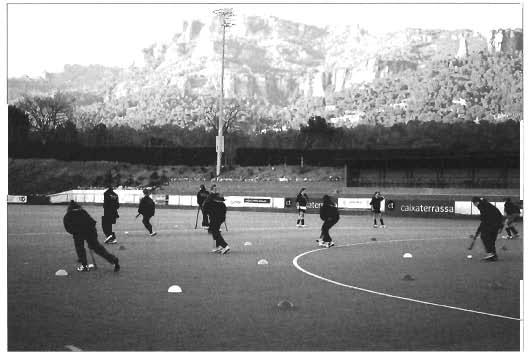
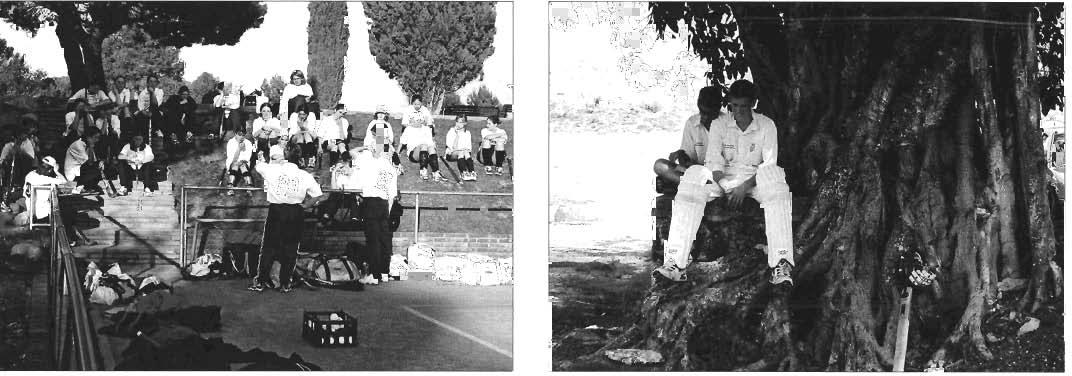
King's I: Club Atletica 0
Another early start on Monday took us to Barcelona, where MML was trapped in the tower of the Sagrada Familia Cathedral and the shopping expedition down the Ramblas kept the girls highly entertained. We arrived at Club Deportivo under police escort and another training session prepared us for what was to be the best match of the tour. We failed to tell the girls that Deportivo's coach also coached the Under 18 national side and looking at the players we could see why. But King's were up for this match and with Kate Herriot's defence and Harriet Priddey's attacking skills, it was end to end nailbiting play.
King's 2: Club Defiortivo 4
There was more shopping on Tuesday, at the local market this time, before we set off for our final matches against Club Atletico, but the squad couldn't produce the same inspired performance.
King's 0: Club Atbtica l
An evening at the local disco rounded off the tour with expected enthusiasm; FLS was sent back to change as we considered her outfit unsuitable!
It was a great tour, the girls entering into the spirit of everything we did. They played some good hockey, we saw a part of Barcelona and returned back to school thoroughly exhausted. Thanks to them and to the tireless efforts of FLS and JD, and to Sophie Garcia without whom we would not have had the preferential treatment from the Maitre d' in the dining room!
M.M.L.
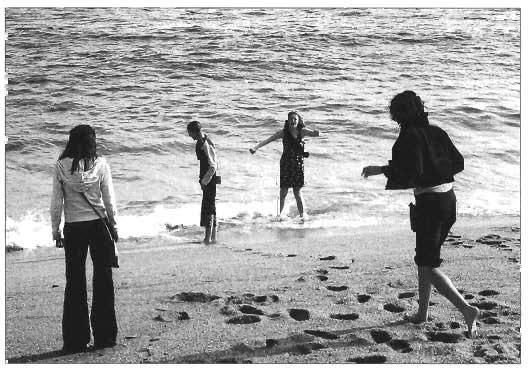

As I write this report for the Vigornian on a gloomy October day the hot humid days of Barbados seem a distant memory. When we went to Barbados we were looking forward to seeing the idiosyncrasies of the local culture, the beautiful beaches and, of course, playing some cricket. The emphasis on cricket was again drilled into us a few hours after our arrival by the masters in charge.
After a net session was cancelled because of torrential rain, we spent a day at the beaches on the West of the island near to our hotel complex. Even though the dangers of sunburn were stressed to certain members of the tour party, the writer of this report still managed to burn himself so badly that he was ruled out of the first match of the tour. Thus with great anticipation, we travelled to the North East of the island for our first match against Alleyne school. The match will live long in the memory because their fifteen year old umpire, Antonio, was so consistent, sorry I meant to say consistently poor, in his decisions that he cost us the match with five of our team being out to what could be called, intriguing decisions. For at one point we were 90 for 2 and well set for a win and then with Antonio's help we collapsed to 118 all out. Apart from that the team produced a splendid performance with the captain Nick Dale Lace taking five wickets for only twelve runs to dismiss Alleyne for 125 and thus proving the generalisation that West Indians can't play spin bowling. In our reply, Dale Lace top scored with 37 and Nick Major made 31 and so we wound up losing by 7 runs.
Soon the games were coming thick and fast, to use a cliche, and our next match was against Tranquility School from Trinidad who were touring Barbados. There were several team members who were bewildered to see goats and cattle on the pitch when we arrived and looked on in amusement while the groundsman tried to move them off the square and the pitch. After these difficulties were overcome, King's made a satisfactory score of 176 for 9 in their 40 overs with Major making 43 and Joe Robinson making 31. However it quickly became apparent that our slow scoring in the first ten overs had cost us dearly, for our total was not big enough. They romped home to win by seven wickets with five overs to spare even though Richard Syree and Ben Pitts had a great game in the field.
A few days later came the game which everyone wanted to play in for we were playing at the Kensington Oval, the Barbados test ground against a Combined Schools XI. The Combined Schools XI batted first and made 193 from their 35 overs with several members of the Tranquility team again
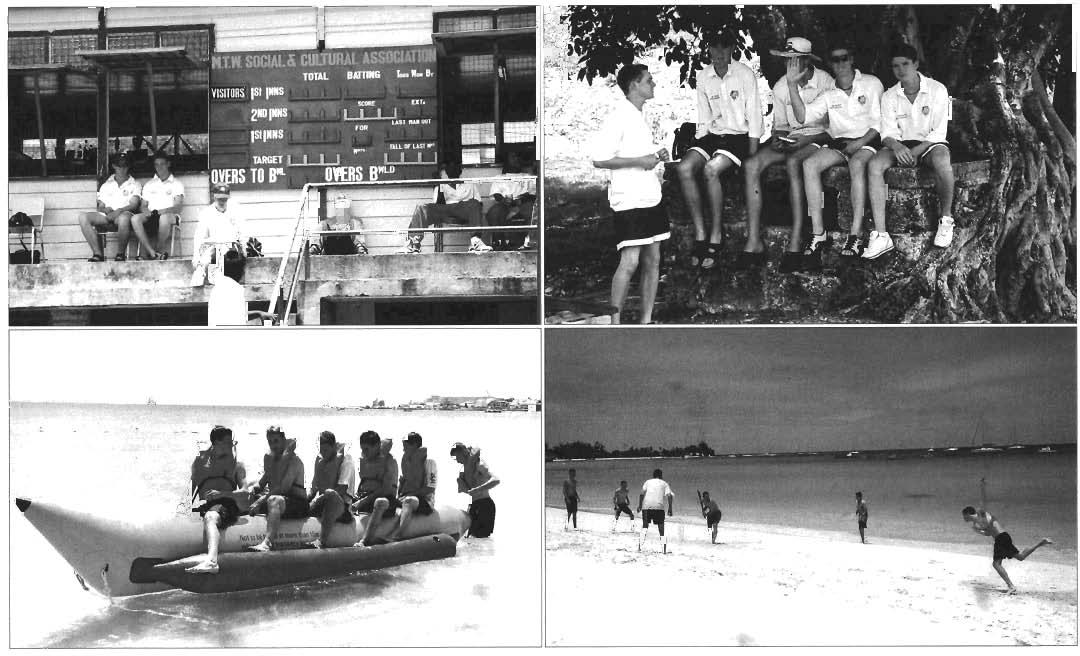
scoring heavily against us. However Will Hardy bowled a superb line and length in his six overs and took 2-27 when he was unlucky not to take more. Pitts was rather wayward in his first spell including being hit out of the Kensington Oval. Trust me, it's not a nice experience especially when the batsman comes up to you after the match waves his bat at you and says 'remember this?'. At least I could take comfort in the locals shouting 'that's a jaffa' when I took my third wicket with a lovely leg cutter and ended up with 436. After a frank team meeting we started well and were unlucky to end 11p losing by 6 runs with each batsmen making contributions but none making a large score. Richard Hallett top scored with 27 not out and Robinson made a classy 24. This match was also marked by the opposition trying to buy many of our possessions; Richard Morris was asked how much he wanted for his Oakley sunglasses and Robinson tried in vain to pawn his old bat.
After the first week DPI and RJD returned home and after they went our results improved greatly. Is this a coincidence? So without their curse on us we were unbeaten in our next three matches. The first of these was against a Combined Southern Schools XI played in a park in the middle of Bridgetown. King's made an impressive 183 from their 35 overs with Dale Lace top scoring with 45 and Phi1 Burdon and Tom Soden making useful contributions of 29 and 25 respectively. In reply King's bowled and fielded the best they had on tour. Hardy bowled again very well for his 4-32 and Dale Lace again bamboozled the opposition with his leg spin to take 4-28. The game was going against us at one point when their opener and number four were having a large stand when AADG commented 'the only way we'll win this is if we get these two out'. Obviously he should take up a career in prophesising as this then occurred in consecutive balls with Hardy taking the catch of the tour with a spectacular diving catch from long off. They ended up with 162 for after a dispirited ending and so we won by 21 runs. The locals were especially keen for the match to end for as soon as the teams had left the pitch about a hundred ran on to the pitch and started playing football.
The penultimate match of the tour was against Lester Vaughan School. King's batted first in this game and Oli Mathew and Philip Burdon made a century partnership for the opening stand in less than fifteen overs before a tropical storm interrupted play. When play resumed after an interlude of about an hour, it was decided to reduce the match to 25 overs, and wickets started to fall frequently with Burdon going for 68 and Mathew for 55. The other notable score was 25 by Gwynne in our total of 200 all out. The tropical storm had made the pitch extremely unpredictable and difficult to play due to the pitch becoming extremely bouncy. Lester Vaughan were bowled out for 79 with Jimmy Byrne taking 3-19 and Steve Daly 3-11. The reasons as to why the ECB make children wear helmets was made clear when a good length ball by Pitts hit their opener on the head. Even so their batsmen still refused to wear helmets when balls were going three feet over their head. The school's music department also provided us with that unique West Indian carnival atmosphere throughout the match which was certainly appreciated by MCP, the twinkletoed umpire!
The tour ended on afrustratingnotewhenwe playedEllersie school. They were bowled out for only 69 and some of the tour party had to play for them because they only had nine players. Byrne again excelled with his leg spin in taking 4-7 and Burdon took 3-1 3. However throughout Ellersie's innings play kept on stopping and starting due to rain and soon a tropical storm washed out the pitch and the game, and the tourwas over.
Everyone in the team played an important part in the team's success and of those not mentioned so far Fiaz opened the bowling and was unlucky not to take more wickets. Paul Hallett also bowled well at Ellersie and took a couple of wickets. Nick Dale Lace should be congratulated for being a model of responsibility throughout the tour and set a superb example to the rest of the squad throughout the tour. MCP's umpiring throughout the matches was very good and grounds throughout Barbados rang with the sound of 'and that's the over bowled'.
Whilst most of the team found the cricket physically demanding, good use was made of the rest days. In addition to
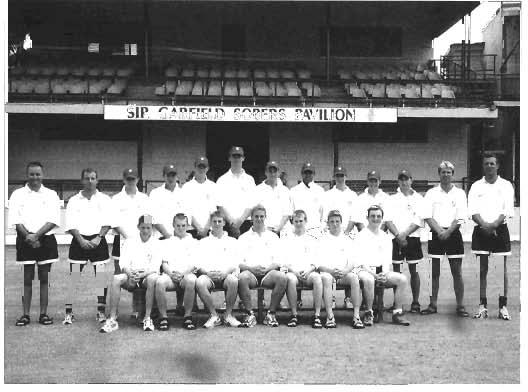
The tourpar9 at the Kensington (ha1 relaxing on some fantastic beaches, we had a day of watersports and a day out sailing in considerable style! On one of our team meals out we bumped into the great West Indian opening bat Desmond Haynes who was relaxing after a strenuous day at the golf course! When we ate out the food was invariably excellent, but a little on the expensive side; the boys often decided to cook for themselves and several appeared to know what they were doing! We even had time to sample the local music scene; dancing to the island's number one reggae band was good, but listening to several classy Jazz bands on the waterfront in Bridgetown was without doubt the highlight. All the members of the team fully appreciated the considerable efforts of the staff involved for making the tour one to remember.
Ben Pitts
throughout the week, enabling us to appreciate f~~llythe fantastic colour of the New England Fall foliage, very much in evidence wherever we looked (along with numerous Halloween pumpkins and jack-0'-lanterns), even though it was relatively late in the season when we visited.
The performance of our two plays was greeted by tremendous enthusiasm and what would seem to be a customary standing ovation by a highly appreciative Notre Dame audience. As well as performing the plays, the trip included a visit to the local Foothills Theater in Worcester (similar in size to our own Swan) with our hosts and their families, to see Always Patsy Cline, a show about the legendary country singer. Virginia felt that this was a great introduction to real Americana! After the show, my host, the Head of Music at Notre Dame, had everybody back to his house for a welcome party complete with traditional New England fare.
In 1998 King's started a theatre exchange programme with the Notre Dame Academy, a girls' school in Worcester Massachusetts, our twin city in the USA. Students from the academy brought a production to our own theatre in June of that year, whilst King's students took a production of Edward Bond's The Sea to America in the October half term holiday. The exchange was originated by Virginia Byrne, Director of Theatre at the Academy, and Rosemary Diamond, our former Head of English, who led the first exchange party from King's. Two years on and sixth form Drama and Theatre Studies students again spent their autumn half term in America, this time taking two one-act comedies by Georges Feydeau, the famous writer of French farce: Thp Music Lo.oers and Tooth and Consequences. Audiences here at King's had the chance to see these productions a few days before we left for the states, and you can read RNGS's reviews of them elsewhere in this magazine.
Sixteen sixth form drama students made the trip to Worcester Massachusetts this time, accompanied by myself as director of the two plays, David Thurlby, our former Theatre Manager, and SES. David was the only member of the party who had also taken part in the exchange first time round, and so this time he was much better prepared for the technical difficulties inherent in mounting a production in the Notre Dame Theatre, a charming venue, but one that has far more limited resources in terms of lighting and sound than our own space (as well as American plugs and sockets!). Once again our party stayed in the homes of staff and students from the Academy, and once again we were overwhelmed by the warmth and generosity of our American hosts. The warmth of American hospitality was matched by marvellous weather
We also had a very enjoyable day out in Boston. We visited -. Harvard and saw the university, went to Quincy Market and also had some free time for shopping. This was clearly the highlight of the week for some of our students who returned with numerous bags and, in some cases, wearing completely different outfits! The day also included a tour of the senate house and a meeting with Senator Guy W. Glodis (is the 'W' obligatory in American politics, I wonder?). The King's students had a very lively discussion with the senator about such issues as the death penalty and gun control. We got a good insight into American politics as our visit came just a couple of weeks before the Presidential election, and campaigning was very much in evidence, both on the streets and in the media. We also had the chance to follow the final of the World Series Baseball on television. Our visit was the subject of some media attention: Virginia Byrne, Kate Jones, her partner Marissa Holland and I did a radio interview in a simultaneous broadcast on WTAG radio in Massachusetts and our own BBC Hereford and Worcester. We were also featured in some depth on the front page of a Worcester Mass. newspaper. In keeping with the cultural theme of the week, one day after school we were given a tour of the splendid Worcester Art Museum by the Museum director himself. Music featured quite a lot for many of us too. David Thurlby and I were taken both to an authentic Blues club and an orchestral concert in the magnificent Mechanics Hall in Worcester, whilst some of the King's students went with their hosts to see Eminem and Limp Biskit who were playing Worcester one night. The King's students attended classes at the Academy on four days, and SES and I also got to do a bit of teaching, which was a very enjoyable experience - for us anyway! The school day at Notre Dame starts at 8.10 am and finishes at 2.30 pm with just twenty minutes for lunch, although the students are allowed to eat in lessons. Classes last either forty-five or ninety minutes, depending on whether they are half or f~~llperiods. I found the students extremely well motivated and eager to learn, even though the lessons were quite relaxed. We particularly enjoyed participating in Virginia Byrne's lively Shakespeare and Acting classes, which were totally practical and proved to be very interesting as well as great fun. There are four year groups, the equivalent of our Upper Remove through to Upper Sixth. What I found so refreshing was that the teaching and learning is not restricted by the demands of public examinations. University application and selection is by portfolio of work instead. Everyone at Notre Dame made us feel extremely welcome, and of course, they were all enchanted by our British accents. As Notre Dame is an all-girls school, the boys in our party were made particularly welcome, and the likes of Seb Belcher and Bill Brigden enjoyed the status of being the next best thing to Prince William. When not in school, members of the King's party generally disappeared downtown to visit the mall, the movie
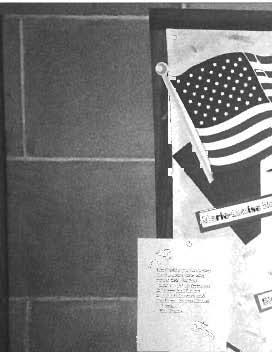





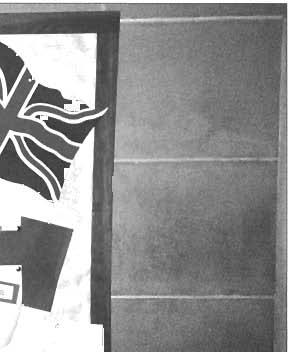

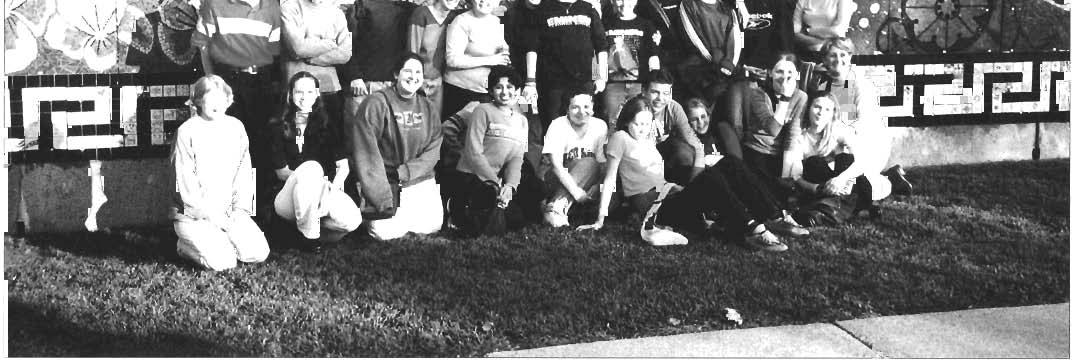
theatre or Dunkin' Donuts. Overall, it was a great experience and a fantastic week.
We were re-united with the American students in January when they made their return visit, accompanied by Virginia Byrne and her husband Kevin. They spent a week here at King's and performed their own double-bill of one-act plays in our theatre, 7his is a T~stand Us ancl Them. These were both excellent productions and all who saw them were greatly impressed by the girls' commitment and by the high standard of acting demonstrated. The American students attended sixth form classes each day, apart from the day they spent in London along with their hosts. Here we all took part in a Shakespeare workshop at the Globe Theatre before seeing a matinee performance of the Andrew Lloyd Webber/Ben Elton musical The Beautiful Game. Whilst the Americans were here the Worcester MP Michael Foster came into school to talk to them, and they were given a tour of the Guildhall by the M;ay.yorand
met by members of the twinning association. The American party were given a tour of the cathedral by MRD after which they attended Evensong. Many of the host families took their guests to see other towns and places of interest, such as Stratford and Bath, and it was with some sadness that we bade them farewell at the end of what had been a very exciting and fillfilling exchange. Virginia Byrne and I are already starting to plan the next one for 2002-3.
We were all stunned by the terrible events of September llth, but the proximity of Worcester Mass. to New York and Washington meant that our friends at Notre Dame Academy were affected particularly deeply. This time last year we were all about to fly to Logan Airport in Boston from where two of the highjacked planes had departed. Indeed one of the flights was one that Virginia Byrne frequently takes to visit her grown-up children in California. The sister-in-law of one of the teachers at NDA had been on the level in one of the World Trade
Center towers into which one of the planes flew. The solidarity and support of the British people at this distressing time has been very deeply appreciated in the United States, and it is at times like this that links such as ours take on a far greater importance than could have originally been envisaged. Relieved as we are that we had not planned an exchange visit this autumn term in the light of the current situation, we are now more determined than ever that our programme of exchange visits should continue. I hope very much, that given the success of the first two exchanges, this programme will be an important part of the life of our two schools for many years to come. I'm sure it will, particularly given the unflagging energy and enthusiasm of Virginia Byrne. After all, the crucial importance of theatre is and has been, in all times, nations and cultures, that of sharing the joys and the sorrows of others. See you next Fall, Virginia.
S.M.A.
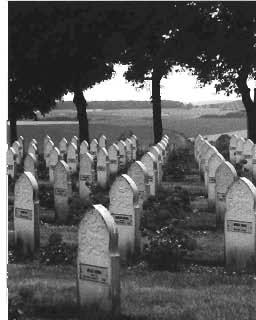


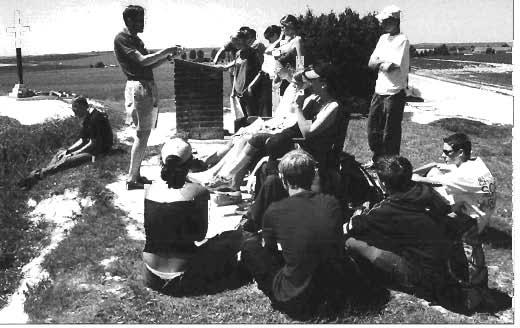
link between this cemetery with its monuments constructed during the 1920s and 1930s, and the topic of appeasement of Nazi Germany that we had recently been studying in class. It was plain why a generation that had witnessed such staggering losses should try anything to avoid a repetition. Such losses were certainly not confined to one side though, and our next stop at the German cemetery at Neuville St. Vaast made the point.
Our choice of Biithune as a base turned out to be a good one, being very well placed to travel to both the Ypres Salient and the Somme for our full-day visits. The hotel possessed enough land for some of the group to enjoy the summer evenings improvising games of cricket and rugby, and PTG was able to play a key role in ensuring fair play while dispensing useful out-of-season coaching advice from his bedroom window on the ground floor. Others preferred to make the ten or fifteen minute walk to the town's main square to sit out in cafes with drinks or ice creams.

After a break of a year the History Department returned to the battlefields of the First World War for four days towards the end of the Summer Term with twenty two Upper Removes and seven Fifth Form. In a change to our normal routine we took ourselves away from the coast at the most northrrly rnd of the Western Front to stay further south, on the outskirts of Bethune, near Arras. We had also changed our travel company to Galloway, well known for its battlefield tours, but even before we had reached the motorway our driver pronounced our programme 'weird'. So it was with some speculation about what was a normal battlefield itinerary that we headed across the Channel following the route of the British Expeditionary Force in 1914.
There was time left after the crossing to visit two locations near Arras before arriving at our hotel. The first was the French National Memorial and Cemetery of Notre Dame de Lorette on a hill taken by the Germans in 1914, and then the scene of much heavy fighting in 1915 when the French attempted to recapture the higher ground. The visit helped to put the French Army centre stage on our first day with its 19,000 headstones and a further 16,000 dead contained in mass graves on the site. Very peaceful on that warm summer day, yet so overwhelming in its scale, this could hardly do anything but make an impression, and it was clear that our students were an especially interested group with the questions they began to ask. Immediately many were able to make the
Over the years our programme has tended to focus on a handful of sites on the Somme and around Ypres, revealing many aspects of the war, tackling issues far beyond just the fighting, from the spiritual welfare of the soldiers to the execution of deserters. As such the trip continues to provide a broad and very valuable educational experience, regardless of the strict demands of any syllabus. The sites alone leave very many pupils with a new insight into the subject, yet the contribution of staff who accompany the trip should never be overlooked. Again PTG and CFR had done sterling work in preparing information specific to particular locations, and CFR's use of the School archives brought home the sense of loss to a community such as King's. We were also accompanied by the Chaplain, MRD, whose thoughtful contribution to discussion added much to the experience of pupils, while his company and often irreverent humour were greatly appreciated by his colleagues. It was the work of staff, both beforehand and at the sites, which allowed the party to explore issues in depth. By the third day the benefits of this had been noted by our driver, now won over to our 'weird' itinerary, observing that while we might visit rather fewer locations than other schools, we did more to draw out their significance with our pupils.
It may be that on some trips repeated annually there is a feeling of going through the motions for another year, but such has never been our experience on this trip. The scale of what is witnessed is always so apparent, and the number of personal tragedies incomprehensible.
Each trip also turns up its surprises. On the final day we made a small detour from our route back to the coast to visit the grave of one pupil's great grandfather outside the
town of Bailleul, on the frontier between France and Belgium. It was a large cemetery, but we duly found the grave and were able to pay our respects. Looking around at the other graves we discovered many things. Amongst the infantry and artillery there were airmen buried here because the cemetery was close to a British airfield. There were a number of German graves, distinctive because of their differently shaped headstones and because they were buried separately from the British and Commonwealth troops. Some seemed to date from the summer of 1917, when they were probably captured during the British attack on Messines Ridge. Others dated from closer to the end of the war during the final Allied offensive. There were a number of Chinese graves too, many from 1919, evidence of how some of these men were used in battlefield clearance after the war; they probably met their deaths on unexploded munitions. They were also buried apart, suggesting that while officers and men might be placed without distinction, racial attitudes in the early twentieth century were less egalitarian.
Finally we came across a number of graves dating from the Second World War. Again these included Germans, killed in the autumn of 1944 as the Allies swept across northern France during the liberation of Europe. Other British headstones were even dated May 1940, and spoke of those killed during the retreat to Dunkirk. Here in one cemetery it seems was a microcosm of some of the most momentous events of the twentieth century in western Europe, and an enduring testament to this past. Mealnvhile, buried amongst all this was the direct forehear of one of our party.
The experience brought home again our often close personal connections with this past and highlighted the relevance, for any prepared to see it, of such a trip. We hope that despite the great pressure of time now imposed on our pupils by the exam-driven courses of GCSE, other year groups can still take the opporttunity to feel the force of twentiethcentury events at such close quarters.
T.K.S.
of the trip with a pleasant bus ride out to the suburbs and a walk around the Palace on a gloriously sunny day. The guides were interesting and they showed us many interesting features of the Chateau, including the theatre.
We arrived back in Worcester tired but content that our time had been well-spent. My thanks go to KA for her organisational skills and patience.
C.A.GS.

Ten pupils from the Uppn- Remove and Fifth Form, accompanied by PSB, spent thejrst week of the Easter holidays in Germany. They lived in the families of their exchange partners from the Johanna Sebus grammar school in Kleve, Worcester's twin town. 7his gave them the opportunity to spend eight days immersd in a Germanspeaking environment, with many cultural and linguistic benejts. There was also a busy propmme of ments and excursions as Lorna Shaddick, a member of the exchange group, describes. Here is a section of her report:
Pupils from King's were intrigued to discover the differences and siniilarities between England and Germany as they experienced lessons in school with their partners, including I,atin, music and sport, and enjoyed helping the Germans with their English honnework! At the weekend, the King's party travelled to Cologne by train with their partners from Johanna Sebus Gymnasium, where they puffed and panted their way up the 509 steps leading to the top of the cathedral tower, and later around Cologne's numerous shops. They managed to regain all the calories lost climbing the tower by visiting the Stollwerck chocolate museum, set on the banks of the lbver Rhine, and indulging in a Fair few of the 'free samples' needless to say, they returned to Kleve with lighter purses and heavier bags, having visited the adjoining gift shop!
During the February half-term KA and I took a party of sixth formers to Paris. The group included the following stude~nts: Pippa Druett, Aliya Saied, Adani Papaplnilippopoulo~~s,Ed Cumming, Natalie Harris, Alex Walker, Tom Lyon, Emma Smith, Will Hardy, Aneurin Price, Flion Lloyd, Christian Bruns, Georgina Edwards, Ben Wall and Adam Swinburn.
We travelled by coach and ferry (KA's hvourite form of selftorture). Our meals in the evening were the most pleasant of affairs, eaten in grand style in the best of restaurantsnormally Hippopotamus cateries which are good value and civilised! I.tuicli was often taken 'a1 fresco' whilst 'en route' from onc toiwist site to another. Alex Walker, our gourmet specialist, often found salubrious places to eat.
The group made a number of visits to various places in and aro~~ndParis - The Louvre, The Pompidou Centre, Les Invalides, Montmartre, Versailles, U.N.E.S.C.O. and The Eil'i'el Tower. We listened to much French and gathered a lot oL' information. The visit afforded the students a valr~able opportunity to be exposed to French life and culture.
The Hotel, near Gare du Nord, was sound and comfortable. We all behaved ourselves with dignity and left the premises with our characters unblernishetl and our reprltations held in high esteem.
The weather in Paris was quite bea~ttiful-bright sulnny days and blue skies, b~~tcold. The visit to Versailles was a highlight
Another highlight of the exchange was nleeting with Kleve's mayor, Herr Joerken, one morning at the town hall. As well as outlining some of the town's history, he spoke of his great pleasure at the friendship between the two towns, and the important role of the school exchange in continuing this. All members of the party received souvenirs of Klevc and enjoyed refreshments together. Another chance to learn more of the history of Kleve and the surrounding area was provided by a tour of tlne beautifill 'Swan Castle' or Schwanenburg, set on the cliff that originally gave the town its name. Its tallest tower was partially destroyed in World War I1 but has now been re-built and offers lovely views of the area. The party also learnt about the many Dukes of Kleve and their family, including Anna of Kleve, famous, of course, as being the fourth wife of Henry VIII, our school's founder.
Another er~joyabletrip was to the nearby university town of Miinster, where everyone enjoyed seeing, and hearing, the Famous Medieval clock (housed in the Cathedral of St. Paul) strike twelve, and seeing much of the town's heritage, As well as these planned outings and excursions, which also saw its over the Dutch border in the town of Ntjrnwegen, everyone en,joyed taking part in activities with our partnersincluding swimming, cycling, skateboarding and dancing, reflecting the close compatibility many people enjoyed with their German friends. This was f~trthershown when three lanes of ten-pin bowling were hired at the local leisure centre on our last night in Kleve. Everyone got on very well together and it was with genuine regret that we left Kleve the following morning.

During the penultimate week of the Summer Term Sixth Form students spend five days tasting the delights of working outside the school environment.
Most choose to stay within the confines of our local region, but a few brave souls decide to go abroad to Paris - to Le Vesinet, a pretty suburb twenty minutes from the city centre of Paris.
In July, Zeta Guest, Rachel Barclay and Jack Smith worked in Le Vesinet. Jack helped in the town's upmarket and well-established bookshop - La Plume Enchantee - known not only for its books but its delightful little dog. Zeta spent her week in the town's library. She worked happily and pleasantly with the fulltime librarians. On the day I visited her she looked content and was working well.


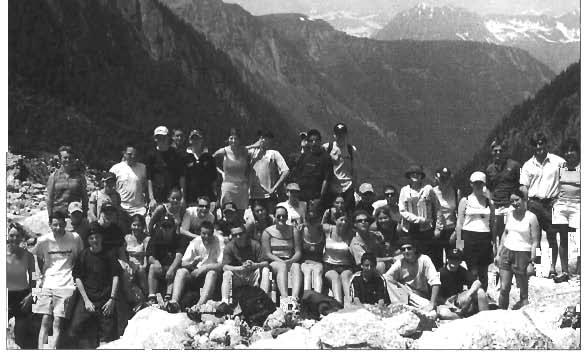
Rachel served the customers of the town's brasserie with a smile. She coped admirably well when the crowds of hungry visitors descended into the premises. The visitors included Jack and me (Zeta was invited but declined, due to a previous luncheon engagement with one of the Librarians).
As I said good-bye to both Rachel and Jack I thought how lucky the three of them were to be able to experience living and working abroad (albeit for just a week) whilst putting their knowledge of French to the test.
C.A.GS.

The season started during the Christmas holidays with the senior trip skiing at the top French resort of Alpe D' Huez. Ski conditions were excellent, with plenty of snow. The Hotel was superb - being right on the piste it allowed the group to ski to and from the hotel. We again had a large group of snowboarders, who to my amazement spent most of their time sitting on the snow trying to look cool, discussing how much 'air' they had taken, and how to do 'a daffy'. Boarding does come with its own language, and is proving more and more popular with pupils. The skiers tried their bit of radical skiing by spending a day Blading.
A great time was hand by both staff and pupils with many rebooking for this year.
Forty one pupils, four staff and a King's Hawford mascot spent the first week of the Easter holiday in the picturesque ski region of Zell-am-See in Austria. Conditions were warm and sunny, enabling the group to explore the glacier of Kaprun for a few days, yet the snowfall midway through the week forced pupils to make use of their thermals and goggles. The rapid change of conditions was educational to us all and emphasised the balance of fun and safety that we all had to be aware of in a mountain environment.
A.I.G.

During Trips Week in the first week of July thirty-eight pupils and five staff set off for the annual GCSE fieldtrip to the Savoie region of the French Alps. The twenty hour, overnight coach journey down to Dover and then on through France was the usual pleasure. During the last two hours, however, the Mont Blanc massif provided splendid views and hairpin bends caused the usual excitement. The whole purpose of
this trip is to encourage interest in and enthusiasm for the very different environment we spend a few days immersed in. Beyond that it's also a great opportunity for the pupils and staff to recharge the batteries and enjoy each other's company.
Our first afternoon involved a walk around our village and some scene setting. As we walked we kept a very watchful eye on the mountain storms we could see and hear rolling round the peaks. This watchful eye was a mark of the week, as we witnessed some spectacular storms, but we were always able to complete our tasks.
With our drivers fully recovered, we set off over the Alpine passes for Beaufort on our second day. On route we stopped off at Les Saisses, where the 1988 Winter Olympics crosscountry skiing was held. Our brief tourism study highlighted how the fragile Alpine environment can easily be damaged. It was, therefore, reassuring to hear at the cheese factory in Beaufort how the traditional dairy farmers had survived by forming a CO operative. It highlighted how many of the old ways in the Alps are under severe pressure from tourism. The day was rounded off with a visit to the high level reservoir at La Bathie, where a great feat of engineering has created a huge supply of water in an old glacial valley which is used to generate hydro electric power. After a good revision of the day's work we headed out for some ten pin bowling where numerous pupils and some staff illustrated a misspent youth.
Despite a dreadful weather forecast, we set off for the Trient glacier, just over the Swiss border, on our middle day. This visit is always a highlight and for many pupils it is their first opportunity to study a truly dynamic environment. It is, for a Geographer, the model outdoor classroom. As it turned out, we had a day of unbroken sunshine and a superb walk up to the fast retreating snout of the glacier. On the way home we stopped off in Chamonix for several runs on the luge and of all things a McDonalds! That evening we returned to ice, this time the rink in St. Gervais, where the staff illustrated that skills once learnt are never really forgotten.
On our last day, we had to delay our departure to Annecy because of heavy rain. We had much to catch up on and the group worked very well tidying up their files. Annecy was a little damp, but it cleared sufficiently for us to enjoy this 'mini Venice'. The last evening saw the traditional disco and the spirit with which all the pupils joined in summed up the wonderful atmosphere that had developed through the week.
Finally, on a personal note, this was my last field trip as a Head of Department and I can honestly say it was one of the best. Thanks to colleagues and pupils alike. Remember, be dynamic!
A.W.L.

RESULTS Played 19 Won 15 Points For 452
King Henry's Coventry (H) Won Warwick (A) Won
Cheltenham College (H) Lost Solihull (H) Abandoned
Queen Mary's Walsall (A) Won ICES. Birmingham (H) Won Christ College Brecon (A) Lost
High School Glasgow (A) Won
Kelvinside Academy (A) Won
K.E.S. Camphill (H) Won
Bablake (A) (Daily Mail) Won
K.E.S. Aston (A) Won
Old Swinford Hospital (A) Lost
Hereford C.S. (H) Won
Bristol G.S. (A) Won
Worcester Academy (A) (Daily Mail) Won
Solihull Sixth Form (H) (Daily Mail) Won
Wirral G.S. (H) (Daily Mail) Won

Durham School (A) (Daily Mail) Lost

On the wings Tom Child and Tom Muir ensured that the King's back line was not short of weight or power. Both were sound defensively whilst in attack they made good yardage even though they lacked the necessary pace to score from a long distance. Their ability to play in the forwards when asked was a useful asset in this age of the multi-functional player.
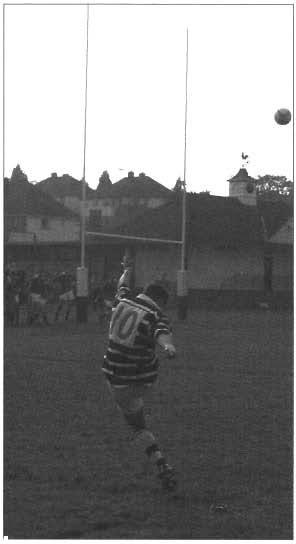
Jamie Gwynne and Joe Robinson competed to be the centre Dartner of Major - Gwynne was KO,, Lnrdlciu~ititlc\j~,- p01 more direct and a better defensive player but Robinson's superior handling skills saw him play the majority of games. Both should be regulars next year provided they are prepared to recognize which areas of their game they need to improve. Richard Syree was a brave scrum-half whose determination to win combined with his excellent defence meant that he became a regular in the side. His service is still a little slow but as with a number of others in this team the fact that he can play in the forwards shor~ldensure his selection next year.
A season full of firsts - the furthest a King's team has ever advanced in the Daily Mail Cup, the quarter-finals; a new individual points total of 200 for Ross Laidlaw; a record defeat at the hands of Brecon and for the first time the abandonment of a match at New Road due to lightning.
As a team it is probably fair to say that they improved as much as any King's First XV over the last twenty years; they trained hard, listened to advice and learnt from their mistakes. Only against two sides, full of imported stars, did they struggle and even then the team showed excellent attacking flair but the defence was found wanting when confronted by genuine pace.
Nick Dale Lace in his third year in the XV was the leadiug try-scorer and captained the team from full back with authority. A fine runner, his choice of angles for his entry into the line was seldom bettered on the circuit, and it will be a shame if' his cricketing aspiratious means that his rugby career is pr~ton hold. The other two key backs were fly-half Laidlaw and centre/scrum-half Nick Major. Laidlaw was the most consistent perfhrmer in the team; his defence was outstanding and his kicking from hand and at goal was first class. He also scored a number of useful tries and has the potential to follow a professional rugby career although he still needs to work on developing more running speed. Major accepted the positional switches demanded of him with equanimity and although his form could be erratic his performances against Worcester Academy and Wirral Grammar School were quite outstanding. His ball winning ability in the loose is excellent and if only he was a little bigger he would have a genuine chance of being capped at England Under 18 level as a flanker.
The leading forward was undoubtedly Luke Narraway. His line-out skills were crucial to the team's success as was his incisive running in open play. His early season form was most impressive but then a mysterious shoulder injury set him and the team back. Fortunately he re-emerged as a dominant force in the second half of the season and he performed quite exceptionally in the Daily Mail Cup run. He needs to aim to improve his speed off the mark but he should go a long way at representative level next year especially as he is equally at home at number eight or on the blindside. The quickest player in the side was Tom Harris but strangely he was much more at home on the flank than at wing. He combined well with another back turned into a forward, Duncan Griffiths, the two of them forming a very fast breakaway unit. Both took a little time to learn the new techniques required of them but they made rapid progress and were an excellent combination. Griffiths, who insisted that he was really a fly-half, could always be relied upon to enliven games with his unorthodox tactical approach and his unique interpretation of the laws.
The powerhouse of the scrum was filled by Tom Colley and Scott Rennie. Colley for his size showed fine handling skills whilst he consistently scored highly on the tackle count. Rennie was quick round the pitch and provided that he adds a bit more edge to his game he will be a major force in the 20012002 season. Will Walker played on occasion but yet again injury and variable motivation ruled him out of most gamesa pity as he is a natural try scorer.
In September the Achilles heel of the team seemed likely to be the front row yet it is great tribute to Oli Pooley, Josh Hand and Steven Protherough that only once were they convincingly outmanoeuvred, and that was in a game where the referee appeared to have no knowledge of the Under 19 rules concerning pushing the scrum. All three players showed great determination and no little courage against much bigger
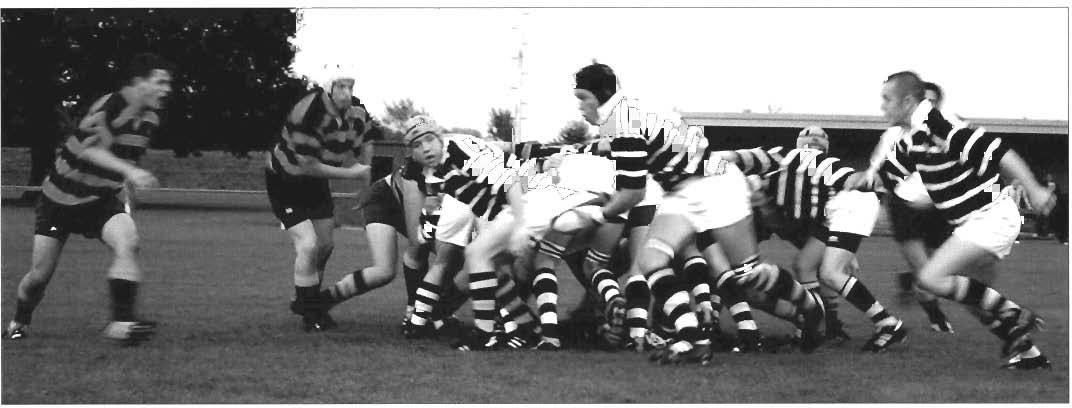
opponents. Off the pitch Pooley never exuded confidence but on it he was transformed, and he and Richard Syree were worthy winners of the Most Improved Player and Clubman of the Year awards. Protherough's throwing in was accurate to 2 and 4 in the line-out, although he struggled to find the power to reach the back, and he also produced one or two magnificent try saving tackles, often when least expected. Hand was the hardest trainer in the side and no-one deserved success more than he did. As captain of a team lower down the school which rarely won more than one game a year he could have easily lost heart but he never gave up and it was really gratifying to see him playing a key role in one of King's most successful First XVs. As Secretary of the Club he was an invaluable support to the captain, on and off the pitch.
The extensive flooding of the playing fields meant that the team became accustomed to using its Diglis headquarters for training, but miraculously managed to play most home fixtures at New Road, although Monmouth, Bromsgrove and Royal Grammar School were all casualties of the weather. Two of the Daily Mail Cup games were played with water lapping at the side of the pitch whilst Droitwich R.F.C. once again kindly stepped in to allow us to use their excellent facilities to play our 'home' game versus Camphill
With ten of the First XV returning the 2001-2002 team is likely to be strong although representative calls will man that a large squad will be required. The chances of the Daily Mail Cup success being repeated will depend largely on the draw and how soon King's come up against a team containing more than two sports scholars.
My thanks to SMB for his sterling work with the forwards and his statistical expertise on Saturday afternoons. For the record Ross Laidlaw performed most tackles throughout the season, a far cry from the days when fly-halves regarded themselves as far too valuable a commodity to be involved in such an unseemly aspect of the game
The extension of the fifteen a side season until well into February meant that preparations for Sevens were put on hold and at the team's first appearance, at the Brecon Invitation cvent, the King's line-up could be loosely described as experimental. The fact that the first game was played on a pitch covered with three inches of snow appeared to lessen the appetite for the game of one or two less hardy souls in the squad, but later in the day the appearance of the sun and the Headmaster rallied the team and we did record a couple of victories before bowing out to a powerful Millfield team
The cancellation of the Marches Sevens due to the Foot and Mouth outbreak did enable the team to gain some valuable
practice time and at Solihull King's were able to field their strongest Seven. The back line containing Major, Dale-Lace and Harris looked extremely sharp and we cruised through to the semi-finals only to lose in contentious circumstances to the eventual winners Old Swinford.
At the North of England competition illness and injury took out key performers but King's did well to reach the quarterfinals before again going down to the tournament winners Sedbergh. Harris scored the try of the tournament against them, but the injury suffered by Major in a comfortable win against Birkenhead proved to be more severe than it first seemed and his absence for the rest of the season robbed the team of their most accomplished player. Worse was to follow as three more of the first choice team dropped out of the remaining two competitions through injury or academic commitments. This gave the chance for players such as George Anstey and George Ballard to make a rapid rise from the Second XV to First V11 status and it was heartening to see them performing so well at our own tournament where King's reached the semi-finals before losing to Brecon.
At Rosslyn Park King's, effectively putting out a second team, did well to win three out of their four qualifying games but the absence of match-winning players showed against Dulwich, a match in which we dominated possession but conceded too many soft tries. Given that the draw had given King's a tremendous chance of emulating their feat of 1997 when they reached the final it was extremely disappointing to take such a depleted squad to the premier sevens event on the calendar.
The King's Sevens held at Worcester R.F.C. attracted a starstudded line-up and the final between Brecon and Colston's was a classic contest with the Bristol side's aggressive defence proving to be the decisive factor. The organisation of such an event requires weeks of preparation: whether it is worth it in view of the limited support received from certain quarters is questionable, but it would be a shame to see such a tournament disappear from the calendar. Sevens as a game is invaluable in developing handling and running skills - at schoolboy level it is actually better to watch and play than at senior level where scoring becomes too easy.
I hope that King's continue to participate in events where our boys have a chance to play against and hopefully with future international rugby players. In the time I have been running the Sevens at King's we have played against at least half a dozen current internationals including Ian Balshaw, Matt Perry and Kevin Morgan. Going further back MJR's 1989 team was beaten in the National Final at Rosslyn Park, by an Ampleforth side including a certain Lawrence Dallaglio. Such opportunities are not to be missed.
P.T.G.
The side had a mixed season with a large percentage of players getting call-ups for the 1st XV at different times during the season and it was therefore very difficult to establish a pattern of play.
There were impressive performances however, including wins at Queen Mary's Walsall and Cheltenham. Against Queen Mary's Peter Gill and the forwards were unstoppable in the line-outs and with the three quarters the team possessed scoring tries was never a problem. Against Cheltenham the whole team played with a great deal of sprit and confidence. The best game of the season was the resounding victory over K.E.S. Aston.
The side was always able to score a lot of points against weaker opposition, hut lacked the cohesion against the stronger teams. When the pressure was on they often made mistakes to lose games they should have won. This was typified by the last match of the season against RGS Worcester. After the lead had changed hands several times, Jamie Gwynne scored an excellent a try with a couple
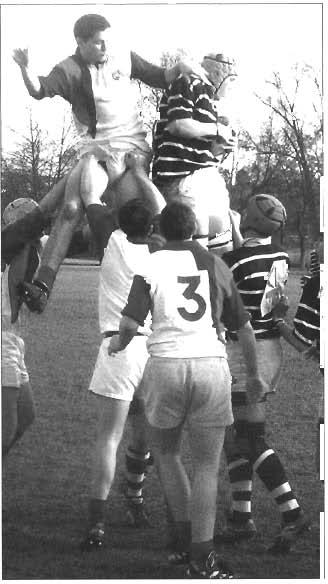
enabling us to take the lead, only for RGS to win the game with
Candlish penalty and the forwards were having their most effective match winning much ball and being very forceful in the loose play. In the second half, however, we allowed the RGS three- quarters too much room, lost our way and the match 243.
Ciaran Paterson, Russell Wakely, James Gunn, Simon Lowth, William Harris and Mark Southam were the pick of the forwards. Tom Wheaton captained the team well and was always in the thick of things, but the best performance was always by James Coleman who has as much energy as a nuclear power station. His brother Tom Coleman played well on the wing as did Jonathan Farmiloe on the other and equally impressive were Ashley Layton and William Hardy in the centre or at full back. Equally reliable were James Wallis, Joseph Procter-Nicholls, Jamie Morris and James Greenfield who joined the team from the Ul6s whenever we were short of players It will be nice to have many of these players available next season.
This was always going to be a very long and difficult season, a long range penalty with literally seconds remaining. and so it proved. The team had had some success lower down Special mention must go to Gareth Hughes, Ben Cliff, the school due to the strength and pace of their wings, but Oliver M'illiamson and George Anstey who never stopped others had now caught up and consequently different ways of giving their all. Thanks too to Mr. Guest who was a great coach playing the game had to be learnt. This took some time and we and also made me feel slightly taller. were not helped hy some long-term injuries to important Tom Soden players or the inevitable call-ups to the 1st XV.
Eleven fixtures were arranged, but we only managed to play six in what turned out to be the wettest autumn since records began in 1776. The first garne was against Warwick and the team, which was a strong one, had a fine win 26-14. Torn Soden scored two tries and so did Michael Champion. James Coleman scored one and the other try srol-rr was Neil Lonergan. It was clear though that a number ofplaycrs would soon be playing regularly for the second XV rather than the Thirds; a matter made worse when injuries to Richard Morris, Oliver Smith and Oliver Williamson left us further short of good players. Cheltenham, our second match, were very well organised, fluent and swift and they beat us 50-7, although I gather that our parents had much more success shopping along The Promenade so there was some benefit to the trip. After a typically robust I-1111, Russell Wakely scored our only try in this rnatcli which Richard Morris converted, but he was forced to leave the pitch shortly afterwards with a hand injury which put hirn out for the remainder of the season. We lost equally heavily to KES Birmingham and the return match against Warwick was also a defeat 17-31. William Hardy, Alex Troth and Jonathan Farniiloe were the try scorers and Christopher Candlish converted the try. All the games in November were cancelled and so when it came to the next game against Bristol GS we found them more accustomed to the rigours of the scrums, rucks and mauls than we were. Tom Coleman scored our only try in their narrow victory of 15-7. Much better was our performance against RGS; always one to strengthen the sinews and excite the crowds! We were in the lead fbr much of the game as a result of a Christophcr
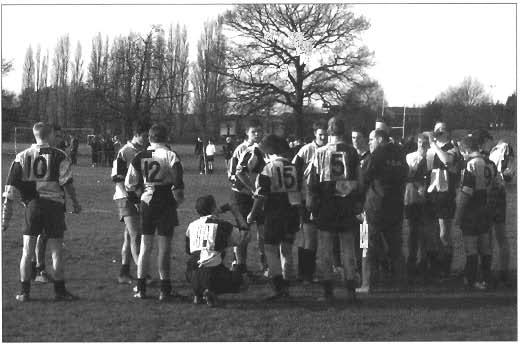
T11c sr>~>olldid howc\el- get off to a promising start with an excellent warm-up performance against Marlborough College, in which we out played them in almost every department. We also had an easy victory over a very poor side from King Henry's, Coventry. This, in only the second week of September, was to be our last victory. We did come close against a strong Chantry High School team in the county cup, but there were also some very healy defeats, most notably against Bristol and Monmouth.
The side lacked any real size up front, with no ball winners around the park. Also the backs lacked pace. They did however become very strong in defence as the season progressed, with Oliver Mathew and Joseph Timson regularly being top of the tackle count. In attack the backs rarely had the lion's share of possession and without a f~~llhack who could 'hit the line' we found it very difficult to break sides down.

We were always the smallest pack and therefbre Sound it particularly difficult in the tight, although Luke Weaver provided some excellent line-out ball throughout the season. The other outstanding forward was Robert Colquhoun who never took a step backwards and could be relied upon to put his body on the line.
Although this proved to be a very disappointing season in terms of wins gained, the boys showed a tremendous attitude on the training ground and were ably led by Oliver Mathew. There are certainly a number OSthem who have the potential to be 1st XV players but they still need to learn a lot more next season before making the step up.
Under 15 XV
W10 D1 L1 Pts For 496 Pts Ag l02
As the playing record would suggest this was another successful year for a strong side. In fact, there might have been even more wins had the season not been so badly disrupted by the severe floods; in all five matches were lost to the weather. There would seem little point in reporting on the number of comfortable victories. It was the key games against strong opposition which were targeted at the start of the campaign and these would seem the most worthy of mention. Our first real test came against Cheltenham College, injuries before and during the match saw us come under pressure, fall behind and eventually show great togetherness to prevail 24-22. Away at K.E.S. Birmingham was always going to be difficult. In the first wet conditions of the season K.E.S. scrambled a late equalising score to force a draw. And so to Bristol G.S. away, reputedly the hardest fixture on the list. Playing in a quagmire did not suit our running style and although we coped manfully with the giant Bristolean forwards for most of the game we went down 150. This was no disgrace but, in truth, the writing was on the wall the moment that Dr. Jefferson- Loveday led Simon Potter from the field and to hospital after the first meaningful tackle of the game. Our next close call came in the fifth round of the Daily Mail Cup on our long trip to Bedfordshire. A battling display and a long second half goal line stand was rewarded with a 15-3 victory and a place in the last sixteen of this prestigious national tournament.The regular members of the side were: G. Forbes, T. Hand, T. Cullen, S. Willmore, T. Mackenzie, T. Kenrick, T. Pickrell, S. Chandler, C.JeffersonLoveday, J. Davis, H. Dimond, S. Potter, S. Cullen, W. Smith and P. Winstanley. In addition, J. Kelly, A. Tew and E. Stevenson all from the Lower Remove bolstered the squad in the Daily Mail Cup run.It is not possible to mention the contribution made by all of these players individually; enough to say that they all played their part. However, I hope the
squad will forgive me if I single out two influential players. On several occasions Peter Winstanley was a match winner and his try from our own half at Birmingham was surely the champagne moment of the season: his gallant escape from the changing rooms at Luton was a close second. Finally, the absence of Simon Potter at Bristol brought home to all his importance to the side. As befits a captain he was our player of the season.
D.T.N.

The year was a very frustrating one for both staff and boys as match after match had to be called off due to waterlogged or flooded pitches.
At the beginning of the term when the sun still shone we went to King Henry's Coventry where the A team won 345. The B team lost fairly convincingly but tried hard. Warwick were the next opponents and the As won a close game by 2217. The Bs lost once more but produced some more promising rugby. The next opponents were Solihull who were dispatched in no uncertain terms by 51-7. However the B team lost again. Queen Mary's Walsall proved very tough opposition and the A team lost 31-24 in an exciting and high-scoring contest.
Against KES Birmingham the A team produced the performance of the season so far to win against a side which had drawn with us the previous year. The score was a convincing 27-0. The B team were outclassed 440. Then came the rains - and the tour against Macclesfield, and the matches against Bishop's Hereford, K.E.S. Aston, Hereford Cathedral School and the Grammar School were all cancelled.
In between we did manage a very muddy game at Bristol Grammar School and although both teams tried very hard, the lack of practice told in the end and both As and Bs ended up losing 27-12 and 22-0 respectively.
In the Spring term the A team beat Chantry HS and then Oldswinford in an excellent game during which Toby Fellows managed to tackle their free-running full-back so hard that he was not too keen to run at all after that and we sneaked a victory which was just about deserved. The score was 32-26.
The Sevens competitions provided yet more entertainment and at Warwick the team managed to win the competition handsomely beating RGS High Wycombe in the final.
The main force for the excellent season was the platform provided by the forwards of whom James Ranson, Toby and Charlie Fellows were outstanding throughout. Very few teams could compete with these three and Toby's tackling and the attacking threat posed by the other two were often enough on their own. The front row of John Porter, Sam Johnson and either Quentin Chandler or Lorcan Lynch were solid in the tight and Sam in particular was a constant thorn in the flesh of our opponents. Lawrence Hughes and James Tomlin improved greatly during the season. Lawrence scored some crucial tries with some excellent support play, most notably against K.E.S. Birmingham.
In the backs Tom Mitchell ran very well on the wing or in the centre and Matthew Lynas orchestrated things from fly-half. Andrew Blackburn made steady progress at scrum-half and gave good service to the rest of the backs. Darach Duffy made the full-back berth his own with some committed displays of tackling when required. The future of this team looks bright since they have good players in many key positions. There is not much strength in depth but credit must go to all the B team players who regularly turned out for practice and tried very hard in matches against much stronger teams. Alex Gibbons was their star and he may well go on to greater things if he can continue to improve.
J.L.O./S.R.D.
Under 12 XV
This was a long season which didn't realise too many victories. Added to this the problems with the atrocious weather which left horribly boggy pitches made training and playing often very unpleasant, yet a consistent squad of boys trained regularly and with much energy and good humour, considering the conditions.
Full credit must go to all the regular trainers and players, both in the A and B XVs. The A team only won two games but in none of their defeats did they capitulate and lose by a wide margin.
Mention must be made of several players in the A XV squad for their skill and attitude. Ed Jones was by far the team's leading try scorer - in fact there weren't many games in which he didn't score. By the end of the season he had perfected the
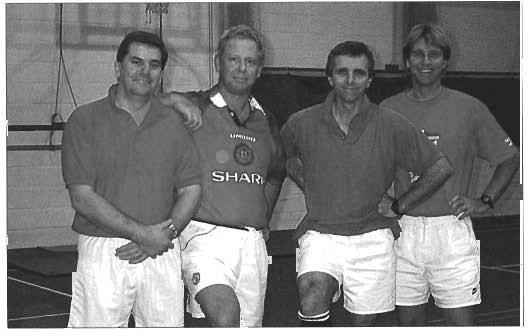
' art of the interception try. The captain, Tom Longley, was often one of the most skilful players on view (who will forget his winning try against K.E.S. Birmingham?),but even he was occasionally defeated by the mud and heaxy conditions. Jonathan Middleton always tried hard, as did Jack Herriot, the Toms Chilman and Bellfield, Piers Harris and George Clarke (when he wasn't being an actor). Huw Thomas could be a skilful scrum half if he puts on a yard of pace.
In both teams there was a handful of players who hadn't played any rugby before they came to the school. In a year or two they will have improved to such an extent that this squad will be a successfi~lone, both at A and B team level. The spirit is certainly there - all it needs now is for some boys to grow to the size of the giants that were playing for Warwick.
D.P.I./R.J.D.
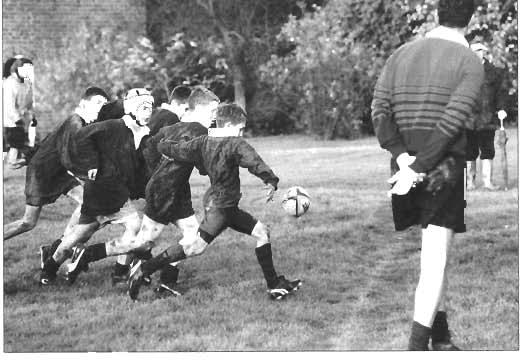
Wycliffe College and Pate's Grammar School on the first and last days of the season respectively. In between these victories were narrow defeats at the hands of Handsworth Grammar School, R.G.S. Worcester and Sir Thomas Rich's School, each by the odd goal, and a draw with Prince Henry's, Evesham. During the season thirteen goals were scored and thirteen conceded. Mike Whear was top scorer with five goals. We are all left to speculate on the results that could have been achieved with full player availability and good facilities for match preparation.
The second XI played five games, winning two and losing three. The victories came against Prince Henry's and Pate's Grammar School. Jordan Shimwell scored the only hat-trick of the season at senior level in the victory over Pate's.
Under 14 XI
Unfbrtunately only one fixture was played because of flooding, lie failure of the opposition to raise a suitable team and footand-mouth! The one fixture played (away at Wycliffe College) resulted in a resounding 7-1 victory with the rampant Josh Kelly scoring SIX after Keelan McNally had calmly slotted an early penalty. Despite the frustration of so many cancelled games, often at late notice, a strong squad practised enthusiastically wherever we could find a suitable surface. New boys McNally, Stephen Bilboe and James Hall particularly impressed, and should be part of a talented and successf~~lside next year.
M.C.P./C.H.
Under 13 XI

It is never easy producing a team that will represent the school in fixtures against opposition teams from schools where soccer is the main sporting priority in the Spring Term. In 2001, this job was made virtually impossible by the forces of nature. The deluge and flooding that seems to take place almost every winter was as bad as I can remember. All training and practice sessions had to take place at St. John's Sports Centre and the five-a-sideversion of the game is hardly suitable preparation for the expanses of the eleven-a-side game.
The unsuitability of our pitches and those of some of our opposition, meant that the only teams to play an appreciable number of fixtures were the First and Second XIS. The few fixtures that were played by the olher teams were mostly won.
Despite all of the difficulties of this season the First XI played with a good deal of spirit with Phi1 Burdon as captain. The high points of the season turned out to be victories against
This was a successful season in spite of the inevitable disruption caused by the severe flooding The side was U captained by Darach Duffy who along with John Porter and Charles Fellolvs formed a strong central spine to the team. The highlight was probably the good performance and excellent victory at RGS Worcester.
D.T.N.

The Boat Club won a number of events culminating in a very successf~~lMay Bank holiday weekend in Nottingham. The first major event of the year was the National Ergo Championships over 2000 metres where Julia Gilbert won the 514 category and Scott Rennie picked up an impressive silver medal. Very little racing on the water took place with the flooding leading to most events over the winter being cancelled. Wycliffe Big Head survived and the results were very good. The girls' eight won their division and all the other King's crews finished in the top four in their respective categories.
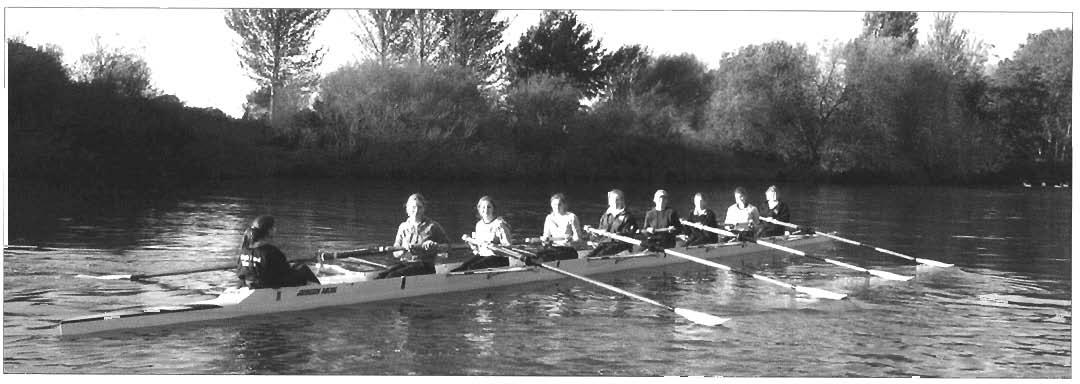
In the regional trials forjunior 1416s the school had its best ever performance. The girls' junior 16 U16) coxed four, girls' 515 quad and the boys'J15 quad all won their respective classes and were selected to represent the West of England at the inter-regional championships. During the Easter holidays Zac Purchase, winning the 515 single sculls, and Ben Maxwell in a 514 double scull, gained further selection.
The senior and 515 squads travelled to Peterborough for a very productive four-day training camp organised by coach Paul Sterck. Providing invaluable coaching help were two OVs - Zoe Witowski and Seb Pearce. The J14 squad, run by TRS had their own training camp at Worcester towards the end of the holiday culminating in a very entertaining mini regatta. After Easter came the Inter-regional Regatta, this year held at Eton's new multilane course. Our region, the West of England, won the event overall, helped enormously by the performances of the King's rowers. Zac Purchase came second in the 515 single sculls and the J15 boys' quad won their event. The 515 girls' quad also won valuable points finishing second. The 516 girls' coxed four fought a hard race, finishing fourth overall and Ben Maxwell finished second in the 514 double.
Evesham Regatta this year proved a happy hunting ground for the club with the senior four containing Bill Brigden, Scott Rennie, James Scott, Will Rimell and Harry Denlegh-Maxwell winning both the Senior 2 and 3 categories on the Saturday, beating a number of school and university crews in the process. The 515 boys' quad won in what ended up in being an all King's final as the B quad beat the Royal Grammar School to make the final.
Senior girls squads were very unlucky, after making three finals. Nicola Longmore was injured in the first final, when leading. This meant that the eight's final had to be scrapped, and the four lost in a very close final in the last race of the day.
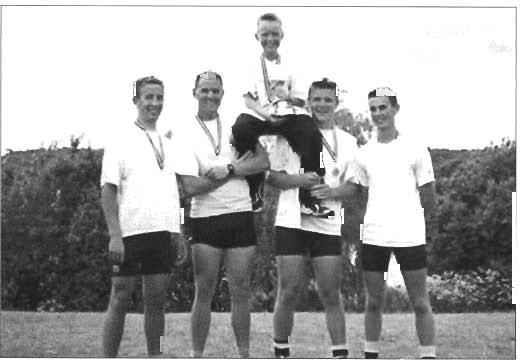
The J16 boys' four, after making it through four rounds lost to Birmingham University in the final. This four was to have reward on the Sunday, even if it did take a re-row to beat Bristol University in the final.
The boys' senior squad split into two eights for the Sunday Sprints, beating the Royal Grammar School in the final of Senior 2 and Weybridge Rowing Club in the Senior 3 final.
An excellent performance by Laura Ranson and Vicky Taylor saw them winning the 515 doubles beating the Gloucester Rowing Club crew who a week earlier had won the Inter-regional championships at Eton. The 514 squad also raced over the weekend, doing very well and gaining experience from its first regatta.
A hot and sunny Shrewsbury regatta followed Evesham where the early form of the boys' four continued as they beat both Shrewsbury and Royal Chester school fours to win their event. The novice girls eight had a very good day, winning two rounds to eventually lose in the final to a very strong Oxford college crew. The J14 squad raced with the boys' quad winning three out of their four races.
The National Schools Regatta, this year at Nottingham, provides the main benchmark for school rowing in this country. The senior boys' four won the School Fours trophy on the Saturday, dominating the event. Ing's last held the trophy in 1977, with the Great Marlow four winning the trophy in the following year - a certain Steve Redgrave at stroke. The girls' eight competed at the highest level, Championship eights, and came fifth in a fast final. The 515 boys' eight raced superbly to wit1 the gold in the 515 B eights' event, beating Eton narrowly after battling with them for two kilometres. On the Sunday into a stiff headwind, Zac Purchase won a well-fought bronze in the .J15 singles. The girls' squad were represented by a Jl6 coxed four and a J15 coxed quad.
Both the girls and boys squad represented the school at Henley. The girls eight beat Henley in the first round, losing in the semi-finals to Headington School, the winners of Championship eights at National Schools' Regatta. The boys had a tough draw in the first round, losing to the eventual Australian winners King's School, Parramatta.

Henley Crews
Girls WZ:Caroline Hart, Sophie Moule, Nicola Longmore, Rachael Dawson, Julia Gilbert, Aimee Stewart - Cox.
Boys John Maxwell, Bill Brigden, McKinnon, Scott Rennie, James Scott, Harry Denlegh-Maxwell - Cox.

At the National Championships the girls won a bronze medal in the junior eights, the blue riband girls' event. Their
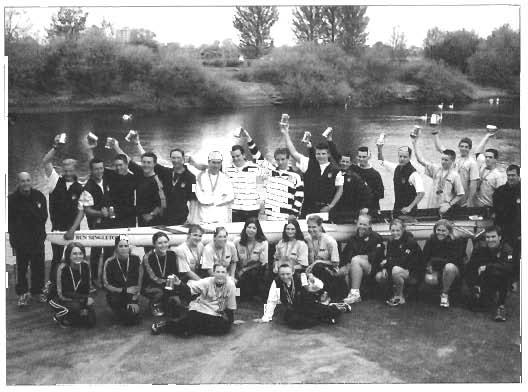
performance was good enough to earn them a place in the England team, racing the other Home Countries
The boys' four, with John Maxwell replacing the i~juredBill Brigden, won a hard fought silver medal in the junior coxed fours, missing by a few inches the gold medal, won by the Windsor Boys' School. As one of the last races of the C:hampionships, it seemed fitting that it was also one of the best. On the Saturday, Zac Purchase picked up a bronze medal in the juniol- 15 single sculls just behind his friend and I-ival Andrew M'alker of Evesham. The King's School was also represented in finals by a girls' junior 15 quadruple scull and boys' junior coxless four.
The following Satlu-day the King's girls eight, representing England, produced a strong performance to finish second in the Home Countries International Match at Nottingham to clinch victory fhr both the,J~~niorWomen a~ldthe English team overall.
N.J.M.

Senior School
On the Pace of it, seven cuunty champions arid nine qualifiers fhr the Mason trophy would seem to mark a successft~lseason hut these results do mask some problems for the club. Most notably, the School track, which has been deteriorating over the years, was dealt a further blow by the worst floods in recorded history. The cost of refurbishment, although not necessarily prohibitive, would seem to be folly because of the prospect of f'l~rtherdownpours. Furthermore, the container is evidently no longer above the high water mark and as a result the high jump beds were ruined and had to be thrown out; replacements, if forthcoming, will have to be housed elsewhere. Other equipment was soiled but salvageable. The dilemma of what to do with the area has not been resolved. In the meantime, most practices, matches and sports days have moved to the city track at Nunnery although games lessons remain at the Chapter Meadow site.
The plans to extend the fixture list have also bren shelved because of the difficulty in fielding competitive teams with the competition from Cricket and a strong Rowing cl~tb.U~lrelated to this it was a shame that there were so many cry offs before the Bromsgrove block fixture. In fact, the team did I-emarkably well considering the absences but it was demoralising to receive so many feeble excuses which hardly encouraged thoughts of extending the programme. In spite of these
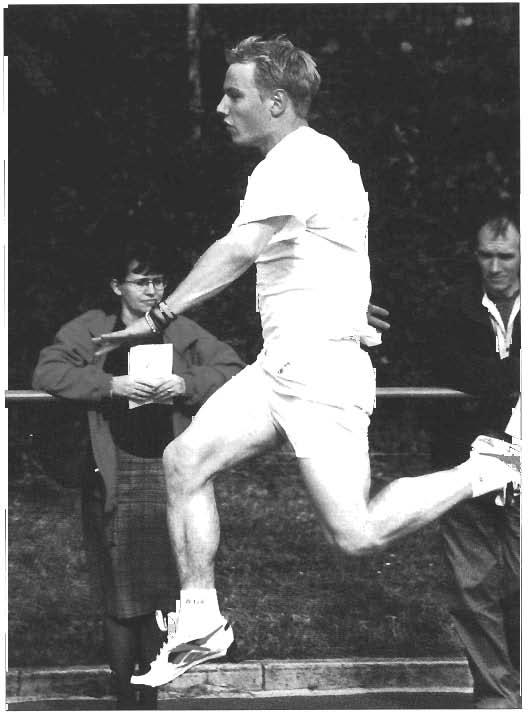
shortcomings, there were still opportunities for pupils of all ages to train and compete: at least one fixture, a District championship, thc Cot~ntyChampionship and Mason Trophy for selected athletes and a School sports. I would also encourage pupils to join b70rrester A.C. who train and compete throughout the year.
There were good team and individual performances during the season and seven co~untygold medals were ~von.Amy Jones was once again very near the entry mark for the English Schools in the IG 200m with her powel-f11l sub 27 second sprinting. The brothers Blackshaw prod~~cedtheir best efforts at the Mason Trophy; Nigel threw nearly 441n to finish fourth in the SB javelin and Ben's 13m IB triple jump was enough to claim third spot. Sam Doughty won the S(; coul~tyshot putt title for the fourth time in five years and Emily Freeman the IG county,javelin title for the third time in four years. Adrian Uren was another county gold medallist with a personal best 43m effort in the IB javelin and Jessica Higgs prevailed in the IG shot putt. It is of course difficult to compare different events but, in spite of the excellent performances of those already mentioned, two athletes stood out: Tom Harris and Luke Amphlett. Torn was confirmed as the fastest pupil in the two cotulties. In his usual laid back way he gave the field a couple of metres off the start but eased his way to victory with relative ease. He I-emainetl ~rnl~eatenand was unfortunately unable to attend the Mason Trophy. L~tke'seffortless middle distance running was also a ,joy to watch. In cross-country, he was the county champion and ran s11cce~sfi11Iyin the Birmingham league for Worcester A.<:. - regularly being their top finisher, and, on the track, he was the 1500m county champion and turned out regularly for the aforementioned city team. My thanks to MML, JC, ADC and PTG who coached on Mondays and to other staff who took time to officiate at various times during the season.
D.T.N.
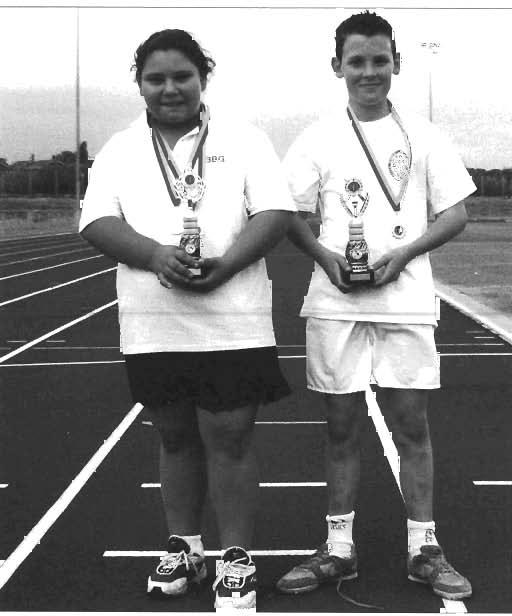


Overall
Positions 8 5
Victor/Victrix Ludorum
In all well over one hundred pupils competed for the School, thirty one were selected to represent the District at the County Championship and seven won County gold medals. The County medallists were:

1500m l OOm
Javelin
Shot Putt
Gold Adrian Uren Javelin
Silver Ben Blackshaw Triple jump
Intermediate Girls:
Gold Emily Freeman Javelin
Gold Amy Jones 200m
Silver Amy Jones Long Jump
Gold Jessica Higgs Shot
All of these athletes were selected to represent Hereford and Worcester in the prestigious Mason Trophy; an annual intercounty match including Greater Manchester, Merseyside, Cheshire, Staffordshire, Shropshire, West Midlands and Avon.
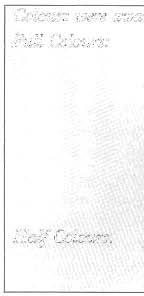
awarded as follows:
Nigel Blackshaw (re-awarded) lett (re-awarded)

JB Josh Kelly IB Ben Blackshaw G Amy Jones
SB Tom Harris

Forms
At the District Minors Championship seven of our pupils were selected to represent the City of Worcester, they were:
Tom Mitchell l OOm
Max Franklyn 200m
~dward~onk(L4) 200m
Tom Amphlett Javelin
Matthew Lynas Discus
Darach Duffy 1500m
Beth Ghalamkari Discus
There were fewer qualifiers than in recent years, particularly amongst the girls and only one medal was won, that being Beth's silver in the discus. This was by far the worst showing in my time and I challenge the Fourth Forms to work hard at their athletics and improve our medal haul in years to come. The stronger Fourth Form athletes competed on four occasions with the year above and in their own match against four other schools. Overall, the boys' teams is quite promising, with the L4s seemingly a strong bunch, but there is much to do particularly for the U4 girls. In recent times I have awarded a trophy for the male and female athlete of the year. In the girls, Sam Perry is clearly a promising athlete and Sophie Le Marchand did well but Beth Ghalamkari received the award for her silver medal at the county minors. For the boys, Ed Jones was a candidate. He did extremely well to qualify for the county event in the 200m a year young and he is obviously one for the future. The other county qualifiers were considered as was James Cant, James Ranson and Charles Fellows. Charles is probably the best all-round athlete and games player in his year but because of his cricket commitments he was not always available. In the end, I decided that Darach Duffy deserved the
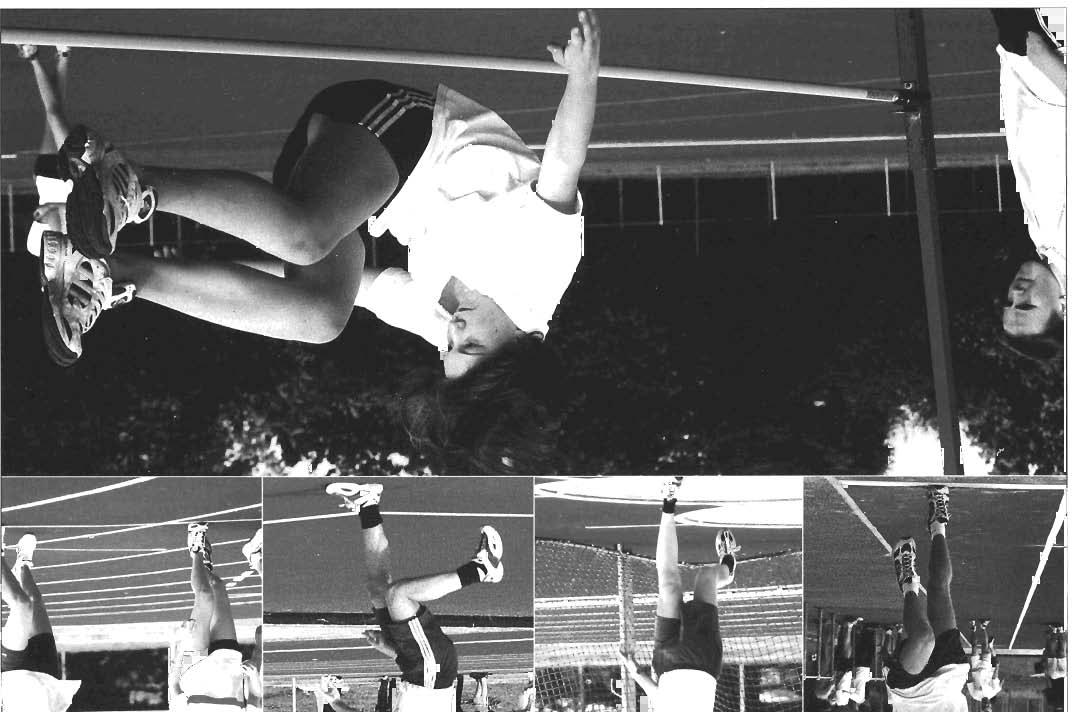
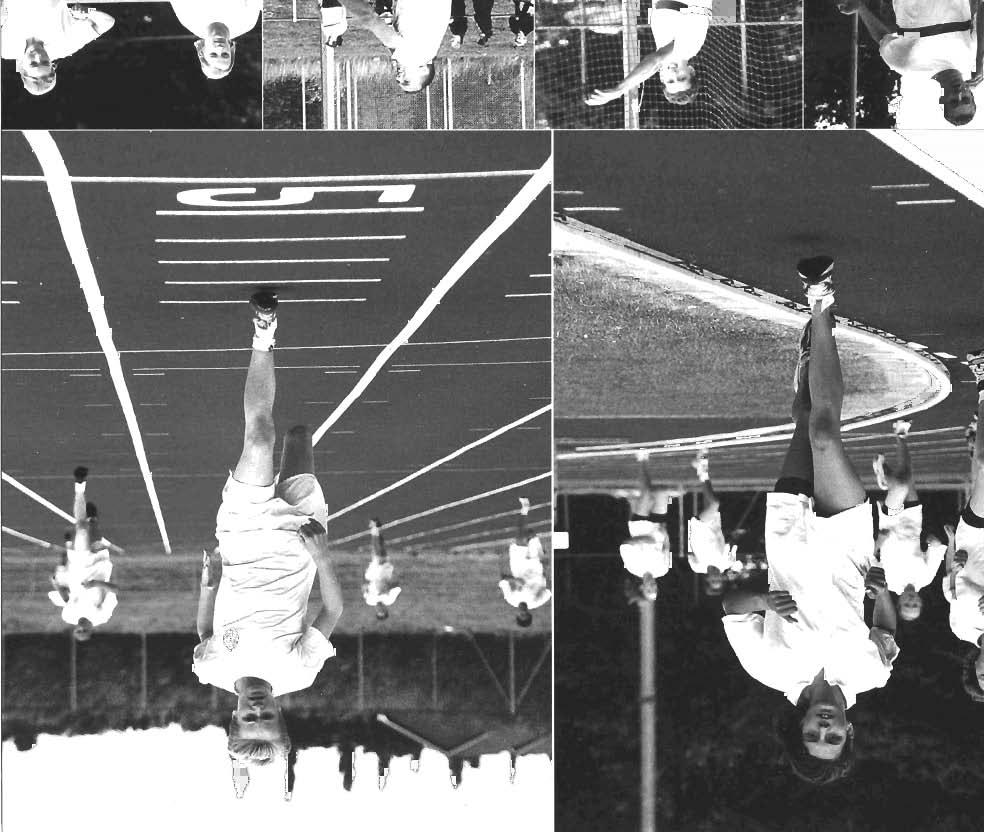


award. He showed himself to be our best distance runner, winning the School cross-country and he ran with great heart and commitment over the gruelling three and threequarter lap distance on ten occasions over the season.
Fourth Form Sports -New School Records
L4 Girls 1500m S. Le Marchand
L4 Girls High Jump S. Perry (1.23)
U4 Boys Discus M. Lynas (27.58)
Pafmmances which merited a District standard as lazd E.S.A.A. were:
B. Ghalamkari U4 Shot (8.23) Discus (21.99)
E. Jones L4 200m (29.2)
C. Goodreds L4 Javelin (26.85)
M. Lynas U4 Discus (27.58)

D.T.N./F.L.S.


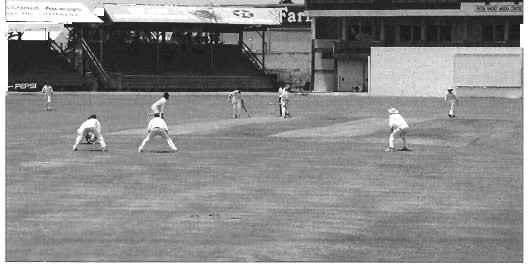


The season came upon us at a time when mud wrestling would have been a more appropriate sport to be playing on our fields. Flooding and standing water for nearly six months had resulted in the death of much of the grass on the square and the outfield resembled parts of a ploughed field. The fact that all the 1st XI fixtures before half-term were away meant that only the first game against Warwick was lost to the weather. At this point it is appropriate to express thanks to Phil Tyrrell and his staff for the amazing work they did in getting the pitches back up to an incredible standard by mid-June.
The make-up of the 1st XI does not seem to have changed a great deal over the last three years, particularly on the batting side. It was the bowling where we thought the problems may arise, having lost both left arm opening bowlers from last year's squad. The pace and accuracy of Rob Seeley and the canny knack James Hill had for picking up important wickets were missed. Luckily, Joe Robinson made two discoveries. Firstly, that bowling can be fun (after many years of persuasion!) and secondly that he was actually quite good at it. This provided us with a good source of wickets. The mainstay of the bowling, however, was once again the captain, Nick Dale Lace. In his last year at King's he took 55 wickets, both a school record and the most achieved by any other schoolboy bowler in the country last year. In his four years as a member of the 1st XI he has taken 160 wickets, an incredible achievement. He has also been the inspiration behind the dramatic improvement in our fielding, with all the boys trying to reach the very high standards that Nick constantly set.
Although a number of other bowlers were used, none managed to dominate, and this is a worrying factor for the season ahead. Osman Fiaz bowled a large number of overs with the new ball, but failed to get the number of wickets to reflect this. Steven Daly enjoyed his most successful season, losing his nerves and managing to be far more consistent in both his line and length. Phil Burdon, Ben Pitts, Will Hardy and Paul Hallett also bowled, but all have some way to go before they can be fully relied upon at 1st XI level.
In our main Saturday fixtures we were again dominant until the last game against WRGS. All these games were won except for the one against KES Birmingham, which was a superb game with a nail-biting finish eventually resulting in a very close draw. The WRGS match was also a highly exciting affair that could have gone either way right up until the last ball. Both these games highlighted that our batting, which on paper was very strong, failed to come up with the big partnerships when it really mattered. In virtually no game did two of our batsmen make big scores. It was always left to one person to make the significant contribution. Against KES, chasing 230 to win, Nick Major scored a brilliant 103 (the only century of the season) but no-one else managed to offer any useful support and we fell 10 runs short. In the match with WRGS, requiring only 168 to win, Joe Robinson scored 55 but again nobody managed to make a telling total at the other end. The disappointment felt after this first defeat by the Grammar school for four years will, I hope, inspire our very talented top order to come up with some major partnerships next year.
The 2002 season will be the end of a significant period for the 1st XI. Five of the side have played since the Lower Remove and two more since the Upper Remove. Consequently there is a vast amount of experience and talent within the team, which I hope can be focused towards an undefeated season. There will be no big overseas trip to look forward to this year, but the long awaited return to Jersey is on the horizon.
My thanks once again go to DPI for his organisational skills and his love of umpiring! I would also like to mention Tim Dale Lace who has scored impeccably for us over the last four years.
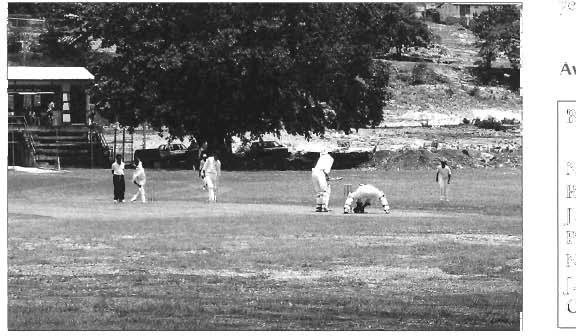




Under the firm leadership of Aclam Papaphilippopoulos this year's team at last came near to fulfilling their potential, winning four of the seven games that the weather allowed us to play. The sublime and the ridiculous were the right way round, in that our most abject performance came at the beginning, when we managed to lose to Solihull after dismissing them for 88, and our greatest achievement - the (now quite routine) victory over RGS - came at the end. In between was the (also routine) abandoned game at Wrekin, where we did at least have time to restore batting confidence after Solihull: Tom Soden (58 not out) and Papas (40 not out) contributed to an impressive 172-1. Richard Morris distinguished himself not only by making 24 but also by not running out either himself or his opening partner! The matches against Hereford Cathedral School and Bromsgrove were similar in that we played both with only 10 men and yet won against 11. With the Lower Sixth joining the Fifth Form and Upper Sixth, for the first time this year, in taking important public exams, schools in general found it much more difficult than befol-c to field a fill1 team. In Pact we fared rather better than most; sonle schools had a core of only four or five cricketers, and made up thc numbers with players who clearly had little experience. We, on the other hand, though sometimes only having ten men, did at least have ten cricketers! The willingness of Fifth arid Sixth formers to give up their time to play cricket for thc School was most encouraging, especially compared with the experiences of others. So we dismissed HCS for a mere 56, with seven of their batsmen being bowled and two run out - a sure sign of inexperience. Yet we made heavy weather of batting first; Stephen Protherough's 38 as opener was almost wasted as the others collapsed around him, but Luke Weaver saved the innings with 35 (including four sixes!) coming in last. Protherough wasn't leaving anything to chance in the opposition's innings: he took 5 for 12. In fact, when he turned up, he was the most dangerous of our howlers, especially against the less experienced batsmen. He took another four wickets against Bromsgrove, who were dismissed for 129. This time he had some help fk-om the quickies, Ben Pitts and Will Hardy each taking 3 wickets. Hardy's appetite fbr success oozed into his batting: coming in as an unlikely number 3 after the two openers had gone cheaply, he was still there at the end with 57 not out. Oliver Mathew, having been reprieved of the chance he always gives on about 10, stayed with him and just missed out on his own half-century. In the end we won rather too easily, as Bromsgrovc's discipline fell apart.
Against KES Birmingham we had 10 men yet again, but so did they, which may explain why they won! We were all out for 68, but when fielding our discipline and commitment never [altered, and KES made the runs with only 1 wicket to spare. Once again Hardy took 3 wickets, as did Weaver. Pitts took another two, despite the problems he has with the new health and safety rule that forbids school quick bowlers from bowling spells of more than six overs: it takes him until his sixth over to get his rhythm right, and then he has to be taken off! I gather he got it right in Barbados! The match at Bristol Grammar School was a 30-over-a-sidejob, which we won with eleven men: in fact twelve turned up at the coach, and we had to draw lots to lose one! Papas had his best figures of 434 in Bristol's 140,
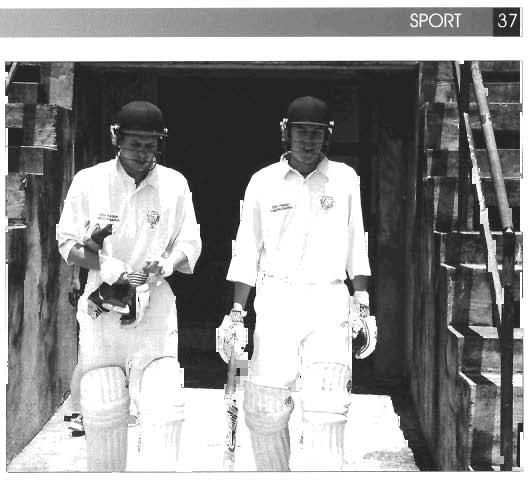
Phi1 Burdon and Jor Kohznson
with Hardy getting another 2 and Tom Colley bowling 6 overs for 14 runs - impressive in a limited-overs match. James Byrne, who is usually under-bowled and tends to have catches dropped off him, especially in his first over, took two with his leg-spin. Our winning 144.5 was mainly due to Kichard Syree's 46 (easily his best innings of the season) and an unbroken sixth-wicket stand between Robert Colquhoun (14) and Mathew (22). Mathew had earlier taken hvo catches and a stumping as wicket-keeper. One of the features of the season was the fact we had two excellent wicket-keepers: Mark Rose, also a tenacious batsman, usr~allykept, but when he was away Mathcw was the perfect substitute.
Weaver and Protherough finished off RGS in the final match with 5 and 4 wickets respectively. Papas was away in Grcccc, but Pitts' shrewd captaincy red~~cedthe opposition to 94. The star of the reply was Duncan Griffiths, who not only opened the batting for the first time but made 54 in only I(i overs; after scoring 9 fours, he reached his 50 with a 6 - and then was promptly bowled going for another! By then the job was done, with a lot of help from Morris' 20 not out, and we'd retained the unofficial Ashes. Record: played 7, won 4, lost 2, drawn 1. A most satisfactory season, both for the results and for the spirit and discipline of the team.
K.N.G.S.

2001 was a wonderful season for the Under 15 team with eight wins and orlly one defeat. With s~~ch an attacking side draws were not really an option. The boys played excellerit cricket throughout the term and their enthusiasm, competitiveness and ability does then1 great credit. Despite call-ups to the 1st XI occasionally depriving them of a star or two the strength in depth was clear to see. Hi~wDimond captained the tearn wcll, using the natural talt~ntsof star players whilst getting everyonc a game wherever possible.
The only game that would like to be Li)rgottcn was the first against Solihull. Rusty bowling actions allowed the home side to score over 200 runs which proved to be too many at this early stage. Later in the season it might well have been a different story.
The run of the victories started at Wol\.erhampton Grammar School where tight bowling particularly from Tom Cullen restricted the home team to 139 off their 38 overs. An heroic innings from Tom Weston saw off a genuinely quick and intimidating opening attack and allowed the power hitting from Tom Cullen and Charles Jefferson - Loveday in particular to make mincemeat of their second string bowlers. Victory came with five wickets and seven overs to spare.
The first home game, against Hereford Cathedral School, was according to the scorebook, played on 'weird plastic' as the Under 15 pitch was still recovering from the floods. On a slow and low artificial surface the King's total of 145 was more than enough and victory by 79 runs was achieved in 25 overs. As often happened this year the wickets were pretty evenly shared. A Thursday evening 'B' team fixture against Solihull proved to be the closest of the season. The visitors were coasting towards the victory target of 104 when a combination of nerves, tight bowling and lack of talent caused the wheels to come off. They ended up two runs short!
Bromsgrove is always a good game to win and this one was achieved in style. Tight bowling by Will Smith and Pete Winstanley early on put pressure on the home team and then, after the drinks break, Sam Cullen did the real damage with 4 for 19. The target of 129 was never likely to be enough and a rock solid 52 from William Woodhouse followed by whirlwind scores of 21 and 32 and the Cullen twins silenced the opposition and completed a win by seven wickets - an excellent all-round performance and probably the hest Saturday result of the season. Easy victories followed in midweek fixtures against Pershore High School and The Chase. These proved to be good warm-up games for the season's main event - RGS Worcester, away.
A devastating opening spell of 4 for 23 by Will Smith did some serious damage but RGS recovered well to score 121 from their 25 overs. Openers Huw Dimond and Tom Cullen, quickly followed by Sam, got off to a flying start in reply with 75 on the board after only nine overs. There then followed a serious wobble and wickets tumbled. William Woodhouse held the innings together but for a long period very few runs were scored. Finally Mike Wilesmith came in at number 9 and stopped the rot allowing victory to be secured in the penultimate over to great relief and jubilation all round.
On a high after this result Bristol Grammar School were caned just two days later. Will Smith, Tom Cullen and Pete Winstanley knocked them over for 66 and then the runs were knocked off in no time to allow the visitors an early journey home.
Urlfortunately that was it, the season was over. More fixtures would have been welcome but it was not to be. Next year Inany of the team will be competing for first-team places and in two years time most of them will be playing together again. Thanks are due to the parents ~1110 supported us this year and the groundsman and his team who did a sterling job to prepare a pitch at all after such a spring.
S.Le M./I.C.R.
pace and straightness of Josh Kelly's bowling unsettled most of our opponents and this was reflected in some fine returns. The other key bowlers were Davies (30 wickets and a best of 2-1-2-5) and Keelan McNally (21 wickets and a best of 5-2-9-5). The team lacked a front line spinner but Bilboe picked up some wickets later in the season with his off-spin; he took 6 for 21 at Bristol Grammar School and claimed that he had been turning it miles!
To be honest the fielding was pretty abysmal in the first few games but improved steadily as the season progressed. Francis Hine-Hughes missed little behind the stumps and Alex Dobbins was superb anywhere in the outfield.
The team easily reached the final of the Lord's Taverners Cup, Bilboe (121") and Kelly (83) sharing a partnership of 201 against Earls High in the quarter final and 170 against Malvern College in the semi (Kelly 121, Bilboe 79). In the final RGS batted very well to reached 256 for 5 in their allotted overs. King's, however, were not overawed and before the dismissal of Bilboe for an attractive 58 kept up with the run rate. In fading light and rain Ballard raised hopes with a violent 36 but the target eventually proved to be fifty too many.
Bilboe proved to be a confident and thoughtful captain who had the full support and respect of the team. Itwas nice to hear several members of staff taking opposing teams commenting on the excellent spirit in which he, and the rest of the team, played the game.
M.C.P.
Under 14 XI
Won l5 Drawn l Lost 3
Overall this was a highly successful season during which we lost to only two schools (Solihull and RGS Worcester) and reached the final of the Lord's Taverners Cup.
With the exception of the first game of the season against Solihull (when we were caught on a wet and grassy wicket) and the last game of the season against RGS, the batting proved to be very strong. Stephen Bilboe combined a watching defence with punishing cuts and pulls to score almost eight hundred runs at an average of 66. He shared a number of important stands with Josh Kelly (518 runs at 52) and Guy Davies (three fifties). Duncan Colquhoun also scored some attractive runs and Keelan McNally began to find his touch as the season progressed.
The bowling proved to be equally as impressive. New boy William Ballard opened the bowling throughout the season and invariably obtained prestigious movement off the pitch (and as a result tended to only get out the best batsmen!). The

This was a season which followed a similar pattern to that witnessed last year. The team fielded quite well, but were unable to win many games because no-one performed all that well with the bat. The highest score throughout the season was 31 by.John Porter. Charles Fellows with 30 against Bristol G.S. and 30 n.o. against K.E.S and Andrew Blackburn with a 30 against Hereford Cathedral School were the only other decent scores from our batsmen. James Ranson had a 20 n.o., Simon Insley a 23 11.0. and Tom Mitchell a 26 n.o., but apart from these scores they did not go on to repeat or develop any other innings of substance.
Sadly, our first fixture against Warwick was cancelled as a result of the wet weather, but the second against Solihull was playable. They scored 182 for 2 and we were bowled out for 32. A better performance was shown against Wolverhampton G.S. Tom Mitchell and Matthew 1,ynas scored 19 and 17 runs respectively to help us secure a draw. The match against Pershore High School was our most convincing performance as we won by 8 wickets and this was followed by another victory against Hereford Cathedral School. Ben Chatfield with 3 for 7 and Charles Fellows with 2 for 6 were instrumental in securing this victory by 58 runs. Our only other victory was against Bishop's Hereford and for this we can thank the accurate bowling of Simon Insley (3 for 5), Charles Cliff (2 for 6) and Charles Fellows (2 for 16).John Porter had his best innings of 31 in this match and showed again how well he can spin the ball.
We had a good opportunity to beat KES at 46-8 but they went on to reach a total of 110 which proved to be too high a target for us to reach.
The coaching expertise of Gavin Haynes was much appreciated by the players and there were notable improvements in their individual skills throughout the course of the season. Ben-jamin Chatfield learned to bowl to a good line and length, Simon Insley was equally accurate as a bowler and a very effective captain, a task he shared with the equally capable Charles Fellows. The Fellows twins are not quite in the same class as the Waughs, but they are getting there. Porter and Blackburn were a solid opening pair and were ably
supported by Tom Mitchell. Samuel Johnson was a neat and efficient wicket keeper and William Herriot was an able deputy. Joseph Bond and James Priddey became better batsman as the season progressed and both Lawrence Hughes and Benjamin Riddell showed they could swing the ball. Michael Magill developed as an all-rounder and so too did Hywel Rees and Jonathan Cairns-Terry.
M.R.G./ A.W.L.
The team's start to the season was scarcely auspicious when we managed to lose against Solihull by 107 runs, with the highest individual score being 8! The 'B' team managed to achieve that rarit)i a tie, with both teams managing to scrape together 57 runs. Against Wolverhampton Grammar School, having dismissed the opposition for a paltry 63, our frail batting resurfaced and we fell 30 runs short. Sophie le Marchand, Matthew Humphreys and Helen Bellfield were amongst the wickets but sadly no one managed double figures with the bat.
In the Worcestershire Schools' Cup the Earl's High School provided us with some sorely needed batting practice as we overhauled their score of 46 with the loss of only one wicket and Bishop Perowne succumbed to our A/B team by 8 wickets, Stephen Poole serving notice of things to come with a lively knock of 22 not out.
Theri against Hereford Cathedral School we eventually showed some better form in an exciting encounter where we Failed to win by only 7 runs and thus achieved the only draw of the season. Thomas Longley top scored with 32 and Sophie le Marchand contributed 22. Tom Longley also took 3-16 in an excellent all-round performance. Bishop's Hereford provided the next opposition and they were dispatched in no uncertain terms thanks to Stephen I'oole's magnificent 59 not out (mostly through the leg side). Sophie contributed 416 in two excelletlt spclls and Torn took 3-22. Against RGS Worcester we came up against a much stronger side and we lost by 95 runs but we did manage to score 136-5 in our 30 overs.
K.E.S. Birminghan brought out thc gremlins in the batting as we collapsed to 55 all out which was not enough to prevent a loss by 8 wickets. Next we beat The Chase by 21 runs and we destroyed Bristol Grammar School hy 95 runs. Matthew Driscoll played well for 19, and Longley and le Marchand contributed 56 not out and 23 repectively. Our bowling attack performed very well and Heletl Bellfield and Sophie took three wickets apiece. The season ended with an abandoned match against the Grammar School.

Marchand and Helen Bellfield who performed to a high standard for the team but who were also picked to represent Worcestershire at under 17 level and Sophie was also selected to represent England. It is a great pity that the weather intervened once again and the match could not go ahead. Her chance will come.
J.L.O./R.J.D
The overriding impression of the year must surely be one of RAIN. There was so much of it and it stayed for so long! From October to Easter we were deluged on a regular basis, flooding the river, annihilating our grounds and eliminating our teaching spaces. Yet every afternoon a year group would turn out in kit, expectantly, wondering what they were going to do that day and looking to us to provide something exciting and different to keep them happy and fit. Never was a games lesson or training session cancelled, but instead staff and pupils braved the weather and found alternative venues to maintain the girls' high standards of skill and fitness. A variety of activities were added to our repertoire including aerobics and dance using any available space in school as well as hiring a local gym, cross country running all over Worcester, and hiring the UCW astro whenever it was available.
I have the most tremendous debt of gratitude to pay to all the staff, who managed to keep the rowers, the hockey players and the netball players motivated and fit through appalling conditions. Their enthusiasm and determination not to be beaten carried us through the season. Thanks should also be given to the girls for their forbearance and for somehow remaitlitlg as enthusiastic as ever, even when the rain was dripping down their necks! N.R.A.
Both A and B teams improved significa~ltlyduring the season and they can look forward to building on this year. The players practised hard and worked on their technique in the nets. As ever the fielding is a crucial part of the performance and this was variable. Too many catches were dropped particularly early in the year. Ground fielding is an integral part of the game and needs constant practice.
Finally, congratulations must go to both Sophic Ic


The Under 16 squad was thc first to shine and came runnersup in the District tournament and went on to the County round along with Bromsgrove.
The Under 18 Tournament was ncxt and WC pcrformcd the best we have ever done but it was still not quite good enough against schools with hockey academies and centres of excellence.
The next County events were trials and Tournaments and Zeta Guest kept her place in the Under 17 side and Katie Humpage was selected to play for the Under 15 squad. Both girls played regularly.
Icing's were on form in the Under 14 District Tourrlametlt winning all their games. They beat MGC, Droitwich and Christophrr Whitehead and went onto the next level but did not perhrm as well as they should.
The Under 13 squad went to the Minis Tournament and performed well against local clubs as well as school teams. They were knocked out of the semi-finals by Bromsgrove. King's performed well in the County tournament where they came equal first with Malvern Girls' College.
I am delighted to see a large number of girls attending clubs in the local area and Lara Parsons and Kate Herriot played in the semi-finals of the Under 15 National Hockey Cup for Worcester Norton.
Unfortunately, owing to Foot and Mouth disease, the 1st XI tour to Llandovery was cancelled. During half term 25 Lower and Upper Removes went on tour to Barcelona. This was most
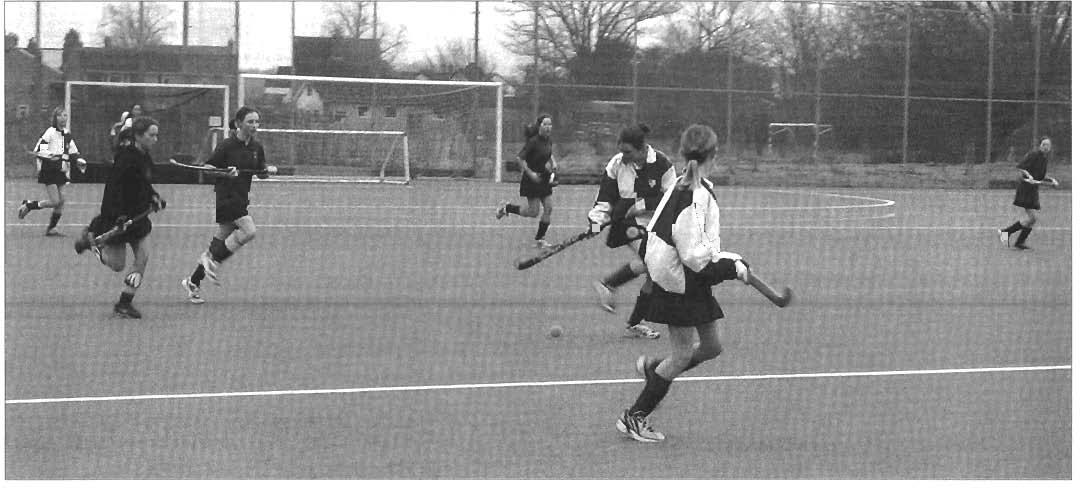
successful and good weather, exciting matches and interesting trips made it really memorable. (A rqbort appears zn the 'li-auel Sectzon of thzs mngazzne - k,'d.)
F.L.S.

Like many other sports Hockey was hit hard last season, having over half the fixtures cancelled for factors beyond our coritrol, namely flooding and Foot and Mouth disease.
It was disappointing and frustrating for pupils, staff and parents alike.
We utilized local astro-turf pitches to the full and trained regularly and had one coaching workshop with a local distinguished coach, Tim Rarlow. The girls really performed well despite all the problems, which is frustrating as who knows what we could achieve if we had regular fixtures and increased astro usage.
v Bishop 'S School, Hereford: lost 1-2
This was an excellent game and play nioved rapidly from end to end. Early on in the second half, King's were punished for slack marking as they let in a sloppy goal. Despite numerous chances and some excellent saves by Hereford, King's failed to score. Hereford had a fast break and caught the defence in conf~~sionand King's were suddenly 2-0 down with less than 5 minutes left to play. They responded well and after several attacks Kate Jones and Emily Freeman managed to tuck one away.
U Pair k GS: lost I-?
King's dominated the first half and made some excellent attacking moves up both the left and right wings. Defence was tight. Pate's scored first from the edge of the circle and Frarices Gwilliam soon put King's back in the driving seat after great pressure in the circle. King's had many more chances which they couldn't convert and Pate's came back strongly in the second half.
v MGC : won 3-0
King's played extremely well considering the disrupted season and linked their passes much more effectively than in previous games. They won convincingly with goals from Anna Brookes, Emily Freeman and Kate Jones. The captain Jenny Elderkin managed to keep Malvern from penetrating into the 25 yard area through first time powerf~~lstriking of the ball.
Unfortunately our first match was the toughest of the night against the host side, Bromsgrove. They fielded an international team and despite valiant efforts, we lost 8-0. We were comforted slightly by the fact that Bromsgrove dominated all the other schools present in a similar fashion.
The next match against Worcester Sixth Form College was very close. Zeta Guest created a great deal of chances in midfield but our flow was upset when Stephanie Crowe received a blow to her hand and had to leave the pitch. The final score was a 0-0.
We were very unlucky not to score in the match against Prince Henry's and it also ended in a 0-0 draw. As Prince Henry's had narrowly beaten the Sixth Form College, they went on with Bromsgrove to represent the County in the next round. This was our best performance to date in this age group in a very strong field of hockey specialist schools.
Full
R Pound
R Jones (vice captain)
J. Elderkin (captain)
C. Welsh
F. Gwilliam
E. Freeman
A. Brookes
H. Walker
Half
Z. Guest
C. Install
S. Crowe
P. Candlish
A. Shaw

King's lost their first match 1-0 to Bromsgrove. They played extremely well and marked tightly. This was a good result as the other schools suffered heal7 losses against this accomplished side. King's went on to beat CWHS 5-0 with goals from Natalie Higgs(2), Frances Gwilliam (2) and Kate Herriot (1).
The semi-final was much tougher, and King's went on to beat Droitwich 1-0 with Natalie scoring her third goal of the evening. King's qualified along with Bromsgrove for the County Finals Tournament.
The matches were extremely tough. Four teams qualifiedBromsgrove, Prince Henry's, The Chase High School and King's. The winner would go forward to represent the County in the Midlands Competition.
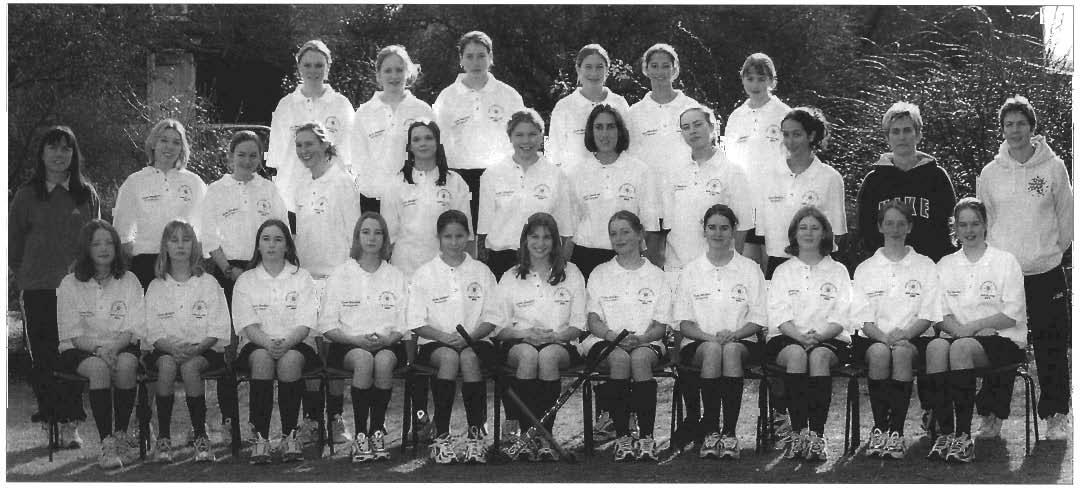
King's played Prince Henry's first and missed several chances to score. This was highly frustrating as we lost the match 1-0, the opposition scoring from a very dubious penalty corner.
The next match was Bromsgrove and King's lost their fight after Bromsgrove took an early three goal lead. In the second half Aimee Shaw got onc hack and we eventually lost 41. Thc final game was a~ainstThe Chase - last year's national finalists. For most of the first half King's kept pace with them and rnarked them out of'the garne, but once Chase scored the floodgates opened and King's went dow11 5-0. F.L.S.
though there was no doubt about our victory from the outset. Goals in a 5-2 victory were scored by J. Hallett (2), Alice Barnett-Roberts, 1,izzie Pearson and Katie Humpage.
The final match was against a depleted Chase High School side. To make it a competitive game, our girls played out of position for a large portion of the game. It was a good exercise for them to have a different role and helped attackers to concentrate more on their defending skills and vice versa. King'swon comfortably 2-0, with both goals being scored by 1,izxie Pearson.
Under 14 County Tournament

The Undcr 15 squad had a disappointing season in their interschool fixtures. They had a lot of their fixtures cancelled and were short of players due to injury. They should be congratulated on their persistency in training, ~shateverthe weather. Also a number of the squad trained with local clubs which improved their standard of performance tremendously. We also took an Under 15 squad to Spain on tour. They had a number of training sessions and a couple of games. They were a delight to be with and hopefully gained a lot from the tour.
J.D.C.
Seventeen girls trained on a regular basis at The University <:allege, Worcester astro-turf as our pitches remained out of action fi)r the cntirc season. They worked hard to improve their skills and tlcspitc only having three matches they went on to win the district round of the County Tournament and I-epresented Worcestershire South in the second round. Katie Humpage was selected for the County Under 15 Squad and played regularly for the team. All seventeen girls went on a successf~tlhockey tour to Barcelona, which was an absolute blessing as we finally got some decent hockey played.
The match against Pate's was the first game and it showed as the team wasvery rusty and despite having have most of the play in the first half they lost 1-0.Jo Hallett had several shots on goal but failed to score, Lauren Wood controlled the midfield and Lizzie Pearson made some excellent runs down the rightwing.
The squad played on an atrocious grass pitch against MGC and worked very hard to make the ball travel any distance in very long grass. The game was demanding in this sense even
King's had a gentle introduction into this tournament by playing Droitwich HS, winning co~nfortably2-0. The forwards enjoyed plenty of possession and the goal tally should have been greater. Jo Hallett and Emma Hayfield were the goal scorers.
The second game was much tougher. Our defence made some crucial clearances and eventually a long ball was played in to our attacking circle and Lizzie Pearson put it across the line on her reverse stick. Because some schools had dropped out, after playing only two games we were now in the semifinals. We were winners of our section and played the runnersup of the other Malvern section, Christopher Whitehead, on the new water-based astro at the Chase. It was a tentative first half but in the second Alice Barnett-Roberts eased our nerves and scored. Victory was sealed when she flicked another one into the goal at head height. Emma Hayfield worked hard in midfield with 1,auren b'ood, Jenny Tamblyn and Charlotte Moreland timing their tackles well.
As winners of this tournament we went on to play in the <:aunty Finals. King's started off very strongly against Nunnery Wood ancl kept the game in our attacking half. Despite many good chances we failed to score. Late on in the second half Nunnery had one free hit outside the circle and converted it into a goal. In a disappointing and frustrating start to the tournament we lost 1-0.
Our next game was against Prince Henry's and we had lots of possession and were generally much quicker to the ball and round the pitch. Emma Hayfield came off with a damaged forearm and this disrupted our flow. Prince Henry's scored and sealed our fate, as we no longer had a chance of winning the tournament.
In the final match we played MGC whom we had beaten the previous week. Again we wasted chances but in the second half
F.L.S.
they really put the pressure on our keeper and we went down 2-0. A disappointing end to what started offas a very promising bid for the tournament. It rained and it snowed and the parents shouted and cheered, but King's couldn't find their usual form.
Under XI

The team had an excellent season although they had to put up with some appalling conditions.
They only played four school fixtures, winning two, drawing one and losing one.
Their success came in two county tournaments. They reached the semi final of the County 7 a-side tournament where they lost to Bromsgrove, 3-0. In the County XI Tournament they went through to the final and played a 0-0 draw against MGC, so becoming the joint county champions.
J.D.C.
Under 12 XI
This is the shortest report I've ever had to write! Due to the flooding of our pitches from October to March the Under 12s only managed to play one game during the whole season. This was against Bishop's Hereford and the score was 0-0. This was a particular shame for this age group as they are a very talented group of girls.
Training on the astro-turf at Worcester University on Tuesday evenings was always a very wet occasion but this would not deter this young and enthusiastic group of girls. They would turn up week after week, with layer upon layer of clothing and still enjoy their hockey. It did not take long to realise that we had a lot of potential to work with and they all made tremendous progress during the season. It would seem what they lacked in height they made up for with sheer determination and skill, in particular Becky Busher, Rosie Pennell, Sophie Le Marchand and Helen Bellfield. Stephanie Doolittle also showed great promise as a goalkeeper.
T.D.M.
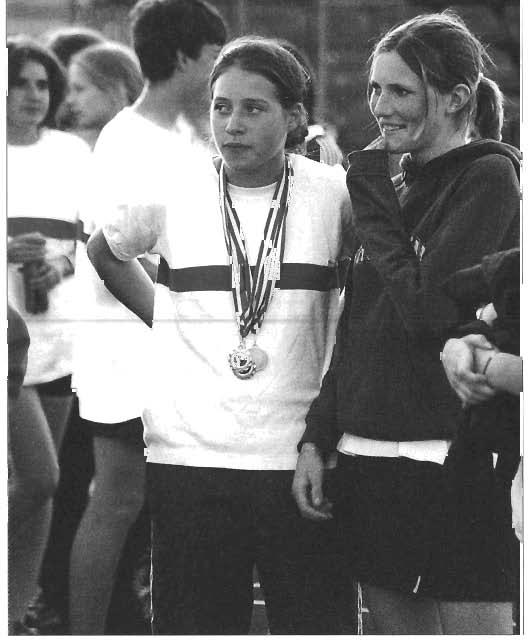

This has been an excellent year in terms of the strength of our netball teams across the year groups. For the first time ever, three teams were Worcester District Champions: Under 16, Under 14 and Under 13. Both Under 14 and Under 13 teams were county champions, and the Under 16s were runners up in their tournament, and both our Under 16 and Under 14 teams went on to represent Worcestershire at the West Midlands
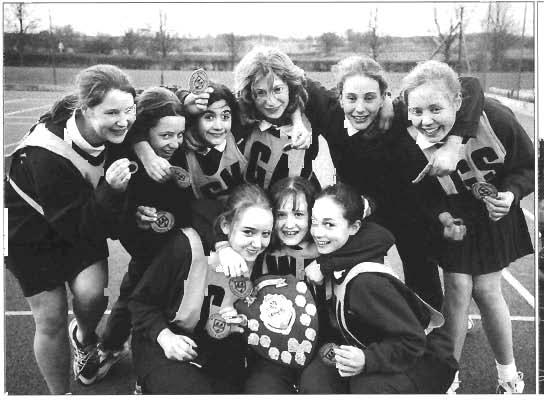
Regional Round. We have also been delighted to see our girls selected for County squads. King's has undoubtedly become a force to be reckoned with on the netball circuit in our area. I am delighted with the interest shown in netball throughout the school, with more and more girls training every week, and maintaining their levels of commitment to their sport right through to the Upper Sixth. There is a great deal to look forward to in the future, given the talent that is clearly evident in every year group. Thanks to all the staff and pupils who have given so much of their time and effort to develop this sport at King's, and bring it up to this high standard. Your hard work has bccn much appreciated.
N.R.A.
Both play and training were badly hampered by the weather and the floods, with our courts under water and then thick mud for many weeks. Even so, the girls thoroughly enjoyed their netball and the squad developed into a close-knit group which trained regularly and showed great commitment,
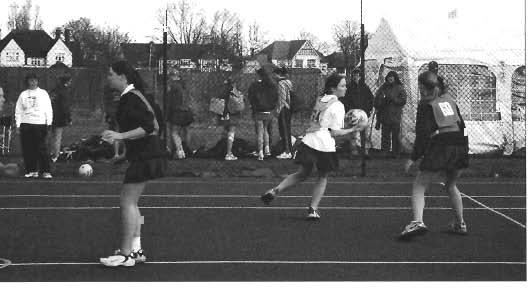


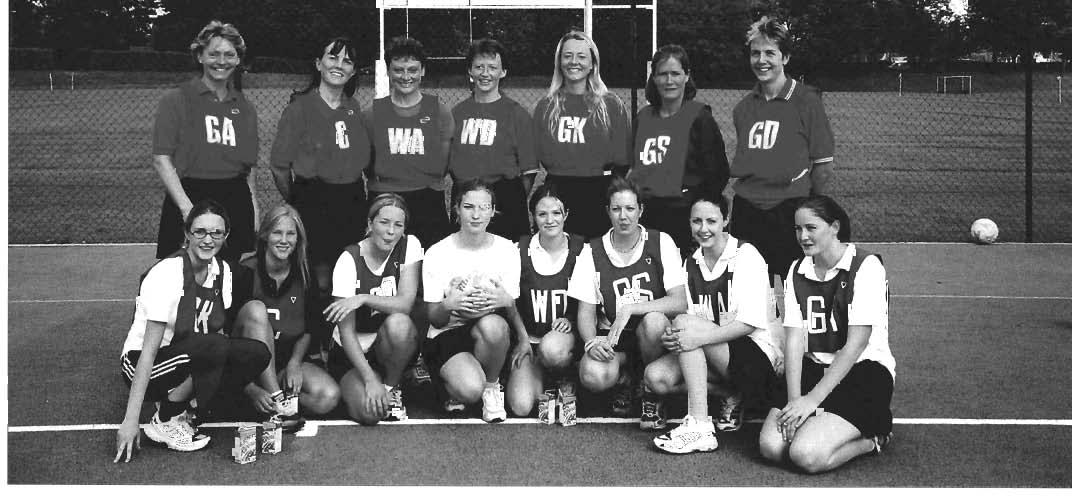
making tremendous improvement in skills and tactical play over the season. The girls were a delightful group to work with, always enthusiastic and ready to put maximum effort into their netball.
Celia Bryant was an excellent captain of the 1st VII, leading by example, combining a high standard of play with a lively and energetic attitude to the game. She had the ability to create unity from a group which was formed from three different year groups, UG, L6 arid 5th form, and managed to make every one feel an essential part of the squad.
The season began with the Theresa Page Under 18 Tournament which was followed by two tough matches, one against Pate's Grammar School, Cheltenham, which we lost 1522, and the other an 8-17 defeat against King Edward's VIth Form College, Stourbridge. Members of the squad were rotated on and off during these early matches to gain an insight into the strongest likely team, which then went on to play in the Under 18 County Tournament - the biggest event in the calendar. Here we were unlucky not to go through to the semi-finals, coming third in our section, but the play was excellent against tough opposition, and in torrential rain!
Matches also took place against Bromsgrove, Wrekin and Cheltenham College, but our closest match was a~ainst Malvern College, where King's frustratingly lost by just 2 goals after a Fast and hard fought game. The final inter-school match of the season was a satisfying win over Hereford Cathedral School, 20-1 1.
I was delighted to be able to host our first Old Vigornians Netball match against the 1st V11 at the end of June, which proved to be a tremendous success and a very happy morning. It was wonderful to re-kindle friendships with team players from previous years, and the school team were somewhat surprised by the high standard of netball they produced! The end result was a win by the 1st VIT of 7 goals to 6, to the school's great relief! I feel sure that OV matches will now become regular features in our calendar.
At the end of the season, full colours were awarded to Celia Rryant, Eleanor Joyce and Rebecca Hall. Half colours were awarded to Julia Guy, Sarah Roden and Keira Lapsley.
My thanks go to MML for her help in training the team.
N.R.A.
The Under 16 netball team had a successful start to the season with wins against Pate's Grammar, Bishop's Hereford and Bromsgrove. Their first tough encounter was against the Alice Ottley in the District Tournament. However for yet another season they retained their title as District Champions.
The next challenge was the County Tournament. In the early rounds King's beat the eventual winners St. A~~gustine's whom they then met in the final. With a lack of fitness and match practice we lost by 1 goal and had to settle for the runners-up position. It was a great disappointment to the team but a valiant effort.
In January they went to the Regional Championships in Walsall where they had wins over Windsor High, Idsall and Hereford but were outplayed by St. Joseph's College and the eventual National Champions, Fairfax School.
Congratulations go to Francis Gwilliam who played in the County Under 16 team throughout the season.
M.M.L.

The 'A' team had a difficult start to the season with Rebecca Gwilliam out of action due to injury. Both teams rallied round, changing positions and teams at the last minute. Both Kate Herriot and Aimee Bettridge stepped into the 'A' team whenever needed, always playing to a high standard.
Due to practices being well attended we were able to field an 'A' and 'B' team throughout the season
Harriet Priddey and Kate Herriot captained the teams, taking on the task with maturity and making my role a lot easier.
Although the season was mixed (A team won 2, lost 4, B team won 2, lost 2), the two teams played well and enjoyed their netball. Many of the players showed tremendous progress during the season. Clare Moseley went from strength to strength as the opposition got harder and all of the girls performed their best at all times and had great team spirit. Rebecca Gwilliam and Jess Atkinson were selected for the Under 15 County squad and played representative matches. This age group has a great deal of talent and I am sure we will see many of them in the senior squads next year.

v Christophrrr Whitehead: 5-5
This was an excellent result for the 'A' team at the beginning of the season with key players missing.
T.D.M.
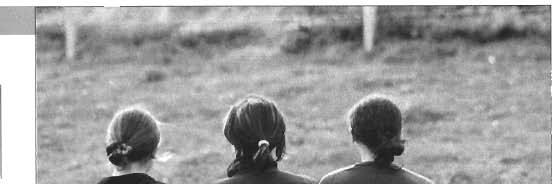

Played l0 Won 9 Drawn l Lost 0
The U14 netball team was very successful with a first-class record in their fixtures. They had early wins over the Alice Ottley, Pate's Grammar, Bishop's Hereford and a draw against St. Mary's Convent.
In the District Tournament they allowed themselves to become rattled and lost to St. Mary's Convent in the qualifying rounds, butwhen they met them again in the finals they showed with theirflairandvision thattheywereworthy Districtwinners.
With this new found self-belief they went through to the County Finals and with the rain teeming down, King's were obviously unnerved by the weather and had good wins against Haybridge, Prince Henry's, Malvern Girls and Bromsgrove School. Yet again they met St. Mary's in the County Final. The rain continued to make play very difficult for some but with a quiet confidence the King's girls took control of the game before half time and went on to win 9-6.
In January the Regional Championships took place in Walsall, where as expected the standard was much higher than our girls were used to playing. They had 3 wins, 1 draw and 3 losses, two of these matches finishing with King's just one goal behind. This was a hard lesson for a team which was capable of going further in this tournament.
They soon returned to winning ways to finish off the season, gaining victories over Malvern College and Hereford Cathedral School.
M.M.L.
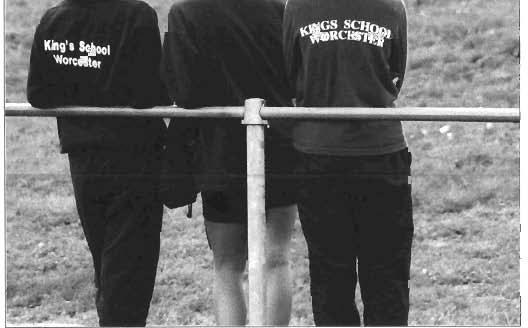
playing against teams from Bromsgrove, Wychavon, Redditch, Malvern and Wyre Forest. Even after a break from netball they soon regained their former strengths and beat all the opposing teams, ending up as Winners of the Year 8 tournament and being presented with the shield which was first won by the King's team the previous year. We were delighted to recapture the trophy!
The squad worked extremely well together, forming a strong bond and producing a high standard of netball. Opposition teams found it impossible to match the speed and strength of these girls in matches, and I shall look forward with great interest to their netball progress through the school. My thanks go to the parents who have given unfailing support and loyalty on the side line in all winds and weathers, and to the girls themselves who have been fantastic to work with - Emma Ash, Ella James, Freya Marskell, Harriet Davis, Sophie Hart, Emma Phillips, Jemima Williams, Anna Byrne and Rose Moule.
My thanks go to JC for her help in training the team.
N.R.A.
Under 13 A
The U13 A team had a tremendously successful unbeaten season: Bishop's Hereford Mary's Convent




At the Under 13 District Tournament they were the winners, beating every other school in Worcester, and then went on to represent Worcester in the County Tournament. Here they found tougher opposition, but kept their heads, maintained their strong order of passing up the court, and kept a high scoring rate, managing to win all the matches in their section. This put them into the semi-finals against Bromsgrove which they won 11-7, and in the final against Christopher Whitehead HS they had to work extremely hard to come away with another win of 11 goals to 7. It was a just reward for all their commitment and huge effort over the year that they became County Champions and were awarded precious County Badges for their netball skirts.
The final event of the year was in May when they represented Worcester again, this time in the Worcestershire Youth Games,

This was another highly successfi~lteam, as it completed the entire season of two terms without losing d match. The large goal difference in favour of King's emphasised the team's dominance.

v Bishop's Hereford

I was delighted with the progress made by these girls, who trained hard and were quick to pick up new skills. They were a highly competitive group, and over the year they learnt to work as a team, with pleasing results. Their spacing on court and the speed and accuracy of their passing were excellent. The squad of Alice Hershman, Sophie Le Marchand, Sammi Perry, Helen Bellfield, Zoe Rowe, ~Ee~hanieDoolittle, Sarah Cowburn and Heather Uren deserves much credit for its efforts, and I hope for continued success next year. They have been a delightful and rewarding group to work with.
My thanks go to SMB for her help in training the team.
N.R.A.
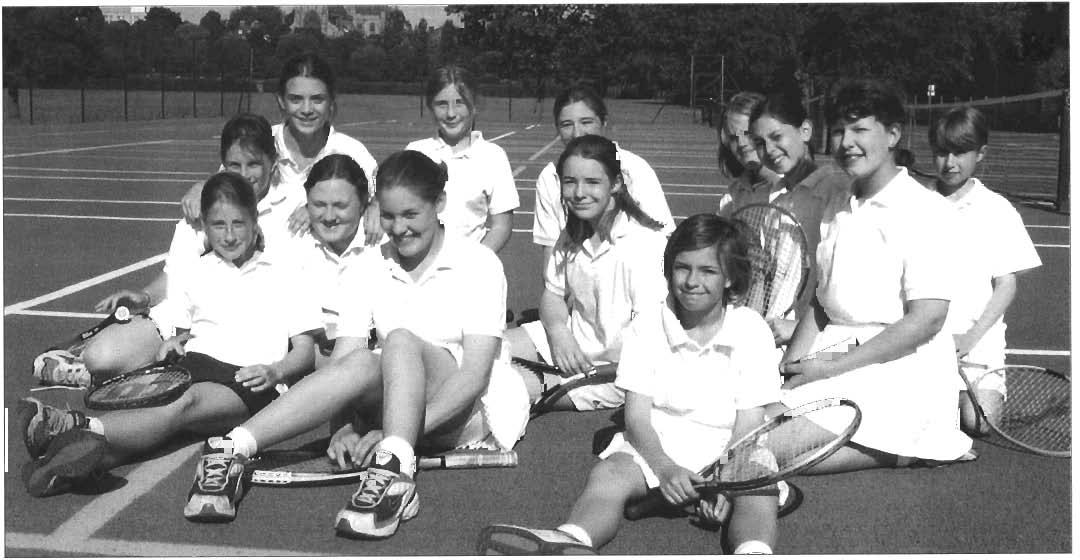
Under 18

Tennis fixtures for senior pupils took the form of a girls' team, a mixed team and for the first time this year a boys' team. It is always a short season due to the academic commitments of the pupils, so as much as possible was planned for the first half of term. A large nuniber of sixth form boys and girls opted to play tennis during their games afternoon. Some preferred to play purely recreational games, while others were keen to play competitive tennis against other schools.
The season began with an early mixed match against Malvern College. Luke Turner and Isla Robertson played as our first pair, winning 2 and losing 1 set. The second and third pairings bfhdrew Freeman and ~icoleLavelle and Oliver MTilliamson and Olivia Brown both won 1 and lost 2 sets, with the result that King's just lost the fixture 4 sets to 5. This was followed by our first senior boys' fixture, when I took six players to Warwick School. Excellent tennis was played, particularly by Andrew Freeman and Luke Turner, supported by Adam Knowles, Dan Turner, Jack Smith and James Cameron. The opposition was too strong for our boys but we had an enjoyable afternoon and should like to make this a regular feature of our fixture list in future. Our senior girls then played matches against Hereford Cathedral School, with the first IV losing 1 set to 3, and the second TV drawing 2 sets all. Sara Lewis, Kay Jones, Isla Robertson and Olivia Brown played as the first IV, and Nicole I,avelle, Emma Ordidge, Jen Tippett and Rachel Barclay represented King's as the second IV.
The season ended with two mixed matches, both of which King's won. We beat Alcester Grammar School 4 sets to 0 with the team only conceding two games in the whole match. We then beat Hereford Cathedral School 9 sets to 3. I was delighted to end on such a high note. I would like to thank all the players for their time and effort in tennis this year and also SMB for her support and assistance.
N.R.A.
Despite very poor weather conditions this was a most enjoyable and competitive event. Two groups of five played on a round robin basis with Sara Lewis and Andrew Freeman winn~ngtheir
group and meeting Steve Protherough and Kate Jones in the final. The final was very hard fought with some excellent rallies but the touch of Protherough proved decisive and he and Kate Jones won 6-3
L4 Singles Winner: C. Tamblyn - Runner up: C. Flothmann

Sing-les Winner: E. Phillips - Runner up: S Hart
Senior Girls Doubles Winners: J. Tamblyn and E. Hayfield
Senior Mixed Doubles Winners: S. Protherough and Kate Jones

This team competed in the HSBC League competition with King's entering two teams. The B Team had an outstanding season winning all three of their matches against Pershore, Stourport High and Haybridge High.
The 'A' Team of Jo Hallett, Becky Gwilliam, Harriet Priddey and Naomi Roberts played in a highly competitive league with opposition including several County players. However, they recorded victories against Hereford Cathedral School 4-2 and a memorable victory against Malvern Girls'College (with the match being played in the pouring rain!) 23-22 on games with the rubbers 3-3. Unfortunately the Alice Ottley were a little too strong and despite battling hard the team went down 6-0.
The final match of the season was against Bishop's Hereford. As several Under 15 players were unavailable for this match, Under 14 players Jenny Tamblyn, Emma Hayfield, Sara Neville and Alice barnett-~obertsrepresented the team and recorded a superb 6-0 victory.
S.B.

Unfortunately poor weather conditions resulted in only two matches being played. The first fixture for this team was against the Alice Ottley who proved very strong! Despite some close matches we eventually lost 7 rubbers to 2. The
match against Cheltenham College was much closer, with lengthy baseline rallies but eventually Cheltenham won 5 rubbers to 4.
Under 14 players dominated the Senior Girls Doubles tournament. A round robin tournament culminated in Jenny Tamblyn and Emma Hayfield beating Jo Hallett and Katie Humpage 65 in a desperately close-fought final.
Jo Hallett was the outstanding player in the Under 14 team. Jo and partner Jennie Tamblyn finished third in the County Schools Doubles Tournament. Jo also represented the County at Under 14 level in an inter-County Tournament, winning all three matches. The highlight of her summer however was becoming Under 14 county mixed doubles Champion with partner Michael Bailey from Hereford.
S.B.
King's stormed to victory against the Alice Ottley with a score of 38.5 to 16. Jenny Tamblyn and Sara Neville were the big hitters in this game.
Winning form was duly retained against Alcester Grammar. Superior batting skills won the game, as both teams were equal in the field. The final score was 25.5 to 18.
On a Thursday evening in dubious weather conditions, we set off to play Malvern College. On arrival the heavens opened. The girls struggled on for one innings before the match was abandoned. Sadly, we had not sorted out our fielding; it was decidedly sloppy and we lost 11.5 - 4.5.

13
The girls trained hard throughout the summer season with a group of at least ten training every session.
The team was entered into the Midland Bank Friendly League and had to play five matches in its section. This team consisted of Beth Ghalamakari, Sophie Hart, Emma Phillips and Freya Marskell, with Helen Smith standing in on a regular basis. Out of the five matches they won three by six sets to nil. They drew their match against Pershore HS but won on game difference. The fifth match was left uncompleted due to bad weather, but the team still came top of the league. The season was rounded off with a singles competition which was won by Emma Phillips, Freya Marskell winning the Plate.
J.D.C.
The under twelve players were most enthusiastic with many attending training on a Friday night. Several also took the opportunity to improve their skills by attending Saturday morning coaching. Unfortunately, only one match was played, the others being cancelled due to rain. This was against Dean Close and was drawn with the first pair of Clare Tamblyn and Alice Hershman unbeaten. Twelve girls entered the Lower Fourth singles tournament and played in a round robin competition. The eventual winner was Claire Tamblyn who beat Charlotte Flothmann 61 in the final.
S.B.
The final match was to be against Pate's Grammar but this was cancelled. Instead, a selection of girls played in a f~~n match against their mothers. It was an extremely competitive match. Mrs. Hallett was a demon bowler, and she, Mrs. Pearson and Mrs. Sutherland knotched up several rounders and Mrs. Humpage never missed a catch on second post. Despite, a decent lead at the half way stage, the parents were narrowly beaten as the girls fought back strongly to win 24.5 to 22 rounders.
F.L.S.
Rounders proved to be a very popular game with the Upper Fourths and there was consistent attendance despite other sporting commitments. The team's strength was in its quality of throwing, catching and working together when fielding against strong opposition. Bet11 Ghalamakari averaged five catches a match. The girls' batting skills progressed well with match experience. The highest number of rounders scored in any one game was ten by Emma Phillips. Despite both the A and B team losing their first two matches against Hereford Cathedral School and The Alice Ottley, the teams thrived during the remaining fixtures, with the A team beating Alcester GS, Dean Close and The Chase HS, and the B team overcoming Dean Close and The Chase.
This squad enjoyed a tremendous season. All those girls who attended practice were able to get in one of the teams for a match. It was great to see so many at the practices enjoying the game and every single one of them made a great deal of progress during the season.

The 'A' team were unbeaten throughout the season, enjoying victories against Hereford Cathedral 15-9, Alice Ottley 23-21 and Dean Close 23.5-14.5.
The 'A 'and 'B' teams both had great wins over the Chase High School, Malvern, 43-8 and 242.

Twelve girls trained regularly at the start of the season before they left on exam leave. They had time to play two matches. They lost to Hereford Cathedral School but their team was depleted due to athletics fixtures. The match against the Alice Ottley was most exciting and came down to the last ball. Emily Freeman had to score a rounder to draw the match. Despite hitting the ball well she was narrowly beaten to fourth post. Thank you to the girls who played and to Katherine Harrison who captained the side.
F.L.S.

14
A squad of fifteen girls trained regularly and displayed good all-round playing ability. We were even blessed with four good bowlers. The first match was against Hereford Cathedral School and it was very close. Both sides had some big hitters but King's lost very narrowly 16.5 to 17 rounders.
Both teams performed well in all matches showing good batting and fielding skills and good communication between players. Outstanding performances were made by Stephanie Doolittle on third post for the A team. She fielded efficiently, taking good catches and stumping out, often getting two players out on one ball. Zoe Rowe and Philippa Kent-Davis were superb at 2nd and 4th, stopping half and full rounders with efficient fielding. Rosie Pennell was totally reliable as a deep fielder and rarely let anything past her. Tara Owen must take on the award for the most improved player of the season, going from strength to strength with her fielding skills and attaining the skill of hitting a rounders ball on the back hand, something very few can achieve, finding the weak link in many opponents' fielding. Samantha Caulfield, Portia Davies and Claire Tamblyn had to fight for the position of bowler. All three were capable players with different bowling actions and this made selection often quite difficult.
T.D.M.
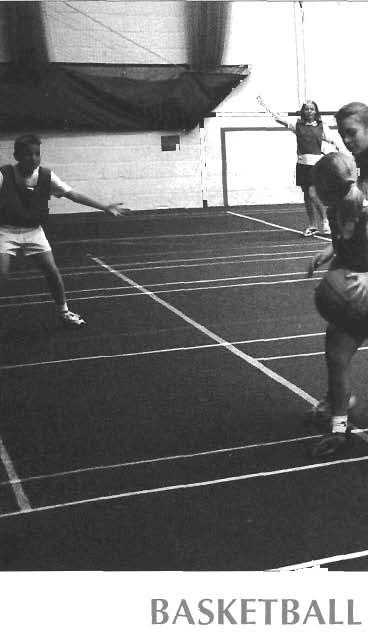
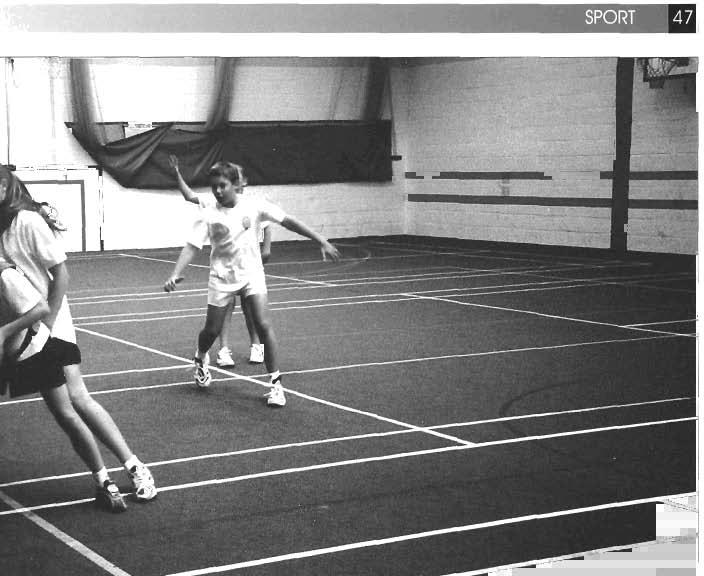

The school has been actively involved in the Worcester Schools knockout competitio~iagain over the last year, with all ages from Under 13 to Under 16 involved. The Under 15 side was unlucky to come up against the eventual winners, Droitwich, in the very first ro~llld.Tom Pickrell led the side, with valuable contributions from Peter Winstanley, James Davis, Tom Hand, Sam Clullen, Guy and Simon Potter and William Woodhouse.
The Under 16 side managed to progress by beating Christopher Whitehead school, only to lose a close match to Pershore High School. Led by Neil Lonergan, the side's main players were ham Saied, Peter Winstanley, Tom Pickrell and .Joe Timson.
The Under 13 and Under 14 sides both showed promise with some outstanding performances. James Ranson helped the 13s to a good win over The Chase School, with support from Jonathan Cairns-Terry, Hywel Rees, William Herriot and Leanne Sheen, the only girl to represent the school this year.
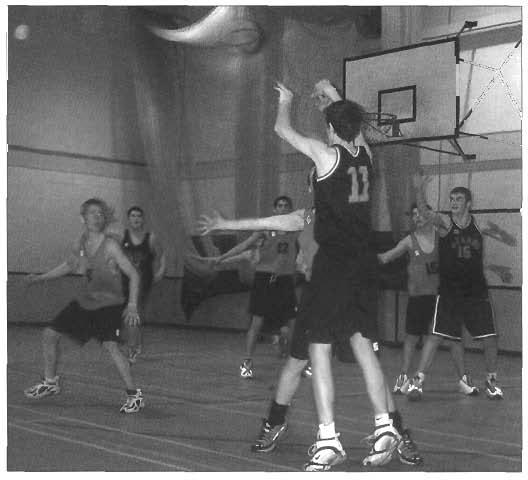

For the 14s, Rory Biddulph, and James Kees Phillips were the main contributors.
The highlight of the yearwas the game between the Under 18 side and the Staff and OV team. In a very close match, the staff were on the receiving end for most of the time. PaulVolo,James Byrne, Neil Lonergan, Azam Saied and Chris Candlish were the backbone of the boys' side, whilst for the staff the skills ofJLO, PTC, PSBand OSwere supplemented by adebutfromJTWwho acquitted himself well. When OVs Julian Menzies and Sam Malinsfound their range the tide started to turn in the favour of the staffside. They took the lead with 5 minutes togo, and never looked like letting it slip as they ran out 75-69 winners. This win makes 2 out of the last 3 for the impressive staff side, though the Under 18side will be confident of awin next time, as theywill be at their strongestfor many years.
Muff Murfin continues to give generously of his time. He rarely misses a Saturday practice session and is always encouraging and supportive. All those involved in King's School basketball are grateful for his support without which the sport would be unable to continue to flourish.
R.P.G.

This has been another good year with judo continuing to grow in both standard and numbers. Much of the growth has been achieved by the strength of judo in St. Alban's and then the knock-on effect that this has had in the senior school. The school coach, Eddie Awford, also brings people from outside school, so the range of fighting and skills have increased. Four people have moved up to school Blue Belt, Lucy Horn, Nadirle I'reedy, Ben Humphrey and William Westwood. With Andrew Hawkes concentrating on his rugby, Dan Kimberley is the highest ranking belt in the school, and is currently attempting to get a national grade.
Many thanks to Eddie for his continued efforts and we look forward to judo continuing to progress at King's.
Nadine Preedy
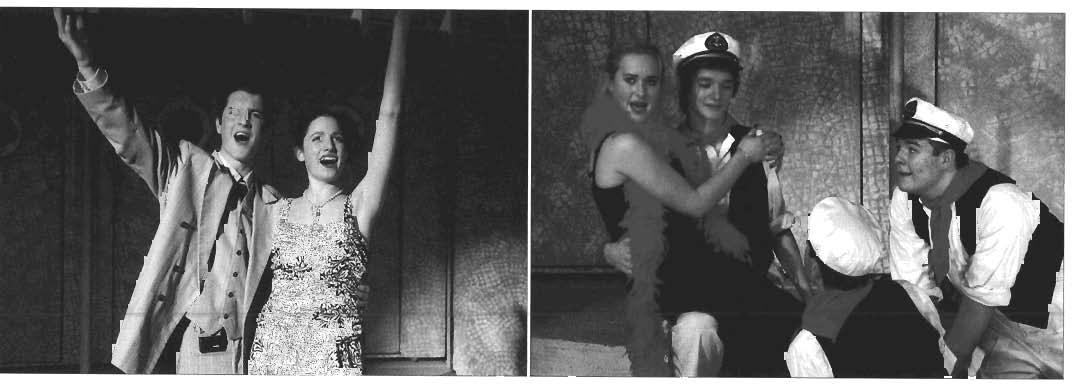

Inatural comic flair as the gangster Moonface Martin (Public Enemy Number Thirteen). This was a superb performance and one that seemed to make the most of all the comic opportunities on offer. Jeremy Davey was also hilarious as
SfJcq i%., American m~llionalre Elisha Whitney who timed his comlc
r A case of all hall& on deck 111 this highly entertaining perfection and with straight-faced comedy presented by a large talented cast of 1,orna Prltchard clearly relished her role as the sexy Erma and Fifth and sixth formers last Christmas. with some fabulous gave a fantastic ienditlon of her big number Buddz~Re?.oare classic songs from the musical genius of Cole Porter, and some (surrounded by admiring sal10rs, it was perhaps the sort Of wonderfully 7any comedy in a show number where Morecambe and Wlse might have based on an original script by once made an unexpected appearance!) Whilst P.G. Wodehouse, the scene was certainly we're on the subject of the sailors, I must set right from the start for a highly congratulate David Newsholme (Captain), Ohver enjoyable evening and fing's audiences Smith (Purser) and Rob Melville, Rlchard were not disappointed. The show was a Huzzey, Sam Bayliss and Mlke Parks as the sailors triumphant success, clearly enjoyed to the for their very funny performance of There'll full by the performers on stage as much as Always be a Lady I;azr- another memorable item, by those watching. The stage was slmply with great choreography from TDM. Richard burstmg with crazy characters, funny one- Huzzey was a delight to watch all evening, liners and red-hot musical numbers such evidence once agaln that vou don't need to Blow Gahel Blow, sung for all its worth have a leading role in order to make an impact Gemma Martyn Smith as night club singer so long as you put your all into whatevcr you Reno Sweeney. I saw the show on the last have to do. Congratulauons too to everyone night by which time Gemma's voice was else in the cast. Thls really was a great team suffering severely, to such an extent that effort. Everyone put tremendous energy, enSLeM made an unscheduled appearance thusiasm and commitment into this (any excuse to get 111 on the act!) in order production and played a part ~n making it explaln that other cast members mlght have S. This was another example of the very high to sing her songs, No one need have worried, however, as that are achieved now In Gemma's vocal chords recovered sufficiently to belt out those P~~~~'~~~~~~ at numbers one more tlme. Here was a role that really demanded Congratulatlons must *ls0 go Of to SLeM and BG for star quality, and boy we got in abundance! Gemma has real their palnstaking and dedicated work as directors of the show, charisma on stage whether singing, actlng or dancing, and her to TDM for her choreography (great fun as and to DEB 0- particular performance style seemed perfectly suited to a for another greatjob as David Thurlb~Overbrash American role such as this. saw many aspects of this production, and managed to find an


The show features some very famous Porter excellent two-tier set that served the needs of the production including I Get a Ktck Out of You, You+e the Top, Easy to Love, The doors entrances and exits to Fnendshzp, It's De-Lovely, The Gypsy zn Me, and of course, Anythzng be made at 'peed, an imp0rtant factor in farcical Goes. Set aboard the crulse liner SS American in the 1930s, the comedy. done to everyor1e who worked so hard behind story centres on the efforts of stowaway ill^ crocker (an the scenes, particularly Seb Belcher and Bill Brigden 011 lights excellent performance from Chris Husband) to scupper the and wedding plans of Lord Evelyn Oakleigh (Adam Swinburn The show played to packed houses On three nights. having fun as a delightfully silly peer) and heiress Hope Har- Thank you to everyone for glvlng us a great and court (another excellent performance from Helena Culllney), for your audiences home happy and whlstling whom he hopes to marry. One of the highlights of the show for As far as King's productions go, me was the performance of Adam Knowles who revealed a was 'the top'! S.M.A.
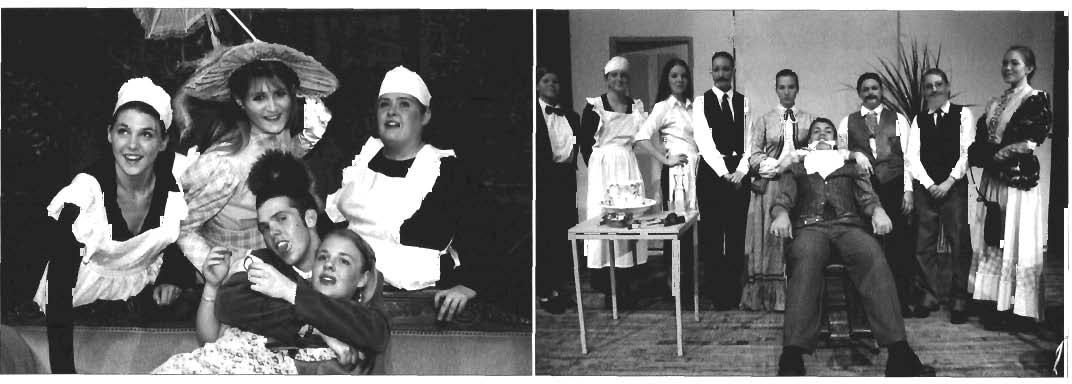

prrformed by thr Sixth Form Thratre Studies students
Two French farces seemed an odd choice for an English school to perform in America, until I spotted that the school in Worcester, Massachusetts, is the Notre Dame Academy. What they will make of the translation I have no idea: the first play, called by its author 'Hortense a dit: 'Je m'en fous!' appeared as 'Tooth and Consequences', and the second metamorphosed from 'Amour et Piano' to 'The Music Lovers', which turned out to owe nothing to Ken Russell.
'Tooth and Consequences' (performed by the Lower Sixth group) takes place in a dentist's surgery in 1915 when there were no injections. Apart from the predictable screams of drilled patie~~ts,var-ious more psychologically painfi~ldramas spill over from other parts of the house into this room. The maid Hortense has used the expression 'No skin off my ass' (which sounds American, but is the translation of 'Je m'en fous') in front of the dentist's wife, who wants the maid fired, but the dentist is loath to fire her and does at least want to see her off kindly with a pay rise. So we see a dentist-cumhusband-cum-employer under considerable stress, first from a patient (Oliver Brooks) who moans continuously in a northern accent with none of the sang froid to which the French have given the name and which a real northern Englishman would have exhibited; Oliver seemed to relish the part, in fact to enjoy the wails of anguish he had to ernit, giving no clue that he was in fact a late replacement for the original actor. The poor dentist then had to suffer his rather nasty wife, played with runrernitting crossness by Keira Lapsley; she was a domineering, unreasonable wife of the typc we are f'amiliar with horn countless plays and TV shows (and no doubt from real life, though I wouldn't know). The maid Hortense, played by Nicole Ladle, was also a problem for the dentist, being entirely reasonable and hard done by, also rather seductive, though not overtly eno~tghto justify his wife's suspicions; it was hard f'or the sexual frisson to work as well as the author undoubtedly intended since the dentist was played by a girl, Lisa Guilding (another late replacement), but it was made clear when the wife made a bitchy comment about the dentist and his maid having bedrooms close to each other. At that point it turns out that the butler, a rather curt gentleman played with butlerian authority by Carys Williams, is engaged to Hortense, and he demands that the dentist meet him in a duel of honour in return for the latter's wife's insulting his fiance's chastity. While all this is going on, the dentist has to deal with two more patients, the oddly named Madame Bizarre, who is the
most normal character in the play, acted with regal aplomb by Hannah Simpkins, and the actually bizarre Leboucq (Jen Tippett), who is so worried by the thought of dental treatment that she goes mad on stage and faints: these two characters seem only marginally related to any of the plots of the play, but the performances by Hannah and Jen were respectively so poised and outrageous, and so obviously enjoyed by the actresses, that the audience couldn't help enjoying them too. In an odd twist the dentist then decides to sack his cook Yvette, played with appropriate haplessness by I,anra Willis, for the same offence that Hortense had committed carlier. Every now and then the dentist's partner, Monsieur Jean (Jade Wallis), came on to the stage and suggested with great vervc and precision how our dentist might deal with his professional or personal challenges. It was not always entirely clear how the various scenes fitted together, and some or' the characters, including the wife, seemed to have only one dimension; I'm not sure Feydeau was on top form that day. But the actors played their individual scenes with such gusto that we could enjoy the play on that level at least. The dentist himself - Follbraguet, to give him his personal name - was played at short notice by Lisa Guilding, and it was some feat to be on stage throughout, keeping the whole thing together, maintaining the hen-pecked but basically decent character whatever mayhem was going around him, and evoking a good deal of sympathy from the audience. It was quite a tour de force!
'The Music Lovers' (the Upper Sixth offering) is a much better constructed play. Two maids, Baptiste (Kate Ganderton) and Gabrielle (Becky Fitzpatrick), conspire to divert a suitor from his actual mission, which is to win the affcctions of a derni-monde actress, to another flat, in which Lucile is waiting for a music teacher who has been employed by her mother to improve her piano-playing. The maids do this vital task - vital if the audience is to understand the later goings-on -with great clarity, Baptiste's down-to-earth straightforwardness contrasting with Gabrielle's suaveness. So the sophisticated man-about-town, Edouard, tries to flirt with the innocent and bemused I,ucile, he imagining that she is a worldly actress, she imagining that he is a music-teacher. Inevitably there is ample opportunity for ambiguities and doubles entendres, which Feydeau exploits wittily and which the two main actors managed with wonderful professionalism. Jeremy Davey was delightfully OTT with his attempts to seduce and his bewilderment at the girl's strange demands (to 'beat' while she plays the piano); Kate Jones, by contrast, was by no means exaggerated in her innocence, but played with restrained poise as a perfect foil to the man's exuberance. Both performances were outstanding, worth the ticket money on their own! The play has a proper denol~cment,too, when Lucile's mother
returns and the two protagonists realise the misapprehension under which they have been labouring. Marie-Louise Rosser played the 'madame' with suitably fierce motherhood, and the play ends with Edouard and Lucile embracing - what else? A thoroughly satisfying performance of a neat little play.
R.N.G.S.
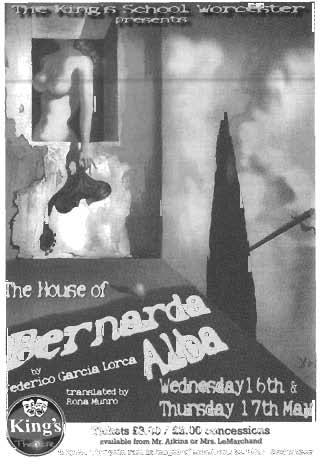
There were two performances in May by the AS Level Drama and Theatre Studies students of Lorca's play, 'The House of Bernarda Alba'. The second performance was attended by an external examiner, and all members of the cast were awarded a mark for their work which contributed to their final AS grade.
For much of its inspiration, the production drew on the paintings of Salvador Dali, a contemporary and an acquaintance of Lorca. The work of both artists displays images of repressed sexuality.
The sense of imprisonment and power in 'The House of Bernarda Alba' was realised superbly in Jo Cook's design. The use of leaning, distorted 'walls' suggested the suppression of natural sexual feelings. High, narrow, barred windows and a deliberately confined acting space contributed to the suffocating atmosphere. Religious symbols and the crumbling texture of the white walls created a strong sense of place.
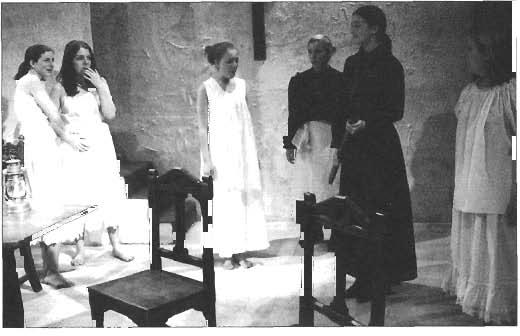
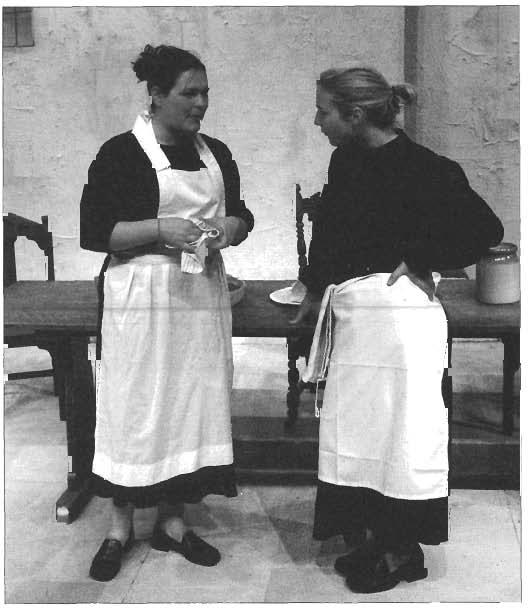
were symbolic and bold. Black, white, red and green dominated through the use of costume and some stunning lighting and storm effects by David Thurlby, creating dramatic resonance from their associations with death, innocence and virginity, passion and jealousy. The costumes, though not suggesting a specific period, contributed to the audience's awareness of the girls' youth and desire for freedom and their mother's inclination towards restriction. The Grandmother's costume was particularly significant here, the wildness suggesting the extreme results of repression and her mental suffering. Carys Williams played this difficult part well.
Lorca's plea for 'realism, pure realism' was answered in the use of simple props and wooden furniture and in music reflecting the 'life of women in the villages of Spain'. But there is also powerful poetry in the language and in the emotions of the play, and the aim of this production was to use the dramatic combination of the symbolic and the realistic, the personal and the universal.
The cast, under the direction of SHLeM and SMA, performed very well. There was a precision and clarity in the stage pictures, and the lines were delivered with a clear sense of their dramatic significance. Keira Lapsley, who played Poncia, the maid who knew everything that was going on in the household, was particularly convincing, and Jenni Houghton made a string Bernarda, even if she perhaps didn't quite suggest the full extent of Bernarda's cruel intensity. The girls who played the daughters, over whom Bernarda presides with her stick, were a strong ensemble, but within the group effort there was some lovely individual characterisation. Hannah Simpkins also did well to play three different cameos.
I found the production gripping. It was a real pleasure to see in our theatre some serious drama delivered with conviction. Visually it was sumptuous, and the issues dealt with in the play were challenging and provocative. There were a number of young pupils in the audience on the night that I went. That they, too, were enthralled by this difficult, wordy play seems to me to be an eloquent comment on the quality of the ~roduction.

This Fourth Form production provided audiences with sizzling entertainment. Much of Guys and Dolls' success was down to the slick delivery of lines, vivid facial expressions, technical virtuosity, professional sound tracks of backing music and swift scene changes amid a backdrop of glamorous, eye-catching costumes, sets and lively choreography. Directors (SLeM and SES) , choreographer (TDM) and technical wizard David Thurlby must be congratulated for their dedication and hard work in knocking this production into shape.
The comic and vocal talents of Anna Byrne (Miss Adelaide), James Pole (Nathan Detroit), Heather Uren (Sarah Brown), John Porter (Sky Masterson) and Joseph Roberts (NicelyNicely Johnson) were a real treat. The Mission Band doesn't get much of a following in New York, but bring on the Hot Box Girls doing a tango with a Cuban backdrop and you almost have the theatre audience on its feet wanting to join in. The songs were superb and surprisingly varied. Hits such as Lurk Re A Lady Tonight, Sit Down You 're Rocking The Boat and Marry The Man 7bday made a huge impression even after such a ridiculously short space of rehearsal time with all the other things like examinations that get in the way at this time of the year.
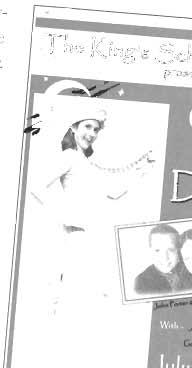
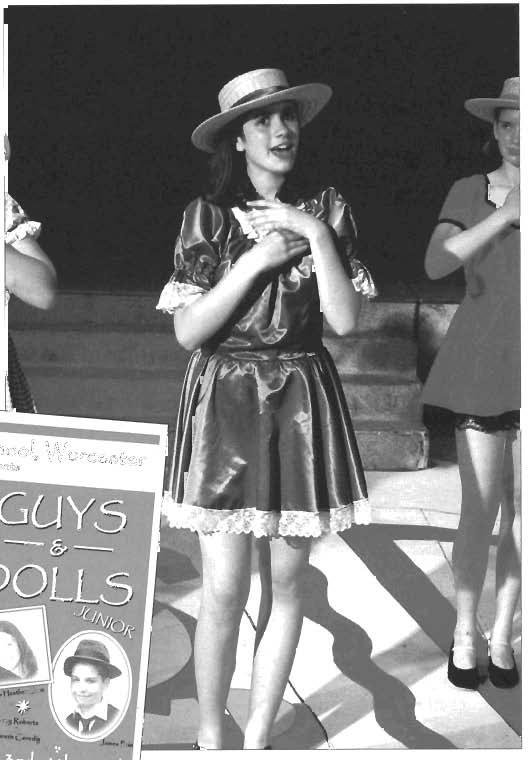
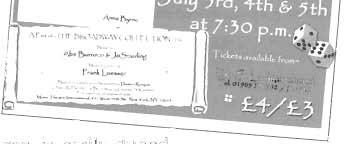
The real fun starts when the Salvation Army Mission is used as a place to play a big Crap game. Big coughing and sneezing. Jule is not amused that a site has not
It was a pleasure to sit and watch such a been found already; Lieutenant Brannigan is easily duped lively performance and see all the particiinto believing that all the players are going as sinners to the Pants having such fun. As I heard someone On Mission for salvation; and out of this shocking situation comes the Out, 'What would life be like a and a love, happiness and a realisation of the error of their ways dance?' So we say thank You for the music by the gambling Guys and leggy Dolls. A classy romance and a entertainment. unfolds between the lawless Sky and the righteous Sarah, and the unresolved wedding plans between Nathan and Miss
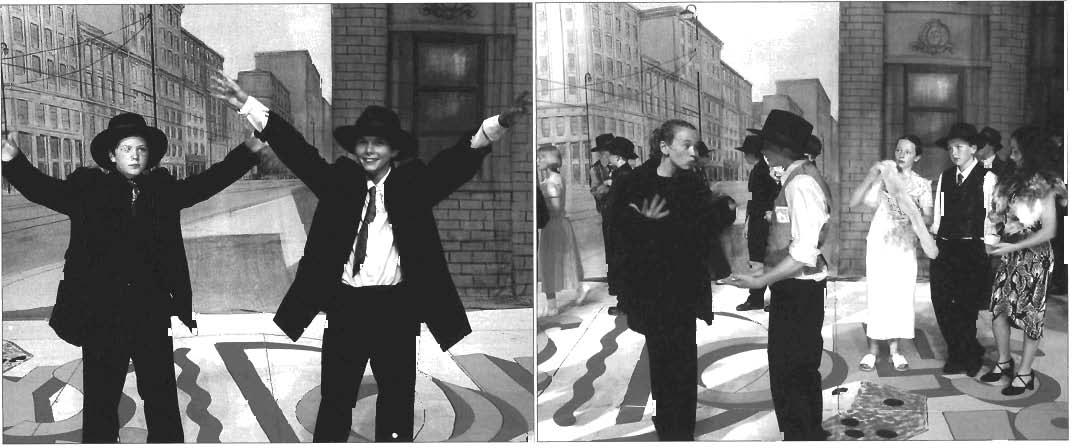

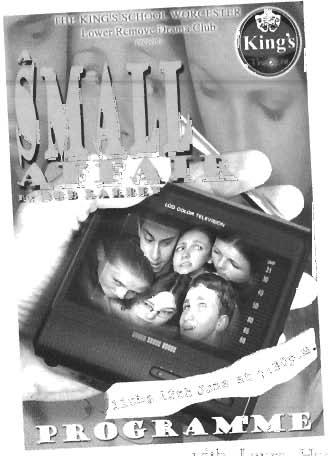
The Lower Remove Drama Club presented Bob Larbey's 'A Small Affair' on two evenings in June. Members of the audiences who, in their ignorance, had not heard of Mr. Larbey had an unexpected treat, while those who knew his work had, presumably, an expected treat. 'A Small Affair' is a short play but it is packed with humour and chances for the different personalities of the cast to be shown off to their best advantage. The casting is crucial and SMA, who directed, showed an uncanny knowledge of the Club's members in choosing for each role a player whose own strengths could be used so well. This applied not only to the major-roles, with Guy Corbett outstanding as a harassed television producer trying to rehearse in conditions of anarchy, and with Holly Meredith overplaying marvellously as a vamp, adept at upsetting other characters but revealed finally as having a heart of gold. The middle-order players were ,just as good, \\it11 Laurd Hughes delivering the dampest lines in the most deliciously damp manner, with Alex Hancock as the producer's assistant who is the only character with the slightest idea how to get things done but is constantly frustrated by the incompetence and chaos around her, and with Mike Rugen triumphing in one of the hardest things an actor can be asked to do - to portray drunkenness while sober (as I am sure he was). The players of the smaller roles entered just as well into the spirit of the piece and confirmed SMA's skill in casting: in particular, the trio of vague old women (Rebecca Somers, Mikila Sutch and Rebecca Pitts) clearly owed much to memories of the brilliance of Joan Hickson and her acolytes in Clockwise, but managed at the same time to show three distinct personalities; and Giles Fogwill as a figure of rather austere authority took command impressively in his one scene. All these deserve praise, and so also do those I have not mentioned by name, both on the stage and off it: the Lower Remove Drama Club is to be congratulated in providing notonly the actors but also important backstage personnel. They all provided their audiences with much pleasure and entertainment.
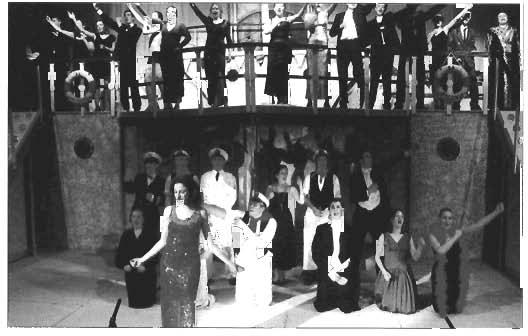
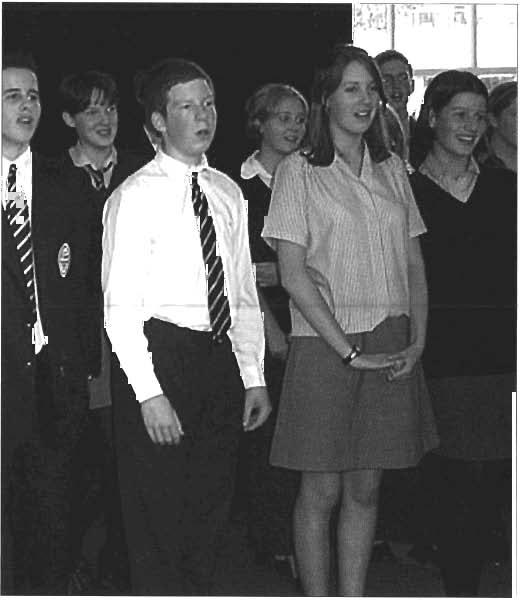

In spite of the often intense rivalry that exists between The King's School and our neighbours at the far end of the Tything it was a great pleasure to welcome Andrew Wilson, the lively new Director of Music at RGS Worcester, to adjudicate the House Music Competition on October 16th. The standard of performances, both in the Solos and the Unison Songs, was as high as ever with an increasingly familiar tussle between the Uren twins for first place in the Senior Solo Competition. On this occasion it was Alan's turn to win with a commanding performance of the Finale of Bruch's G minor Violin Concerto, closely followed by Adrian playing part of Gordon Jacob's Horn Concerto. Both twins are to be congratulated not only for their many fine performances during the year, but also for climbing higher in the ranks of the N.Y.O. and achieving regional success in the BBC Young Musician of the Year elimination rounds (at the time of writing we wait to see if Man is successful in proceeding to the next level). In third place was David Newsholme, whose bass voice, heard to fine advantage in Bach's Mighty Lord, from the Christmas Oratorio, shows tremendous promise for the future. In the Junior Solo Section first place was awarded to Christopher Mullender, playing the L,prelude from Bach's Cello Suite in-G major. Sadly Christopher was with us all too short a time, leaving for a new school just six months later. In second and third places were Andrew Furniss (organ) and Chris Fulton (violin). In the Unison Song Creighton were the winners with Andrew Lloyd Webber' Light at the End of the Tunnel, followed by Choir and Wulstan in second and third places.
Normally we would have expected the Winners' Concert to follow later in the week, but it had to be postponed until after half-term, because of the unavailability of College Hall. This was to be its undoing, for floods worse than any in recent decades almost brought the school to a standstill in the weeks following the holiday, with St. John's separated from the city centre by a flooded New Road and certainly no hope of holding evening events where people might be stranded at the school. Also lost to the floods was the first Young Performers'
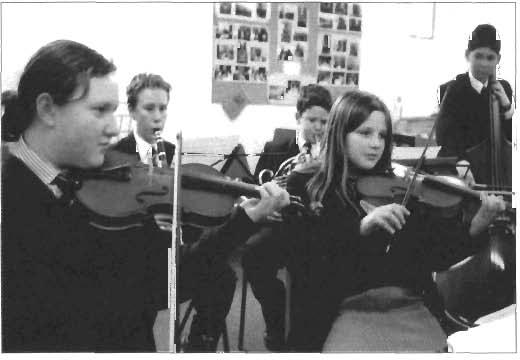
Concert. On the other hand the music staff was rewarded with some of the most spectacular of flood views from their studies in School House!
All was not lost, however, because we were very glad to put some winning solo items from the Music Competition into the November &hool Concert, itself badly affected by missed rehearsals during the flooding. In spite of this the Second Orchestra was able to perform <:oi~perin'sLes Moi~sonnrursand Mendelssohn's War Mmi-17, qJ thw Pric..rls, First Orchestra two of Dvorak's Slavonic Dances, the Wind Band Mancini's Pink P(~nthmand Var~ghanWilliams' Suountepn C;ome Sunday, and the School Choir a medley of choral items including arrangements of 'M/;/{crt(I W'oncl~fitlWorld and Shenccndoah, Lloyd Wehber's Mca.i~r/y,Ihr mystny cat and .John Rutter's When thp S(lzn1s go Mnrcl~ingin.
While the Music Department was thinking of early Spring sun in Torremolinos for their next term's concert tollr to Andalucia, the choir of Brighton School, Adelaide was becoming increasingly concerned at the thought of exchanging Australian summer sun for torrential English rain. King's School was one oPa number of schools that had volrunteered to host Neville Hannaford and his superb school choir for thcir 2000 Er~ropeanTour, which includes visits to Rome, London, Paris, Norwich and Harrogate. Having reass~rl-edthe Australians that flooding would be long gone by their arrival in December, it was a bit disconcerting to witness its reappearance once they had arrived. Fortunately their concert was able to take place, though it was disappointing to offer them such a small audience for their virtuoso, well-drilled Chapter House concert, s1111g entirely fron~memory. I continue to be enormously grateful to those King's School parents who so generously hosted and transported our guests, who I hope will return to the King's School when they make their next tour in several years' time.
Many of the school's musicians were to be involved shortly after this in the production of the musical, Anything Goes, which is reviewed elsewhere in the magazine. The School Carol Service was held in the cathedral on Tuesday 12th December; the School Choir sang Vaughan Williams' arrangement of 77v 7i-uLh ,from Abovr, Rutter's King Jesus hatlz n Garden, Willcocks' llin,g, Don& Mmrilv on High, and William Mathias's A Bnhp is Born,, the Keys' Choir sang Ribo's arrangement of the Catalan carol, The Song of the Birds and the Cathedral Choristers delighted us with Simon Lindley's Avp Mnrin.
The beginning of the Spring Term was taken up with preparations for the half-term Andal~rcianconcert tour. Once again we were to be grateful to the well attended, Npower sponsored Huntingdon Hall Lunchtime Concerts for the opportunity to give some of our tour reper-toire a first airing. As in previous tours we were to be taking a multi-purpose choral and orchestral group of fifty pupils and five staff, whose
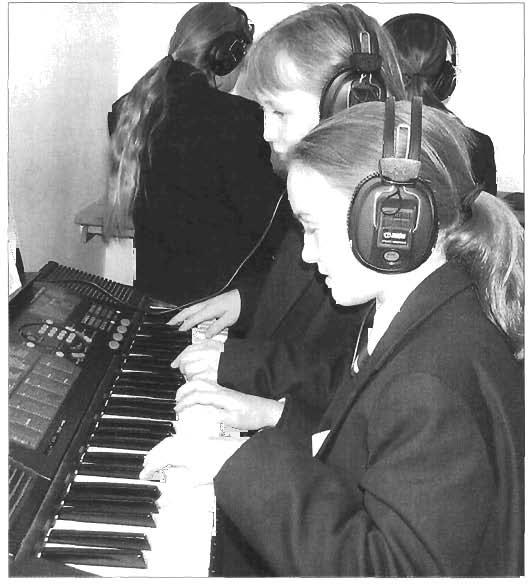
repertoire was to include Mozart's 29th Symphony (1st Movt.), Palcstrina's Missa 7i1 ps Petrus, Vivaldi's Winter from the hur Sec~so17~.with the solo violin part superbly played by Alan Uren, wind quintet pieces by Danzi and Gershwin Mozart's Missn Brt?~is in 1) major, K. 104, Monteverdi's Weatus Vir, Richard Marlow's setting of the Advent Responsary, Gibbons' Hosccnnc~ to tlz~Sor~ of Ilavid, Bruckner's Christus fi~ctus E,'st, and, as a rousing [inale, the closing movement of Mozart's E flat mqjor Horn Concerto, K. 495, played by Adrian Uren. We were overwhelmed by the size and receptivity of our Spanish a~tdicnces.We performed in a beautifully converted convent church in Velez-Malaga, the old town church of Torremolinos, the Iglesia Immaculada Cotlcepcioll in the brautit'ul white village of Mijas and the brand new concert hall in Fuengirola. At Torremolinos the audiellce was so large that even the performers' seating had been used LIP by the time we arrived, while at Fuengirola we were greeted by a rloisily enthusiastic audience of seven hundred schoolchildren! In spite of a fairly hectic concert schedule we were able to spend a day at the Alhambra in Granada and the evenings enjoying ourselves with the splendidly varied entertainment that our hotel had to offer. This was a tour whose considerable success owed everything to the hard work, skill and sociability of a remarkable group of King's School pupils and my multi-talented colleagues, HRT, VG, DGP and Sue Savage.
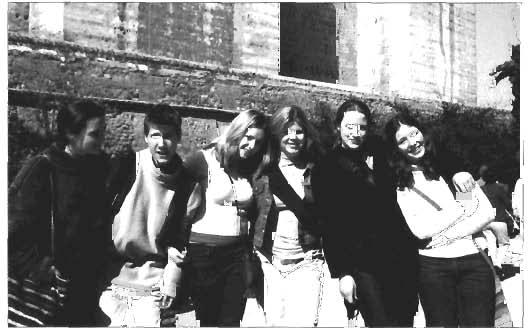

Rehearsal at the hotel in Ilbrr~molinos
Later in the term, for the March School Concert we were to use a selection of tour repertoire expanded to include the school's orchestras playing Coates' Dambustws March, Sibelius's Karelia Suite and Strauss's Pizzicato Polka, which featured the dazzling xylophone playing of Gareth Ceredig.
It has been especially pleasing to see the growth of enthusiasm and involvement amongst the school's younger members in the past few years. Of special note continue to be the Orchestral Workshop and evening concert for the Fourth Forms, Lower Removes, King's St.Alban's and King's Hawford instrumentalists. This and the series of Young Performus Concerts are the result of HRT's vision and hard work. The Orchestral Workshop Orchestra was so big that it barely fitted on to the Theatre stage for the lively and enjoyable evening concert. The players heard in these ventures are the future life-blood of our school music-making and represent an encouraging future for the school. Perhaps the next stage will be to move the Young Performers' Conrmts to evening slots so that they function as junior Kqs Society Concvts. Whenever they are held we do hope that as many parents as possible will come to hear them.
A new venture for the early Summer term was the inauguration of a different kind of concert - the A Lmel and GCSE Composers' Concert. This was the brainchild of DGP, who, as teacher and marker of the exam compositions, realised the need for recorded performances of composition, particularly for the new ASspecification. The concert was held in the music classroom of School House for a very select audience of parents who came to hear the work of Andrew Furniss, Lucy Congrave, Jane Cairns, Jenni Houghton, Freddy Speyer, Mark Rose and Henry Watson.
Soon afterwards we were amazed to be invited back to give another Huntingdon Hall 1,unchtime Concert in their new Npower series. This gave a welcome opportunity for both AS and A level pupils to try out their performance exam pieces. Included in the concert, held on 25th April, were Rodgers and Hammerstein's If1 107~edyou, sung by Emily Ormerod, Rossini's L'lnvito, sung by Lorna Pritchard, the Nocturne from Borodin's 2nd String Quartet, played by Elizabeth Lewis, Jane Cairns, Julia Guy and Freddy Speyer,James Mcmillan's haunting violin piece, Ajer the Tryst, played by Julia Guy and a selection of Bartok's Romanian Dances, played on the violin by Jane Cairns. The concert began most unusually with Rachel Rafiqi performing to Scottish traditional pieces on the bagpipes, and ended with a small choir singing Byrd's Praise Our I,ord, All ye Gentiles and Britten's Carol (from Sacred and Profane).
It continues to be a source of wonderment and considerable relief that our singers and instrumentalists seem able to master quantities of music at great speed and with next to no rehearsal time. The School Choir, with a small orchestra of pupils, staff and visitors, gave a fine performance of almost the whole of Handel's Messiah on Wednesday, 23rd May just before the major public exams got fully underway. It is a tribute to the
choir's hard work that they gave such an accurate and lively performance on the basis of approximately twenty forty minnte rehearsals. For many of the younger singers, even cathedral choristers, this was a first ever encounter with this most famous of choral works. We were pleased to welcome back Marie-Claire Byrne (OV) and Alastair Brookshaw (OV) as soprano and tenor soloists. They were joined by Stephen Shellard (alto) and Ian Bell (bass) and proved a splendid team of soloists. We were left wondering why this great and famous work was heard by such a small audience, in spite of the advertising that had taken place; this writer, for one, wished that he could have put the entire performing body and audience on an Easyjet flight to Malaga, where they could have been joined by the size of audiences that we had encountered in February.
The term ended with the School Choir singing Wesley's Blessed be the God and Father and Marcel Duprt's Laudate Dominum at the King's Day Service. The sound of the Duprt in particular, with its powerful accompaniment played on both of the cathedral's organs by DGP and the cathedral's organ scholar, Scott Ellaway, provided a magnificent conclusion to a year of fulfilling music-making. Congratulations to Scott, who has since learned that he has been awarded the organ scholarship at Keble College, Oxford. At the same time we were delighted to hear that two of our sixth form music scholars had finally achieved their scholarships; Sam Bayliss will have already taken up the organ scholarship at Somerville College, Oxford by the time this article appears, while, in a year's time Julia Guy will follow Tom Dupernex as a choral scholar at 1 Trinity College, Oxford. By the time Julia leaves Cambridge there will have been a continuous representation of former King's pupils in the choir or organ loft of Trinity College of thirteen years. Congratulations to both Sam and Julia! i
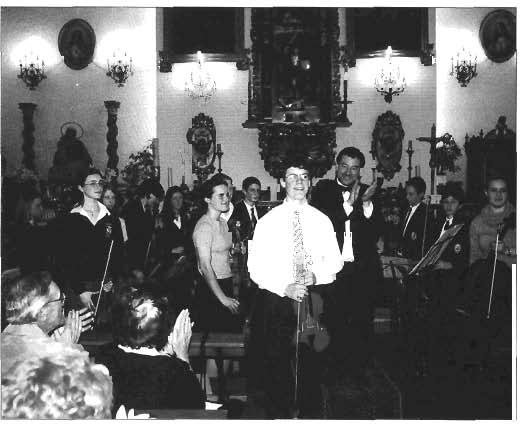

This has been another very successful season for the Society. The five main concerts attracted good-sized audiences, and the performances were, as usual, of a high standard. Again we managed an extra concert in the final week of the Summer term - no small feat, as most of the pupils had not been in school since half term and came together for a couple of concerts only. Every year I say 'never again' but they always promise to be there and to be ready to perform - and they are!
This year the programme for the final Concert included Mozart's Spatzen Messe with the Keys Society Choir and
'Summer' from Vivaldi's Quattro Stagioni with the Chamber Orchestra and Elizabeth Lewis, solo violin. This conlpleted performances of all four seasons with 'Autumn' and 'Winter' at School Concerts and 'Spring' at the March Keys Society with Jamie Walker as soloist.
My thanks go to all those who organised and took part in concerts and particularly Chris Husband, Emma John, Sam Bayliss, Elizabeth Lewis and Mike Parks who left at the end of last year, most ofwhom gave many years' service to the Society.
Incidentally, at this year's Harrogate Festival in August, the Finzi Singers performed Roger Heminpay's Three Songs commissioned in 1991 by, and dedicated to, the Keys Society and based on three poems by Peter Diamond. This was the first professional performance of the songs and was well received.
J.L.K.B.

The Art Department has continued to develop its links with professional artists to the benefit of many pupils. There were five exhibitions in the Theatre Gallery presented by visiting artists, including one by Geoffrey Olsen, an internationally renowned painter. The artist has work in permanent collections both in this country, and America. Geoffrey Olser~gave an excellent and thought-provoking slide talk, and led a weekend workshop for sixth formers. Another exhibition was mounted by Claire Horackk, a member of the Art staff. The exhibition was colourf~~l,rich and of an excellent standard, which certainly inspired the pupils and other visitors. It is no mean task to produce a quality exhibition whilst being a Li~lltime member of staff, and the mother of young children. Thank you Claire!
Two workshops were led by our old friends Kcvan and Joy Hopson. The first was held in collaboration with the IT Department. Pupils fiom the Upper Fourth were amongst the first to use the new conlputing facilities in Choir House. Beautiful and complex images on a theme of Egypt were produced over a busy day. During the Summer Term, Kevan and Joy led a driftwood sculpture workshop for pupils and their parents. There was a lovely atmosphere at this workshop, and several family groups and individuals produced inventive and satisfying work.
Pupils continued to display work around the school, and in the Theatre Gallery. The work is much in demand, and we are constantly being asked to provide material for new venues. In the Autumn Term, an exhibition of 'A' Level work was held in the Cathedral. The work was selected from the major 'A' L>evel Summer exhibition, and celebrated the continuation of excellent results.
Our fourth pupil, in as many years, was accepted by The Ruskin School of Drawing and Fine Art, The University of Oxford. <:ongratulations to Julian Arnold for this fine achievemcnt. Thc k~tthat our pupils are admitted to this prestigious cstablishmcnt, without thc benefit of a foundation course, suggests that we offer a particularly broad and sr~ccessf~~l art curriculum.
There were two trips to St. Ives, Cornwall, for fifth formers. Pupils visited The Tate of the West, smaller galleries and artists' studios. Internationally known artists ran practical workshops and delivered slide lectures. As well as practising painters, the pupils benefited from the advice of a top class illustrator and a police forensic artist. The latter gave a fascinating lecture describing his interviews with Fred West. The artist was commissioned to produce drawings from descriptions given by West of various victims. Many of the drawings proved to be incredibly accurate.
The Lower Sixth artists visited Nice, South France. It was a wonderful trip, with superb weather. The pupils worked hard,

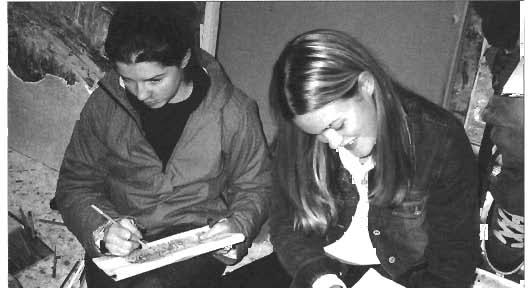

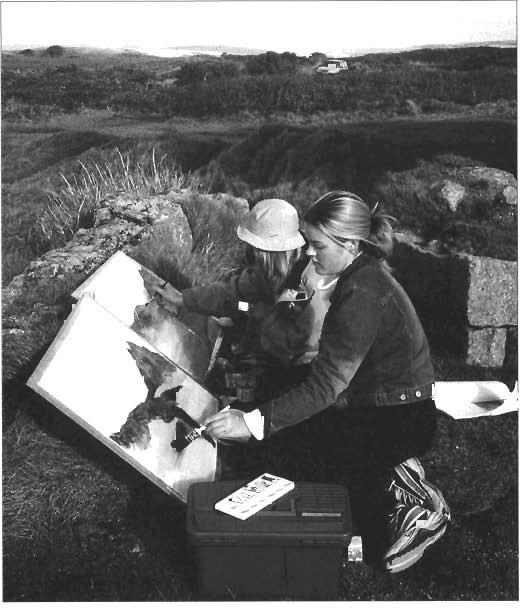
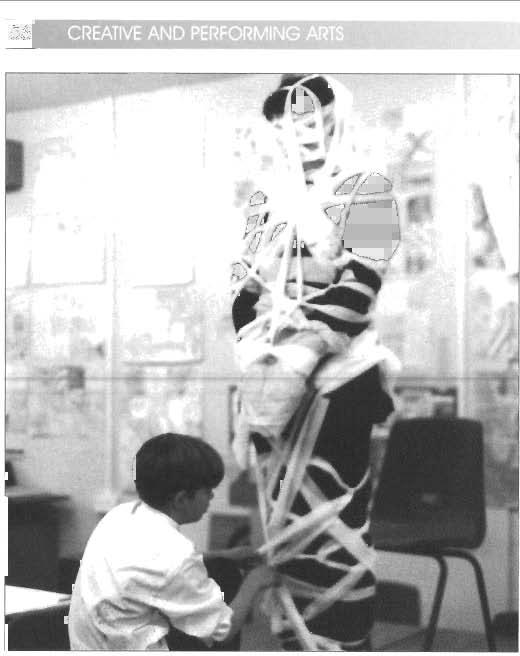
and produced drawings and critical analyses in the Matisse, Chagall, Leger and Picasso Museums, the Maeght Foundation and the Museum of Contemporary Art.
We are most grateful to Andrew Morrison, who spent the year working in the Art Department, firstly as an artist-inresidence during the Autumn Term, and then as a full-time teacher over the remainder of the year. Working on a theme of Egypt, Andrew quickly amassed a huge arnour~tof drawing, impressing pupils with his output and creative energy. He was an extremely approachable artist, and was happy to discuss his work with anyone. As a teacher he was extremely popular. Pupils liked him, finding him laid back, friendly and above all, helpful. For King's Day, he ercctcd a large wooden and canvas pyramid, in the courtyard behind Hostel House. This was a culmination of his earlier work and excited much intrigue and debate, not least from the bursary staff, whose window provided a grandstand view of its installation. The Department really is very grateful for the excellent contribution that Andrew made. He is much missed, and I wish him well with his new life in Stroud.
E.R.H.

This was the most successful year yet for school dance. It started with a visit from the 'Union Dance Company'. Two professional dancers came into school for a day to give a workshop to the girls who attended Dance Club in the Lower and Upper Fourth and Upper Remove. That same evening we all went to see them perform at the Roses Theatre in Tewkesbury with the rest of the company.
All the girls were inspired by the ideas shown and carried them on into some of their own work later in the year.
The participation of pupils in clubs continued to rise and some of the students choreographed their own pieces, which is a true success story.
We were able to run clubs at lunchtimes and after school for the Upper and Lower Fourths and Upper Removes and the Fifth and Sixth form used their games options to work on their performance pieces for the end of the year.
The Fourth Form boys break dancing took off with a new influx of very energetic and athletic Lower Fourth boys.
During the Spring term a Physical Education student, Aggie Van Den Bruegg was on teaching practice at King's and kindly came into some of the lunchtime practices to give the boys some wonderful ideas.
The Dance Showcase was the highlight of the year for both me and the students who participated. Over one hundred and fifty pupils performed that evening, something we hope to repeat next year. The whole evening was initiated by MRG who wanted to raise funds for the girls' sports tour to Australia in 2003.
The Showcase presented different styles of dance, performed by both boys and girls representing every year group, from Lower Fourths to Upper Sixth.
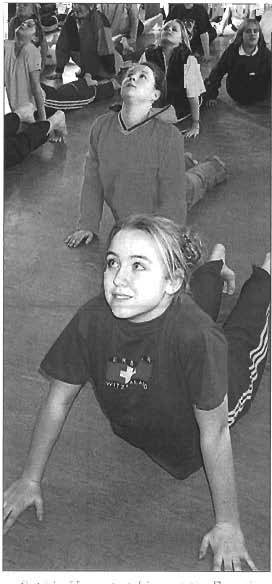
Some pieces were taken from PE lessons in the Lower Remove and Dance Drama lessons, which have been taught in the curriculum for the first time this year, in the Upper Fourth. The majority of the pieces performed were the result of club work at lunch-times and after school. The Fifth and Sixth formers were able to choose Dance as an option in their games time during the Spring term, making it accessible to many more girls. There were fourteen different pieces of work performed that evening. Every group had something special to offer and the occasion would not have been the same without the enthusiasm of each ofthe pupils who took part.
T.D.M.

This was magnificent! If you thought, like me, that 'dance' was a marginal activity practised by a few girls who were not good enough for 'proper' games, you were in for a quite delightful surprise. Not only did only more than 100 pupils take part (about 25 percent boys), but the standard of performance and the entertainment value were wonderfully high. The occasion was organized by MRG in aid of a girls' tour of Australia in 2003, which presumably benefited hugely from the sell-out audience. TDM was the overall choreography maestro, and the sheer number and variety of dances was a great tribute to the hours of practice put in by her and all the performers.
The performances ranged all the way from Lower Fourth to Lower Sixth, some arising from dance clubs, some from class lessons, and a few from initiatives by individual pupils. The first two dances, for example, were part of 'club work', as the programme puts it, with a group of Upper Remove girls performing to 'Let's Get Loud' and a large group of girls from the Lower Fourth interpreting 'All That Jazz'. Straightaway we realised that we were in for a great evening - even those for whom the music was not their usual choice of listening! Although there was no specifically Upper Sixth dance, the Lower Fourth girls were rehearsed for a time by two Upper Sixth stalwarts, Amy Rowe and by Jones, who must have been proud of their charges. Another item practised in a lunchtime club - and the most painful sight for those of us who need to visit osteopaths - was the breakdancing by nine Lower Fourth
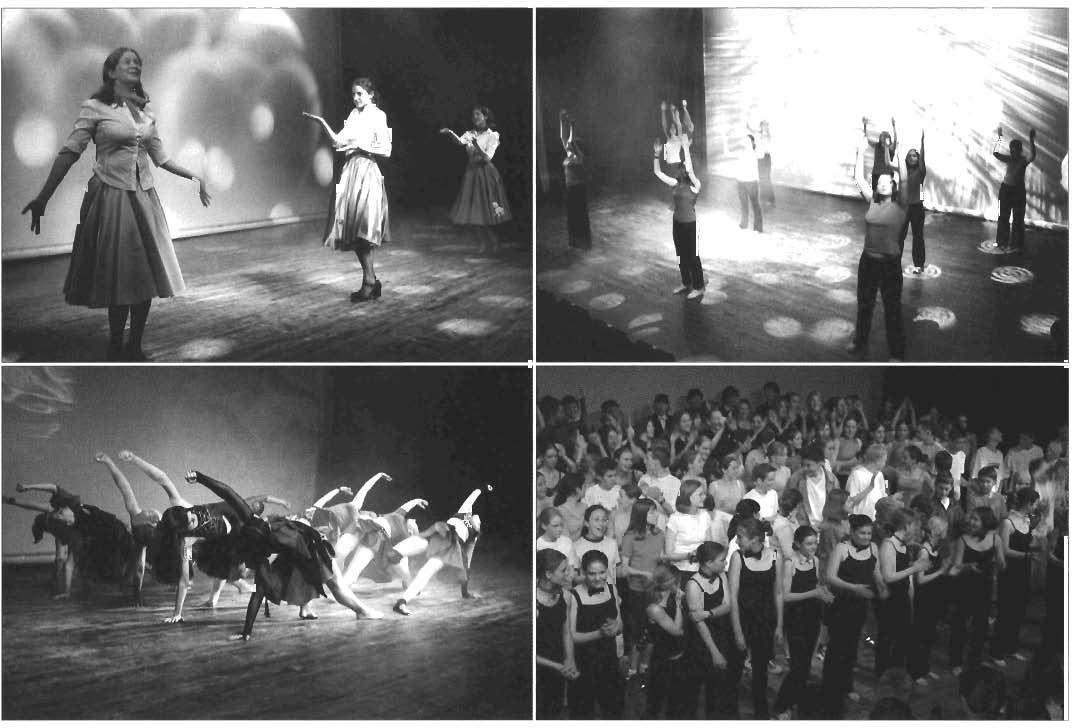
hoys: they did things which by rights should
The third category was three have crippled them for life. It was an independently conceived performances by extraordinary pcrforrnance which made me trios of girls, which in some ways were the feel both privileged to see it and relieved that most remarkable of all. One Upper Remove nothing like that was ever on the curriculum group, Claire Southarn, 1,aura Kingshott and forty years ago! Finally, on the club scene, a Nadine Preedy, did an energetic version of group of Upper Fourth girls did a splendid something called 'Bongo Drums', which left interpretation of 'Proud', in which they were us quite breathless. Another Upper Remove inspired by the experience of a professional trio, Naomi Roberts, Abigail Williams and workshop earlier in the year. That's how Sophie Tomlin, had choreographed, and seriously this activity is now taken. now performed, a dance to the music of
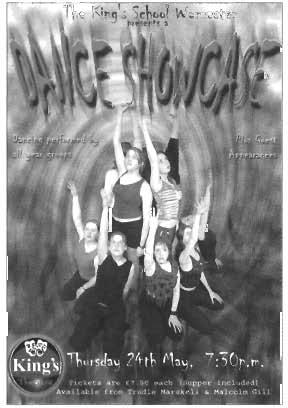
Several of the items were done in class as 'Satisfaction' (not the Stones version I part of the PE or Games curriculum. One of remember!). If I had seen this on a different the most surprising in this category was U4A stage I would have believed it was performing 'Grease Lightning', with some of professional, such was the imagination, selfthe characters showing a discipline and confidence and slickness of the three girls. commitment we didn't know they were The other magnificent independent item capable of! The music backing another was the Lower Sixth trio of Isobel Owen, Upper Fourth class group, fourteen oP U4<: this ti~~lc..so~~~~tlctl(;c.tnr~~;cMar-tyn Smith and Lucy Teasdale. They danced to a vaguely limiliar until I relnetnhered that I, yes I, Iiad 'tlancctl' Boogie U'oogie number from a show I now wish I had seen, to the very same music ('You're the one that I want') in the last 'Burn the Floor'. Again, like their Upper Remove staff pantomime. The choreography looked very similar, but counterparts, they might have been professionals. Utterly the diH'ercncc was in the performance: the boys and girls were captivating! executing the movements in time with the music rather than I should also rrlention the staff item at the end, which I needing an extra half-beat to remember what the movement had feared might be rather an anticlimax to a great evening. was! Another product of PE lessons, this time managed by Not a bit of it! The staff, choreographed by MML and starring NRA, was two items by a group of Lower Remove girls - one a both dance coaches and those not known as such, danced series of warm-up exercises (to the sound of Louis Armstrong!) in a more traditional format, reminding me of the and the other an interesting medley of rhythmic styles Morecambe and Wise Show, but were professionally slick and (presumably made less dangerous after the warm-up?). Sixteen exuberant to the music of 'New York New York'. They Fifth Form girls got in on the act (as part of their games rounded off an incredible show - a revelation to me and option) with a version of 'Push It', followed by 'Urban War' many others which ought to have given dance a secure place performed by members of the Upper Sixth. Both were in that list of the performing arts which the School does so excellent in their different ways, full of imagination and verve, well. Bravo! ensuring that the pace of' the evening never flagged. R.N.G.S.

IT WAS A difficult year for St. Alban's, particularly for the children, as a result of various factors outside the control of the school. First the fuel protests prevented a group of second years from going to camp in Derbyshire. This was followed in October with some of the worst flooding Worcester had seen for many years, which severely disrupted our sporting programme, not briefly but for most of the winter months. Finally, Foot and Mouth Disease prevented the third forms from spending their usual week at the Old Chapel in May. Despite so many blows to the expected norm they were very philosophical in their disappointment and coped admirably.
We welcomed sixty new children in September who settled in remarkably quickly, emersing themselves fully into the life of the school. It was not long before it was impossible to tell who was new and who was an 'old stager'. This is indicative of the school and the type of children we attract; open minded and welcoming to all. We also welcomed Mrs. Keyes, who joined the staff on a part time basis to teach some science and to support the setting arrangements for English and Maths in the Third Year. The other change that greeted us all at the beginning of the year was the redesigned and refurbished reception area. This provided the school with a much more welcoming area for visitors old and new. The improved technological resources to that area also gave us internet access and our own website, both important features in the fast-changing world we live in. These improvements also extended to the Art and D.T. room and access to both the Music room and the Boys' changing rooms. These areas had been a problem for some time and it was RB's relatively fresh eyes on the problem that had the vision to see a way around it.
The ethos of St. Alban's is that it gives each and every child an opportunity to excel at something, whether academic, musical, dramatic or sporting. Most do find a pedestal on which they can display their talents. However, the emphasis in a school such as ours must always be towards achieving academic excellence. Every child is capable of achieving excellence in their own right but some manage to take it a stage further when it comes to academic hurdles. This year we were proud to have no fewer than seven, Christopher Smith, John Richardson, Zoe Monkley, Emma Hirons, Emma Fernell, Michael Cairns-Terry and Stephanie Bubb, invited to interview for 11+ Academic Scholarships. John Richardson, Emma Hirons and Michael Cairns-Terry were successful on this occasion but the others, and more, will be chasing them all through the Fourth Forms. Changes to the way we offer the curriculum were introduced this year, hopefully giving more children an opportunity to reach a level of excellence. Setting, a feature of the Third Year, was introduced into Maths in the Second Year, where the most able children were given an opportunity to fly whilst those less confident were given more individual attention and support to give them greater confidence. A whole range of support lessons were provided within classrooms where a teacher concentrated on one or two individuals at a given time, reinforcing the work of the class or subject teacher. Similar support was given to the more able children so that they extend their learning capability and potential. These were seen as very positive improvements and the benefits to individuals were there for all to see. With over a hundred of our pupils playing a musical instrument it is hard to escape the sound of music drifting
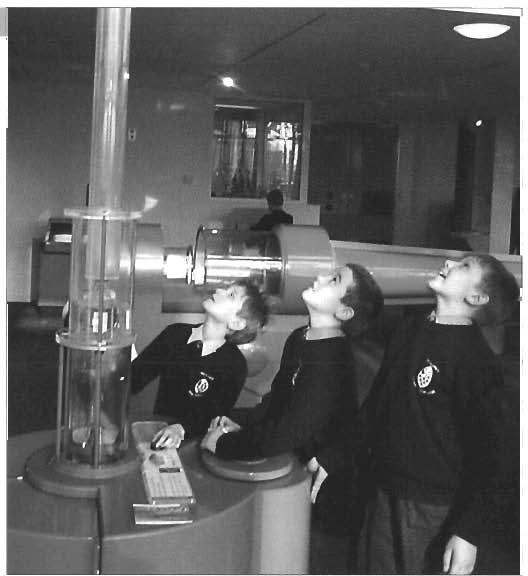
through the school. This may be the first discernible notes of a novice to the vastly more tuneful sounds of an accomplished young musician. Stephanie Bubb and Peter Holder, both renowned for their musical talents since they entered the school as Lower First Years, continued to lead the rest of the school and set excellent examples for others to follow. Imogen Schofield, John Richardson, Emily McNally, Hannah I,ucas, Alexander Lindner, Peter Holder, Stephanie Bubb and George Austin-Cliff were all invited to audition for 11+ Music Scholarships. Irnogen Schofield, Harlrlall Lucas, Peter Holder, George Austin-Cliff and Stephanie Bubb all gained awards, thus emphasising the huge depth of musical talent, riot only within the school but within their particular year group. These talents were so obvious to those who attended either of the two concerts performed in thc thcatrc or thc orchcstral workshop, bringing the combined talents of St. Alban's, Hawford and the Fourth Forms together for,just one day. In addition there were six Informal Concerts held in the St. Alban's Chapel. The children are lucky that the musical members of staff, HRT, VG, BW and RR give so much of their time, sharing their own talents, to produce an orchestra, a string group, a wind band and recorder groups as well as a combined boys and girls choir. It is impossible to think of music without giving thought to the school's annual drama production in the theatre. In recent years FMG has taken an adaptation of a Shakespearean tale and produced a show that gives the children an opportunity to begin to understand and appreciate the Bard's great works. This year was no exception with a powerful musical production of Romeo and Juliet. Each year I think, 'Oh dear, this is too ambitious.' I am always proved wrong and drama in the school goes from strength to strength. As has become the norm, there is a curtain raiser from the Lower and Upper Firsts, a short play, giving them experience and a taste for performance. This year it was 'That's the way a Fairy Story should be told!' Romeo and Juliet was outstanding, with notable performances from Hannah Button, George Austin-Cliff, Tom Roberts, Conrad Clarke and Emma Fernell. RB and I were pretty slick when it came to scene changes and each night our dialogue increased. Had we run a few nights longer we might have had larger parts than the cast! Drama doesn't just focus on the annual production. We took part in the Bilton Grange Drama Festival during the autumn term. A non-competitive event, it gives

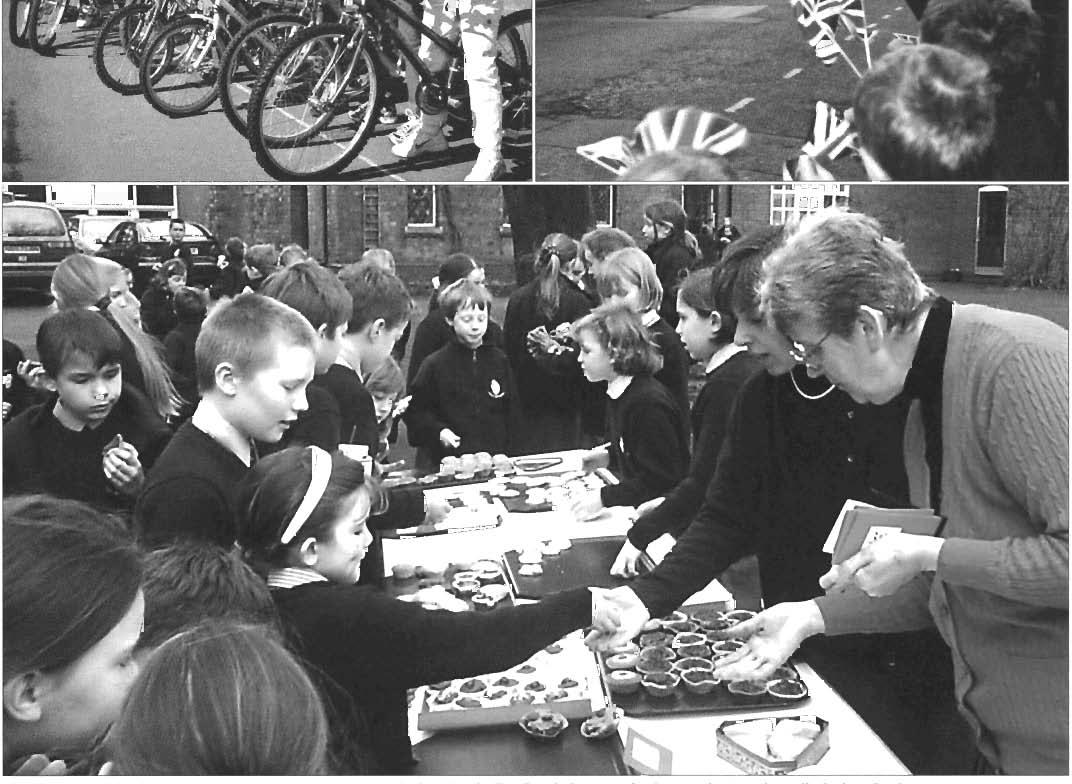
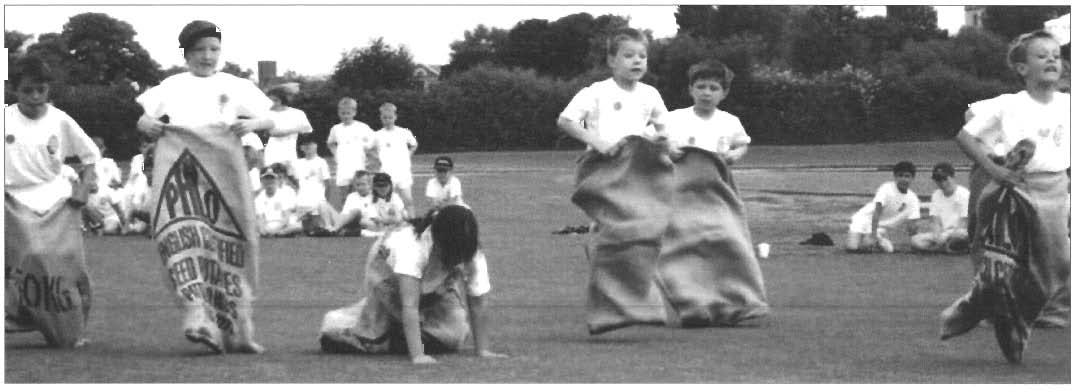
the children an experience and an opportunity to discover what other children and schools are performing and to develop an appreciation of theatre. But drama occurs most weeks in the form of class assemblies where often a child's dramatic talents are first displayed. The themes of these assemblies are far-reaching, entertaining and informative, and always eagerly anticipated.
Assemblies are often the place where the plight of those less fortunate than ourselves is highlighted, whether it be the homeless, whom we sometimes witness on our walk to the games field, to Indian earthquake victims. The children are always very quick in coming forward to offer suggestions as to how they can raise some money to help. In the autumn term the children raised over £900: £250 for the Sight-Savers River Blindness Appeal, £290 for Children In Need and £365 for the Asthma Appeal through a sponsored swim. Tom Byrne alone raised £80 of that sum but well done to all. The Indian earthquake touched the hearts of the children and the Second Year chose to bake cakes and sell them each break time for a week. That week raised a staggering £380 and added a few inches to my waist! A further S210 for the same appeal was collected at the end of the Orchestral Workshop Concert. We have been very lucky to have had Tshewang Lama Sherpa, a Kathmandu headmaster, in Worcester studying at the university. He came to talk to the children in an assembly about his school. We are so lucky. We have so much, yet many children in Nepal have very little. Tshewang wanted a school library, so a great many fundraising initiatives were devised by the children and we were able to present Tshewang with almost £800 at Junior
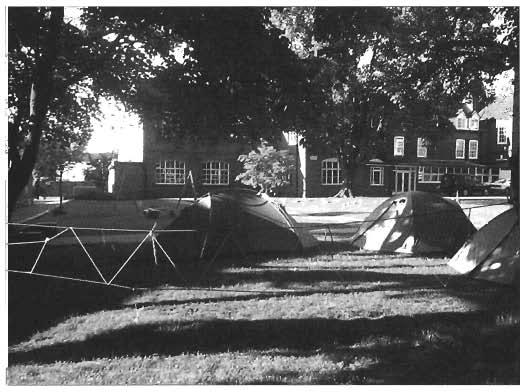
King's Day. Pride of place in the library in Kathmandu will be a whole school photograph showing the children of this school who provided them with their library.
If we focused all our learning on the classroom life would be dull for both the children and the teachers. It is always beneficial to take children away from the school, to use the knowledge of others or the stimulation of a new environment to enhance their learning. This is a very strong feature of education at King's and varies tremendously. The shortest distance travelled to an off-site resource must have been Severn Street to wave Union Jacks at the Queen as she visited the porcelain works whilst the furthest was the Third Year study visit to Le Cosquer in Brittany. In between there have been theatre visits, Youth Hostelling weekends to some of England's more interesting towns, Egyptian exhibition in Telford, the Botanic Gardens in Birmingham, Warwick Castle and a whole host of others too numerous to name. Because the Old Chapel was a building site during the autumn it was impossible to take the Second Years there for their annual 'get to know each other' weekends. Instead, we chose to travel to Pindale in Derbyshire, a delightful area with plenty to interest and stimulate young minds. We just managed to get the first weekend in before the fuel crisis crippled the country forcing us to cancel the second weekend. Alternative arrangements were made to take that second group late in March. The second crisis to hit the country, Foot and Mouth Disease, prevented that from ever taking place. Similarly, the Third Year Old Chapel camps in May had to be cancelled. To compensate for some of the disappointment the grassed area behind the new building in St. Alban's was transformed into a campsite for three weeks. Each form took it in turn to spend three days having an 'Old Chapel experience' in the centre of Worcester. The programme provided was full and varied, with field study activities at Severn Stoke, climbing on the climbing wall under the watchful eyes of SCC and JTWh, learning survival techniques on the playing fields and team-building exercises on the lawns at school. The children were returned to the care of their parents suitably tired, if not as dirty as they would have been had they been at the Old Chapel.
The extra-curricular life of the school is vibrant with a wide variety of activities providing the children with extra opportunities to participate in sport and to learn in a less formal atmosphere. Enthusiasm for some activities far outweighs our facilities or the practicalities of the activity. Sixty children in the swimming pool with two members of staff is clearly dangerous, so we compromise, rather than disappoint and allow the club to function in two groups on a half-termlv LT .
basis. Other activities have fewer demands placed upon them
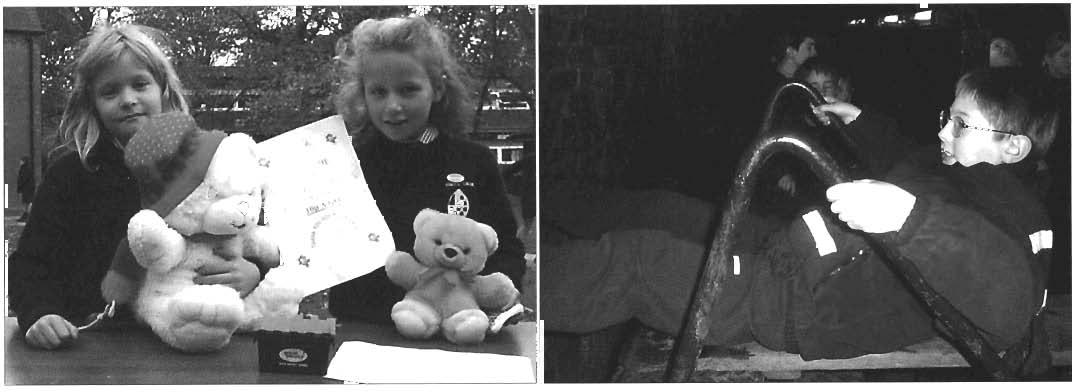
~V(~rnr/h(. 7>rldj -fund rclisrn~forcharity
and they offer an ideal opportunity for staff to get to know the children well and vice versa.
Inter House competition plays a large part in the life of the school with fourteen competitive activities during the course of the year. The majority of these are sporting but we appreciate that some children are more attur~edto the finer things in life, chess, poetry, art and music. All children participate in these activities and they create enormous enjoyment for them.
As I have already intimated, sport became seriously disrupted as a result of the floods. The playing fields were effectively out of use from October half term through to February half term, and even then use had to be limited to certain areas. The only physical activity we corlld pnrsue fbr much of that time was X-cot~ntryhut we even ran out of usable cormtry, resorting to the linear confines of the canal towpath. I.ong after the waters had sul~sicleclthe use of our cricket square was delayed until well into the stlmmer term as it took the ground time to recover from being under water for so long and having so much silt deposited on it. The disappointment was that we had a particularly sporty Third Year who needed the opportunity to perform and show off their talents. The rugby team achieved early success in the Elm's Seven-a-Side Tournament brushing off the opposition with relative ease. Other successes followed before an abrupt end came to the home season. Away matches also came under the cosh as the miserable weather turned playing fields into quagmires. The winter ended with a particularly impressive performance at the Warwick Invitation Sevens where the boys played beyond themselves to finish runners-up in a very strong field. The girls were very much restricted to netball, which was good for improving and developing their netball skills but meant that hockey received less attention than it would have done under normal circumstances. The ot-ienteers performed well again this year ,just missing OIIL on top spot in the National Schools Orienteering Championships. This group always seems to start the year as novices but, under the knowledgeable guidance of DM, soon I~ecornenationally I-anked. Under the coaching of Mrs. Hewitt and Mrs. Fulton the swimming squad went from strength to strength, more often than not out-perfbrming any opposition who came their way. It is good to see this wollderful facility beginning to hear fruit. The football team suffered a similar fate as the rugby. Matches had to be cancelled and when they were played the boys were barely recognisable through the mud. The summer proved to be more predictable although many of our cricket matches had to be played away from home. Avery promising start to the season saw the Under 11 team winning every match before half term, including an eight wicket victory over W.R.G.S. Tom Bryant was the mainstay of the batting averaging 173 at one point. Against
The Elms, he looked to me for guidance regarding the pace of his innings and how much time he had left before tea. Had my watch not somehow lost twenty minutes in the space of an hour and a half I am confident he would have gone on to score a maiden century. Instead he finished on X4 not out. After half term we seemed to lose the will to win and it only returned in the match against the Fathers where the umpires might have had some influence.
I started this account of the year by saying it had been difficult. It was but it was also rewarding. If everything ran too smoothly life would become d~~llfor all concerned. It is important that our children experience disappointment from time to tinie and, more importantly learn to cope with it. They certainly had plenty of experience and they coped with it in a manner from which we can all learn.
J.T.Wa.
There have been a number of galas and competitive events over the past year and large numbers of children who have enjoyed taking part. Mrs. Williams-Hewitt has been the driving force in organising and running both squad sessions and events during this time and we are most grateful to her for all her hard work. She has decided to move on to pastures new but will still continue her work on behalf of the IAPS with King's as her sponsor school.
Emily McNally, Andrew Hughes and George Webberley were joined by Andrew Finlay from King's Hawford in the team for the English Schools Bazuka Championships. This competition is open to all Primary Schools in the country. We qualified for the National Finals in Sheffield from an entry of 1000 schools but sadly couldn't go to the finals because two of the team were away in Brittany!
The IAPS swimming competition covers hundreds of schools similar to our own and thousands of children. This year Emily McNally qualified for the National Girls Finals held at Wolverhampton coming fifth overall. George Webberley qualified for the National Boys Finals held at Millfield where, qualifying in sixth position, he secured a bronze medal, a great achievement!
Colours were awarded this year to Michael Bates, Edward Brew, Andrew Hughes, Emily McNally, Lucy Senior and Dominic Wood. The Murfin Swimming Cup was awarded to Emily McNally and George Webberley and the new WilliamsHewitt Cup for the most improved swimmer to Michael Bates. Jane Fulton

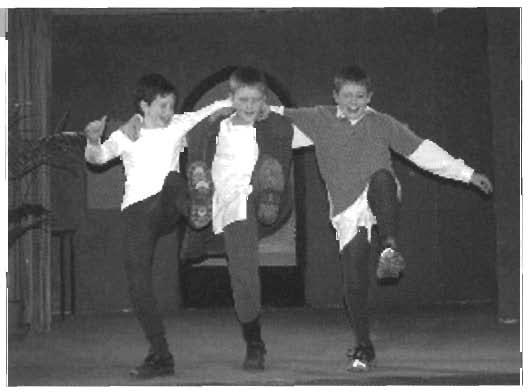
SEPTEMBER SAW Hawford welcome two new members of staff. Mike Dawes joined the team as Director of Studies and Head of Maths. A keen sportsman, Mike has made a major contribution to the games programme over the year, utilising his skills as a first class games player (even though he recently played for London Welsh RFC - you might detect a Welsh influence in this photograph!) to coach rugby, football doubt this ha5 111-o\idetlhim witli a new ant1 i~lterrs~ing and cricket to great effect. John Whitmore returned to challenge! teaching after a year's sabbatical. In addition to teaching We begin our review this year with Drama. At Christmas the throughout the school he joined SR as Form Teacher to Year children from Reception performed their Nativity Play in the 3. This is a significant step as the school progrcsscs to two-form guise of paperboys and girls, announcing lie birth of Jesus. entry throughout the Junior Department.
The children wore sandwich boards and asked the audience
In January we welcomed Mary Mayo as Reception Class to 'Read all about it!' The story continued with each headline ~eacherand teacher of Music throughout Pre-Prep. Kristy Passmore also joined the Reception team as an additional teacher and classroom assistant and Vicky Richardson became classroom assistant to Year 1 as well as helping with girls' games.
The new academic year saw the next phase of our building programme near completion. Although we suffered the inconvenience (no pun intended) of Porta-loos until half term the new facilities brought welcome relief offering lockers, changing areas, showers and lavatories! Kindergarten also underwent improve-ments with the creation of a larger lobby area and mini-toilets. During the next six months Kindergarten will relocate to new purpose built facilities, allowing both Reception classes to establish a new base within the current Kindergarten complex and so releasing space within the main house for a new library.
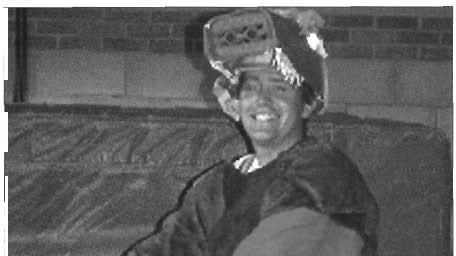

The expansion and development at Hawford continues apace. At the start of September 2000 we had 213 pupils from Kindergarten upwards, with waiting lists for some age groups.
Even as development continues at Hawford we do not lose sight of our primary goal which is to provide a balanced and challenging curriculum for our children in an environment which meets their individual needs as well as finding something to celebrate in all the children be it sporting, artistic, musical or academic.
This year we congratulate Charlotte Beckett, Tomas Baer and Niral Pate1 on gaining Academic Scholarships at ?+, and Paul Mallaband on being awarded an Academic Scholarship at 1l+ to the Senior School. Although Paul has been unable to take up his place due to his family's relocation to Belgium, we are delighted to hear that he has settled well at his Flemish speaking school. No
acted out in tableau form. While the children performed confidently on stage, Years 1 and 2 provided a choir to sing the nativity songs. In the Spring Term Years 1 and 2 gave a performance of 'Noah'.
The play had been adapted to accommodate a large cast and was put into verse for ease of learning. Year 2 gave spirited performances as Noah and his family. Our threc 'Cod' characters were resplendent in white and rhinestones! Year 1 performed in two-by-two with great enthusiasm. Many thanks to Ray Steele for his magnificent ark and Linda Slack for the excellent animal costumes. The play was enormous funcongratulations to all the children who took part and made it such a success.
In January we introduced Speech and Drama lessons. Since then the pupils have entered two sets of examinations and gained excellent results.
Pupils have successfully passed Spoken English, Verse and Prose, and Acting. Many of the children have gained Honours and Distinctions. Anthony Harding made a dramatic start, passing both his examinations with Honours and going on to win the Poetry Reading Competition.
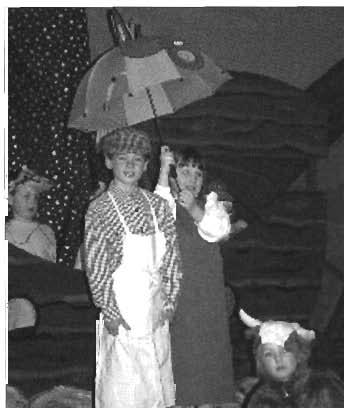

Recognising the importance of Drama in education, it will become part of the Junior School curriculum from September 2001. For a number of years we have offered ballet as an extra in Pre-Prep. As this has become increasingly popular it too will be available to the Junior School next year when we shall also see greater emphasis placed on Dance as part of Physical Education.
The Music Department had a lively year with ever increasing numbers of children playing a variety of instruments in a variety of ways. We saw the creation of a Jazz Band under the skilful direction
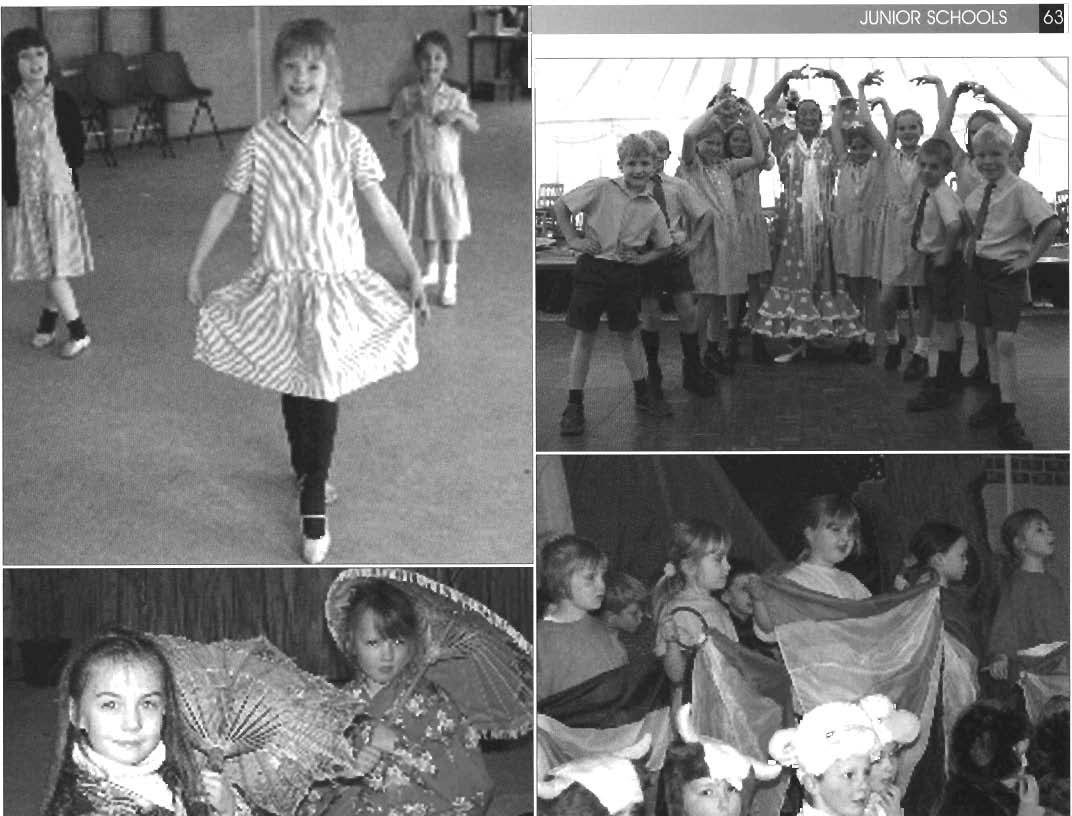
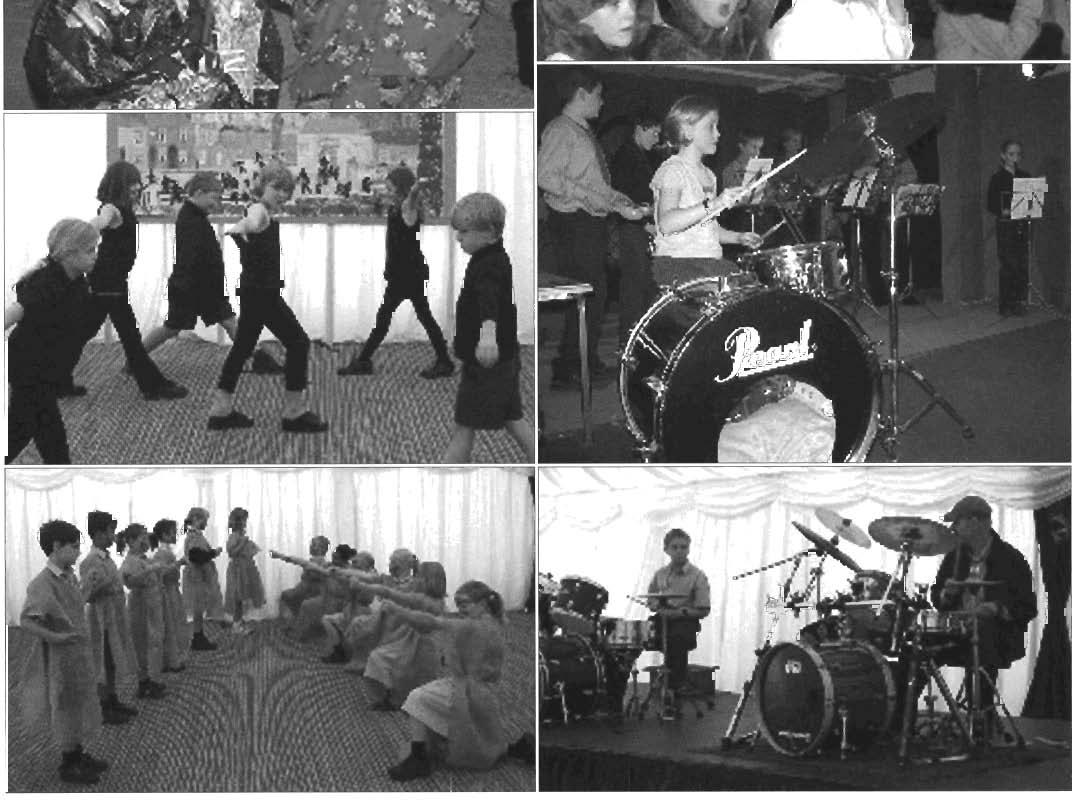
of Len Cole. They made their musical debut at the Inter-house Music Festival in the Spring Term. Befitting its new 'festival' status, it was organised by the children themselves with a little guidance and encouragement where needed and was a tremendous success. The Chamber Group performed confidently at the Carol Service and on Speech Day and several members participated in the Orchestral Workshop at King's as well as the Orchestral Day at Bromsgrove School. Early in the Summer Term a group of instrumentalists volunteered to entertain visitors from the local sheltered housing scheme. While our guests swayed gently from side to side to the sounds of Mantovani members of Year 4, under the watchful eye of JT, were on hand to provide them with a wonderful supper. Everyone thoroughly enjoyed the evening. The musical year culminated in our Summer Concert in which all children in the Junior School played their part. The orchestra was even larger than last year with an impressive standard of playing. This year we were very sad to say goodbye to Paddy Harding who has taught piano at Hawford for some twenty years. She will be missed very much by all of us.
Drama, Music and Art were thrown together in the Performing Arts Festival in the last week of the Summer Term.
The children were able to take part in many exciting activities including Delphine and Domingo's Flamenco Dancing workshop, a Poetry Reading Competition and an exciting drums demonstration and workshop with Roy Adams. Children from Year 4 prepared and performed a Tableau Viuant depicting The Battle of Hastings, which included a walk on part for Lizzie Doolittle's pony! Through the medium of dance and a superb art display Year 3 gave their interpretation of one of Lowry's townscapes.
In February the buildings reverberated to strange sounding words as the whole school embarked upon International Experience Week. This year the theme was Japan, a country so strikingly different from Britain in so many ways and here fore of great interest to us all. The aim was to cover the areas of the curriculum by studying aspects ofJapanese culture, including its geography through a scientific study of earthquakes and volcanoes, its numbers in Japanese maths lessons and its written language through the writing of Haiku pocms in English lessons. Other aspects of Japanese culture were explored through role-play in the Cobb. Spring arrived early with an abundance of blossom in the Japanese Garden which we had earlier constructed 'Ground Force' style!
The children were taught how to make sushi, sampling it (with varying degrees of eagerness!) using chopsticks while sitting in our authentic Japanese living room. Japanese visitors added to the authenticity of the children's experiences and they explained Japanese customs and culture to the pupils. The schoolroom area proved popular as the children were taught how words written in Kanji characters were developed

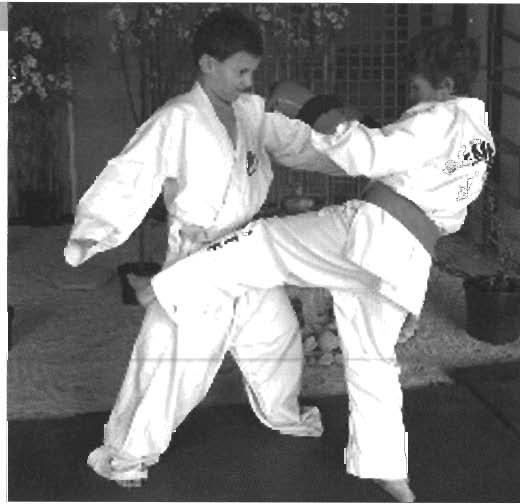
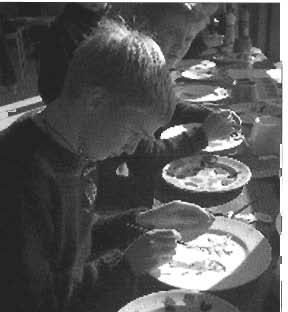

basis for craftwork. Many enjoyed the ancient art of origami and older pupils were fortunate to have the opportunity to learn to paint in an oriental style. All the children were able to paint a plate with a Japanese theme. Arigato to everyone involved, in particular our Japanese visitors and two of our parents, Mrs. Fry and Mrs. Cusack who gave so freely of their time. SR deserves special mention as shc co-ordinated the whole event with her usual flair and attention to detail. SR has established International Experience Week as one of the major events in our school calendar.
November last year saw our first Science Festival. As we all remember it was extremely wet and our speakers on 'Light', 'States of Matter' and 'Animal Groups' had to travel many miles, avoiding the Severn floods, to reach us. Our exciting trip to @Bristol was delayed by a week but was well worth waiting for. @Bristol is a wonderful interactive Science display and we visited the Explore and Wildscreen exhibitions. For the three days of the festival we all became scientists, tackling projects on Light, Weather, Forces and Bridge Design, all under the watchful eye of organiser and scientist-in-chief JT. All pupils and staff found learning something new great fun.
The charity half term was once again very successful with the children taking part in cake sales, home clothes days, a bad hair day, car washing and a grand sale when the children were able to organise their own stalls. Over £2000 was raised and this was split between The Indian Earthquake Appeal, the Acorns Children's Hospice and the RSPCA.
At the end of the Summer Term, Years 3 to 6 reviewed the phonics work they had been doing during the year. They made some colourful posters on rules and patterns in spelling which
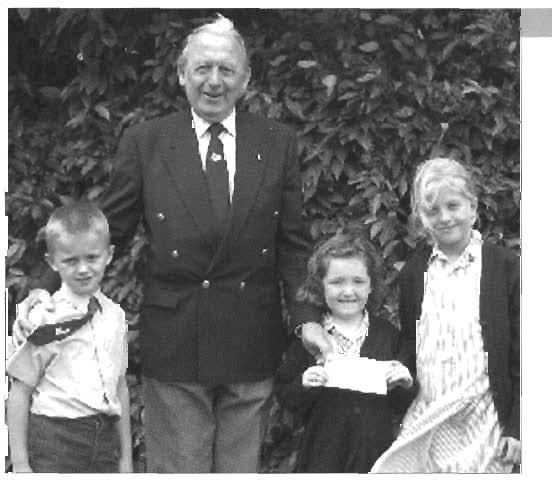
went out to Sapta Gaildaki School in Katmandu with Old Vigornian Daniel White, who spent some tirne working there as a volunteer this summer.
At lunchtime on the fourteenth of May, twenty-seven intrepid pupils and three less intrepid staff set sail for an outdoor activity centre with a difference.
The 1C;C Activity Centre is based aboard an ex-Mersey krry, the Egremont, and is moored in the estuary at Salcornbe in Devon. We arrived in good time, transferred to our launch for the ten-minute trip out to the Egremont, and clambered aboard entlir~siastically.Having made our cabins untidy the moment wr were in them we then set off for a coastal walk and a play on the heach, an opportunity to let off steam after a day of' tra!~elling.
Over tlie next Sour days the pupils were guided by expert staff in the finet- arts of sailing, ancl so successful were they that they were awarded their RYA 1,evel One certificates at the end of the week, a couple even achieving their Level Two. The standard of instruction was excellent as was the rapport established between the pupils and the instructors. The instructors were slightly sr~rprisecl on the secontl day when their 'enclave' in the dining area was invadecl by a few new faces, young instructors of the future. That they were able to mix with the instructors on and off the water adtlcd greatly to the enjoyment of the experience: a perfect opportrunity to relive some tricky sailing manoeuvre and analyse it in minutc detail. Adapting to life on board was difficult at first. There were many areas that were out of bounds and the no running rule in particular was strictly enforced. For many there seemed to be absol~~telynothing to do on the first night, and nowhere to do it in. By the Tuesday evening they were content, most of them, to sit and chat. A couple of card schools soon opened, operated hy some shifty characters! They had accepted the restrictions that were part arid parcel of life on board and settled into a less frenetic, more disciplined way of life. [This change is probably only temporary, before any of you ask!] The Hawford pupils gave an excellent account of themselves both on the water and on the boat. The instructors praised them for their willingness and te~~acity in the lkce of some pretty awful weather on the Wecll~esdayand Thursday. They stuck to the task admirably throughout. Me~nbersof'tlic ICC on board the Egremont, on courses oftheir own, who carlie across Hawford pupils were impressed enough to seek out staff and commend them for their friendliness and good behaviour. There are some aspects of education in the wider sense that are difficult to cater for in schools, even with team sports and plays and the myriad of activities that engage our pupils on a daily basis.
Outdoor Education fills in those gaps, not in any precise manner, but it gives those who participate the opportunity to

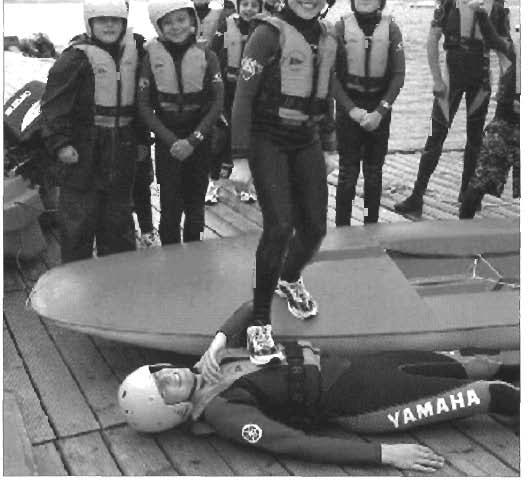
work in groups in unf'amiliar surroundings, to cooperate with others and rely on then1 ['or their success, to test themselves in adversity, and to find out more about themselves, beginning that journey of selfldiscovcry. As a staff' we felt we were able to look at each pupil individually and find something, or even many things, that they appeared to have got out of the whole experience. By the time we shuffled onto the coach to come home we were a sorrier lot altogether, sorry to be leaving even though we were exhausted. We picnicked at a motorway service station and there was no r~ulrringaround, not because we had specifically prohibited it but because we were still in Egremont mode! One or two even seemed to be swaying rhythmically from side to side, or was thatjust my imagination?
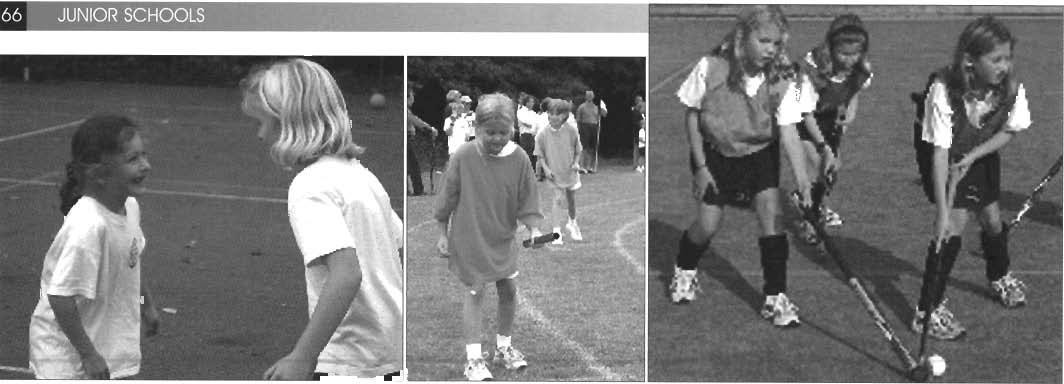
The number of girls rising to the Junior School means competition for team places in sports is becoming quite competitive. We are working hard to strike the right balance between being able to produce successf~~lteams in netball, hockey and rounders and developing an enjoyment of the games for everyone and not just the most capable. At the top end of the school we played a mixed team of U9/10s against mostly true U10 opposition. The girls put out teams at U9 and U8 level. All the girls in the Junior School, and even two from the pre-prep, represented Hawford at some point during the year. Though Hawford has traditionally been stronger at netball than hockey the decision was made this year to increase our hockey input, and more significantly transfer the playing of the game from grass to astroturf. This has proved to be an extremely successful move and there is a noticeable improvement in skill levels already, which bodes well for the future.
day! On the track all the children from Reception to Year 2 took part. They all did a sprint with the Years 1 and 2 children having heats to allow the most exciting of finals to follow. Medals were awarded to the successful boys and girls in each year. While the children in Year 2 competed their field events, the Reception and Year 1 children had their novelty races on the track. The grand finale was the Shuttle Relay which featured all the children representing their teams/houses. Though the day finished with a presentation of medals to the successful athletes no one went home empty handed as all the children were awarded a certificate with stickers that celebrated their achievements on that day. An ice-lolly was the most appreciated reward at the end of a competitive yet fair event.
Hawford Swimming Squad training has been running alongside the King's squad with several of our children representing the King's School at galas. The most successful
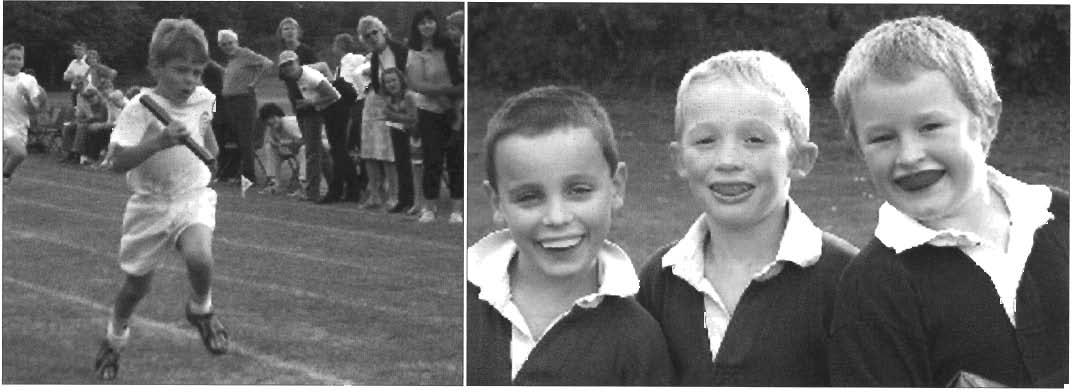
Conditions this year for boys' games were often more conducive to water polo rather than rugby or football but we soldiered on none-the-less. Our standard continues to improve with the rugby U8s and UlOs turning in some fine performances and the U9s finishing the season on a high, having won all their games. The Ulls fought hard throughout and finished the season with three victories and three defeats. The house rugby was won by Salwarpe.
This year the Pre-Prep held their Sports Day in the morning, while the Junior School were participating in field events. This meant that at times there were children of all ages at the long jump pit and throwing area, in addition to the many supportive parents. Although it did mean there was a little waiting around the atmosphere was tremendous. The older children were cheering on the younger ones and giving them advice and the younger ones were amazed at just how far these older children could throw and jump. I'm sure a few heroes were created that
swimmer over the year was Andrew Finlay who, as a member of the King's U1 1 team, qualified for the national championships. Christmas 2000 saw staff changes in the Pre-Prep. We said a sad goodbye to Linda Slack who has made a huge contribution to the school in a number of ways over many years. She offered her time freely as a reading mum when Sophie started and gradually became a permanent fixture! She has acted as secretary for the Parents' Association for several years and proved to be an extremely valuable asset. Linda was always conscientious and achieved her B.Ed.(Hons) whilst working at Hawford. We are happy to welcome Linda back as often as she pleases. Vicky Richardson and Kristy Passmore added a certain element of youthful exuberance to the staff room and we were sad to see them leave in the summer, each to follow their chosen strand in their respective teaching careers. Richard Figgitt has also moved on to pastures new. He came straight to us from Exeter and proved himself to be a caring and
adaptable teacher. He has moved on to pursue his interests in Special Needs Education and has already been encouraged to seek more responsibility in this area. Our good wishes to him for a successf~~lfuture.
At the end of the year we said goodbye to two longstanding members of staff. Mark Billen and Angie Douglas had both taught at Hawford for approximately 20 years. Parents and pupils, past and present, will have fond memories of the many productions and concerts that Mark and Angie have organised. Their enthusiasm and love for their particular subjects inspired the children arid provided some wonderful entertainment over the years. Parents, children and staff contributed to collections for both teachers. Mark was presented with a limited edition teddy bear and a David Birtwhistle engine print; both particular loves of his! Angie was given a set of Royal Worcester coffee mugs and two beautiful pieces of glassware, all chosen for their colour and artistic appeal. CH and her husband Nigel kindly welcomed staff to their home on the last evening of term and hosted a delightful farewell party for both Mark and Angie.
Blustery squalls heralded the Autumn Term not the weather marten. however - the resistance of the new arrivals in Kinder, Before the first week was over though, peace was restored and Kindergarten 1 ancl 2 were hard at work on their 'Homes' project. Photos of houses, collages of cottages, pictures of a ented Mr. palaces adorned the walls (and windows, thanks to t. 1 Proctor). A trip to Cheltenham to see :Jack and the Reanstalk' ir~troducedthe Christmas season (have you ever tried to get thirty plus two to four year olds, many fast asleep, off a bus all in one go? It's an interesting problem!) 'Little Benjamin' was the Kindergarten Christmas play and once again the Kleenex tissues were put to good use as the little performers swung effortlessly into 'I'm on stage' mode when even our shyest mouse wanted to be part of the play.
January arrived and as we hung our wellies out to dry and watched the last of the swans on the tennis courts swim by, the topic was 'Growing' and an air of suppressed excitement filled the rooms as we waited for our chicks to hatch. Oh, the sheer joy and wonder as little beaks appeared and started to peck their way to freedom what a chirping filled the air from chicks and children. Beans grew out of jam jars, flowers grew out of old wellies and children grew out of clothes. Grubby hands arrived clutching photos of themselves when they were babies- 'see how big I am now!' We went 'oriental' for the Chinese New Year and had great fun with chopsticks and prawn crackers and loved the bright scarlet and gold decorations (thank you, Selina). This led us nicely into Japanese week in school and we were amazed when a Zen garden appeared in the Cobb overnight magic! A cake shop for charity, a bad hair day (did the staff look any different?) and a rather soggy egg hunt brought us happily to Easter and a well deserved break.
The Summer Term started with a new topic . WATER (as if we hadn't seen enough). What fun we had how wet we got what happens if you fill a balloon with water and put it in the school freezer? You get a balloon-shaped ice-pop that takes ages to melt! Isn't science fun! We did the 'Lighthouse Keeper's Lunch' in drama and rowed to and fro over a blue sheet choppy sea in a pedal car boat. It's useful having a flexible imagination but how those noisy seagulls screeched and screamed as they stole the sandwiches.
Our water theme was continued into our very own Sports Day as we showed off our skills in the seaside race and even a
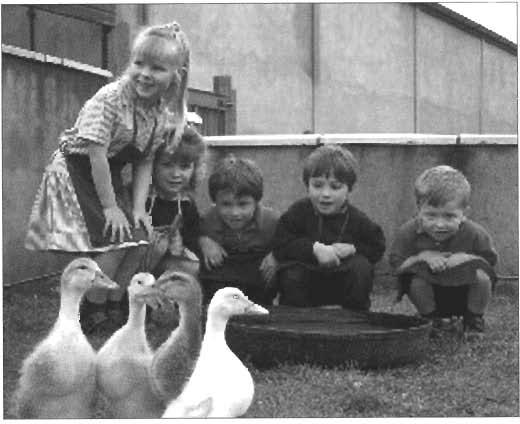
team race. After an exhausting morning a picnic lunch with families was a real treat. May took us wandering far from home (well to Stratford-on-Avon) where we loved the trip on the river and enjoyed the Butterfly House where we watched, wondered and wilted in the heat. Arts week took us to Worcester City Art Gallery for 'Big Art for Little People'. We were able to touch and try lots of different shapes, colours and textures and then, oh!. then we could dress up in little Victorian clothes. As the Summer Term drew to its close we had a party 'Come dressed as a book character' was the theme and hoards of Tinkerbells, Princesses, Batmen, Thunderbirds and Buzz Light-years invaded the school. Suddenly it was all over and sad Farewells were said, most especially to Mrs. Gale, a gifted and special lady whom we all love very dearly.
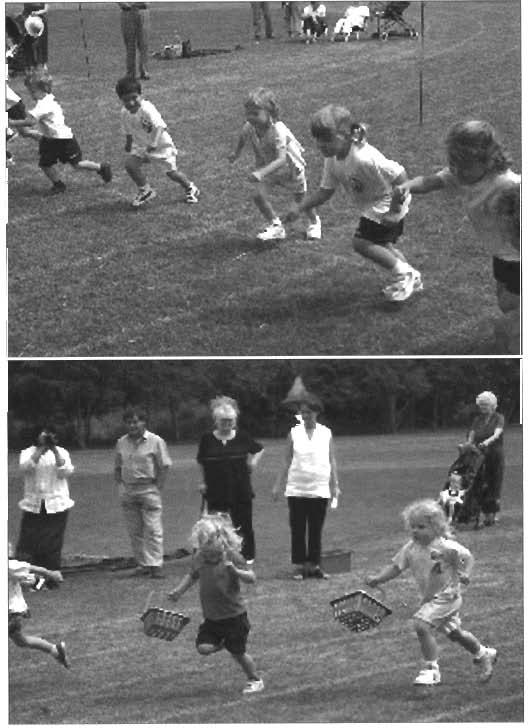

Joyner (4452) (4652) Keyes (4450) (77-79) (81-84)
Page (60-65) (43-53) (68-79) (52-61)
Mackie (47-56) ((7686) (8486)
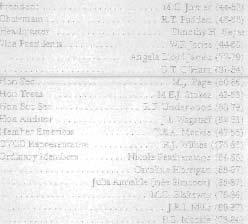
THE RELATIONSHIP between the OVs and King's is one in which each side derives benefit from the other, but the chief beneficiary of this relationship is the Club: we enjoy facilities and hospitality for the asking. The OV Club has been fortunate to experience a long run of Headmasters who have been very supportive of the Club; Tim Keyes has continued with this tradition, introducing some bold innovations in the last year.
The OV database was incorporated into King's own database (ASYST) in 2000 and the School has provided the Club with upgraded hardware and software to manage the new system, for which we are very grateful. A second innovation was Tim
Kcyes' decision to launch OV Connxct, and the first issue wen1 out as a parallel publication with the winter issue of the OV Nauslettmto all members. Published in Connect (issue nol) were details of another initiative -a London Reunion, in March, the first of several planned regional reunions. Connect was well received, and it seemed a logical move to merge the Newsletter and Connect into one publication; that happened in the summer and all information about the 2001 Reunion, as well as updated news of developments back at School, were to be found in the July edition of Connect - issue no 2. That issue also carried a report, by Marc Roberts, on the success of the London Reunion, with plans in hand for another in 2002.
The July edition of Connect contained news of and information about yet a third innovation: the expansion of activities on the Saturday of the Reunion Dinner, to make it into more of a 'reunion day', with the chance for OVs to come together and re-connect with old friends and the School over a whole day.
Too late for any coverage in the July issue of Connect was the special Old Girls Reunion ofJune Nth, called by Tim Keyes to celebrate 30 years since the first intake of girls at King's in 1971. A number of old girls, from the early days to recent leavers, came back to feel once again the atmosphere in their old school and meet old friends. An article, by Caroline Roslington, and pictures may be found at the end of this section.

A fine day with sixteen players in the morning medal round (9 holes) followed by thirty competing over 18 holes in the afternoon. It was especially pleasing to welcome Norman Hackwood, our oldest competitor, and Kate Brooks (Annable), our only lady competitor. Members now come from as far away as Yorkshire in the north and Sussex in the south, and it may be in f~~turethere will be a 'Golfers' Table' at the Reunion Dinner.
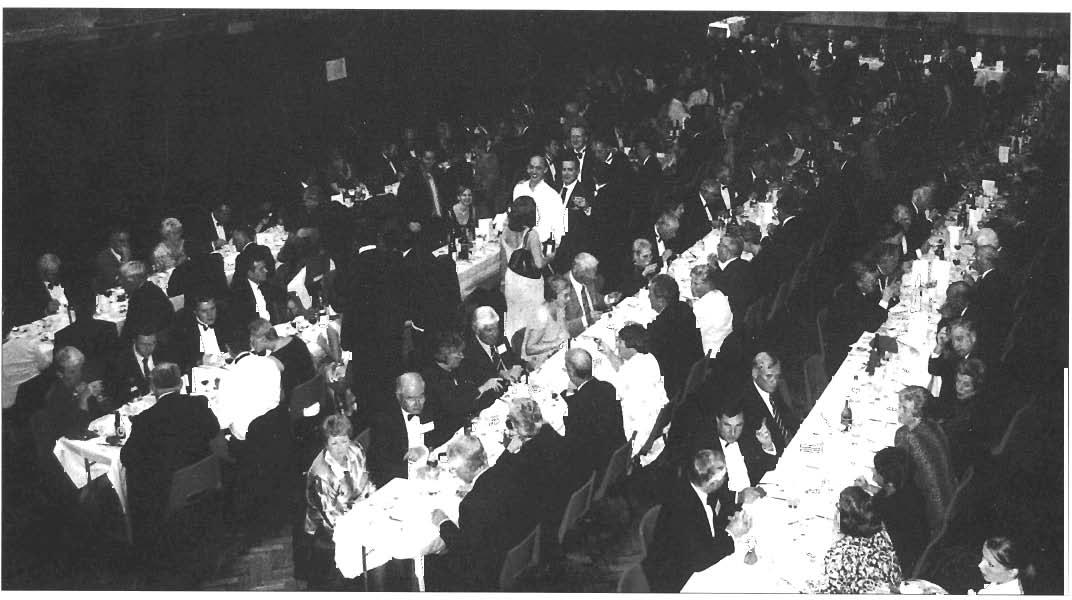

I<ru ,lion 7l~c.r.krnrl:IVill .Vo111r1 I! (l# nnd A nrly Hindl~
The President was unable to attend the evening meal, but Chairman Roy Padden was an able substitute, presenting prizes to the winners:
Morning Winner Keith Norman (net 37)
Runner up Michael Fletcher (net 37)
Afternoon Winner Robert 0' Neill (35 points)
Runner up Tom Shervington (34 points)
Best Front 9 Keith Derrett (19 poi~its)
Best Back 9 George Blake~vay(16 points)
Nearest the Pin James Mackie.
Next year's venue is not yet fixed but is likely to be 'The Worcestershire' at Malv?rn. The cost will be £40, which will include 18 or 27 holes of golf; coffke and biscr~itson arrival, Imncli and a li)ur course evening meal. Make a note in your tliary - Friday 20th September - the Malvern course is probably o~lcof the finest in the Mitllands and the scenery is magnificent. F~utherdetails will appear in issues of Connrri next year.
Michrrrl O'N~ill

The AGM took place in the Chappel Memorial Room with twenty-one rnenlbers present. D.R. Leonard took the Chair to start the meeting at 6.35. Eleven names of OVs known to have died were read out and the President called for the room to stand in silent respect. Thirteen apologies for absence were received. The Minutes of the 2000 A.C.M. were distributed to those present and acccpted with no matters arising that would not be covered in the Agenda. In his Report Mick Stokes (Hon Treas) explained that all monies in the John Pilnley Bursary Fund had been transferred to the Developme~~tTrust, Custodian Trustees of the F~und, with all the benefits of charitable statrls. He thanked Gale11 B~I-tholomew(Bursar), Penny Hope (Assistant Rr~rsar)and ,John Wagstaff for their help. The main Accounts for 2000 were adopted.
Malcolrn C;. Joyner was proposed by RT Padden to succerd Donald 1,eonard as President and elected. He took the Chair and thanked Donald who rrtircd to rc~cei\,eReu~lio~lDinnrr Guests in the Hostel. Gareth T. O'Hara was elected as a VicePresident. P.G. Mackie and J.R.I. Mills were elected to serve on the Committee. The Meeting closed at 7.04 afterJohn Wagstaff had been re-appointed as Hon Auditor under A.O.B.

Members and guests were invited to congregate on Saturday morning in the Dining Hall where they could meet and socialise with old friends, other OVs and members of staff prior to lunch; Stewart Davies arranged for the School's bar licence to be transferred to the Dining Hall for the occasion. After lunch Tim Keyes gave a short presentation in the Theatre and outlined the developments in hand, as well as those planned, at the School. Members were then invited to tour the School gro~~nds, to see for themselves the new and changecl as well as the old and familiar, with the chance to indl~lgein unbridled nostalgia. The planned shooting match (OVs v King's) had to be ahancloned as a rest~ltof security regulations following the terrorist outrage of September 1 I th in the USA. A number of OVs took the opportunity to attend Evensong at the end of the afternoon, in the (hthedral, where they had not worshipped since their schooldays. We were particularly pleased to welcome a group of OVs and their guests from the 50scelebrating the 50th anniversary of their arrival at King's as young boys. [Srr '11 All Stnrlpn' With' and %et% ha71~a 50-Ypnr lhnion~.Organised by Brian Gerrard (Cl 51-59) it included many who had not been back since leaving, some who had not seen one another in over forty years, and several from overseas. Old friendships were soon rekindled with tales of 'Do you remember when...', and details of lives over the forty years following. One thing was agreed, name badges would have been a real advantage: it can be difficult recognising someone you last saw over forty years ago - that length of time does play havoc with the looks of a teenager..
College Hall was filled to capaciy, with some late ticket applications having to be turned down. The enhanced programme of activities on Saturday had encouraged a higher than us11al attendance, boosted still further by the 1950s Brian Gerrard Group which boasted almost 100 diners, and included two teachers from that time, Howard Ballance and Frank Sutcliffe.
The programme in the Hall started with a reception for the 50s Group on the platform where an exhibition of memorabilia from that time had been staged by Caroline Koslington using material from the Archive, enhanced by personal contribntions from many individu;~l rnembrrs. David Ncwsholrne and Sam Bayliss played the Hall organ to entertain those at thc reception. Prcsident Donald I,eona~-d(C:a 47-52) called diners to order at 7.45 and members of tlie Keys Choir sang Grace before all took their seats. Guests of tlie President were: Tim Keyes (Headmaster) and Mrs. Mary Anne Keyes; Sir Richard Tilt (OV-Guest Speaker) and Lady (Kate) Tilt; Donald Howell (OV-Chairman of the Governors) and Mrs. Pat Howell; Dr. Rob Ingles (President of the Old Elizabethans' Association) and Mrs. Kate Ingles; Revd Barry Roche (OV-Guest Preacher) and Mrs. Roche; Revd Canon John Willis, MBE (OV) and Mrs. Willis; Mr. Tim Hickson (Hon OV-staff) and Mrs. Sheanagh Hickson; Mr. Edward Reeves (Hon OV-staff) and Mrs. Ruth Reeves. Representing the School were Scott Rennie (Head of School) and Sophie Moulc.
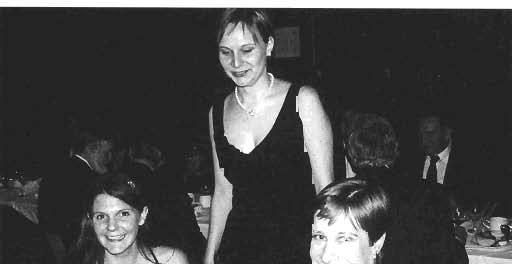

As well as OVs from the fifties we also had a number of the Class of 91, coming together ten years on, many from the President's time, and others spanning years from the late thirties to the late nineties. Such a wide mix of OVs made for a very warm and welcoming atmosphere. We were pleased to welcome Barbara Curle (Hon OV), there to meet Richard Tilt and others from her time in Choir House. Arlgela Lloyd-James proposed the Toast of the School and Tim Keyes was able to respond with an upbeat report on the year's activities. Sport continued to thrive, but the problem of flooding and having the sports field under water for at least half the winter had curtailed fixtures considerably. In spite of the problems caused by the river, girls' rowing continued to thrive, with King's crews vying with the best. The academic side was thriving and the current building developments well advanced, but there was still much to do as and when funds permitted.
Sir Richard Tilt's speech covered aspects of his life and work, which had been eventful to say the least. Like the Headmaster's speech it was spiced with a little humotlr, which went to prove that the trialsand tribulationsofsuch afrontlinejobasDirector of the Prison Service had not robbed him of his sense of humour. Donald Leonard spoke of his time at School, and in particular of his great passion -rowing. He presented bouquets to Mary Anne Keyes in gratitude for the solid support she had given the Club, and to his wife Jo, who had given him solid support in his year of office. He rounded the formal part of the evening off by thanking Richard Underwood for organising the Dinner-aconsiderable featwith the Hall full to capacity.

A large contingent of OVs and their partners swelled the numbers at the Cathedral Eucharist on Sunday morning. The President Malcolm Joyner gave the readings, and Revd Barry Roche was preacher. His sermon, delivered in the aftermath of the terrorist outrage of the 11th September in the US reminded us that even in the depths of tragedy and despair it was possible to have faith and hope. President of the Celebrants at Communion was Revd Canon John Willis.
Numbers for the Headmaster's 'At Home' were too large to be accommodated in No 9, and the Dining Hall was the venue; hosted by Tim and Mary Anne Keyes, ably assisted by son Sam; we thank them for their effort and support. The freedom to circulate with food and drink in hand gave everyone the chance to talk freely and enjoy the company of old friends and new acquaintances. This function marked the end of the Reunion Weekend for many, who left to journey home: some quite literally just a few hundred yards, others as far afield as foreign lands.
With the Headmaster's permission the 1950s Group had arranged an additional function for themselves, and later in the afternoon a barbecue took place in the School Gardens. Once again the freedom to circulate - plate in hand - made for an ideal atmosphere and the old friendships were firmly rebonded. An extra treat for some - and one which did press the nostalgia buttons - was the chance to explore the upper reaches of Edgar Tower, the rooms and studies of which had been their base as pupils. As members began to disperse it was with the promise that this might well be their first reunion, but it would not be their last: some had come out of curiositysome with enthusiasm, some with trepidation - but all had found it a rewarding and invigorating experience.
An e-mail to the Headmaster, which was forwarded to me by Mary Brodrick, very early in the year. An OV by the name of Brian Gerrard was interested in bringing about a reunion of his contemporaries, in particular those who had first entered the School exactly fifty years ago. The e-mail was soon followed up with a phone call - from Australia (Brian lives in Melbourne) -and I agreed to help. The first thing to do was to e-mail him with as much information as was available from the database; but it was obvious that the vast majority of those Brian wanted to contact had over the years dispersed to all parts of the UK and the world, and had lost touch with the Club, some in their early years others more recently. E-mails flew back and forth and I supplied such information as I could from the old Card Index to help in the search. It was all then in Brian's hands. He kept me informed throughout, and slowly but surely his dogged efforts - using every means available to him - paid dividends as the list of the 'found' grew steadily. (It has been said of Brian - b~ a friend roho meant it as a complement!that he pursued his quarry (the Lost') ruith all the single-mindedness ofa Dementrd Fhef - Ed). The search, inevitably, turned up the sad news that some had died, but Brian's plans for a reunion were enthusiastically embraced by nearly all whom he contacted, and willing helpers Mike Dudley, David Gregory and Mike Pierson (in the USA) - to name but three - helped in the final push to bring it together - the largest and most successf~~l'year reunion' in the history of the Club.
I would like to record thanks to Tim Keyes, Stewart Davies, and Caroline Roslington from the School, and Peter Marshal1 (Dean of Worcester) for their unstinting assistance and support in achieving that goal. Mike Page
Every time that I have visited England since I went to Australia in 1964, I have been to see one place and one friend without fail. I have been to King's and I have been to see Mick Dudley. Once again in 2000, I stayed with Mick and Marilyn Dudley. Mick so simply, so very simply, suggested that it would be a really good idea to hold a Reunion at King's to mark the date when so many of us boys, fresh from triumphing in the socalled 11+ examinations, started at the School: the 25th of September 1951; dies mirabilis. Of course, I do not remember every event of that day but I expect we charged up the steps of College Hall bursting with enthusiasm. Mainly this zest was to live up to its promise and it seems that none of us have forgotten our indebtedness to the place and to its masters. As eleven-year-olds, we had no interest in College Green or the monastic ruins or the Cathedral. Perhaps we were just slightly in awe of these features of our new landscape but they had then no real significance; now they seem like the animus of the School. Later too we would look back on the masters whom we had known with praise and thanksgiving: Canon Norman
Wilkinson, 'Jasper' Cash, Peter Curle and Dan McTurk, Bill 'Rasher' Bailey, Frank Sutcliffe, Nigel Osmer, Harry Ferrar, Arthur Aldridge and of course Fred Logan. Strangely, there was an almost unanimous dislike of only one nasty spinster who poisoned our minds towards anything French; it was a backward jolt to be placed in her class! After a great commitment we finally held our Reunion as part of the Old Vigornian Weekend on the 22nd and 23rd of September 2001. We had around fifty-five men and forty-five brave wives and partners there. (Thank you again all those women who risked a weekend of utter boredom to be there and I hope found it all worthwhile, friendly and not at all boring.) It had been a long and far from banausic task to track down the exactly 100 men of our year; men who, at some time, had been in our year, whether they began at the then Worcester Cathedral King's School in 1948 like Mike Pierson, or in 1955 like Graham Smith or 1956 like Stuart Stockdale. Let me recount the search for Pat Hayden, Neil Holliday and Peter Jeremy Thompson, three men who became hallmarks of the ultimate standard in disappearances. Neil Holliday had been a very popular member of our year. On January lst, when the hunt began, it seemed a large lacuna in the archives that the School could only boast thirteen accurate records of our group. It was surprising that Neil was not amongst these names, but then his many friends -when found -would all have his address. By the beginning of September, three weeks before the weekend, I had found ninety-one members of the 100, though seven were dead and it might prove that the remaining nine were too. A few days earlier, I had located Elton Brown living happily in Perth in Western Australia and it looked as if Elton would be the last find. All Neil Holliday's friends had been found but no-one had Neil's address or at least no address more recent than 1961. I had 'phoned all thirteen P. Hollidays and most of the hventy-five N. Hollidays in Britain and I had been voted Most Outstanding - or was it Stupid - Customer by my Australian telephone company! It wasJohn Bayliss who put me on the right track. John remembered that Neil had married a Diane Baxter and that they had had a child. John also recalled that Diane had a brother Warner who had emigrated to the United States of America. I telephoned all the eleven Warner Baxters in the contilicntal US and Hawaii. None was our man. By June there was 11othing further that I could do to find Neil Holliday except employ a genealogist in Lmndon. The man I chose found all sorts of papers relating to Neil and Diane and their son Paul but even Paul was now forty years old and Diane might have any surname, as the marriage had been dissolved.
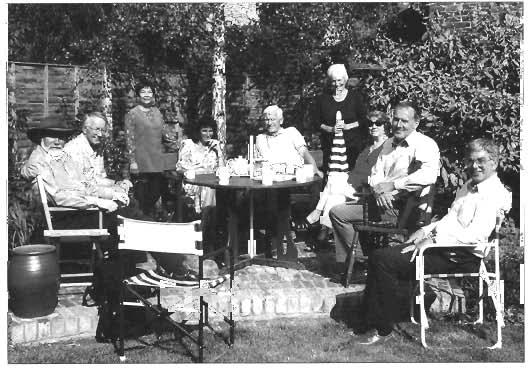
G~alramJocltman, ~bliltoI'IL~I,ol!d 'Ihrry 127ri11,I// l11r /!OIIII, of Hug11 II?L(/ Jean ,~eill'(ni~Roy) In Srf~trrr~hcr2000. >\l1 7r1errttudrnlc of Hug11 7rul~rnhe taught maths at King:r in thr (~arl~.s~xl~r,~.
completed his 'A' Level exams. He left Southern Rhodesia when it became independent and went to South Africa. He married and he vanished. He could live in Melbourne just down the road from me or he could be back in England. Who kn,oun?PeterThompson is simpler. It was said that he had gone up to Cambridge but he did not. There the trail ends at present just where it began in July 1958 with Peter leaving King's and awaiting the results of his 'A' Levels. Hrian (~cmrd
fi runs a plra.surc. /o r~c~i71e a lrttmfrom Harry Ferrar last July, zohicli is print~d /LP~Pmow or lrs,s 'as .sc.nt'. Many, like me, will have good m~rnori~s if him; n'nd wne thin,g I do remrm/~errue11 is his sensr of (dry) Au,moz~r- 711J~ichhns not gone cc?r~a~!MJ. P
This is to say thank you for your letter, addressed to me as an Hon OV, and for being so enterprising about getting staff to Reunions. ('Come back, Sir, all is forgiven!'). I can't complain - I have, if anything, been overwhelmed by expressions of gratitude that I didn't realise I had earnt. Although I have had other happy teaching experiences, I relt my years at King's (46-68, in the vintage Direct Grant era) were the 'real thing'. The world is dotted with former pupils for whom the King's School was the fo~lndationof considerable achievement, sometimes from a low start-line.
I see the Guest Speaker was Director of the Prison Service; was Richard Tilt a boarder by any chance. ..?
After my flight to London, I went to stay with Keith Derrett in Worcester. Af'ter a day or two I visited John Bayliss and we returned to the Holliday problem. John decided to 'phone a friend who had once been a good friend of Diane Baxter's. On Thursday morning, tbrty-eight hours before our magnificent party, I 1n;lde my Ihurth 'phone call on the problem, this time to a lady ill Pershore. ,Tanet had once been married to Warner Baxter and she would surely know where the parties were now. She was very helpful: Paul was in Sydney(!), Diane had died about fifteen years ago and as for Neil On her advice, I telephoned Leicestershire and spoke to a woman who had married Diane's second husband, after the death of Diane. Half an hour later I had found Neil, alive, well and living in Dymock in Herefordshire just twenty-two miles from Worcester! He had been at that address for only five weeks. And, yes, Neil dropped everything and came to the Reunion making many of us happy and helping to secure a wonderful week-end which we will probably repeat before another fifty years have rolled away. The shorter stories are of Pat Hayden and Peter Thompson. I know that 5893 Patrick Hayden late of the British South Africa Police went to Southern Rhodesia in 1958 after he s~~ccessf~~lly
Sadly I have to say that at 86 I am not really able to make the journey to the Reunion, and more conclusively my wife is very ill and I co~~ldnot leave her. But if you can find time to give my greetings to those who may remember me, that would be nice. Harry Ikrar

R.D. Gibson (S 8494): Robert's tragic death was reported in the 1999 Vigornian. Hc died shortly after sitting his final exams at Southampton Institute (whose degrees are validated by Nottingham Trent University) in June 1999. The information was not to hand then, but we know now that Robert was posthumously awarded a First in Fine Art. His sister, Joanna (S 94-96), also a Fine Art student, bravely went to the Awards Ceremony in November 1999 to accept the degree on his behalf.
R.J. Griffiths (S 87-97): Richard has followed up his First in History from Durham (reported last year) with a Commendation in his Post Graduate Diploma in Law at Chester College of Law, where he continues to study.
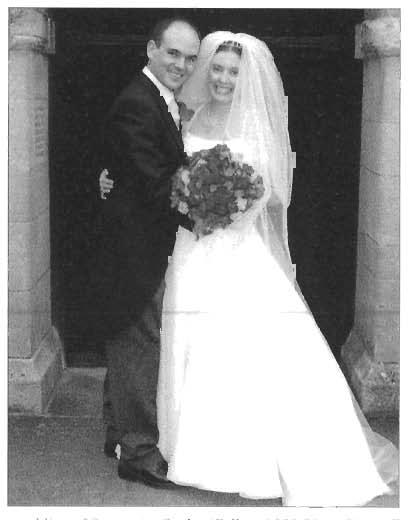
B.L. Rolle-Rowan (S 93-98): Brenclan was awarded a Scholarship by St. Hugh's College, Oxford for a First in Part 1 of his Moderation examinations.
J. Roslington (Cr 85-95): James gained a Distinction (i.e. a First) in his M.Phi1. in History from Trinity College, Cambridge.
P.J.R. Turner (0 8494): Philip has followed the First in Architectural Studies he obtained from Newcastle with a Distinction in his Dip Arch from U.C.L. He is working in Lmndon.
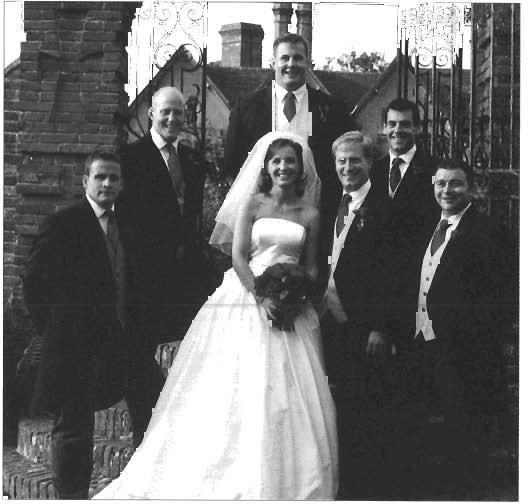
were Richard Tomlinson (Cl 83-90), Jon Lumsdon (K 83-90), Mark Richards (R 83-90), David Merlin (S 83-90), Stuart Conyers (B 83-90) and Tom Preston (H 82-87').
J.D. Parker (0 89-94) Jonathan married Siima Kipnis of Tallinn, Estonia in MTorcesterCathedral on l l th August 2000, followed hy a reception at the Chateau Impney. Robert Janes (Cr 90-95) was Best Man and Christopher J. Parker (K 90-95) was an usher; OVs at the Reception included Chris James (089-94),Simon Russell (089-94), Michael Brown (Cl 89-94), Alex Thomas (C1 89-94), Richard Mettrick (K 89-94) and Gary Murphy (Cr 89-94).

Ashley P. Fox (K 80-87): to Ashley and lulia a son, William David, born at home on 30th July 2001 and weighing 81b l loz. Mother and son are both fine. ash1ey.fox@directli11e.com
Kate E. Ogden (CO 81-83): to Kate Mythen a son, Tom Nicholas in February 2000; a brother for Patrick, Charlotte and Alice. Kate lives in 1,ondon and is a school governor.
Sally V. Ogden (CO 8486): to Sally a daughter, Katrina Lucy in March 2000; a sister for Harriet (4) and Giles (2). Sally lives in Bridgnorth, works part-time and is a J.P. Maintains her OV contacts and en.joys keeping up with news.
M.J. Taylor (Cl 63-73): to Mike and Julie a daughter Eleanor Louise, at Reading on 11th November 2000; a sister for Alexander (3). mike-taylor-mjt@yahoo.com
P.D.C. Vyvyan-Robinson (S 7476): to Peter and Lizzie a son Henry (Harry) Dirom Courtenay on 6th June 2001 in London. pvr@glohalnet.co.uk

Samantha Butler (CO90-92) to Simon Fisher on 7th April 2001 at St. Michael's, Sunninghill. Sam met Michael at Swansea University. Guests included Sarah Ford (CO 90-92), Rebecca Garrod (CO91-93), Jon Henderson (H 85-92), Dan Hickey (H 85-92) and Peter Suggitt (H 85-92). Sam is a geneticist in the NHS and Simon is a deputy headmaster; they live in Harrow. sbutler@hgmp.mrc.ac.uk
Martin J. Campbell (C1 83-90) Married Kate Miller on 16th September 2000 at Hampton-in-Arden, at a very well attended OV wedding. Best man was Aidan Thompson (C183-90), ushers

The followzng deaths Izave brrn reported to thr CIZLOzn ihr last ymr:
J.A.W. Nott (DB 20-25) R.M.S. Dob\on (S 35-39)
G.B. Greenfield (N 20-26) V.J. Wrigley (Hon OV 38-40)
F.H. Yarnold (DB 23-30) G.E. Malsom (DB 35-41)
J.E.A. King (DB 22-31) T. Gwynn-Jones (DB 46-48)
C.A. Hartill (N 26-32) D.T. Tudge (C1 4452)
R.J.R.B. Maitland (S 29-32) A.J.T. Perigo (Ch 48-54)
R.J.W. Bryer (DB 26-33) P. Moody (S 51-58)
S.M. Lock (H 35-38) W. Thomas (Hon OV 47-79)
F.H. Yarnold. Freddy Yarnold died in Puerto de la Cruzwhere he had lived for many years - on 8th December 2000. After being Head Boy at King's Freddy went up to Oxford with a Scholarship and graduated with a Double First in Classics. Following university hejoined the Civil Service and was posted to Burma as a Deputy Commissioner. He was in the Far East when Japan entered the War; for his success in evacuating many Rritish citizens, and frustrating other Japanese objectives, he was awarded the MBE at the end of the War. Back in England he became Bursar of the Merchant Taylors' School in Liverpool, and then a similar post in Freetown, Sierra Leone. His association with All Saints Church in Tenerife covered more than thirty years, and he did much, as President, to raise its profile within the community to one of importance. He was laid to rest, in the English Cemetery alongside Dorothy, his wife who died in August 1998. /7Fnmjie NPWS]
J.E.A. King, O.B.E. 'Peter' King died suddenly on 1st August 2000 after a fall. He always spoke of his time at the School
with warmth, and I think, some pride. At King's he took music, under the wing of Edgar Day, and regularly played piano at morning assembly; his contact with Day (for whom he had great respect and affection) continued until Day's death. Peter was awarded a King's Scholarship, and that was important as his father was not wealthy. Snobbishness was not unheard of in the School and one master (who shall remain nameless) remarked in class: 'King's father is a commercial traveller - and you can't get much lower than that.' But there was also kindness and Peter recalled being carried all the way to the train station for the journey home after breaking his ankle.
His career was in the iron and steel industry and he rose to Personnel Director, British Steel Corporation, Corby (62-67) and then Head of Management Appointments and Development at B.Sc. [HQ] (67-73). In 1972 he was awarded an O.B.E. in recognition of his achievement in raising money for a purpose built Youth Centre in Corby, a facility badly needed in the town at the time. Peter's marriage to his wife Jean was recorded in the 1996 Vigornian, and her help in his time of failing eyesight enabled him to continue taking the Vigornian and to enjoy learning of continuing developments at his old School. [Mrs. Jmn King - widow]
C.A. Hartill. Clement Hartill pursued a career in banking, and was lost to the OV Club for many years. After retirement he 'rediscovered' the Club and for the remainder of his life subscribed to the Vigornian and took a close interest in the developing life of his old School. M1J.P
R.J.R.B. Maitland, G.M. James Maitland was born in 1915 and attended King's, where he was captain of rugby, before reading Law at Brasenose College, Oxford. He started out on a career in the oil industry (in Czalifornia), but when war was declared he enlisted and was commissioned into the Royal Engineers. He trained and worked in bomb disposal, one of the more dangerous military activities and displayed outstanding courage in this duty; he came very close to death on at least two occasions. He was awarded the George Medal, by King George V1 at Buckingham Palace for: 'Conspicuorls gallantry in carrying out hazardous work in a very brave manner.' He was then scconded to Whitehall for a time, but returned to bomb disposal on the beaches of Normandy after the D-Day landings. He ended his war service in ELgyptwith the rank of major. After the war he returned to Kern Oil in California and then moved on to manage the company's interests in Trinidad, where he spent ten years. He eventually returned to London, still within the oil industry for the remainder of his working life. Jim Maitland took early retirement and moved to Dartmouth, where he could indulge in his great interest - sailing; he did so until he was in his eighties and kept up his interest in rugby. He married his wife Vivien in 1941 and they had a daughter. James Maitland left a bequest to the School in his will, which was gratef~~lly received. [Daily Telegraph]
R.J.W. Bryer, T.D. Ronald Brycr headed the well-known Malvern building firm of Thomas Broad for many years, succeeding his father as M.D. He was greatly respected in the industry and known to be a demanding boss, but also a very fair employer. He had a particular interest in historical buildings and took pride in their sympathetic restoration. He trained as a builder and surveyor in Bristol after King's, but that career was interrupted by military service in World War 11. After the war he was a member of the Territorial Army and received the Territorial Distinction. He joined Broads in 1950, and retired (officially) in 1987. Ronald read for an extra mural degree in languages from London University as a young man, and followed that with an M.Phil; he then studied for a degree in Theology. Never a man to remain idle, he used skills developed in his studies for these degrees to work on the
translation (from mediaeval Latin) of the Statutes of Worcester and Hereford cathedrals, and wrote a history of Malvern Priory. He married Retty Rawlinson in 1942, and they had a son, David, also an OV. Ronald devoted most of the last years of his life to caring for his wife, and died shortly after her at the age of eighty-four. (Malvm Gazette)
S.M. Lock. Sam Lock joined Hostel House in 1935 as a King's Scholar atid became Head of House. During the war he was involved with bomb disposal and then railway building. After the war he obtained a London degree in Modern Languages and pursued a career as a teacher. He died at home (Doncaster) in November 2000 after a long illness, leaving a wife, son (also an OV) and granddaughter. lJohn Reynolds and Mike Lavender]
R.M.S. Dobson. Michael Dobso~iarrived at King's in 1935 with a King's Scholarship, and not only excelled academically, but represented the School as a member of the 1st XV and 1st XI. His interest in the School continued throughout, but his final years were marred by Parkinson's, from which he died on 7th February 2001. He is remembered for his quiet diligence in all he did. [John Rqnolds]
V.J. ~riile~.V& Wn'glq ltrrote to the Hon Sec in response to an invitation to attend the 2001 Reunion. As things turned out, he zuas runtzng only a matter of days before hzs unexpected but peaceful death at hon~ezn Salzshr) on Auguct 2nd at thp age of agizty-jue That letter 7s tet out belozu, as an afiprenatzon: he nrnved at Kzng's as a young man, and stayedfor a thort tzme only (he moved on to pnjoy considembl succexs as a tmchm ~lsauhrre),but his affection for the School .stayed ruith him for the rc.nrain,drrof his long life. M.JP
How very good it was of the OV Club to invite me to the Reunion. I did enjoy coming in 1990 (was it?) when there was a special effort to remember the Criccieth year. On arrival at King's I had to learn very quickly, but at the time there were very few boys in the School - 155 when in Worcester and only 90 at Criccieth. Of the staff then I think most are dead, though I hear my predecessor, CM Meade-King still lives a rather reclusive life down in Devon; he will be eightyeight next month
You might be amused to know of' the conditions of my appointment at KSW: salary - £200 per annum, but resident in School House, which involved taking prayers am and pm, issuing pocket moncy, caning (!), being in evenings when Wilding (H.M.) was out and taking charge of rugger. I taught History, French and German and eventually took over the OTC (C.C.EJ. When appointed I told Wilding I knew no German, but he said, 'it's only time and you have until September.' Fortunately I was able to call on the help of a German Assistant during my last few months in a supply post at Cranleigh. I had to teach 1st and 2nd year German, supervise a student teacher and deal with a Schools Inspection. I even took PE in the <gym on occasion, and helped with debating and drama too. However, I mustn't bore you with my reminiscences: in any case I have deposited some in the Archive. I enjoyed my time at King's T. Gwynn-Jones. Terry GwynnTJonesdied on March 28th 2001, in Brisbane Australia, after a long battle with cancer. Born in Malvern he attended, along with his two brothers, the Hill School and then King's. He joined the Malvern C;axtte, but soon opted for a career in his great interest - flying. He served with the R.A.F., R.C.A.F. and R.A.A.F. In 1969 he joined the Dept of Aviation in Brisbane as an Examiner of Airmen with responsibility for all Queensland. In 1975 he teamed up with Denys Dalton to set a 'round the world' speed record for piston engined aircraft and in 1983 was a member of the Australian team which won the World Ballooning Championship in France, an event celebrating 200 years of flight. He was also a respected aviation and travel writer. In recognition of his achievements the Smithsonian Air and Space Museum
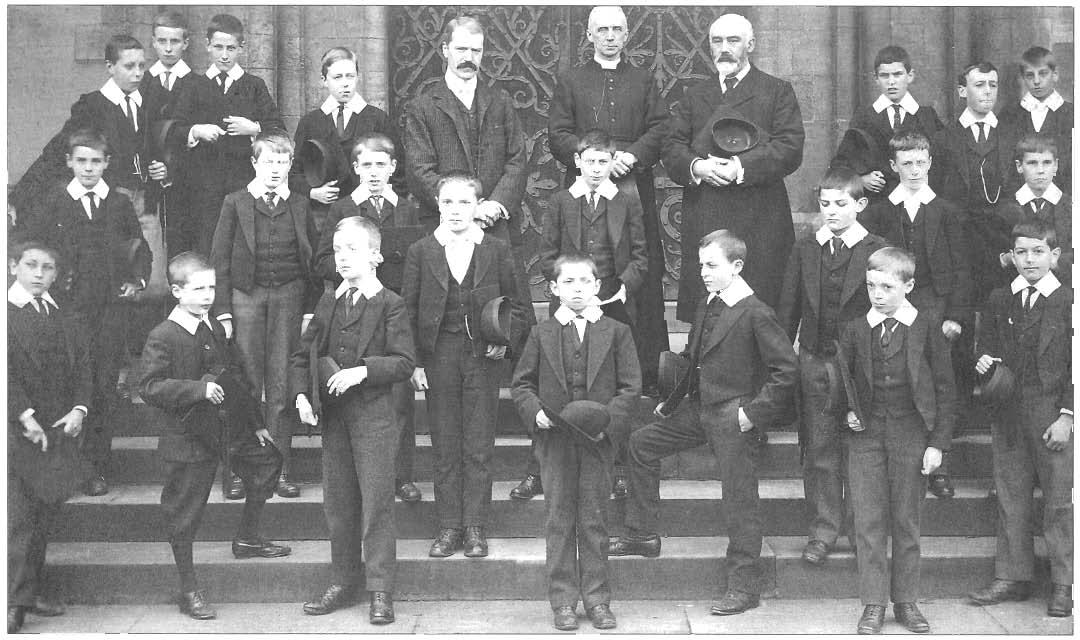
(Washington, D.C.) granted him a Visiting Fellowship in the Peter never talked much about his school days. The boys and 1980s. He is survived by his wife and three sons. later the grandchildren would love to find out what Peter had [Malvern Gazette] got up to in his time. Do you think there may be others who D.E.G. Thomas. Geoffrrey 's untimely death was reported in the 1997 would like to stop off here? Could be fun. Hope that after all Vigornian. We have now an appreciation of his lififrom his widow, the preparations the reunion will live up to its promises and exPamela, who was at the 2001 Reunion Weekend. MJP pectations. I went to a thirtieth of my school, it was wonderful!! GeoffreyThomas left King's in July 1966 and took up articles Didn't recognise everyone, which was a little embarrassing. with Donaldsons in London. He became an Associate of the Nametags could be the answer - then you can get away with the Royal Institute of Chartered Surveyors (ARICS) in 1970. customary 'you haven't changed at all'. Brigtte Moody Eventually he formed his own property company with another W. Thomas. The death occurred in October 2001 of Mr. surveyor in 1982/3. In 1990 he was made a FRICS. He met W. Thomas, who will be widely remembered as a master at the Pamela (ex St. Mary's Convent) through the Sixth Form School from 1947 to 1979, and especially as Master-in-Charge Society and Film Club and they were married in 1972. David of the Junior School and Housemaster of St. Alban's House Hooper was best man. They had three children, Emma, from 1955 to 1975. Since Mr. Thomas's death took place after Catherine and James. He had many interests, one of which was the end of the academic year 2000-2001, which is the proper an annual pilgrimage to Le Mans. He was also interested in sphere of this issue of The Vigornian, it is fitting that an travelling: this came about as a result of his involvement with obituary notice commemorating his life and career should Kensington Round Table, where he met a great number of appear next year. international visitors. He was ill for a comparatively short time, and died at the age of 49, only two months short of his Silver wedding. His brother, Christopher S. Thomas is also an OV. [Pamela Thomas - wido7uJ
P. Moody. Brian Gerrard's search for his contemporaries did, inevitably, turn up the sad fact that some of them had died. One of those was Peter Moody - a career soldier - and his widow Brigztte kindly supplied the words below to Brian so that old friends would know something of his life. MJP
Peter married Brigitte Reichel in Germany in 1965 and there are two sons who were born in 1966 and 1967. Peter was commissioned into the Cheshire Regiment after National Service and served in the Forces including several tours to Northern Ireland and the Gulf War until 1994. He then worked as Retired Officer at the divisional HQ in Shrewsbury until his untimely death from cancer in March 2000. He was well liked and known for his sense of humour and his eye for the absurd and the ridiculous. I'll be in Devon the week of the Worcester do for the arrival of the second grandchild. It will be delivered on September 19th by Caesarean, hence the set date.

Paul Aldridge (W 85-92) Paul graduated with a degree in Geography and then moved into management, obtaining a Post Graduate Diploma in Management from Templeton College, Oxford. He is now General manager for the AlFuttaim Group operating in the Lower Gulf region. He lives in Dubai. Paldridge@Bigfoot.com
H. Allsopp (Ca 4G54) Harry ended his career, in 1991, as Principal Officer, Higher and Further Education for Kent County Council. Retired, he now lives in Bewdley.
%chard Bacon (B 70-80) Richard held the ~orfolkSouth seat for the Conservatives in last summer's General Election with a healthy majority. He is now an MP, a fitting job for a graduate of LSE in Politics and Economics!
J.R. Baker (S 71-76) The first two issues of Connect have aroused Julian's interest in King's and prompted him to renew his subscription to the Vigornian. He lives in Dudley and can be contacted on jbakert3bradfieldcolIege.0rg.uk
John Baldwin (Ca 48-58) Married Christine Hudson inl9(53 and had three children. Qualified as a Chartered Accountant in 1965 and then moved from 1,eicestershit-e to Hereford. Has remained with the well-known Hereford firm of Chartered Accountants, Thorne Widgery, at first as an employee and now as a partner. Main interests are bridge and shooting.
Miles Banberry (H 82-90) Re-discovered the OV Club via the Internet and sent us some news in early 2001: 'I graduated M.A. from Kent in Mediaeval and Tudor Studies but have stayed on at Canterbury as University Web Editor responsible for all aspects of electronic communication. I live in Canterbury. miles@blackgriffin.freeserve.co.uk
A.D. Bolland O.B.E. (S 32-37) David sends best wishes to John Reynolds and anyone else who remembers him. He lives in Brent Knoll, Somerset. 01278 760465. Andrew W. Brooker-Carey (Ch 65-75) His new interior design shop Star Yard opened in Droitwich High Street in summer 2001. His phone number is 01905 772276
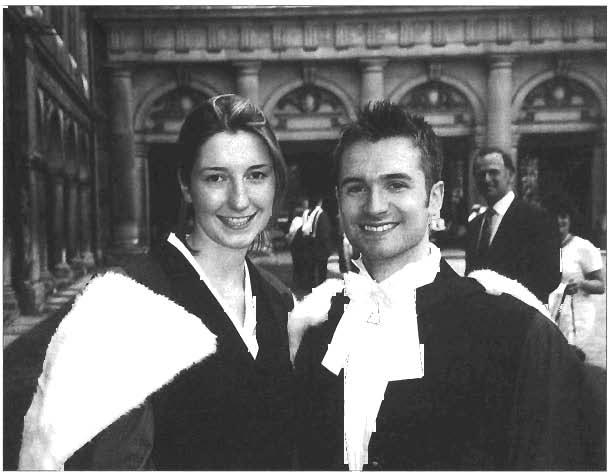
Elton Brown (C1 51-56) Became a mechanical engiileer. Married in 1962 and had one daughter but marriage ended in 1970. Lived in Bristol from 1962-74. Continued part time study and qualified in fuel technology and worked as a sales engineer selling mechanical equipment to the oil and gas industry in the South West of England. Married Louise, a physiotherapist, in 1974 and left for a new life in Western Australia. We have two children, a son and a daughter. 1981 became General Manager of a steel roll-forming Company, until 1999. We are now both retired and living in Perth, Western Australia.
Dr. M.E Buck (U' 57-66) Now runs his own IT company, Concentrika Ltd. In an e-mail letter to the Hon Sec, on 30th December 2000 he writes: 'It's a stunning day here in Cardiff, has snowed about an inch and looks like a picture postcard. Life is so packed I find it difficult to give social and business the correct balance. Actually I have Failed abysmally. In a way I do envy those of my school associates who have retired. But I enjoy the technology I make a living out of and will probably be carried off in my dotage clutching a mouse or some other handy peripheral. Best wishes for the coming year.' Espiritulibro@aol.com
Martin Bundred (Ca 71-77) Lives in Arcadia, South Africa, and wor-ks for Africon Engineering based in Pretoria. He is currently project managing the electrification of deep rural villages towards the Botswana border. He is married and has a son, Zaci (8). Agnes, his wife, runs her own company Creative Works. They are active members of their local church and involved in spreading the Christian gospel. 'If you should publish this information, please convey my fondest wishes to all my old class mates and fellow boarders from way back then.' martinhaaft-icon.co.za
J.E. Burfield (0 81-88) Has moved and his contact address is now in Cork, Eire jebl@gofree.indigo.ie G. Burrows (Cr 43-51) In spite of mobility problems, and the need to follow a strict dietary regime because of diabetes, Geoff did intend to come to the 2001 Reunion, but had to cancel those plans when he contracted an infection. He has dismissed this as one of those inevitable problems of old age, and looks forward hopefiilly to the next Reunion. He continues to keep a close eye on the School's achievements in sport.
Steve Cammell (Cl 51-59) Married 1969 to Elizabeth Barry from Sevenoaks, Kent - three children. 1959-63 1,oncIon University, BSc Agriculture. 1963-70 Farm Management in Worcs. 1970-92 Agricultural Research Scientist with the Agriculture and Food Research Council at Grassland Research
Institute in Berkshire. 1992-2001 Agricultural Research at University of Reading. Retired from full time employment in 2001, now in part time consultancy. Elizabeth, deputy Head Teacher in primary school, retired. We now live in Pembrokeshire. Main family interests: sailing; old MGBs; countryside activities.
Martin J. Campbell (C1 83-90) Is Deputy Underwriter of a Lloyd's I~ls~~ra~lceMarket Syndicate and lives in St. Margal-et's, near Richmond. He married Kate Miller on 16th September, 2000 and apologises for choosing the date of the 10th anniversary OV Dinner for his wedding, 'which probably caused a few gaps in the seating in College Hall.' [S~PMarriages].
S.M. Colston (H 73-82) Receipt of the first issue of Connect, featuring his old House - and which he found very interesting - prompted Simon to get in touch with new address details. At the time of contact he was just back from a short week singing in France. He is a director of' an IT company, which specialises in Lotus/IBM ware, based in London. He lives in Codicote, Herts and can be reached on simon.colston@lloydmckenzie.com
David H. Cotton (S 48-59) Known to all as Ntrk. 1959-65 Chemistry at Worcester College, Oxford. 1965-72 Research then marketing with Shell. 1972-75 Own Central Heating Company. 1975-2001 Management and marketing consultant Lived in Chester 1965-69 and Dulwich (South East London) since then, except for three years in Nigeria, 1977-80. Married to Gail (teacher, journalist and counsellor) since 1965. b7e have two sons ~'110were also at King's - Patrick Cotton (Ch 7684) and Dominic Cotton (S 76-83).
E.B. Cunningham (Cr 53-62) Bruce was with Grand Metropolitan for twenty years, ending up in charge of various companies within their Brewing and Retailing Division. He now works for the Probation Service in the Thames Valley running programmes for violent offenders and delivering Home Office training programmes. forty years on he is still in regular touch with John Pickup (Cl 53-62) - a dentist on Hayling Island - and David Morris (S 53-62) - a Senior Recruitment Consultant, living near Newbury.
Malcolm Day (Ch 49-58) Player of chess, cricket and fivesyounger brother of Chris Day. Joined Lloyds Bank it1 1958 and worked in various branches and HQ before retiring as manager of Wimborne branch in 1994. Married.Janet Hibberd from Bournemouth September 1963; we have two children




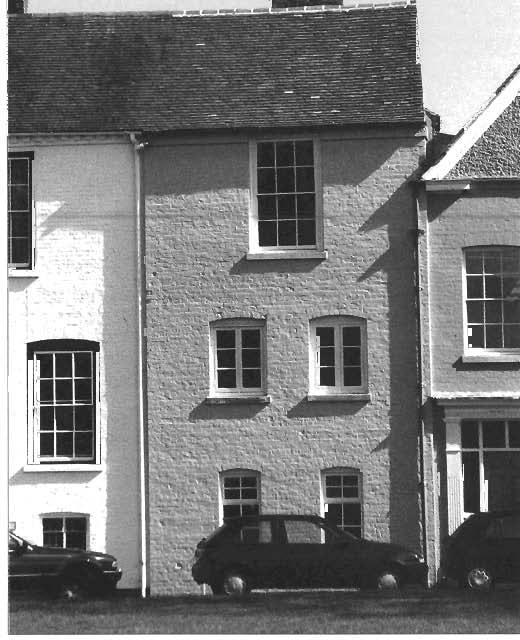
and five grandchildren aged from one to twelve years old, and have lived near Bournemouth for seventeen years. Both active in Rotary: Malcolm was a District Governor in 1997-98, and Janet was the UK National President of Inner Wheel in 20002001. Other interests include wine, investments, genealogy and travel.
Keith Derrett (C1 51-56) Married to Janet Wintle in March 1962 and has two sons and two grandchildren. 1956-62 various jobs of no importance! 1963Joined Kay and CO, a major mailorder company based in Worcester as Assistant Buyer. 19632001 various progressions within the group: Buying Manager, Group Buying Manager, and ultimately Director of Great Universal Stores, Portugal. Becarne Aclirig General Manager and finally Marketing Manager for the Kays International Division. 2001, retired in March. Have been a widower since 1996, and still living in Worcester. Hobbies: most sports, especially golf and rugby; travelling.
Michael R Dudley (C1 51-59) From King's went to College in Chelsea (1960-63) - qualified as a teacher (Science) but never taught. Many jobs ranging from dustman to computer salesman after working as a night watchman at IBM. Joined Honeywell becoming their top salesman world-wide in 1971. Was founder/director of Comcap Plc computer leasing in 1978, which was fully listed in 1984. Sold out and retired. Hobbies - a poor skier but a good shot and still a Chelsea FC fan. Married Marilyn (also a teacher) in 1965 and our sons, Andrew (35) and Sirnon (30) were boarders in Hostel. Not bad for St. Stephen's Junior School and Lower Remove C!!!
Christopher H Eames (H 5460) 1960-63 and again 65-66: Merton College, Oxford. B.A. in Modern History and a Dip.Ed. 1966-73:Assistant History Master first at Bolton School and then at Dulwich College. 1973-74: Head of History at Valley Comprehensive School, Worksop, Notts. 197497: Head of History and Arts 6th Form - Bolton School and retired. Married in 1968 to Jennifer Rogers of Manchester and we have two children. Jennifer - Secondary School Modern Languages
teacher, now retired; we continue to live in Bolton. Interestsreading, the theatre and voluntary work.
Gerry Eastham (Cr 51-58) 1962 married Norma Hagard (Worcester GGS), two children, four grandchildren; divorced 1997. 1958-68 Esso Petroleum; including BSc. Mechanical Engineering then project management and construction around the UK. 1968 - 1997 Imperial Chemical Industries; engineering, construction, maintenance of process plants, UK and overseas. 1998 'retired', set up Eastham Enterprises L,td, management and engineering consultancy serving the process and construction industries. 1998 married Ruth ~oberts, teacher (now retired), and acquired two step daughters, two additional grandchildren and counting. Contentedly living a stereotypical life (two Labradors, one Volvo!) in North Yorkshire. Interests: walking, gardening, land management, conservation, shooting, sailing, fishing.
David J English (C1 49-59) 1959-62 Leeds University, B.A. German with French; 62-63 Leeds Public Libraries and then University College, London for a Post Grad Diploma in Librarianship before returning to Leeds as Assistant Librarian, University of Leeds (6473). 1973-97 University of Salford as Sub-Librarian, Deputy Librarian, Acting Librarian, Deputy/ Acting Director of Academic Services (merged Computing and Library service). 1998 Librarian, Goethe Institut Manchester. Now retired but do some freelancing. Married to Carole Moody from Leeds, two children, two grandchildren. Carole is formerly Library Assistant, more recently in health services as medical receptionist, now working part-time. Interests: doting grandparents, golf, family history, walking.
C.M. Eyre (W 51-63) Clive's interest in old coins started way back at King's with the purchase of two George I11 coins from a classmate in Upper N.In those days there were many dusty old antique shops in Sidbury, all with at least a few old coins for sale, and he spent many a lunch hour looking over what was on offer. The interest became a business in 1972, and Byzantium Numismatists was born, covering the art and coinage of all early civilisations, but specialising in the Roman Empire. Interest and demand from the public is ever growing, fuelled in part by historical documentaries on television and even by films such as Gladiator. Clive now appreciates how fortunate he was to study Latin and Classical studies to A Level, under the critical and unforgiving eye of 'Aristotle' Franklin!
James Fawcett (S 85-94 ) 'I've given in to the temptation of the south of France which I experienced whilst studying here, and now I have a permanent job in Toulouse. I'm working for Airbus, in the flight test department, helping to ensure that our aircraft are safe for the paying public to use. Since I left Southampton University in 1999, I've walked from John 0'~roats-toLand's End, raising £4000, and got myself engaged - my wedding to d [yes, a single lower-case 'd'!], whom I met at university, is due for September 2002. Only time will tell whether this or 1200 miles on foot will be more challenging! Feel free to contact me on jim.fawcett@baesystems.comthere's always room for someone to stay in 'la ville rose'.'
K.A. Fielding (W 61-68) 'I am currently working as a software engineer for Weir Systems in Solihull. The OV Database seems a great idea, and I hope we will soon see more members supplying e-mail addresses.' keithf@gaast,demon.co.uk and kfieldingaweir-systems.co.uk He lives in Worcester.
Ashley Fox (K 80-87) Ashley stood as the Conservative candidate for Bath in the general election on 7th June. Although defeated by Don Foster, the sitting Liberal Democrat member, Ashley thoroughly enjoyed the experience. He hopes to stand for Parliament again, though in a rather more Conservative constituency. [See Births].
Mike Gardner (Cr 49-56) Boring or what! - Since school I have worked for the family firm growing various vegetables on our small farm in Wadborough, ~orcestershire.I married Teresa

in 1964 and we have three grown up children: one boy and two girls. We both have varied interests ce~ltrecl around our community: Teresa is the Pirton Church Warden and on various committees; I have been on our local Parish Council for thirty-five years and have been the Chairman during the last ten years. One weakness: I support Southampton Football Club!
Brian N Gerrard (C1 51-59) Left King's July 17th 1959. Married Jill Andrews of Peopleton in 1960 - two children. Divorced. Married Sue Michell, Melbourne 1978 - one son; separated. Partnered by Judy Boyle since 1997. BSc Hons in Biochemistry, Sheffield University 1963; Member Australian Association of Clinical Biochemists 1970: PhD in Eighteenth-Century Bibligraphy, Mu~lash U~liversity 1993. Fermentation biochernist/management trainee Pfizer, Sandwich, Kent 1963; Lecturer Roseworthy Agricultural College, South Australia, 196465; Clinical Senior Biochemist, Toowoomba, Queensland and Bendigo, Victoria 1966-69; Sales Representative Sales Manager, Technicon Equipment 1970-78 (covering Pakistan to Taiwan to Tallid and Perth); General Manager Medishield (British Oxygen) 1979-80; Bibliographer Monash University 1981-98: Development Manager Melboul-ne Grammar School 1998-2000. Main interests: eighteenth-century books; extreme xerophytic cacti.
[Rnan forgot to mentzon amongrt hzs lzst of nch~roem~ntrabove, that of Reunzon Con~~enorExtrrcordlnacre! M / P]
Rosalid Goodrich (CO 82-84) Still l~vingin I,ondon, but has moved recently, and hopes 'that is it for the next few years.' She is Communications manager at the Institute for Development Studies, Sussex. rosalind-goodrich@yahoo.co.uk
M.W. Harper (C1 55-64) continues to oversee the finances for Residential Homes for People with Learning Disabilities in Staffordshire. Michael was surprised and pleased to meet up with a fellow OV this summer, in Sardinia - Brian Jones (S 4858), now retired from Shell UK.
P.A. Harris (K 79-88) Philip likes to remain in touch with his old School and old school friends, but is presently very mobile and difficult to reach. For contact purposes he is best reached C/O Dr. and Mrs. PV Loncharich, 15 St. Mary's Lane, Burghill, Hereford HR4 7QL.
P.F. Hewitt (Ch 60-69) Peter is Director, Junior Dept, Royal College of Music. He can be e-mailed at home or work: peterf.hewitt@virgin.net and phewitt@rcm.ac.uk
Daniel Hickey (H 85-92) Lives in Maida Vale, London. He is a Business Analyst with the large investment bank Merrill Lynch, looking after equities for UK, Europe and the Middle East. http://www.Bigfoot.com/-daniel-hickey Alistair Hill (Ch 80-85) [Alzstnir's naus for the Vigorninn missed last year's prinl dradline ly only one day; it is printed below, anxi h,opef~~lly it is still c-u~-rrnt!M,/.I?]
'I graduated from Salford in 1988 with a degree in Electronics and then worked for GEC-Marconi for six years. In 1994 I moved to Alcatel (Greenwich) and work 011 transmission equipment for very long haul optical communications systems; I am a systems designer. I have not been able to shake off the rowing bug (instilled by T.E.W. and others) and am still an enthusiastic participa~~t - with \.arying degrees of success alistair.hillOasn.alcatel.co.uk
R.P. Hobson (Ca 76-82) '1 am married to Emma, a clinical geneticist, with two children, Alice (4) ancl James (2). Although a medical microbiologist by training I am currently working on the interaction of Cnndidn Alhirnns (a fungus) and macrophages (white blood cells) as a Clinical ~esear~hFellow at Aberdeen University.' r.p.hobson@abdn.ac.uk [Richard is vq highly quali$ed - he is a MRBS, MRCe MRC Path. He puts his success in these fields down to Bob Mum, who first fired his ~. enthusiasm for biol~~gy]
N.H. Holden (S 50-58) Came over to the UK in Oct/Nov 2000. His trip included a tour of the School and the Archive per favour of Caroline Roslingon, and a weekend with David
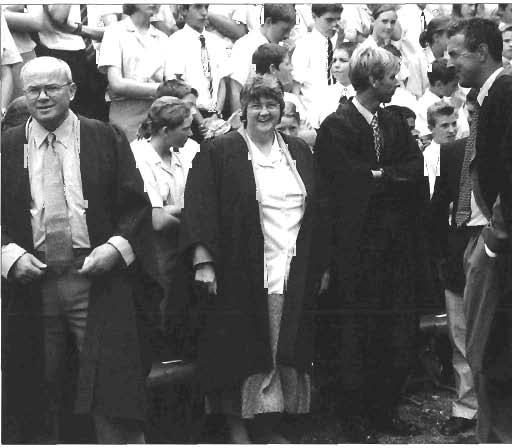
Gregory (S 50-58) in Denston, Newmarket. Norman was able to give Brim Gerrard considerable help in finding lost OVs for the fifty year reunion, but could not attend himself. 'If I had known about it earlier (last year) I would have postponed last year's trip till this year to incorporate this special reunion.' Norman lives in Masterton, New Zealand.
Kirsty Johnson (W 91-96) 'After two years at Goldsmith's reading French and Spanish I am going abroad for a year as part of my degree. In August 2001 I shall be going to Mexico to do voluntary work for Teaching and Projects Abroad which involves three different placements. In January I return for a whistle stop visit home before moving on to Togo. West Africa, to teach for five months. It will be an exciting and challenging year! '
Brian Jones (S 49-58) 1958-62 Wadham College Oxford, MA Forestry, Boxing Blue. 1962-68 Northern Rhodesia (became Zambia in 64) Forestry Dept, Research Division. Played Rugby for Zambia. 1968-69 Research Scientist, Forestry Canada/ Alberta, Yukon and NW Territories. 1970-80 Forestry Consultant, Forestry International I,td, Vancouver, Canada; resident spells in T~~rkey,Liberia, Nepal and Portugal. Took out Canadian citizenship and maintain base there. 1980-01 Shell International Petroleum Ltd, CEO Shell Forestry Ltd, comprising investments in Australasia, Africa and Latin America. July 2001- Retired, West Dulwich London, playing tennidsquash and gardening. Maintaining only one Company Directorship plus Membership of the Oxford University Advisory Ctee on Forestry. Married 1979 to Pamela Pellew from Lustleigh, Devon, offspring - Emily (20) and Edward (17).
Peter Jones (Cr 49-58) 1959-62 St. John's College, Cambridge MA in Modern Languages. Entire career in international insurance and reinsurance, 62-65 in London, 69 to present in Bermuda - still employed! Started in London as a reinsurance broker, then a reinsurance underwriter for American International Group in Bermuda. Had a couple of years with Exxon Corp before becoming head of the Zurich Insurance Group's Bermuda subsidiary. For the past nine years have worked for Aon Corp, a very large American broking group, managing a large- number of 'captive' insurance companies. Interests: squash, scuba diving, bridge, foreign travel. 1974 married Marian Jessey from Fareham, Hampshire two stepchildren: Stuart, aged thirty-four and Claire, aged thirty-one. Simon Judd (B 8491) In March 2001 Simon e-mailed this message to John Roslington: 'Glad to hear you're still at King's - I haven't been back in nearly ten years, but hope to make it to the Reunion Dinner this autumn, and see some familiar faces.' [He dzd make it! Ed]. Simon completed a Ph.D. in Computational Visual Neuroscience at Sussex. While there
he trained as a scuba diving instructor and took up yacht racing, entering the Fastnet Race. He works for Equisys plc, a software company based in London sjudd@equisys.com and lives in Brighton.
John Law (B 79-84) Has moved back to Worcestershire after fifteen years away: 'A strange yet pleasant feeling.' He is living in Holt Heath, tel no 01905 620978 e-mail johnandsue.law@talk2l.com His keen interest in the School and Club continues.
J.P.B. Lee (C1 4450) Julian has embraced the modern world of IT, but still describes e-mail as 'new fangled technology'. He can be reached on julian.lee@lineone.net Having given up the Treasurer's post with his local PCC he now has time to indulge in researching family history; he visits Worcester Record Office from time to time -with varying degrees of success!
J. Lingard-Lane ((W 57-66) Spe separate Article - Ed T. Lovegove (C1 6674) Tim continues to live in Whitby, North Yorks. He describes an idyllic countryside, but complains that winters are very harsh and unforgiving if you venture out unprepared. Making up for that are the fine summers, and a L. U. variety of interesting activities for both residents and tourists to pursue. He continues to run sprints and distances, keeping up an interest he developed at school and university. He welcomes visitors - providing you let him know in advance!
Matthew Mantle (K 87-89) 'My wife and I are enjoying the quiet life in Norfolk! Having declined a post at Lotus Engineering I now work at Everett Bros, as a designer of vegetable processing machinery. MCM@ic24.net
Andrew Mis (Ch 53-57)) 1957-58 Kingston School of Art; 5861 Barclays Bank DCO, trainee manager, London; 61-68 Trinidad Lake Asphalt Company; 68-84 Millsmith Contracting Limited, road construction, in Devon; 84-91 Baring Inc, Greensboro, NC, USA; 1991 Chronic Fatigue Syndrome (known in UK as ME); 93-95 Medical Endoscopy Services, in Greensboro; 96-97 Voluntary aervice running missions in Jamaica; 98- Equip Canada, managing Retreat and Missionary Training facility on Vancouver Island, BC, Canada. Married to Julia Gilkerson from Plymouth, two children. Julia worked with WHO in Geneva, Harvey's of Bristol, and was Company Secretary of Andrew's businesses. Main interests: travel in Beautiful British Columbia, gardening, walking, mobilising missionaries.
John Moore (Ch 50-58) 1958-61 at Imperial College, London reading electronics. 1958-78 RAF Engineering Officer, served in UK, Germany and Cyprus. 1978 - now: self employed electronics design consultant, living in Fleet, Hampshire. Have worked in USA, Hongkong and China on the design of many products, including cordless 'phones, hospital equipment and battery operated lawnmower. Nearly retired - but not quite! Married Sylvia King of M'orcester Grammar School for Girls, but met at London University; one daughter who is a corporate lawyer in the City. Main interests now: bridge, astronomy, flyfishing, beagling.
P.R. Moss (S 55-60) Patrick has lived in Hong Kong since 1977 working as a Legal Aid Officer for the Govt. In 1983 he became Director of Legal Aid and head of the Dept. In 1992 he joined the Law Society of Hong Kong, and became its Secretary General in 1993. His wife is a practising barrister. He spends as much time as he can on the golf course but: 'Despite that, I am not a very good golfer!' Patrick would be very interested in a Hong Kong Reunion prmoss@attglobal.net
Hugh and Jean Neill (Hon OVs) Are approaching retirement and living in Prestwood near Great Missenden in Bucks. They moved to Buckinghamshire when Hugh was appointed as Chief Mathematics Inspector for schools in the Inner London Education Authority. When Mrs. Thatcher abolished the authority in 1990 he was made redundant and he started work writing a new A Level course funded by the Nuffield

Foundation. After that they became self-employed, and Hugh continued to write.
Jean is an active member of the Buckinghamshire Weavers, sings regularly in a local choir and also enjoys gardening and being a grandmother; Hugh is still bell-ringing, and has roped [!! -Ed]Jean in, is about to be treasurer of the local gardening club and has started to play bridge again. They enjoy walking and are about to complete all 180 miles of the Thames path. They would both like to be in touch with people from King's. Joe Newitt (C1 83-91) Attended the 2001 Reunion Dinner with a number of contemporaries to mark 'ten years on'. He lives at Flat 7, 44 Mortimer St, London, WIN 7DG. Joe is a solicitor with the firm of Linklaters in London joe.newitt@linklaters.com
Kate North (CO81-83) [See separafe article - Ed].
Jessica L. Page (C1 9499) Is now in her second year at Aberystwyth reading Drama with Film and TV Studies and presently involved in productions of the Duchess of Malfi and Jack and the Beanstalk. Jess took a gap year in which she backpacked up the east coast of Australia, visiting Singapore on the way. She has found out how small a world it can be: in Australia she met up, quite by chance, with several friends from the Worcester area (including OVs from her year! - Ollie Martin and Pete Green); she now finds that one of the girls with whom she shares a house was taught in Retford by Phi1 Rogers (B 5966), a contemporary and friend of her father's (Mike Page); and helping out during Freshers' Week recently she recognised one of the freshers as a fellow back-packer she had shared a hostel with in Cairns, Queensland. jlpO@abecac.uk
M.J. Page (Cr 60-65) On the 4th July Mike found himself back in the lecture theatre on a one day course at Holme Lacey College as a result of which he is now qualified to (wait for it) DIP SHEEP - and has a NPTC Certificate of Competence to prove it! So all that education has not been wasted Those OS you raised on the humour of' Monty Python may be reminded of the Oz Philosopher's Sketch: 'Good job my name isn't Bruce or I'd never live it dorun.' When not dipping sheep he tends to the duties of Hon Sec and is available to help any member: 01905 840580 (tel and fax) and honsec@seaford.purplenet.co.uk
He was encouraged to sign up for the course by A.P. Gale (W 56-65) who supplies some of his farming inputs. Tony stopped farming on his own account recently and returned to the agricultural supply industry; he continues to live at Bramble Lodge, Flyford Flavell. Tony's rather questionable reason for not going on the dipping course himself was that it clashed with his holidays! [As he is an old fm'end, I zuill believe him! M.J.P].
R.G. Payne (C1 61-65) Continues as Head of Computer Studies at his school in New Zealand, and Head of Physics as well. 'We now have around 200 computers in the school; the network is always expanding, but the problems also expandexponentially!' He continues to coach girls' soccer, which is growing very rapidly in popularity in NZ. He and wife Hilda have recently moved house, to a much larger one with about ten acres of land. 'We have great plans for an extensive garden, but at the mornent a local farmer leases 5 acres to graze some sheep. I don't think we will be getting into livestock ourselves. In fact I'm damned sure we won't!' They still live in Masterton. rhpaynet3xtra.co.n~
James M. Pettifer (Ca 60-67) Continues to write on the Balkans. His most recent book is The New Macedonian Qz~estion (Macmillan, 2000). He is also a feature writer and contributes occasional articles to Sean Ryan (Ch 72-77), Foreign Editor at the Sunday Times.
F. Phiiips (B 62-66) Frank works for OFTEL in London and lives in Reading with his wife Madeleine (whom he married in 1979) and children Harriet (16) and Angus (11). He admits to losing contact with most of his contemporaries, but was
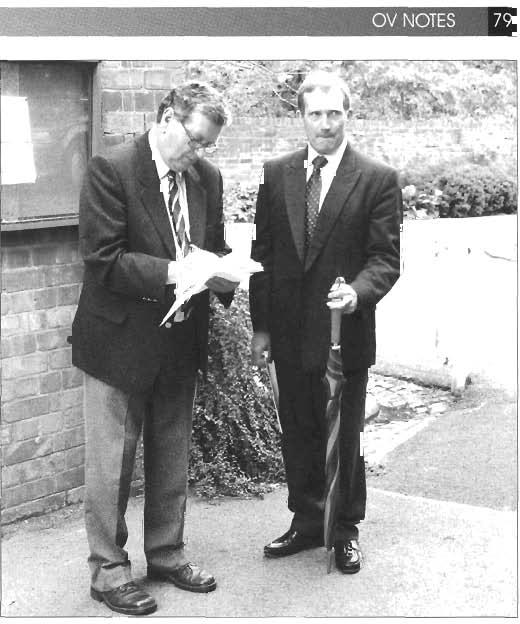
supplied with an address for D.A. PhiUips (B 58-66) - with whom he was keen to re-establish contact - by the Club.
Michael Pierson (Ca 50-59) Known to all as Pea at School. 19601 Nottingham University - Law, dropped out(!); 1961-63 National Provincial Bank; 1963-7 Assistant Purser with Cunard; 1968-82 Savings and Loan Executive (Accounting/ IT); 1982-7 IT Manager; 1987-present Application Software Developer. Married 1968 to Margaret Overman from Fairfax County, Virginia, USA, two children: Susan (Reese) born 1971;Jessica born 1975; Margaret makes and sells lamps. Emigrated 1968living in Fairfax City, Virginia, USA (fifteen miles West of Washington). Main interests: choral singing, music, linguistics, history and current affairs, all things Welsh.
Simon Pontin (Cr 51-53) Simon completed his education at Chipping Norton GS and was then apprenticed to the OUP for a short time before his family emigrated to the USA in 1957. 1959-60 US Air force; worked in several printing-related jobs and at Eastman Kodak before starting his radio career. Since 1963 Radio announcer; morning presenter since 1971 on Rochester, NY stations WBFB and WXXI; narrator with the Rochester Philharmonic, The Rochester Chamber Orchestra, and several other local orchestras. Simon and his first wife, Sally, have three children and five grand-children. Simon Pontin is married now to Lois Tipton.
Simon E. Pointer (S 85-87) Has now worked for Yamaha motor UK for five years. He moved recently from product manager to an IT role, including being Company Web Master. He can be e-mailed on simon.pointer@yamaha-motor.co.uk or Simon-Pointer@excite.co.uk
Peter Rich (Cr 51-58) Peter's family were German-Jewish, and as the Nazi pressure on the Jewish population increased in the 1930s made the decision to leave Germany and come to Britain, changing the family name (for obvious reasons) from Reich to Rich. One of his contemporaries has said: 'One of my deepest shames is of ragging him (along with others) because he was Jewish.' Peter now lives in Israel and has proudly reclaimed his old surname of Reich.
Toby Roscoe (B 93-98) After travelling extensively he is now studying at the Australian National University in Canberra (Environmental Science). He returns home if he can at vacation time.
James Rosliigton (Cr 85-95) 'Always a pleasure to receive the Vigornian - what a well designed magazine it is. I graduated
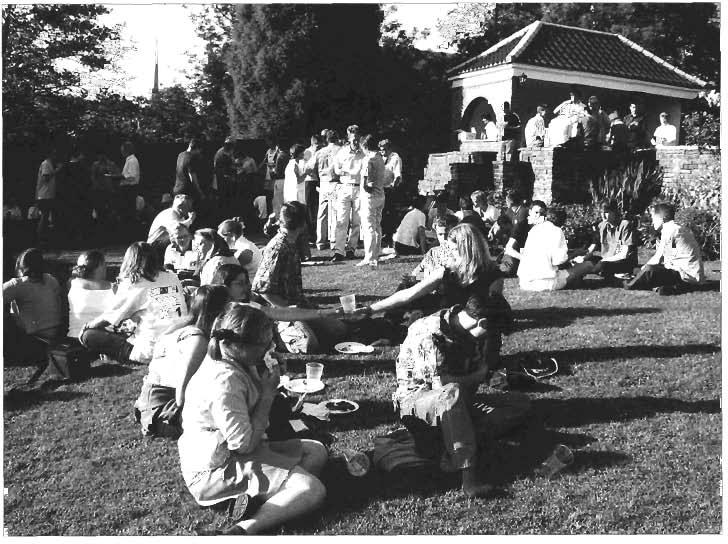
Howard Stanton (S 84-91) Is working as a diving instructor in the British Virgin Islands. He sends his apologies to all his old class mates for missing their 'ten year reunion'. 'I would love to have been there, but distance and money (!) are the main obstacles.' howard-stanton@hotmail.com
Sarah Steadman (CO 83-85) Now Mrs. Kavanagh she has returned to ~orcesk,lives in Battenhall and is a mother. The return has re-awakened her interest in the School and Club. 01905 7641 11
Paul Stevens (H 53-59) Founded the Centre for Worklife Counselling in Sydney, Australia in 1979 following a career in personnel management and the Worklife Network (an international affiliation of adult career specialists). He wrote his first published work in the realm of adult career development in 1981, Win That Job!, closely followed by Stop Postfioning- the Rest of Your Life. He from Trinity College, Cambridge with a 2i and a Senior. has had numerous further works published since. Paul's Scholarship. In September I shall start a two year course at Law School in London, armed with a training contract from the City law firm of Slaughter and May.' Always keen to hear from old friends on roslington@hotmail.com see 'Academic Distinctions'fm further success!
Nigel Salmon (H 77-84) Is presently a Senior Manager at the Halifax and runs a European Lifestyle business as well. He would enjoy hearing from any of his era. www.lifestyleboost.co.uk and nigel.salmon@euphony.net Nigel's business is geared to helping people improve their lifestyles. 'If we did all the things we are capable of doing, we would literally astonish ourselves.' - Thomas A Edison (1847 1931)
Dylan Smith (H 81-90) Works for IBM modernising the US Postal Service's equipment and lives ill League City, Texas. He joined IBM and was sent to the US 'for a couple of months' - five years ago! He indulges in his passion for flying and owns a half share in a Cessna 140. His ambition is to leave computers and earn his livelihood from flying: 'It's a lot more fun, and you're guaranteed an office with a window!' http://www.alioth.net/flying
Graham 'Saville' Smith (Cr 55-58) 1959-62 Trainee surveyor and negotiator in London; 1962-65 London University Certificate of Estate Management; BSc (Estate Management); Chartered Auctioneer (1965), Chartered Surveyor (1966), Institute of Housing (1975). 1965-78 Planning (Northumberland) and town development (Skelmersdale and Peterlee); 1978-94 Hong Kong Government (Land and Engineering Depts). 1994 Retired and returned to UK; currently dealing with inward investment for Bedfordshire CC and living at Turvey, Beds pending planned move next year to Petersfield, Hants. 1962 Married Pauline Bearman of Skegness, Lincs, one son. Main family interests: family history, travel, photography IT.
Robin Smith (C1 51-56) Married 1967 to Sheila Rowberry from Worcester, we have one son and two grandchildren. Joined the Civil Service in 1958 and worked in the Inland Revenue in Cheltenham and Worcester until early retirement in 1995. Sheila was also in the Civil Service and retired in 1994. Living in Worcester. Main interests: holidays - usually to USA and Canada; sports - soccer, table tennis and cricket. I played cricket for the OVs from 1960-64 and for Worcester Nomads from 1965-84.
dedication to assisting adults in transition has been recognised with a series of honours, including being made a Fellow and Life Member of the Australian Association of Career Counsellors - the AACC's highest Honour. Paul's company, better known simply as Worklife, has secured a number of important international clients in recent years and continues to expand. ~w.worklife.com.au
G.W.P. Stretton (Ca 26-31) In a letter last July Peter writes: 'I had not seen a Vigornian for many years, it is a vast improvement on the one I reinember. I have just received the latest King's Connect which contains some interesting information, eg a girl of three can now join the School! I was thirteen when I joined Castle House in 1926.'
Alan F. Suckling (Cl 49-59) In the unlikely event of anybody finding it remotely interesting, my pottcd biography is: 1959-64 solicitor's articled clerk; 1965 admitted as a solicitor; 1965-85 in private practice as a solicitor in Worcester and Redditch. 1985-2000 District Judge in Wolverhampton and surrounding parishes; 2000 The present District Judge in Worcester. 1965 Married to Gill Pullen, ex-Girls' Grammar School, SRN retired and for a short time assistant matron at King's. We have one son Adrian (Ch 79-84). Living in Pinvin near Pershore. Main interests: rowing, propagation of walnut trees and vegetables and the pursuit of idleness as an art form.
F.S. Sutcliffe (Hon OV) Frank Sutcliffe was able to attend this year's Reunion - to which he had been invited by the '50 Year Reunion Group' after the cancellation of another commitment, and met many former pupils, nearly all of whom he had not seen in over forty years. He was also able to meet with some of his old colleagues from the Common Room which made for an enjoyable weekend.
P.G. Taylor (C1 66-76) 'I am currently Operations Manager for Veeder-Root (a leading US instrumentation company) in Market Harborough. Happily married to Jo (a GP) we have two children and live near Wellingborough pjck@talk21.com
P. Thomson (085-90) 'Hi there -just a quick note for the next OV mag! Paul Thomson is still pounding the ivories for a living - currently writing with Cassandra Fox (UK No.1 with 'Touch Me in the Morning') and new boy band Fixate. Most extraordinary new experience: hearing the unearthly sound of 11,000 screaming girls from backstage at Wembley!' Best, Paul. paul@synthesia.net
R. Thorn (Cr 48-56) Roger sent the Club this fax from his home in France last August: 'Roger Thorn (President OU Athletics Club [60-611 and One Mile Blue) was invited to present the Team Trophy and individual medals at the Oxford v Cambridge Athletics Match in May 2000. He was also Guest of Honour at the Match Dinner. That same weekend his college, Exeter was celebrating the 150th anniversary of its Athletic Club - making it the oldest in the world. Sir Roger Bannister (also an Exeter man) was the Guest of Honour at the College Reception. There he met fellow Exeter graduate A.E. Reekes (Ch 64-69). While in Oxford Roger took the opportunity to look up his former Housemaster Harry Ferrar (Hon OV)
I read the Vigornian every year with great interest; it is very well produced and the School seems to be really thriving.' A.S. Townsend (Cr 56-65) An old friend of the Hon Sec, Simon went missing many years ago, but was traced through the Internet recently and we know now he is a solicitor in Manchester, with his own practice. He is married with a stepdaughter, son and twin daughters. He continues to visit the Lakes - only a relatively short drive for him these days - and remembers when he, Mike Page, John Horton and Rob Payne were there as part of a hill-walking holiday in 1965. He travels down to Worcestershire on occasion to visit his parents near Upton-upon-Severn and intends to re-connect with some of his old friends when he is next down.
John R. Turner (Hon OV) uohn ruas sho7on the picture (printed in this Viprnian) of three of his A Lmel Maths set of 1965, and it prompted thi~re.~ponse-MJ.I?] 'It was fascinating to see a picture of some of the middle-aged members of one of my maths sets of long ago, and horrifying that some of you are whiter than I am. All names came back, and I would recognise some without prompting, but the ravages of tirne mean that some of you would need an intro to be certain. Anyway, I don't know if any of your contemporaries are curning to this yeat-'S OV Dinner but if so I'll buy them a drink for all the strictures I would have laid on them thirty-seven years ago.' [fien thozcglz 1 don't wmember any (undue) strictures, I am not one to say no to afiee drink!
- M.J.P]
H.G. Vaile (Ca 52-56) Has sent in his e-mail address and u~ould welcome contact from any of his era with an interest in electronic communication. He lives in Chiswick. hgv@bigfoot.com
RA. Vincent CBE (Cr 52-62) Robin Vincent started work as Clerk to the Magistrates and Crown Court in MTorcesterin the early 60s. He moved to Stockport and eventually became Regional Circuit Administrator for the Nm7, working for the Lord Chancellor's Dept. He was awarded a CBE in the New Year's Honours List, 2000. He plans to work for the UN after retirement in March 2001; he has worked for the UN before, seconded to Moscow with the Russian Government. He returns to Worcester occasionally to visit friends and family.
H.D. Watson (Cl 48-58) 'I avas delighted to receive a bumper bundle of OV and School news recently. How far things have come since I was editing the Vigornian in the late 50s. I have passed on to Caroline Roslington some of the copies for which I was responsible and am now sorting through a cache of KSW items which I will also pass on to the Archive.' wattyatbrooke@ic24.net
Willy Weekes (Cl 50-56) Now known as RiM McLougIzlin. 195759 National Service in the Army; 1960-94 Joined the Civil Service and worked within the Lord Chancellor's Department in the Court Service; 1994 Retired as Group Manager for the Thames Valley Group of County and Crown Courts. Married in 1965 to Ann Kendrick from London and we have four children. I have managed to continue playing rugby and cricket for most of my years. My last game of cricket was in June this year. [Does this indicate the number of hours of sunshine in Britain in the summer of 20011 Bnan Gerrard]. We have been
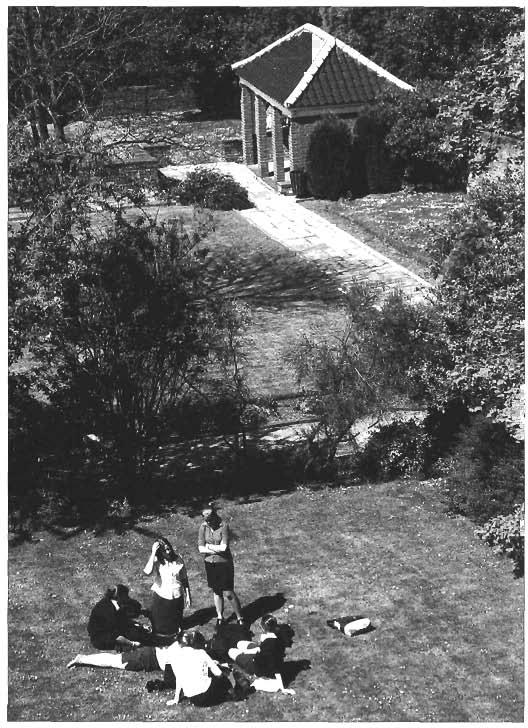
f'ortilnate to live in Wargravc, Bet-kshire for the past twcntyseven years. Unfortunately we will be in Spain at the time of the 50 year reunion..
Michael West (Cl 51-58) 1962 London University B.Sc. in physics; Institute of Education PGCE. 1963-67 Taught physics, Battersea Grammar School, London; 1967-84 Taught physics, Prince Henry's Grammar School, Evesham. Community Activity Co-ordinator with Salem Baptist Church, Cheltenham. Spurgeon's Bible College, London. Cambridge Certificate in Theolog. 1988-2001 Self employed in energy saving and communications. Married Margaret Binstead from Norbury in South London in August 1963. We have two sons, Andrew and Stephen; Margaret was a teacher in Brixton, Evesham, then in HM Prison Service; she too has now retired. We live in the beautifill village of Cropthorne near the Ever Avon between Pershore and Evesham. Main interests: helping Evesham Evangelical Church grow into a Cell Church and visiting our family.
J.A. Whitehead (Ch 52-57) Has returned to the UK after 24 years in Hong Kong. John is living in Torquay.
Revd. F.B.H. Wooley (S 56-61) Francis is now Rector of Ralsham and associated parishes in Cambridge. The Rectory, 19 West Wratting Road, Balsham, Cambs CBI 6DX. 01223 894010.
Alison V. Wright (CO 85-87) 'A very busy year, first with organising and participating in the visit to Birmingham and Worcester of the Philharmonia Choir of Cape Town, culminating in a performance of the Dream of Gerontius in the Cathedral. Then the Three Choirs Festival in Gloucester. In July I sang at the wedding of my good friend from Bach Choir days, Katharine, and in November I shall be participating in my brother's wedding: Chris is marrying Barbara Gill with Edward Bolton as Best man and Jarnes Davis as an usher. I continue to work as Office Manager for Arts in the School of Humanities at Birmingham University, but pressure of other commitments has forced me to withdraw
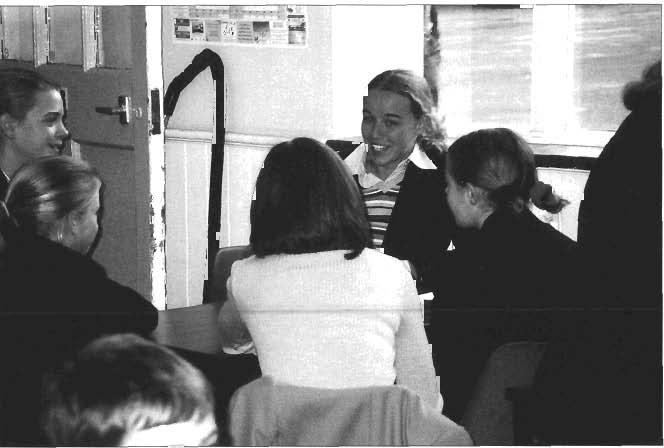
from the M Phi1 for which I was working. A minor operation kept me away from the Girls 30 Year Reunion, which I had hoped to attend.'
[Alison is lucky - her news arrived by e-mail on the day of the deadline for submission! MJP]
Andrew Young (Cr 89-96) Has moved recently to Sherwood, Nottingham where he lives with his wife. He works for Rushcliffe Council as a Local Plans Officer in Nottingham. AYoung@rushc1iffe.g0v.uk
A Letter from Jon Lingard-Lane (W 57-66)
Jon was more or less a contemporary of mine (one year behind me, but I knew him well) and when I spotted his details on a website I made contact through the site. This is his reply, which I have printed out in full as it has that feeling of enthusiasm for lqe. M.J.F!
29/4/01 Good to get your message -yes I do remember you very well, thanks for getting in touch. I don't know about you and the rest of the surviving old bunch, but I'm pretty bald and fat by now. Despite awareness of the horrible ravages of foot and mouth, which will be of more pressing concern to you than it is to one who works in theatre, Spring is still a good time of year for getting that optimistic kick out of life. I can't imagine how you farmers are managing to live with all the uncertainties and desperate implications of foot and mouth, especially coming hard on the heels of BSE.
I've been living in Wolverhampton since 1980 and I was looking out of the kitchen window this morning, enjoying the new growth in the sunny garden, listening to Chris Tarrant on 'Desert Island Discs' and thinking I must answer Mike's e-mail when I get to work. Thirty six years! When I left King's I spent a year in India on VS0 (the same year that poor old Hutchinson died on Mount Kilimanjaro and David Boot was killed in a car crash). Then I had a brief year at Newcastle University, enjoying all the things the 60s had to offer that weren't available in the foothills of the Himalayas. After the university kicked me out I returned to Worcester College of Education to train as a teacher - Martin Walker was there as well - and I spent some happy days sharing a flat with Andy Judd. The house had a large garden and I seem to remember some pretty unorthodox games of cricket being played with empty beer cans late at night. Three years teaching English and Drama at King Edward's Camp Hill School in Brum convinced me that what I really wanted was to do theatre, not teach it, so I spent a further 3 years training to act at the Manchester Poly School of Theatre. That was a wonderful time that set me firmly on my current path.
After a few years of bits and pieces in theatre, radio and even a film that I was embarrassed to see late at night on Channel 5
recently, I accidentally ended up in Wolverhampton. My wife Cathy and I were living on a narrowboat, which was an ideal home for poverty stricken young actors looking for work. Unemployed and navigating our sluggish way to Manchester in search of fame and fortune, we arrived at the top of the Wolverhampton flight of twenty-one locks to find that they were closed for maintenance for a couple of months.
By the time the locks were re-opened we'd started up Zip Theatre Company and we've enjoyed a challenging, fulfilling and relatively financially rewarding life of it with Zip ever since. I'm the artistic director and we currently have a vibrant multi-ethnic company of eighteen people, quite a few of whom have been with us since the eighties. Zip is an interesting hybrid of theatre, music, education and community work. We produce a wide range of plays at our excellent base at the Newhampton Arts Centre then take them out on tour to schools, theatres, arts centres etc. We also run courses in music and performing arts and do a wide range of educational stuff in schools. We're currently producing the Wolverhampton Mystery Cycle, a contemporary version of the mediaeval form. This is a largescale community play which will be performed by a couple of hundred local people in Wolverhampton's Civic Hall Uune 19 to 21) as part of the celebration of Wolverhampton's new City status. We're also working with a group of women in Brockhill prison near Bromsgrove, to research the links between drug use and prostitution as background material for a new play 'Arizona Market' that will go on tour in the autumn.
A couple of years ago I launched a website which is now pitifully slow and out of date because I haven't spent time maintaining it. However, if you care to take a peep at http://dspace.dial.pipex.com/jon.zip/ you'll find a piratical picture somewhere that gives you some idea of what this particular OV looks like thirty-six years on. I still get the OV stuff because Mum lives at Grafton Cottage in Ombersley (a couple of doors down from the recently retired Headmaster of King's). My address is 22 Oaklands Road, Wolverhampton WV3 ODS if you'd like to update records. I often think fondly about school days and wonder where (or whether) they all are now. I've never quite been able to face a formal Reunion. I think that would have been easier if I'd kept the links up when I left. Please give my sincere and fond regards to any relevant people that you contact. It was a good time and it did set me up in very good stead for all the stuff life throws at you. If you see Andrew Judd, tell him to -well get in touch! Please feel free to use any bits of this that may be fit for publication - I appreciate the job that you do as Hon Sec, especially as I imagine that you have a pretty busy working life yourself.
I hear the sounds of a couple of hundred local people arriving for rehearsal. Must go and direct God in the creation of the world!
All the very best, Jon.
A Letter from Kate Phillips (nee North) [CO81-83).
Like Jon Lingard-Lane's letter this was also a joy to read as Kate's zest for life comes bubbling through. MJ.P
May 2001 Kate, Rick, Anna (6),Joe (4) and Sum (2) moved to Kuala Lumpur in Feb 2001. Kate hopes to take up sports medicine again once the domestic arrangements of the move have been sorted. We left Zimbabzzre not because of the political upheavals there, but because our contract was up and it was time for Rick to move on in CDC. We miss Zimbabwe a lot - we had a fantastic time there, despite
M~~gabe'sefforts to wreck the country. Having said that, our timin,g 7ua.r excrllen,t, now that he has started making l@ dq$cu,lt for the whites in towns as uwll a.? the farms. And the general population's quality and standard of life is the worst it I~asbeen for years. But mough ofputting the world to rights!!'
Ju1y 2001 'OK ... So it took a while. But I promise that we have just got into our gorgeousjungle house and got set up on line. As I write, Rick's abandoned me to some conference and I have sat down with a glass of wine, and for the first time in six months I feel that we've done it. We have moved house at last! We had January in England; Feb-May in a flat in KL; June living here in the house (but the garden a building site) and now we are in a beautiful house overlooking jungle, with many birds, squirrels and monkeys (they popped in today) and a few snakes.
We have done a lot of building - extended the veranda (which we liueon); built a swimming pool; redone the kitchen; built a boundary wall and redone the driveway. We have landscaped the garden, which was trashed by all the construction, and made a centrepiece of the fabulous Zimbabwean sculpture Jyoti and I bought at the eleventh hour in Harare. In true Zimbabwean male form, Rick has put our fridge on the veranda so that he is never far from a beer.
hna, Joe and Sam have had an unsettled time, but they have done us proud and have just got stuck in. (OK, so they have been a bit naughtier on the odd occasion). The school is very like The Heritage School and Anna and Joe love it. Sam has started a little playschool and can't wait to get shot of me when I drop him off.
We have been to the islands three times to chill bigtime (or 'parkorf' as you Zimbo's say) and the Highlands twice (very like Nyanga, and we went with a group of Zimbabweans so it was home from home) and we've got a trip to the East coast in Sept and Bali in Oct. HOWVER I am trying to persuade Rick to let Sam and I fly to Zirn ill Oct to catch up with everyone (30 everyone e-mail him on rphillipsQcdcgro~tp.comand tell him to bp nice to me).
The gym and I have not seen each other, but stress has been a loyal substitute. Added stress has been my hair colour, which the Malaysians have struggled with. It has been blacky-purple; purply-purple; florescent red; and frizzy with every combination. Despite a lot of it falling out with the trauma of being chemically over-indulged it now looks reasonable again.
So we're off to England from 22nd July - 22nd August and then when we come back I'm doing an acting course so that I can become the first film star to gain fame in her mid thirties, oh and learn Bahasa Malay, the lingo, as well which will stand me in good stead for those Hollywood parts where fluent Malaysian is mandatory.
Last night we entertained on the veranda for the first time, and I flicked a glowing match cooly into the jungly nigllt, only for it to land in the hair of the guest to my right. I got the giggles so badly that I had to excuse myself because it had stopped being funny ten minutes earlier. Thcn we gave them a lift to the restaurant, and I was trying to adjust the car seat to give him more legroom (he has slightly spastic legs), only Rick was driving uphill and I slid right back virtually into his lap, which set his legs twitching quite badly for the rest of the night. (I think they muttered something about Bridget Jones as they left). So the fiiend-making looks like it's going well - they haven't sussed us yet and so we haven't had to start making the payments.
When did I start to go off on a tangent, oh paragraph 1sorry!. only the one glass of wine as well. b'ell our address for when you come and stay SOON is: 37 Jalan Tengku Ampuan, Taman Duta, 50480 Kuala Lumpur, Malaysia. Kate tel: 016 2092451 Rick tel: 016 2069799 Home line: 03 2544495 email:katerick@pd.jaring.my
I am thinking about organising a reunion of 1983 leavers for 2003 - twenty yean down the line (and t7uenty years down the Izill?!) copyingAli Blackburn 'sjifteen yar reunion in 1999 (along tho.5~lines an,y~uay).Use the contacts above ijyoz~are interested!!
2002 REUNION(BRIAN J SMITH[CH 52-60])
Brian Smith is planning to bring as many of his era together as possible next year. You can I~elp!Those OVs lost to the Club are most probably still in touch with at least one other from their time. Using that grapevine we can contact nearly all those for whom Brian is searching. The success of Brian Gerrard's 50 year reunion thi5 time suggests it will be well worth the effort! Brian can be reached on 01332 862894, 01332 864616 (fax) and briansmith@boothsmithread.com Do it sooner rather than later, I knowfiom my experience with he&ing Brian Gerrard, these things have to be planned out many months ahead for real success.
Peripatetic university lecturer D1:Bernard Leeman wrote thzs article some months ago, and following the terrorist attacks of l l th Sepember in the USA, and the subsequent military campaign against the Taliban Government of Aiyhanistan, it has become ver~topical. Bernard can 68, and often is -for th~most part, correctb - critical of some aspects of the repme that existed in his time at King's. It was an m of tremendous upheaval as the remnants of the old pre-zuar order and the n,ew liberalism of the 60s clashed head to head M1J.P
Although we were the children of World War veterans (my father served in both conflicts), the Castle House intake of September 1959 did not spout the sort of rhetoric of the youth in the shortly to be independent nations of my African homeland. We did not speak of 'nation building' or 'serving the people'. M'e had personal not collective ambitions.
The country was in a stage of transition. National Service had ended; young people had jobs and money and were making an impact on national and then international culture. There was also a deep cynicism and questioning of accepted values. Some Choir House activists termed themselves 'Angries' and defied convention. Chris Tarrant, whose humour more than matched their bitterness, once approached me conspiratorially: 'Sorry about the screaming last night,' he whispered in mock nervousness, 'they caught Houlbrooke washing . .'
What has this to do with Afghanistan, you might well wonder? The answer is an education system and personal resilience. King's in 1964 reminds one of John Mortimer's story of a British soldier being greeted at the gate of a Japanese prisoner of war camp in Burma by a fellow officer who said, 'Cheer up old boy, it's not half as bad as Marlborough ..' Our final year of 1963/1964 was not a happy year. The First Rugby XV had such a terrible time that not only did they reach an all time depth by giving me a trial as full back, but no record of their disasters exists in the Vigornian. It was that year that senior monitors were removed from office and suspended for being found in a pub and the poor A level results reflected widespread unrest and sense of grievance. The leaving class of 1964 figure prominently on the list of 'missing' OVs. Many, including myself, questioned the whole point of the system we had endured. Now, because of the Internet, it is possible to find what happened to many of the class of 1964. It is an interesting exercise because it shows that many who had been written off as failures got up off the canvass, persevered and achieved their ambitions. I think that King's, albeit unconsciously, taught us resilience and tenacity of purpose. I hope this happy discovery sustains me through a task that might have made Hercules blanch. I am trying to make an Afghan Women's University. And much of what inspires me is the Taliban's old school - Deoband.
The Russians spent forty-five billion dollars intervening in Afghanistan; the Americans, Saudis and other Islamic forces twenty billion before Kabul fell. Yet it was the penniless Taliban, students with righteous souls on fire, that emerged victorious. The Deoband school of theology was founded shortly after the Indian Mutiny. Its founders felt that armed resistance had been discredited and that a community-funded seminary to educate a new class of Muslim religious activists would achieve a more satisfactory result. Today the Deoband school has been responsible for educating teachers who have in turn provided elementary education to poor Muslims throughout India, Pakistan and Afghanistan. After the capture of Kabul in 1992 the victorious Islamic resistance movement then fell upon each other. Deoband educated Pathans rose in anger against the corruption and slaughter and were backed by thousands of young students in the Deobandist school in the refugee camps. Today they are the Taliban government, who adhere to the Deobandist belief that if they implement what they believe is an exact replica (including beard length) of the first community the Prophet Muhammad ruled in Arabia, all social, economic and political problems will evaporate. They state that a pure Islamic Afghan state will in this way be purged of western and socialist influences and emerge as a perfect harmonious society. To achieve this they have imposed the most draconian treatment of women the world has ever seen.
Now it is the turn of the Afghan Women to sow an educational seed. Deoband taught resilience in times of stress and hopelessness. It is perhaps rather amusing to say the same of King's, but there is truth in it. If this Meena University (named after a young martyred Afghan woman leader) project takes root perhaps it will have better consequences than Deoband. The first step is relatively easy, linking the exiled Afghan
professional class via an on-line University. The second, establishing a residential university in Pakistan, is far more problematic. Overall success depends very much on world opinion deciding to choose Afghanistan as the place to draw the line against gender oppression.
Dr Bernard Leeman, AI Akhawayn University, Morocco.
It was with some trepidation that JMR and I, as housemasters of College House the boarding and day house of sometime in the Dark Ages, met more than fifty OVs. We needn't have worried; it was the most friendly and relaxed occasion imaginable, aided by the presence of several delightful babies and toddlers. The OVs ranged from the 1974 to 1999 leavers so their experience as girls at King's was extremely varied. However their response to the reunion was the same - a very happy day which should be repeated.
Staff particularly involved with girls were also there to renew acquaintances, including David Annett (headmaster 19591979) and John Moore (headmaster 1983 - 1999). Before lunch THK welcomed the visitors and drew our attention to the chauvinist hints in the local press in the early 70s when the very first girls were admitted to the school. However that was nothing in comparison to what the girls themselves faced, as David Annett pointed out in his speech. An all-male establishment was a daunting prospect, socially and academically, for the handful of girls in the Sixth Form, but they survived and indeed thrived if the range of their careers and success is anything to go by. The day ended with tea in College House, now the Guesten, which rang with girlish laughter once more, much to the bewilderment of the resident canon.
C.F.R.

First Oxbridge award to King's Girl, Gillian Bryson -
18 girls in Sixth For
27 girls in Sixth Form College House (day & boarding) opened

King's goes fully co-educational, accepting 31 girls at 1l+ and 13 into St. Alban's
College House boarding only. Daygirls join the boys' day houses
Decision by governors to go fully co-educational after 1991 (target of 35%-40% by 1995)
Catherine Boulton made first Queen's ScholarSixth Form first female in the Cathedral College of 1541

25 girls who started in the Lower Fourth enter the
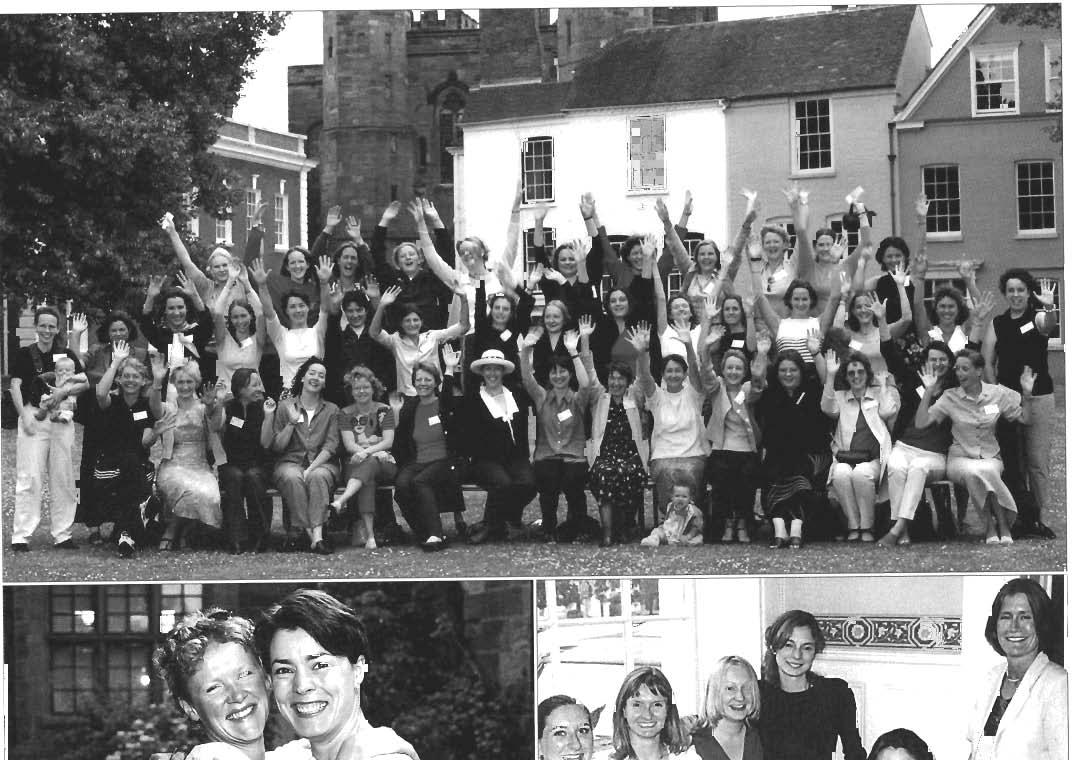
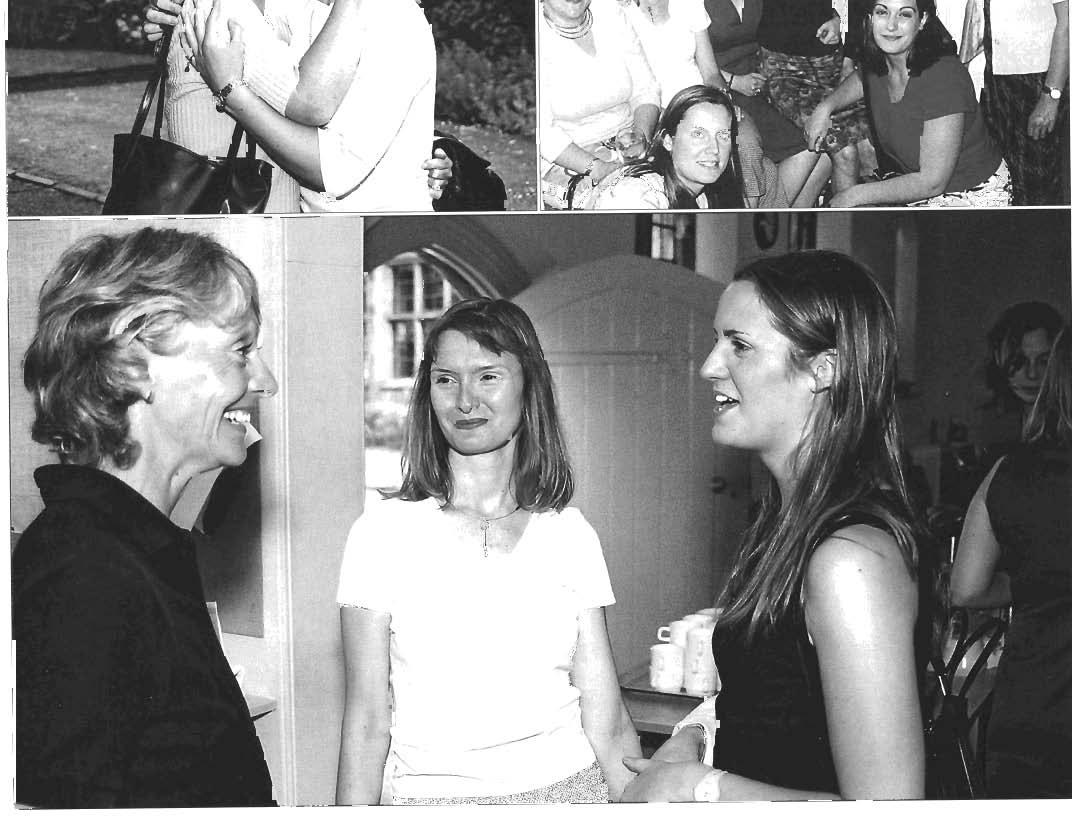
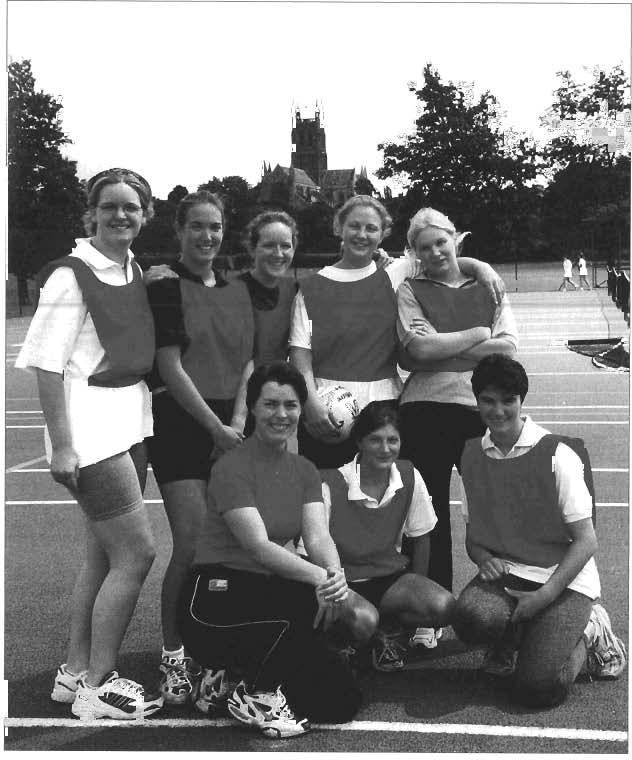
Old I'igor 71 tnii IIP/~(I// ~P<I?IZ. HocI? rozu, lPft to 17gIil:Rosr P<I~I/P~ Zoe lVitou~skz,K~hrccnRirtwhz.stlr, 1,crurrn Law.son,-Pmtt, Kirrly Johnson. Front row, lqt to nglzt: Nicky Feathmstone, Jenny Pmrcr, Dnnnai\ilcGettigan

I spent much of November and December 2000 standing on Worcester bridge reporting for the BBC on the worst floods for fifty years. I seemed to spend much of the summer of 2001 coping with the after effects. Nevertheless, a season without a pavilion, and for a large part without a pitch, proved to be one of the more interesting I can remember in twenty-three years as a player with the OVs. After 4 successlul seasons in Saturday league cricket, we had taken the momentous decision to go for broke and field two teams on a Saturday. This involved preparing a completely new cricket pitch near the Athletics track. Thanks to Tony Harris, Robin Bishop, Matt Richardson and a sizeable donation from the OV club we managed to do this in just four weeks. The pitch may not have looked pretty, but the circumstances were exceptional, and in the end it played pretty well. The efforts that those involved went to create a new pitch really were tremendous, and none of it would have been achieved without the help of Phil and the rest of the ground staff at Kings; and the encouragement of Pete Iddon and Gilly too.
Our performances on the pitch were less commendable. The Firsts finished ninth out of ten in Worcestershire Division 4, and the seconds finished eighth, but the Sunday and midweek sides, led ably by Nick Sproson, did manage to win more games than they lost. The season's greatest achievement was undoubtedly the recruitment of a number of very good new players. Charlie Daniell deserves a special mention herehe walked away with the Panter Shield for young player of the Year; but more importantly showed he could bowl good sides out, often with little support. Richard Major and Robbie
Fardon also proved invaluable acquisitions, not least because of their ability to keep up spirits in
the field. It was especially nice to have so many schoolboys playing for the club again. Osman Fiaz was impressive with the ball and looks quite a talent. Nick Major is hugely gifted and scored a century on his only appearance. Nick Dale Lace continued to play when he could, and Tom Soden also showed what a good pool of players the School has. The summer's star was undoubtedly Nick Firth, and he won the Bailey Cup for player of the season. He was the club's leading run scorer, took the most catches and despite an attack of the dreaded 'yips' still performed respectably with his off spin. Phil O'Neill's 144, scored against Avoncroft won him the Mackie Cup for the Performance of the Year. It really was a fabulous innings as Anthony Gilgrass, who scored 98 at the other end, can attest. Colin Cole and Charlie Evans with the bat, and James Underwood with the ball again showed what good players they are, if only we could persuade them to play a few more games. James Gomersall equalled Nick Firth's recent performance record by turning out in twenty-five games, contributing with bat and ball. Nearly ninety players turned out for the club this summer, unfortunately only thirty managed to play five or more games, but it is a real testament to King's that so many people are prepared to come back and play cricket. Real praise should be saved for those that run the club and turn out every week to keep the club going. Besides those already mentioned, Tony Harris, Andrew Tudd, Robin Bisho~.Tim L, Whitehouse, Richard Wilkes, Charlie Annable and James Bader provide the backbone without which the club simply couldn't exist.
Finally a few farewells.John Wadley, an OV stalwart for more than thirty years and a club captain for more than ten, has finally got hitched and is heading off to Australia to help run his new wife's restaurant. John Malins has been lured by the bright lights of London, as have Jez Robertson and Lorin Arnold. Hopefully we'll see some of them again when they, like so many before them, become disillusioned with the capital. On a personal note I'm sure those who know my brother Jamie will wish him a full recovery from a serious car accident in October and hope that he manages to put on the OV cricket shirt again next summer.
Phil Mackie (OV Cricket Club Captain) phil.mackie@bbc. co.uk

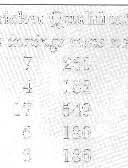




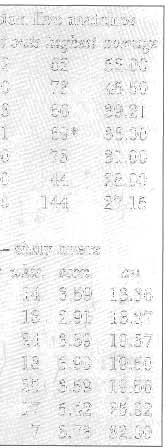
Nicola Allen University of Edinburgh Politics
.Julian Arnold ............................... University of Oxford .............................................................................................................. Fine Art
Alexander Ball University of Aston Managerial & Administrative Studies
Helen Barnett-Roberts University of Exeter Economics and Geography
Samuel Bayliss University of Oxford Mathematics and Computer Science
Carwyn Beswick University of Wales, Aberystwyth Law
Nigel Blackshaw University of Leicester Modern Language Studies
Alexander Boughey Bournemouth University .............................................................. Multimedia Communications
Claire Bradley University of Plymouth Marine Biology & Coastal Ecology
Jonathan Brittain University College, London Law
Celia Bryant University of Cambridge Land Economy
Timothy Burdon University of Wales, Aberystwyth Computer Science
Kimberley Burkhill University of Reading History of and Architecture
Emma Burman King's College, London French
Robert Caulfield University of Aston Business Computing and I.T.
James Coleman University of Wales, Cardiff Law and Italian
Tobias Collison University of Birmingham Biological Sciences
Alasdair Colquhoun .................... University College of Wales, Bangor Forestry ...........................................................................................................
Jennifer Congrave University of Exeter Geography
Helen Cooper .............................. University of Birmingham .................................................................. Economic and Social History
Felicity Copp University College, Idondon Medicine
Thomas Cox Bournemouth University Design Engineering
Sarah Cullen University of Wales, Cardiff Sociology and Criminology
Edward Cumlning University of Cambridge Law
Nicholas Dale Lace University of Exeter Business and Management
Stephen Daly University of Bristol Chemistry ........................................................................................................
Oliver Davey University of Warwick Psychology
Philippa Druett ............................ University of Durham ............................................................................................................ Business .......................... ..........................................................................................................
Henry Duckham University of Sheffield Dentistry
Harriet Eaton University of Leeds Performance Design and Production
William Edwards University of Plymouth Business Studies
Jennifer Elderkin University of Loughborough Economics with Geography
Susannah Essex University of Bath Natural Sciences
L,aura Facey University of Birmingham Psychology ...............................................................
Mark Farmer University of Reading Computer Science and Cybernetics
Michael Finlay Ul~iversityof Newcastle Fine Art
Rebecca Fitzpatrick University of Surrey (Roehampcon) Film and Television Studies
Rhoanna Ghaye ........................... University of Birmingham ........................................................................................................Nursing
.Tames Gilbert University of Durham ..........................................................................................Civil Engineering
Matthew Godwin University of Buckingham and Media Studies
Patrick Greenfield ....................... Sheffield Hallam University .................................................. Hospilty Management with Tourism
Jennifer Greenhow University of Wales, Cardiff Architectal Studies
Duncan Griffiths University of Wales, Swansea Geography
James Gunn University of Warwick Biological Sciences
Julia Guy University of Cambridge Law
Anna Haigh University of Durham Geography
Rebecca Hall University of Bath ...............................................................................................Economics & Politics
John Hamson ............................... University of Newcastle Art
Samantha Harding University of Birmingham
Humanities Sports, Physical Education
Thomas Harris University of Oxford Chemical Engineering
Patrick Heslip University of Bradford Internet Computing
Matthew Humphries Coventry University Consmer Product Design
Christopher Husband University of Plymouth Inn Techllologies
Richard Huzzey University of Oxford Modern History
Adam Jacovou University of Wales, Cardiff.. Geology
Edward Jefferson-Loveday Royal Agricultural College Property Agency and Marketing
Helen Jenkins Leeds Metropolitall University ......................................................................................Physiotherapy ...................................................................................................
Emma John University of Durham Arts Combined
Rachel Jones ................................ University of Wales, Cardiff Biology
Richard Jones Birmingham College of Food, Tourism & Creative Studies Professional Culinary Arts
Daniel Juckes ............................... University of Wales, Cardiff Business Administration
Margaret Keightley University of St. Andrew's Biology
Alice Kenrick Queen's University, Belfast ........................................................................... Modern History/Politics
Elizabeth L,ewis University of Cambridge Medical Sciences
Sara Lewis DeMontfort University Marketing and Media Studies ...........................................................................................
Steven Lim University of Warwick m and Literature
Sarah Lonbay University of Sussex American Studies (Literature)
Nicola Longmore ........................ University of Wales, Swansea ports Studies ..................... ..................................................................................
Christopher Massey
Robert Melville
David Millard
University of Cambridge Engineering
University of Bristol Social Policy and Sociology ...................................................................................................
University of Plymouth Business Information Management
Richard Neal University of Cambridge Engineering
Edward Oliver University of Leeds History
Alice Ounsted .............................. University of East London ............................................................................ Commuication Studies
Kathryn Owen University of Edinburgh Architectural Design
Alice Oxenham Hereford College of Art Art Foundation
Adam Papaphilippopoulos University of Oxford Law
Michael Parks ............................... University of Warwick Electronic Engineering ........................... ...........................................................................................
Ciaran Paterson University of Liverpool Veterinary Science
Jon Pinson
University of Wales, Swansea Mine Biology
Octavia Pollock ............................ University of St. Andrew's ......................................................................................................... English
Kathryn Pound University of Wales, Aberystwyth Geography with Economics ............................................................................................
Jonathan Price University of Reading Building Surveying
Saiedur Rahman .......................... University of Warwick Mechanical Engineering
Michelle Righini University of Warwick Psychology
Sarah Roden University of Wales, Swansea German (with Legal Studies)
Paul Rollason ............................... University of Leeds German-Japanese
Henry Russell University of Manchester History of Art and Architecture ....................................................................
Philip Ryder University of Portsmouth International Business Studies
Aliya Saied .................................... University of Bristol Economics & Econometrics
Shervin Sharneli .......................... University of Leicester Law ....................................................................................................
Jordan Shimwell University of Nottingham Geogl-aphy
Edward Smith University of Durham History
Adam Stamper ............................. University of Warwick Cmpter and Business Studies
James Stavert University of Wales, Cardiff Marine Geography ................................................................
Adam Stephens ............................ University of Birmingham Computer Systems Engineering
Sarah Stratton University of' Plymouth Business Studies
James Studd University of Edinburgh Psychology .........................................................................................
Adam Swinburn London School of Economics Government
Daniel Turner University of Sheffield ericn Studies
Rose Tustin Coventry University LawBusiness Law/Criminal Justice .....................................................................................
Stuart Vivian University of Exeter English with Film Studies
Alexander Walker University of East Anglia candinavian Studies
Ben Wall ....................................... University of Sheffield English Literature ..............................................................................
Alexander Watson University of Birmingham Electronic Engineering
Joseph Watson King's College, London Music
Thomas Wheaton ........................ University College, London Chemistry ,
George Wilesmith University of Newcastle Politics
Richard Young Nottingham Trent University ...................................................................... Residential Development
The Vigornian 200 1
Editor: Peter Iddon
O.V. News: Mike Page
Photography: Many thanks to the numerous contributors, but particularly to John Wheeler, Caroline Roslington, Russ Mason and Tom Bader
Townsend Typesetters, Pershore Printed by Hughes & Company, Kempsey, Worcester

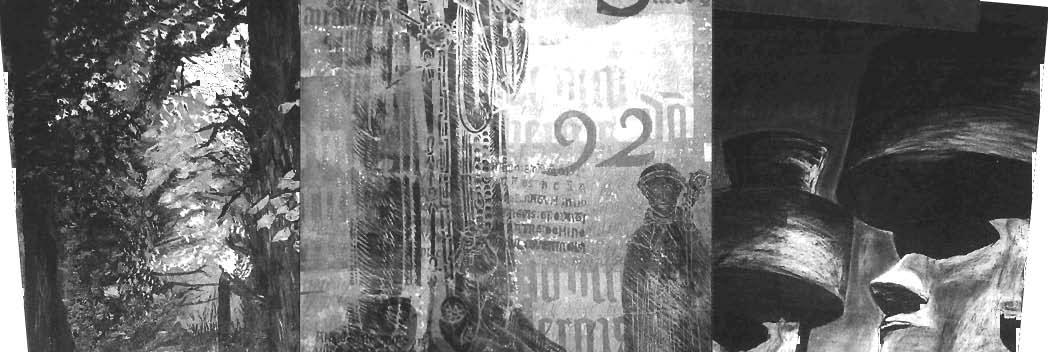
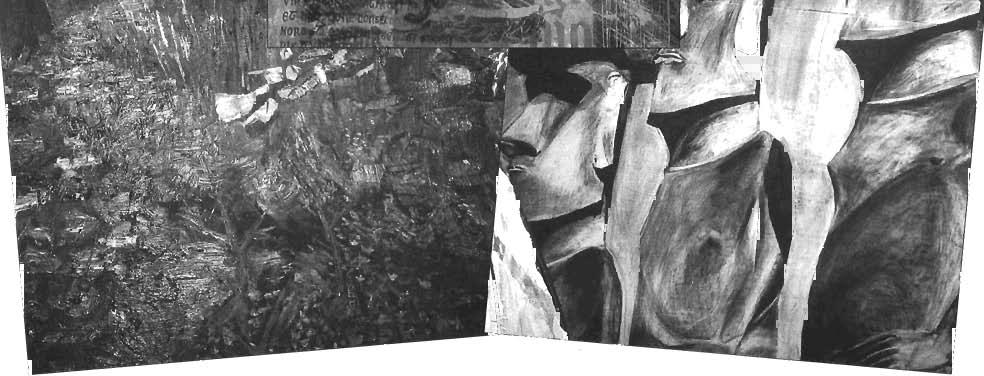
A


